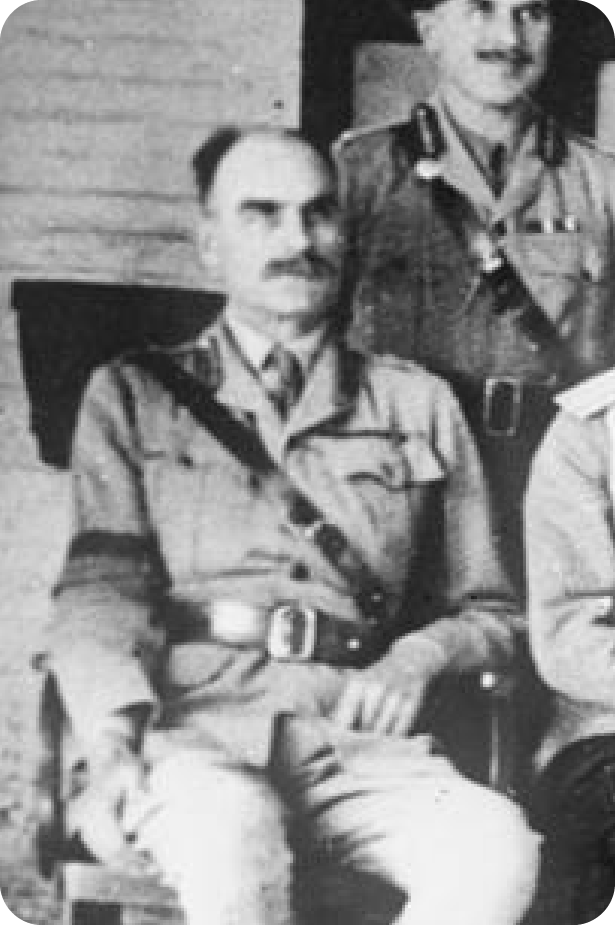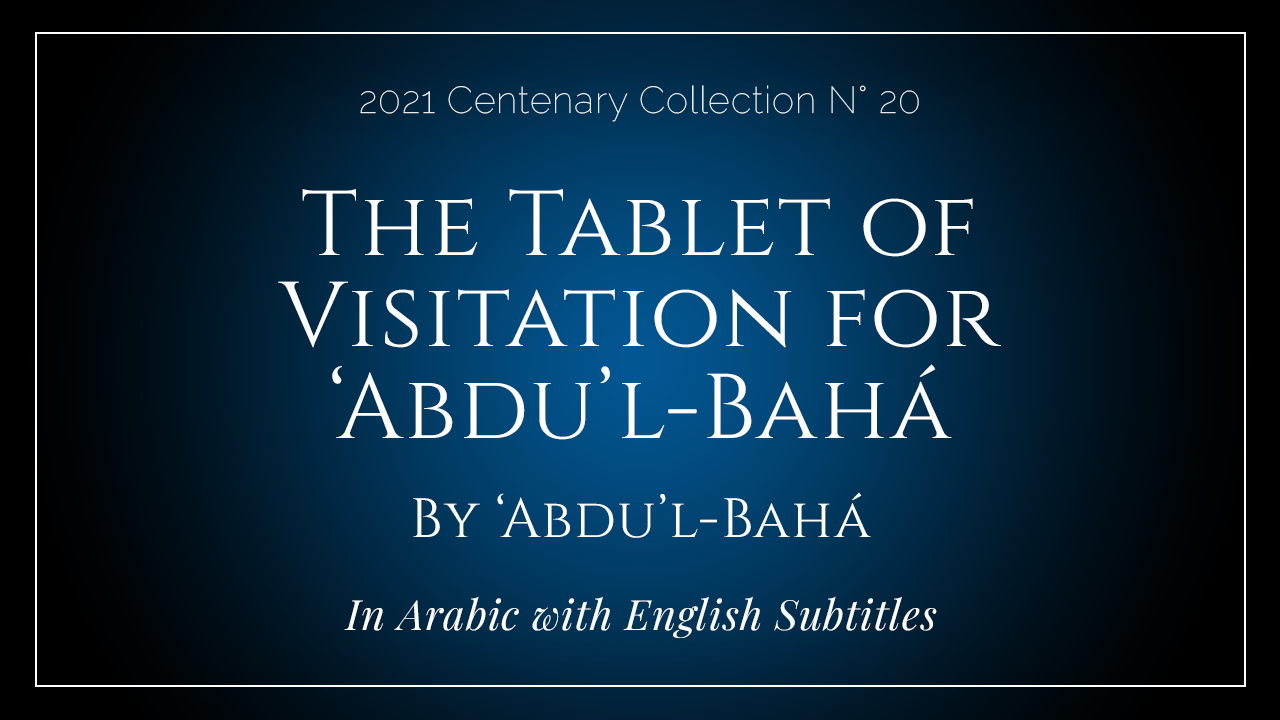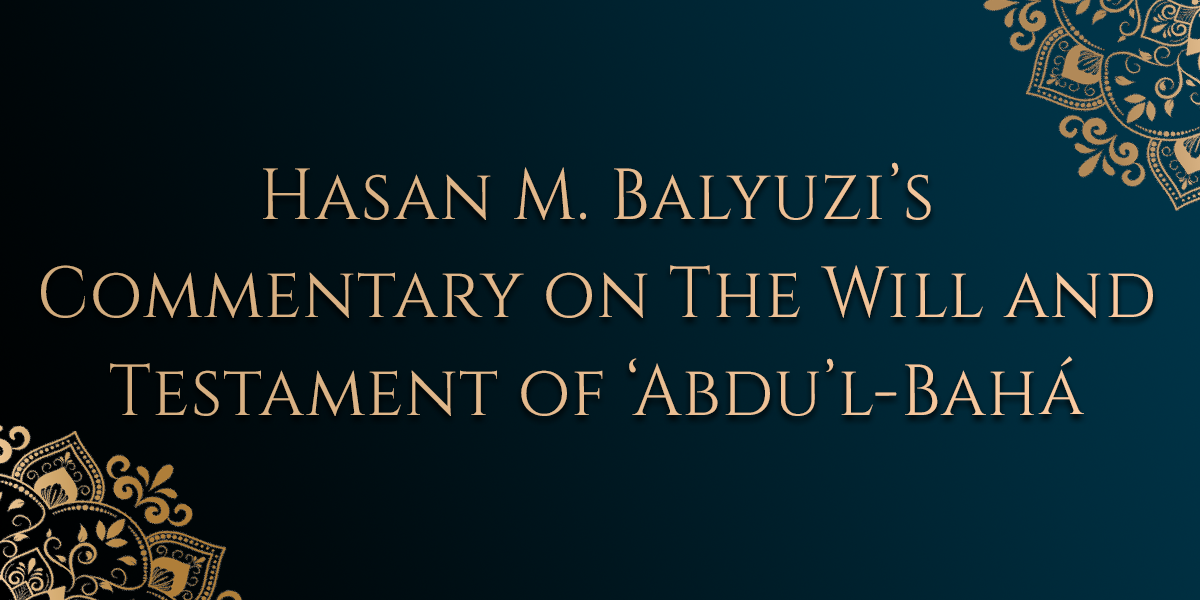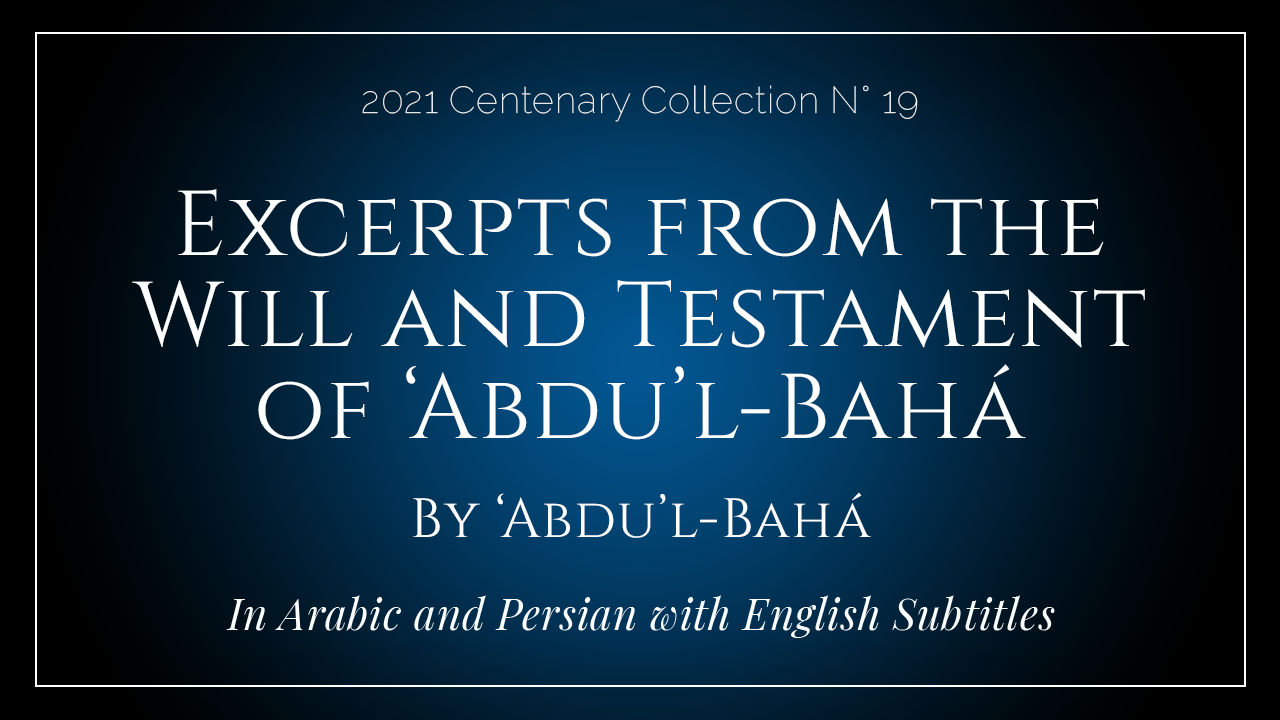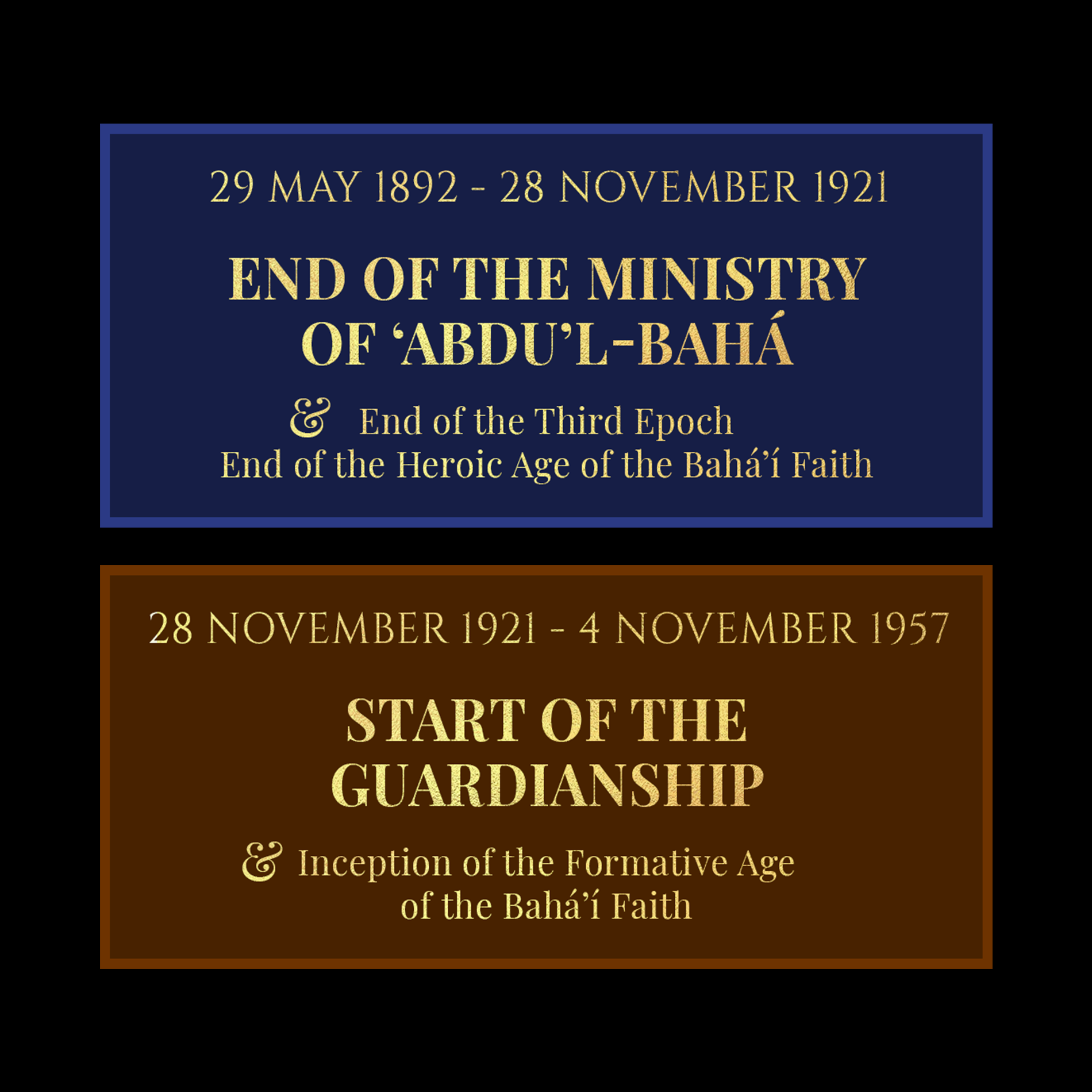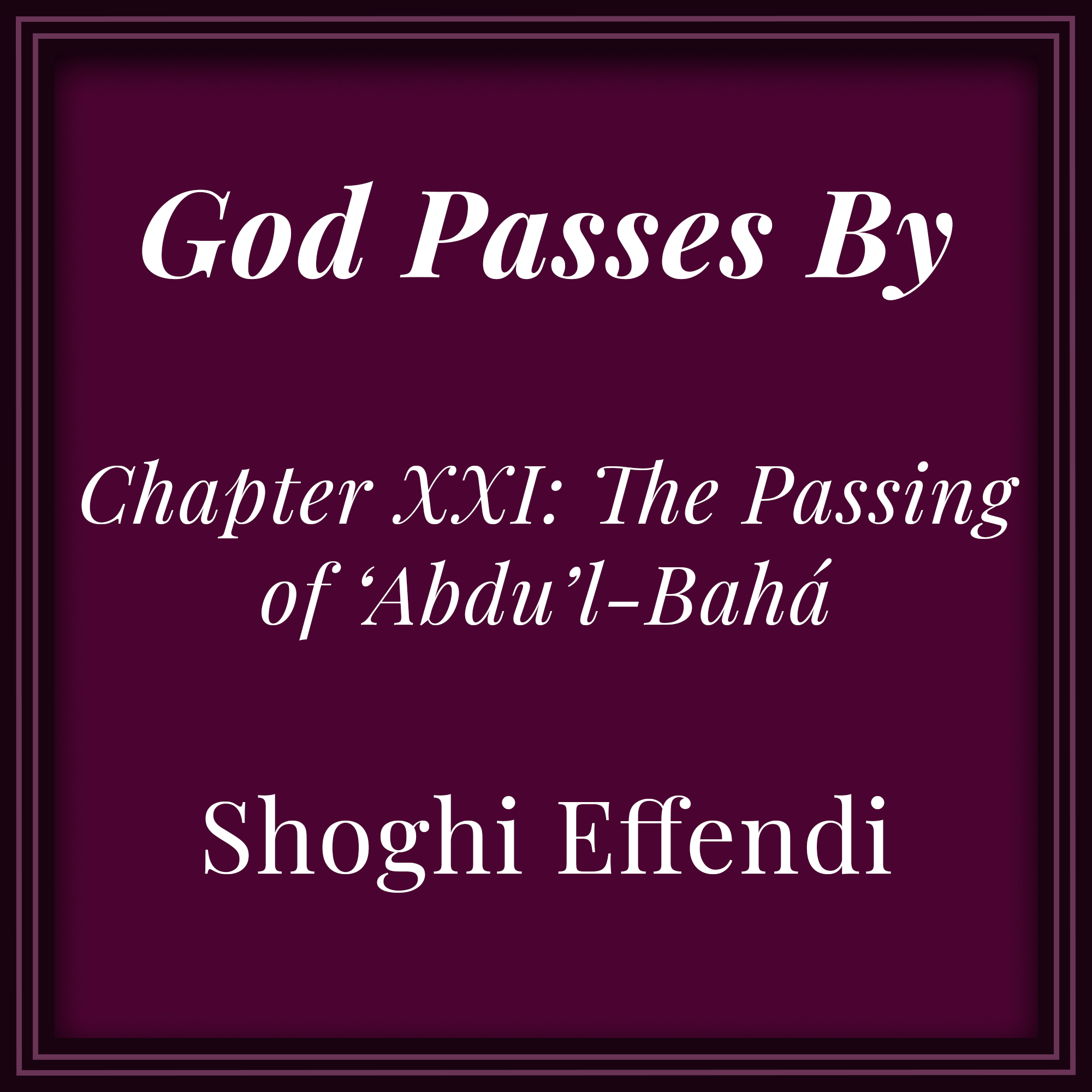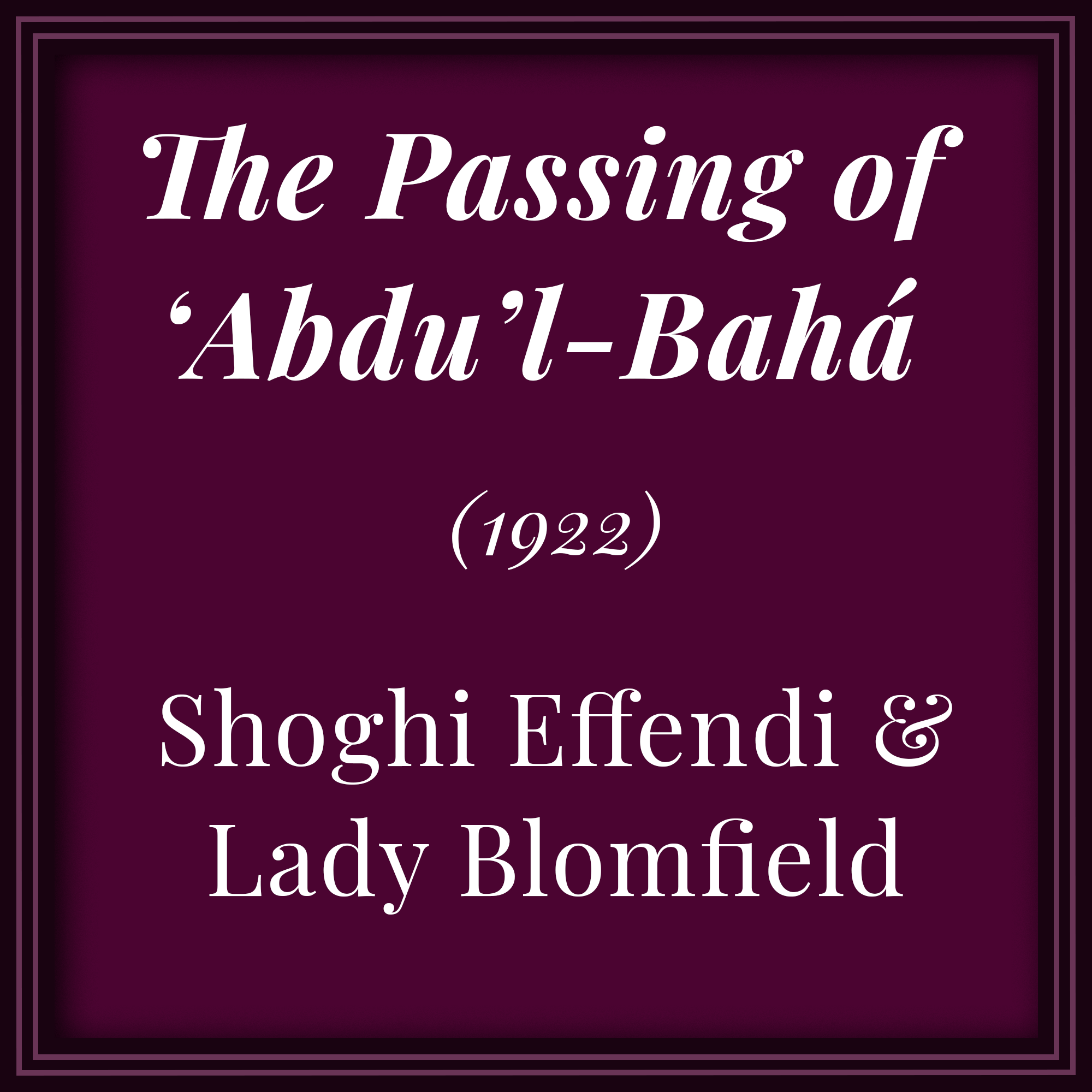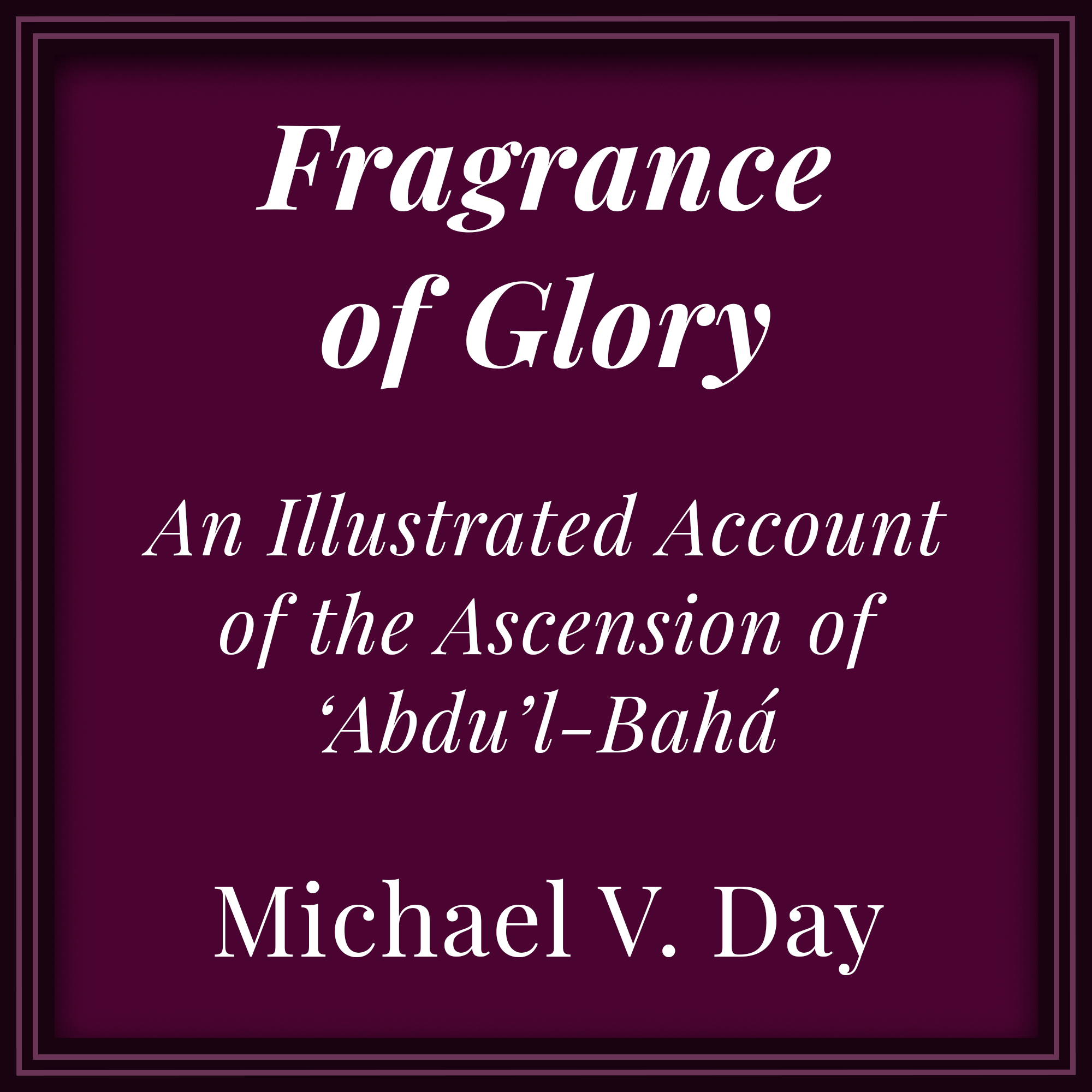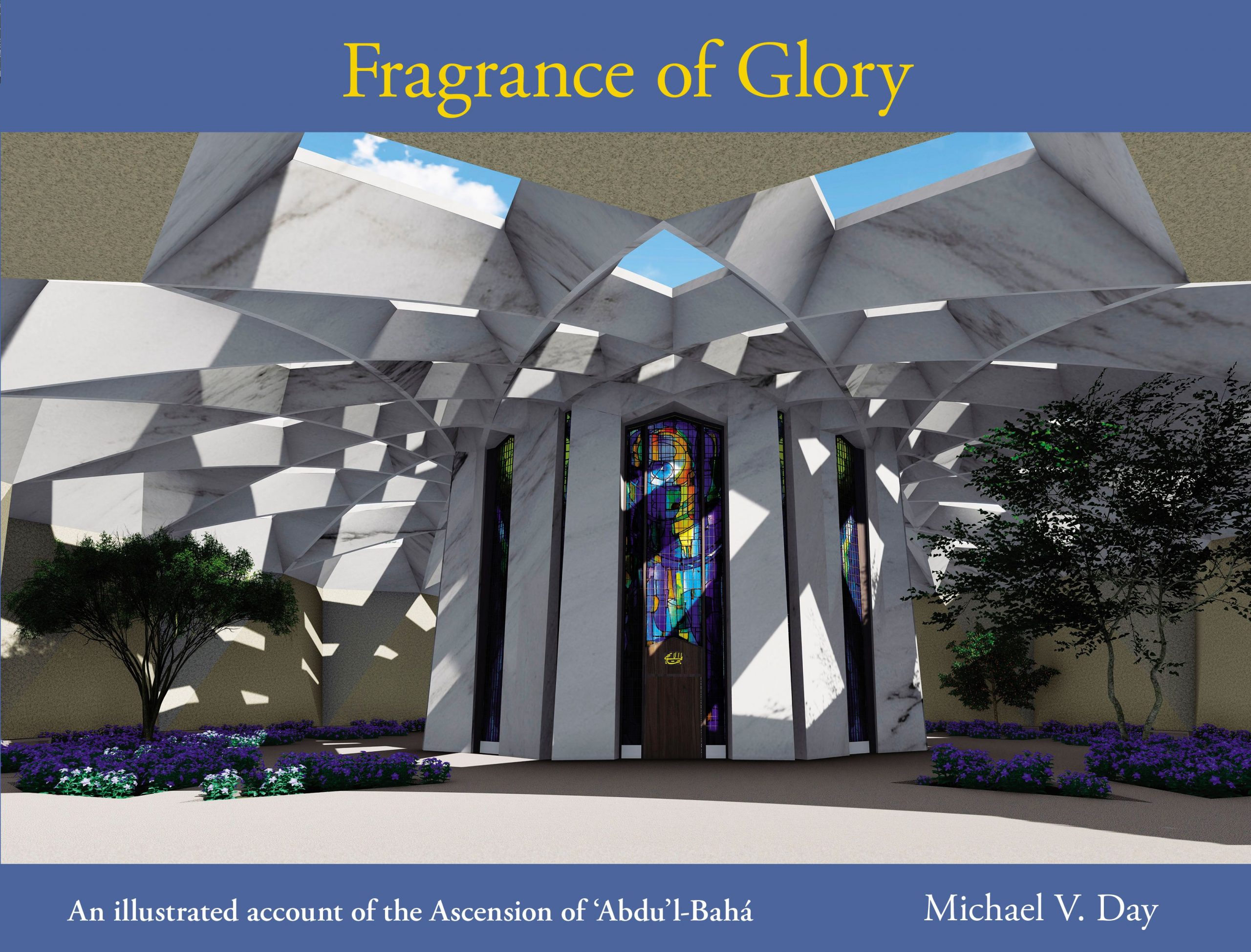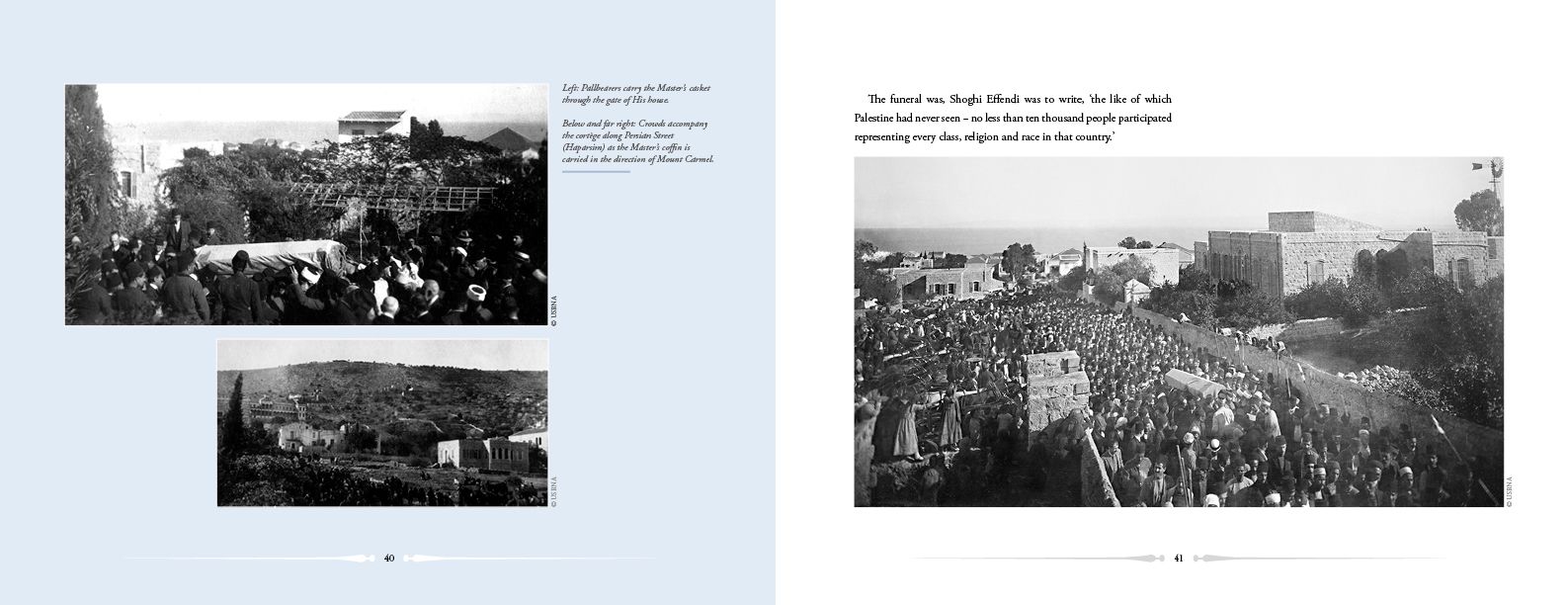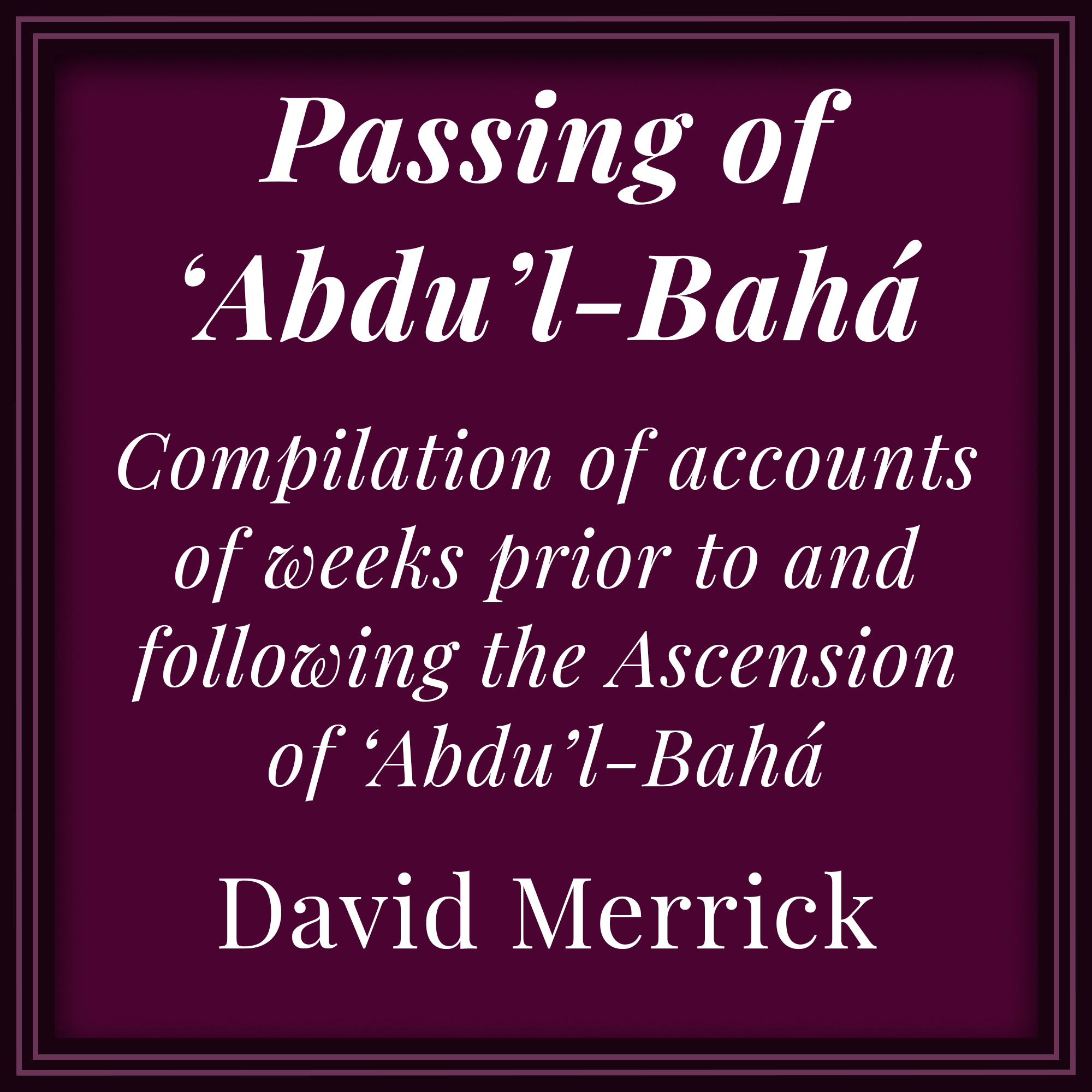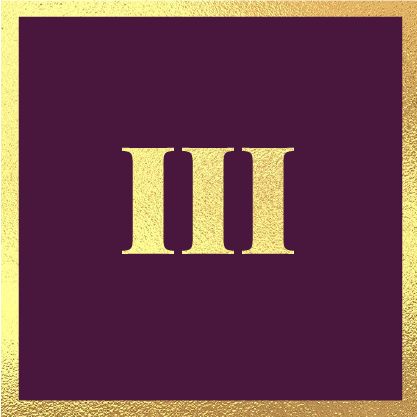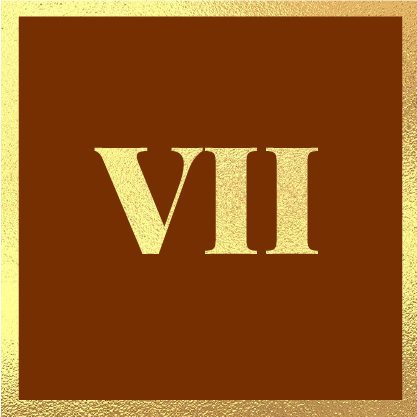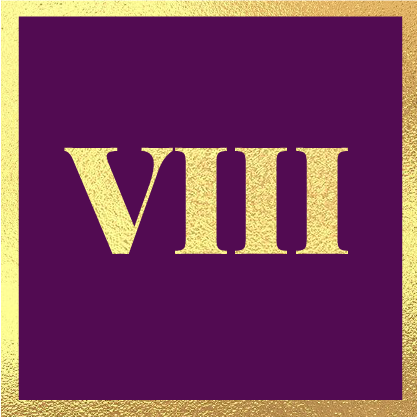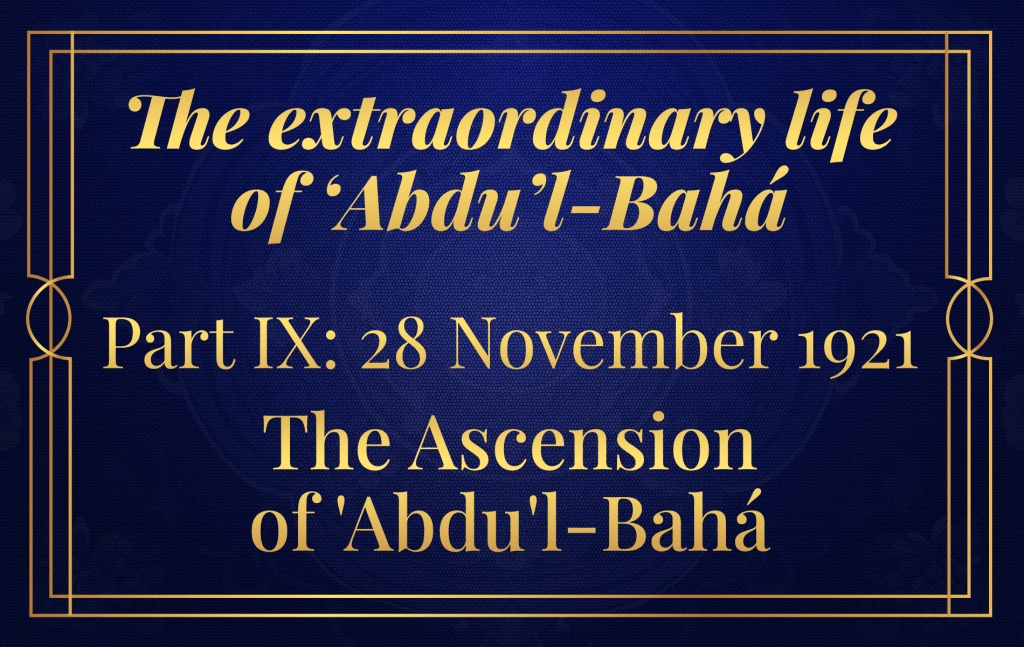
Written and illustrated by Violetta Zein
This part covers the days, weeks and months before and after the Ascension of ‘Abdu’l-Bahá at the age of 77 on 28 November 1921.
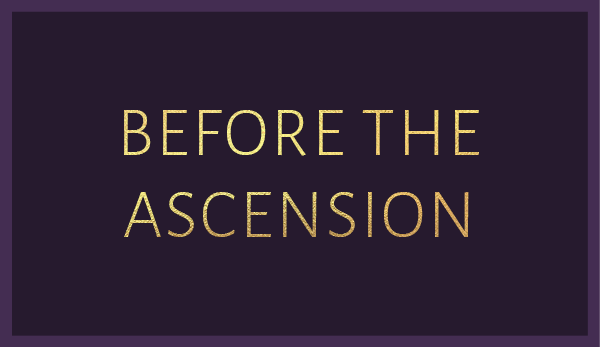
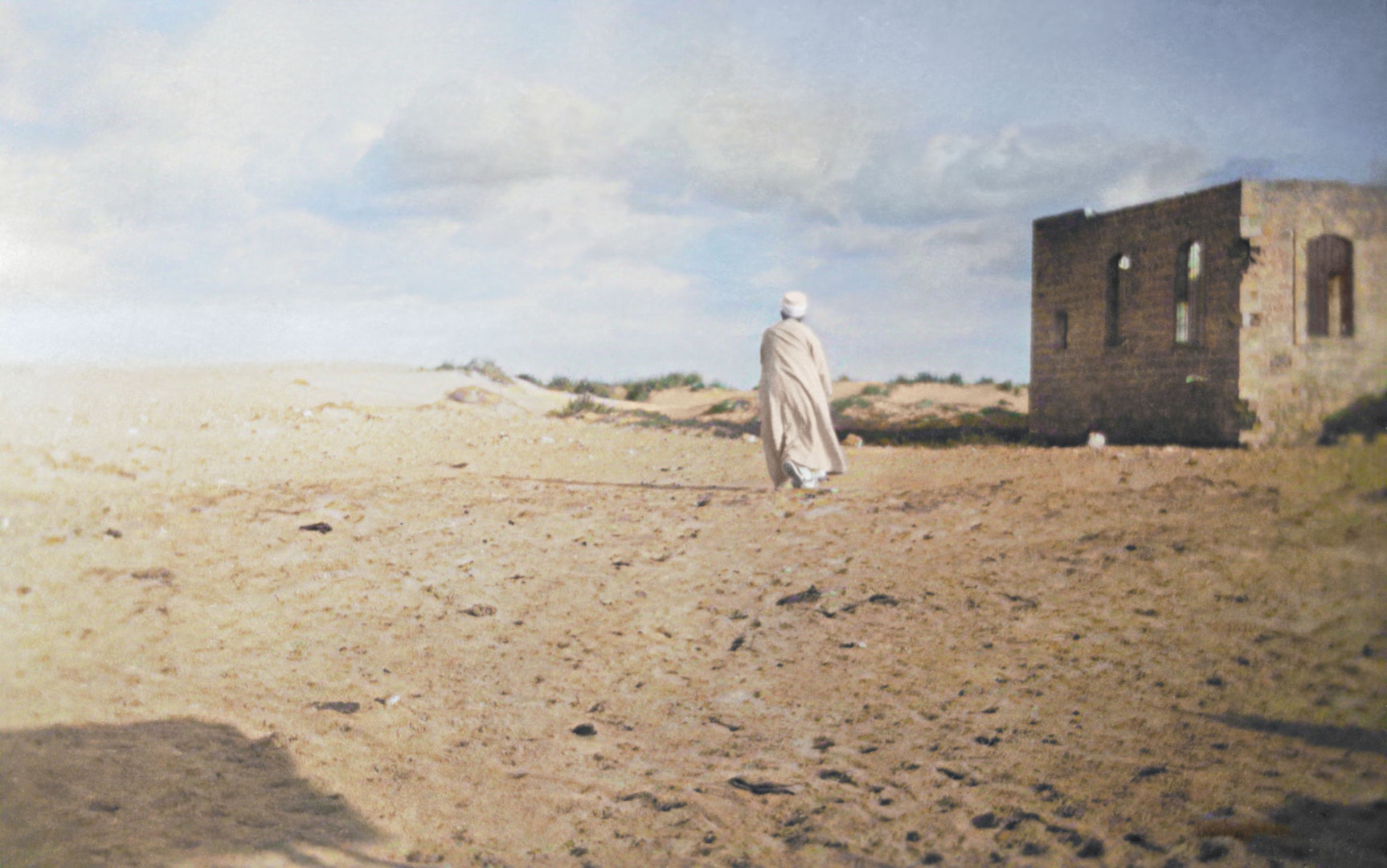
Colorized image of ‘Abdu’l-Bahá in the Holy Land, c. 1920. Source: Bahá'í Media Bank, © 2023 Bahá'í International Community.
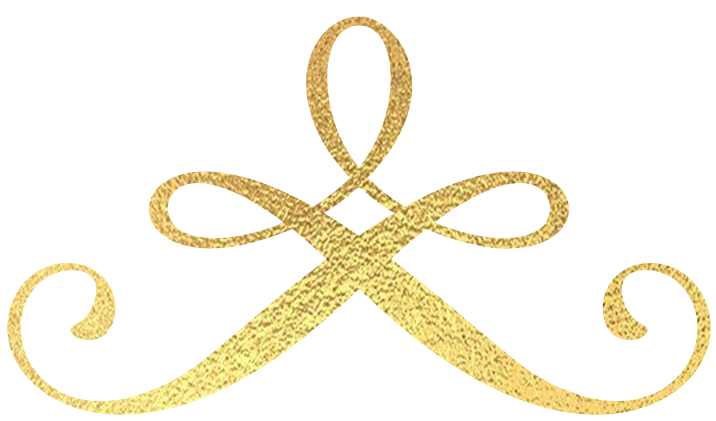
For several years before His passing, and with increasing frequency as the end of His earthly life approached, ‘Abdu'l-Bahá made passing comments about His death, sometimes clear allusion, and at times more subtle references. In preparing for the Ascension of ‘Abdu'l-Bahá, and the close of such an extraordinary, unparalleled life, we felt it only befitting to follow the example set by Shoghi Effendi in "God Passes By" and in his joint essay with Lady Blomfield "An Account of the Passing of ‘Abdu'l-Bahá," to gradually, spiritually, prepare ourselves for His Passing with a compilation of His statements from several years before 1913 to 1921.
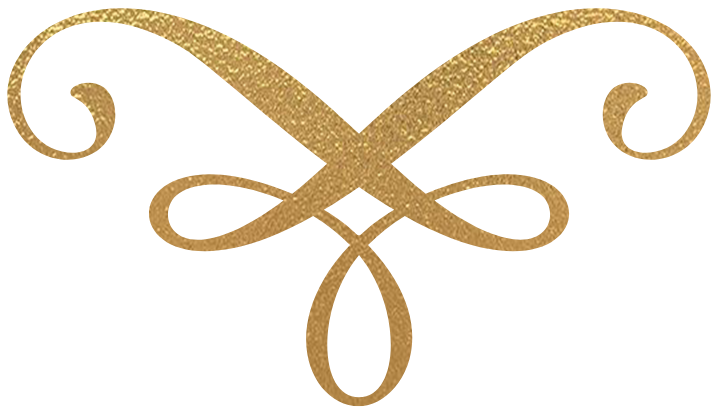

'Abdu'l-Bahá in front of His home at 7 Haparsim in Haifa. 'Abdu'l-Baha in the Holy Land.

According to Shoghi Effendi, several years before the end of 'Abdu'l-Bahá's Journeys to the West, He pens two Tablets in which He alludes to His passing:
O ye My faithful loved ones! Should at any time afflicting events come to pass in the Holy Land, never feel disturbed or agitated. Fear not, neither grieve. For whatsoever thing happeneth will cause the Word of God to be exalted, and His Divine fragrances to be diffused.
'Abdu'l-Bahá, quoted in Shoghi Effendi, God Passes By
Remember, whether or not I be on earth, My presence will be with you always.
'Abdu'l-Bahá, quoted in Shoghi Effendi, God Passes By
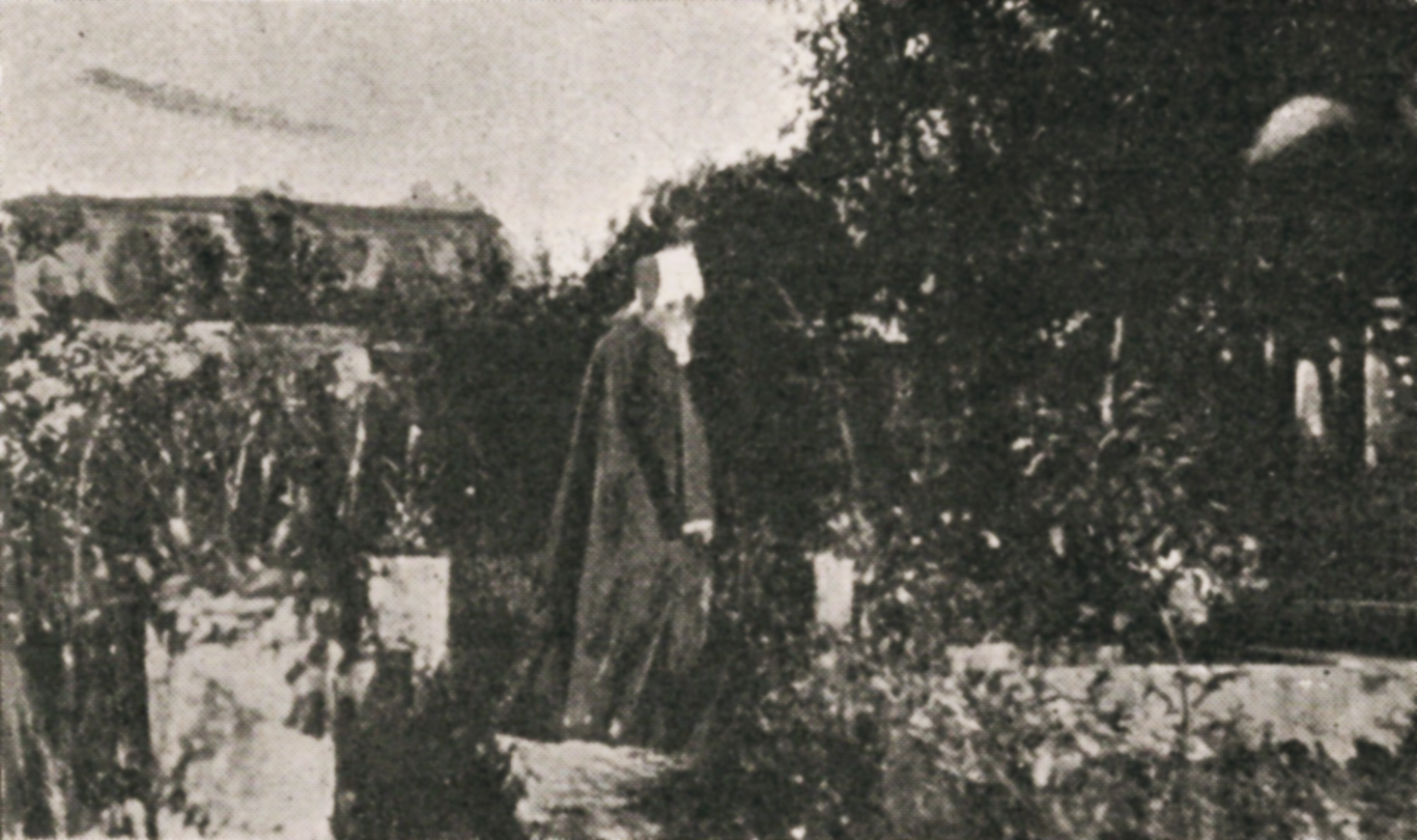
‘Abdu'l-Bahá in His garden in Haifa, undated. (source)

In Ramleh, on November 26, 1913, Ahmad Sohrab and ‘Abdu'l-Bahá are returning home after visiting Bahá'ís. Before they reach their destination, Ahmad Sohrab mentions that a number of believers in some part of the world have been asking for ‘Abdu'l-Bahá to visit them. ‘Abdu'l-Bahá grows silent, and after a minute, says:
Oh! My thoughts do not belong to this world and its activities. My thought is diametrically opposed to their thought! They want me to be in their midst, but I long, oh, I so long to be in the Kingdom of Abhá! There, there, I shall rest. I am waiting for the coming of that auspicious day. Then and now is the time for the believers to arise and perform these services. With greater power and concentration of purpose they must arise to spread the Message of the Kingdom. From the Kingdom of Abhá I shall look down upon them and confirm and assist them. No catastrophe must shake their aim. Best thou assured that I shall confirm them, protect and watch over them. I shall live in their hearts forever and ever.
The Diary of Ahmad Sohrab, 26 November 1913
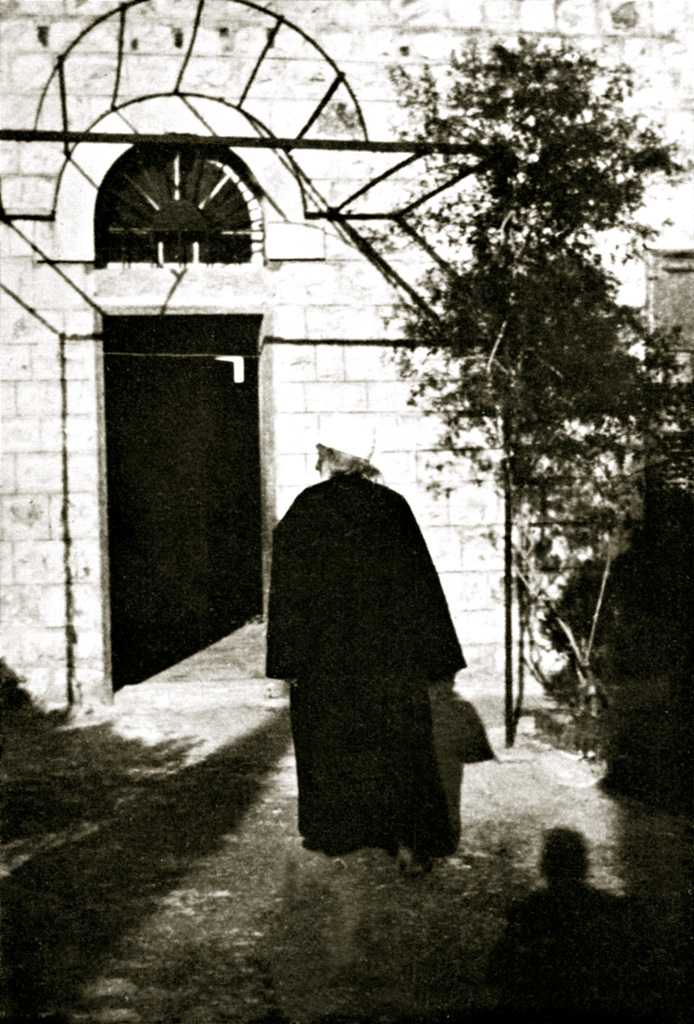
‘Abdu'l-Bahá entering 7 Haparsim, undated. Source.

While in 'Akká on His fifth day back in the Holy Land, 'Abdu'l-Bahá has spent a long day and many hours paying visits to many friends in the town. Sitting with several young Bahá'ís, tired from His efforts, 'Abdu'l-Bahá addresses the youth with these poignant words, where He empowers the youth to continue His work:
My work is done. The tree of my life has yielded. its fruits. I have set a fire in the world. Your duty is to add to its flame. My sons! It is now your turn. The members of my constitution are well-nigh disintegrated. You are young, and your blood is pure, your intelligence is keen. You can bear the difficulties of this life.
The Diary of Ahmad Sohrab, 10 December 1913

'Abdu'l-Bahá in front of His home at 7 Haparsim in Haifa. 'Abdu'l-Baha in the Holy Land.

Shoghi Effendi tells us that at the end of His "strenuous" Western tours, where He has "Called forth the last ounce of His ebbing strength," 'Abdu'l-Bahá writes to the Bahá'ís a Tablet which contains this excerpt. Bahá'í historian and Hand of the Cause H. M. Balyuzi on page 405 of "'Abdu'l-Bahás: The Centre of the Covenant of Bahá'u'lláh" dates this tablet around the end of February 1914:
Friends, the time is coming when I shall be no longer with you. I have done all that could be done. I have served the Cause of Bahá’u’lláh to the utmost of My ability. I have labored night and day all the years of My life. O how I long to see the believers shouldering the responsibilities of the Cause!… My days are numbered, and save this there remains none other joy for me.
'Abdu'l-Bahá, quoted in Shoghi Effendi, God Passes By
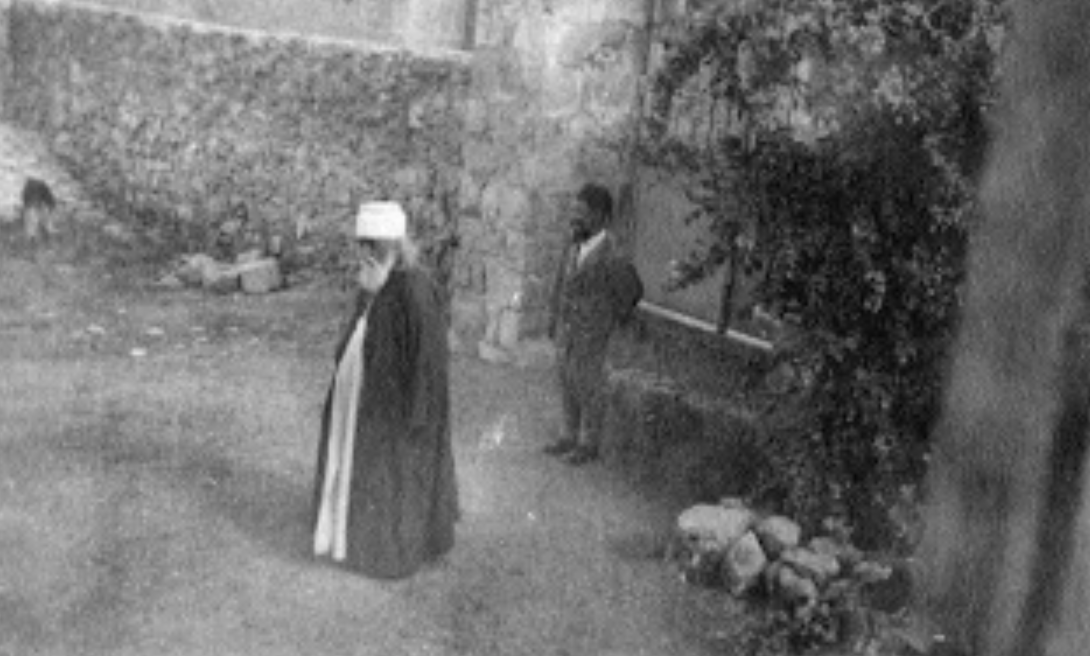
Fujita accompanying Abdu'l-Baha on a visit to the Old Western Pilgrim House across the street from the Master's House. Source: Storytelling in the Bahá'í Faith.

According to Shoghi Effendi, ‘Abdu'l-Bahá turns to a distinguished visitor of His, seated by Him in His garden, suddenly breaking the silence and says:
My work is now done upon this plane; it is time for me to pass on to the other world.
First letter from Shoghi Effendi to the Bahá'ís of America, 21 January 1922
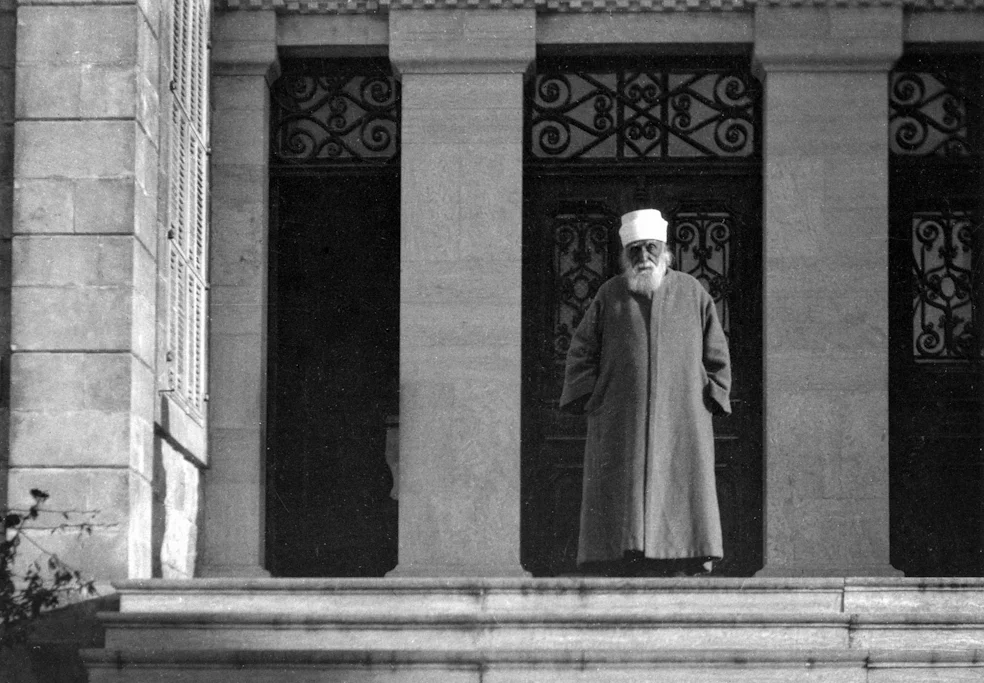
‘Abdu’l-Bahá on the steps of 7 Haparsim Street, the House of the Master, May 1921. Bahá'í Media

Less than six months before His ascension, ‘Abdu’l-Bahá reveals a prayer in honor of a relative of the Báb in which He writes we read these heartbreaking words:
O Lord! My bones are weakened, and the hoar hairs glisten on My head . . . and I have now reached old age, failing in My powers.’ . . . No strength is there left in Me wherewith to arise and serve Thy loved ones . . .
O Lord, My Lord! Hasten My ascension unto Thy sublime Threshold . . . and My arrival at the Door of Thy grace beneath the shadow of Thy most great mercy.
'Abdu'l-Bahá, quoted in Shoghi Effendi, God Passes By

'Abdu'l-Bahá entering the Eastern Pilgrim House. Shoghi Effendi is on the right in dark clothing. 'Abdu'l-Baha in the Holy Land.

‘Abdu’l-Bahá suddenly enters the room where Shoghi Effendi’s father is and says:
Cable Shoghi Effendi to return at once.
Shoghi Effendi’s parents, in consultation with other members of the family, decided that to cable would risk shocking Shoghi Effendi unnecessarily. They opt instead to write a letter conveying this message, which arrives after ‘Abdu’l-Bahá has passed away. Unwittingly, by not strictly obeying ‘Abdu'l-Bahá's directive, they caused Shoghi Effendi a lifelong pain.
Ruhíyyih Rabbáni, The Priceless Pearl

'Abdu'l-Bahá en route to the Shrine of the Báb, on Mount Carmel. 'Abdu'l-Bahá in the Holy Land.

Two months before His passing 'Abdu'l-Bahá tells His family about a dream he has had:
I seemed to be standing within a great mosque, in the inmost shrine, facing the Qiblih, in the place of the Imám himself. I became aware that a large number of people were flocking into the mosque. More and yet more crowded in, taking their places in rows behind Me, until there was a vast multitude. As I stood I raised loudly the call to prayer. Suddenly the thought came to Me to go forth from the mosque. When I found Myself outside I said within Myself: ‘For what reason came I forth, not having led the prayer? But it matters not; now that I have uttered the Call to prayer, the vast multitude will of themselves chant the prayer.’
'Abdu'l-Bahá, quoted in Shoghi Effendi, God Passes By
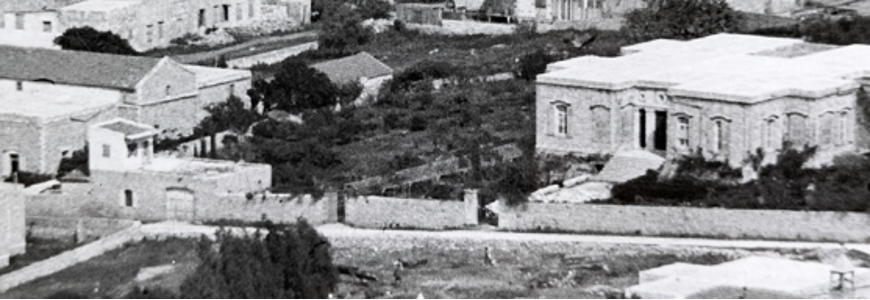
Photograph of ‘Abdu'l-Bahá's house at 7 Haparsim (7 Persian Street), which is the large building with a flat white roof on the right side of the image. The very small, white building on the left side of the image is the the white gardener’s room. The Master often used this room during the day, from where He could see the Shrine of the Báb. Detailed caption provided by Andrew Blake.

A few weeks after the end of September 1921, when 'Abdu'l-Bahá is occupying a solitary room in the garden of His house, He recounts another dream to those around Him:
I dreamed a dream and behold, the Blessed Beauty (Bahá’u’lláh) came and said to Me: ‘Destroy this room.’”
'Abdu'l-Bahá, quoted in Shoghi Effendi, God Passes By
The Bahá'ís present do not understand the significance of this dream until 'Abdu'l-Bahá passes away soon after. It then becomes clear to them that by the “room” Bahá'u'lláh had meant the temple of His body.

'Abdu'l-Bahá in Haifa. 'Abdu'l-Bahá in the Holy Land.

A month before His ascension, 'Abdu'l-Bahá refers to His passing expressly in some words of cheer and comfort that He addresses to a believer who was mourning the loss of his brother.
(From Shoghi Effendi, God Passes By)
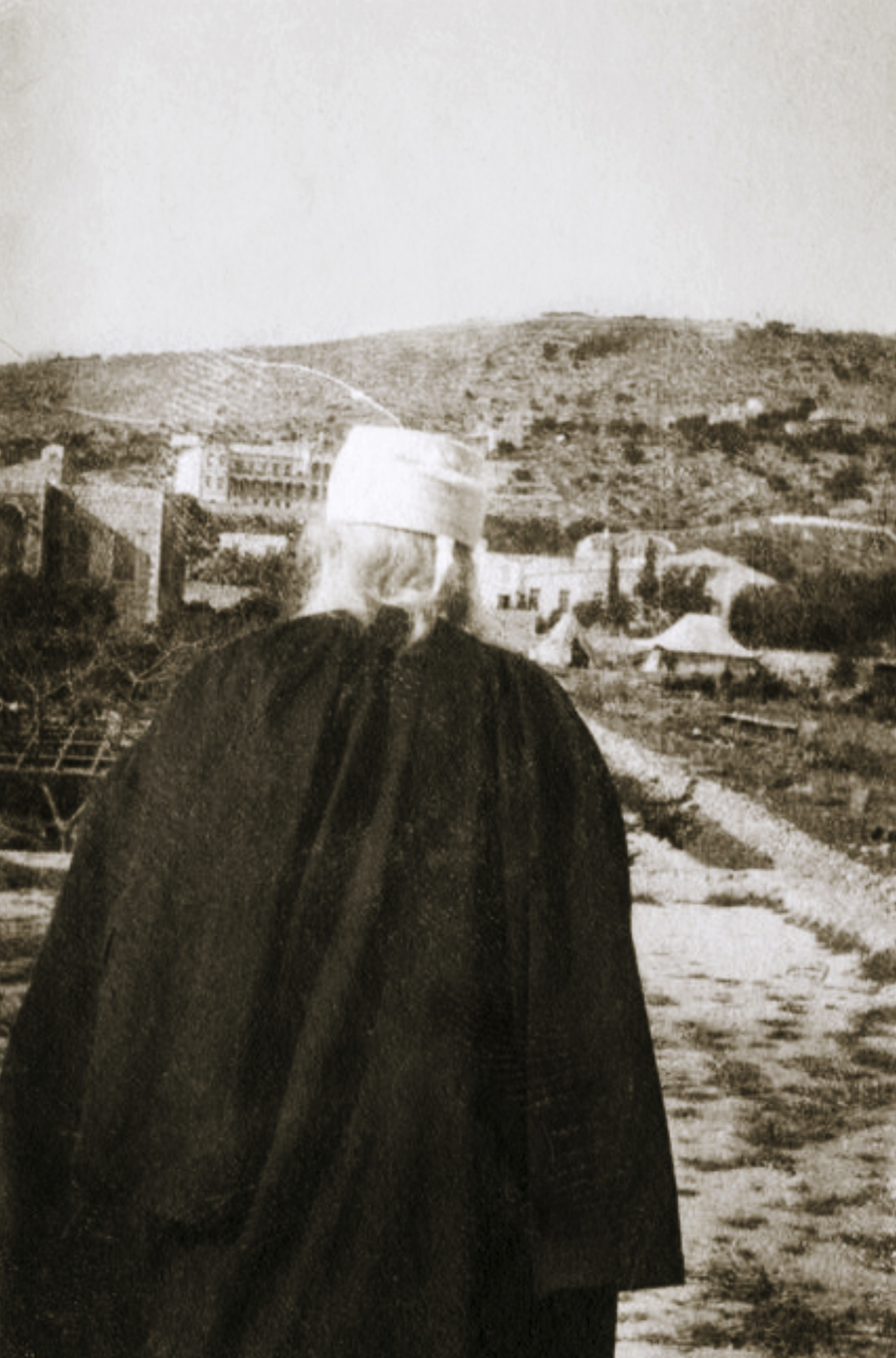
This photograph of 'Abdu'l-Bahá in Haifa was taken from the doorway of small gardener’s room on top of the garage at the Master’s House at 7 Persian Street. The Master often used this room during the day, from where He could see the Shrine of the Báb (just visible in the photo). The small photograph below shows this white gardener’s room (on the extreme left side of the image). Detailed caption provided by Andrew Blake. 'Abdu'l-Bahá in the Holy Land.

In one of His last Tablets, 'Abdu'l-Bahá gives last words of advice to the Bahá'ís:
...for He will eventually take His leave of you all; nay, fix your gaze upon the Word of God … The loved ones of God must arise with such steadfastness that should, in one moment, hundreds of souls even as ‘Abdu’l‑Bahá Himself be made a target for the darts of woe, nothing whatsoever shall affect or lessen their … service to the Cause of God.”
'Abdu'l-Bahá, quoted in Shoghi Effendi, God Passes By
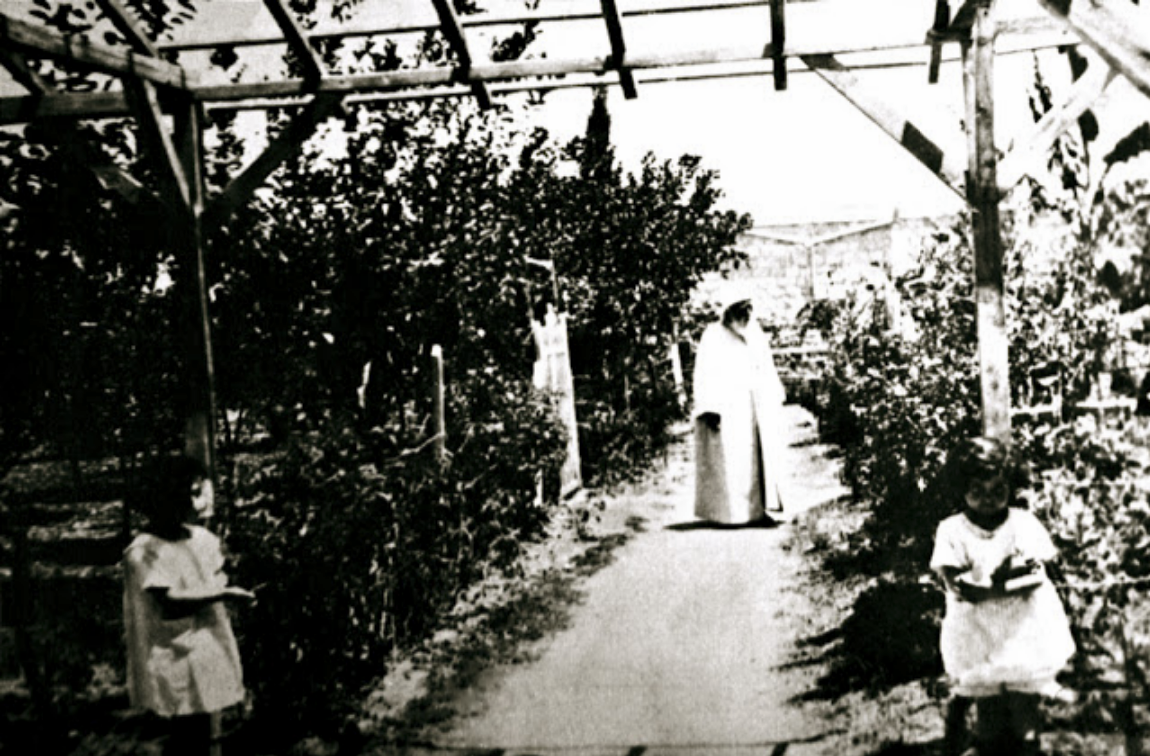
This photograph was taken in the garden of ‘Abdu'l-Bahá's house at 7, Persian Street, from under the trellis on the north (downhill) side of the house. Detailed caption provided by Andrew Blake. Source of the photograph: Abdu'l-Baha in the Holy Land.

Two weeks before His passing 'Abdu'l-Bahá speaks to His faithful gardener in a way that clearly indicates He knows His end is near:
I am so fatigued, the hour is come when I must leave everything and take My flight. I am too weary to walk. It was during the closing days of the Blessed Beauty, when I was engaged in gathering together His papers which were strewn over the sofa in His writing chamber in Bahjí, that He turned to Me and said: ‘It is of no use to gather them, I must leave them and flee away.’ I also have finished My work. I can do nothing more. Therefore must I leave it, and take My departure..
'Abdu'l-Bahá, quoted in Shoghi Effendi, God Passes By
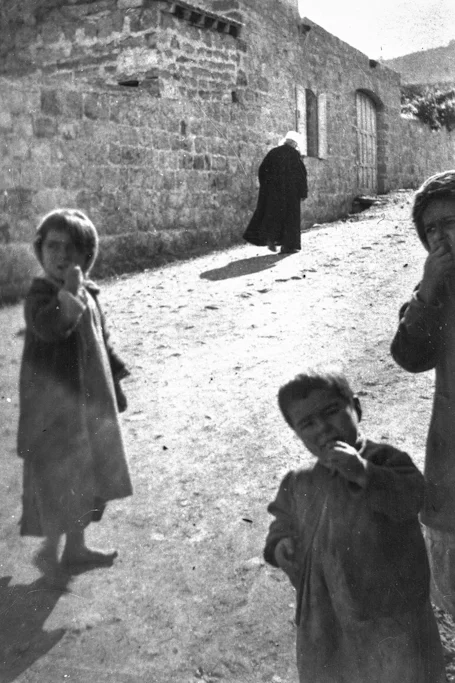
‘Abdu’l-Bahá walking up Haparsim Street with three kids eating sweets that ‘Abdu’l-Bahá just gave them, c. 1920. Bahá'í Media Bank.

Shortly before His passing, ‘Abdu’l-Bahá was in His garden with His faithful servant, Ismá‘il-Áqá.
The Master said: ‘I am sick with fatigue. Bring two of your oranges for me that I may eat them for your sake.’ This I did, and he having eaten them turned to me, saying ‘Have you any of your sweet lemons?’ He bade me fetch a few . . . Whilst I was plucking them, he came over to the tree, saying, ‘Nay, but I must gather them with my own hands.’ Having eaten of the fruit he turned to me and I asked ‘Do you desire anything more?’ Then with a pathetic gesture of his hands, he touchingly, emphatically and deliberately said: ‘Now it is finished, it is finished!’ These significant words penetrated my very soul. I felt each time he uttered them as if a knife were struck into my heart. I understood his meaning but never dreamed his end was so nigh.
Redman, Earl. Visiting 'Abdu'l-Baha Vol 2: Volume 2: The Final Years, 1913–1921 (pp. 211-212).
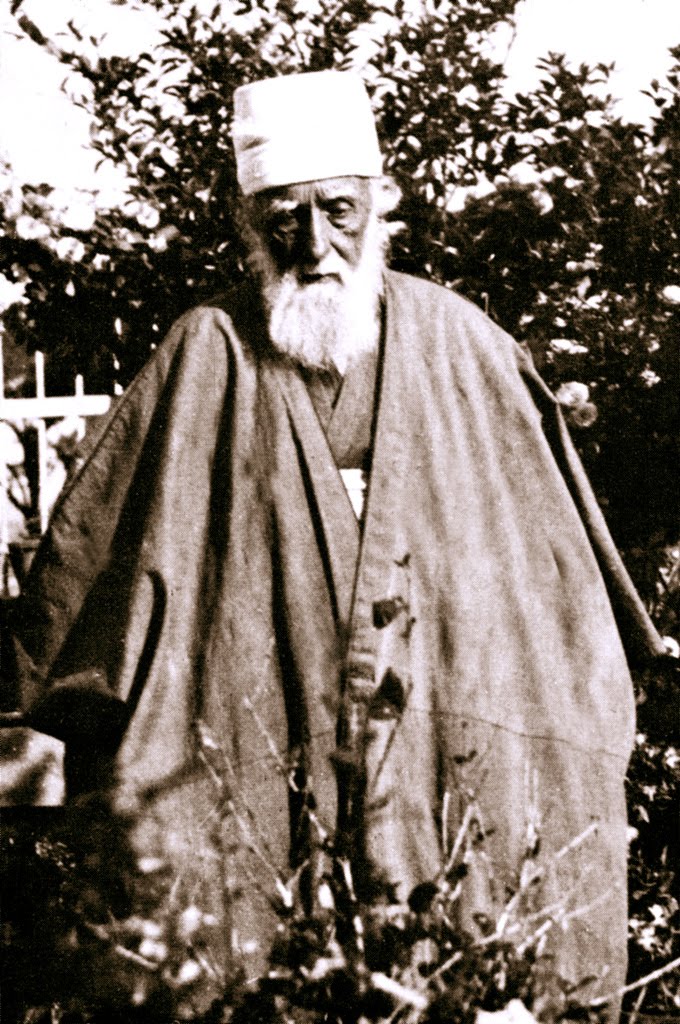
‘Abdu'l-Bahá in the garden surrounding the Shrine of Bahá'u'lláh at Bahjí, His most beloved of all places, on May 1, 1921. Source.

A few days before 'Abdu'l-Bahá passes away, He shares His longing to leave this world in a Tablet addressed to the American believers:
I have renounced the world and the people thereof … In the cage of this world I flutter even as a frightened bird, and yearn every day to take My flight unto Thy Kingdom. Yá Bahá’u’l-Abhá! Make Me drink of the cup of sacrifice, and set Me free.
'Abdu'l-Bahá, quoted in Shoghi Effendi, God Passes By
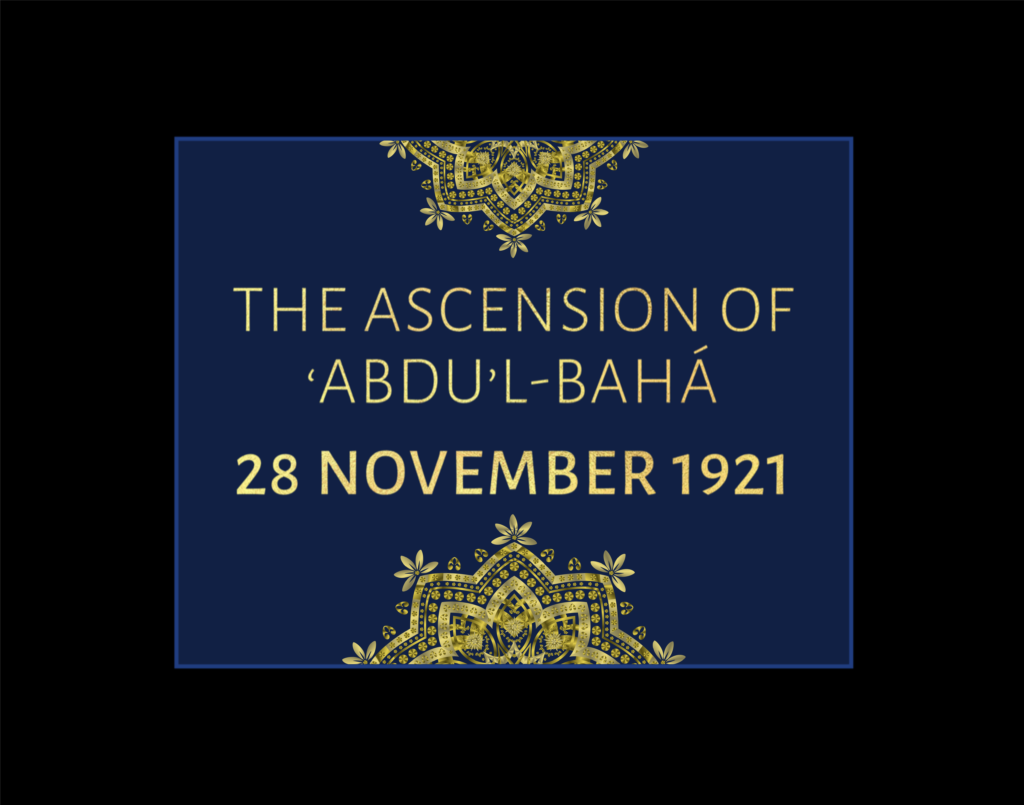
Graphic by Joe Paczkowski

This photograph of ‘Abdu'l-Bahá as one of the pallbearers of Mírzá Abu’l-Ḥasan Afnán, is one of the last photographs ever taken of the Master. a very grainy, and cropped version of this photograph was published in Star of the West Volume XII, number 18 on page 281. This copy was provided for the chronology courtesy of the National Bahá'í Archives of the United States, uncropped and in high-definition. The caption on the back of the photo reads: "The Master carrying the funeral of Mírzá Abu’l-Ḥasan Afnán on His shoulders. Photo taken by L.S.H. [Lotfulláh Hakim, future member of the Universal House of Justice] ten days before the Master's Ascension.

Mírzá Abu’l-Ḥasan Afnán, a Persian nobleman and descendant of the family of the Báb, had lived a long time in the Holy Land, and was very close and attached to ‘Abdu'l-Bahá. The Master caught a cold on Friday, November 18, 1921. The next morning, Saturday, November 19, Mírzá Abu’l-Ḥasan Afnán dismissed his servant saying he was going away. He realized ‘Abdu'l-Bahá's passing, "the most great calamity," was impending, and he could not bear to live through it. And so, this devoted Bahá'í wrote a supplication to ‘Abdu'l-Bahá, walked for two hours, and, arriving at the shore of the Mediterranean, threw himself into the sea. Bahá'ís brought his body ashore, and on Sunday, November 20, when the believers were carrying his casket from the house for interment, ‘Abdu'l-Bahá arrived and acted as pallbearer to his dear friend.
‘Abdu'l-Bahá, after this tragedy, took great care in advising the Bahá'ís:
You must not injure yourselves or commit suicide... It is not permissible to do to yourselves what Mírzá Ḥasan Afnán did to himself. Should anyone at any time encounter hard and perplexing times, he must say to himself: This will soon pass. Then he will be calm and quiet. In all my calamity and difficulties, I used to say to myself: This will pass away. Then I became patient. If anyone cannot be patient and cannot endure, and if he wishes to become a martyr, then let him arise in service to the Cause of God. It will be better for him if he attains to martyrdom in this path. Arise ye in service to the Cause of God as the Apostles arose after the departure of Christ.
Star of the West Volume XII, Number 18, pages 280-281
Star of the West Volume XII, Number 19, page 302.
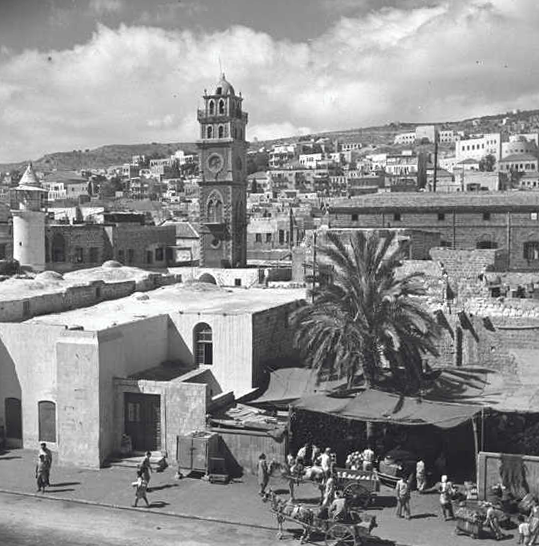
Haifa in 1945 with a mosque in the middle ground (not the mosque ‘Abdu'l-Bahá attended). Wikimedia Commons.

‘Abdu'l-Bahá was greatly fatigued on Friday, November 25, three days before His passing. He nevertheless attended the noonday prayer at the mosque, as had long been His habit. He also distributed alms to the poor after the mosque, again one of the Master's many decades-long custom, since the days of ‘Akká.
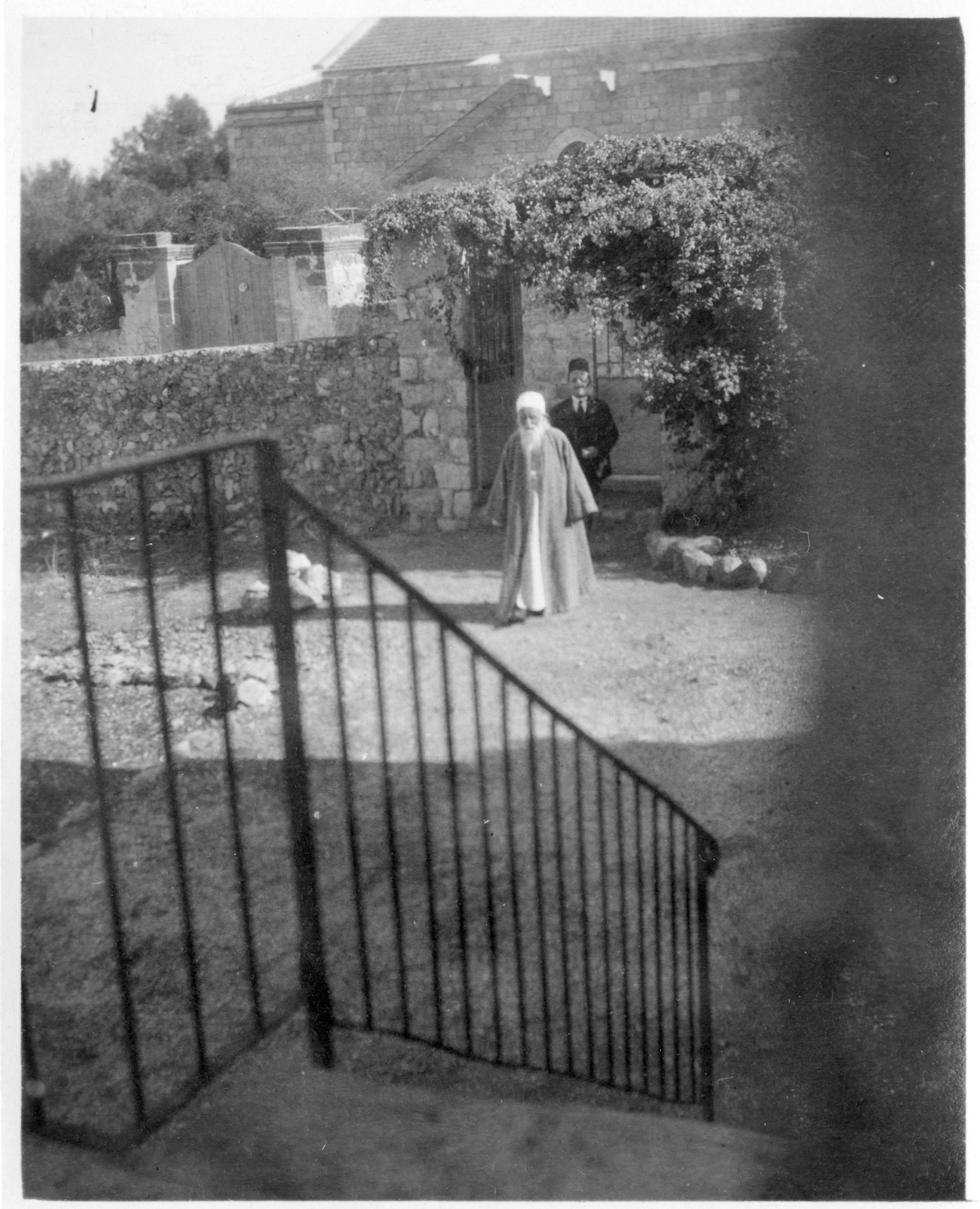
This is the last photograph ever taken of ‘Abdu'l-Bahá before He passed away, in Haifa on November 18, 1921. We are very grateful to the National Bahá'í Archives of the United States for having provided us with a high-definition copy of this photograph for use in the chronology. The caption on the back of the photograph reads: The last photo ever taken of the Master. Taken while He was coming into the Pilgrim House, Haifa to have lunch with the friends. Photo taken by L.S.H. [Lotfullah Hakim, future member of the Universal House of Justice] ten days before the Master's Ascension.

Friday, November 25 would be the last day ‘Abdu'l-Bahá ever attended the usual meetings of the friends, and the last day most of the pilgrims would ever remember seeing ‘Abdu'l-Bahá. John Bosch remembered, later, the last time he had spoken to ‘Abdu'l-Bahá. He had entered the garden of the Master's house and had seen ‘Abdu'l-Bahá giving instructions to the gardener, walking up and down the garden lanes, like almost any morning, picking oranges here and mandarins there with His own hands, and giving them to the visitors: several Persians, Hindus and Arabs. when John Bosch approached, he, too, got a mandarin and ‘Abdu'l-Bahá smiled and told him in English: "Eat!"
At noon, ‘Abdu'l-Bahá came to lunch in the Pilgrim House and spoke to several guests. As usual, ‘Abdu'l-Bahá only helped Himself to small portions but heartily encouraged the pilgrims to help themselves to more. When lunch was finished, ‘Abdu'l-Bahá rose from the table and turned to the pilgrims, His hands turned upwards, His face radiant and smiling and he repeated three times "Good afternoon, Good afternoon, Good afternoon."
Those were ‘Abdu'l-Bahá's last words to the pilgrims.
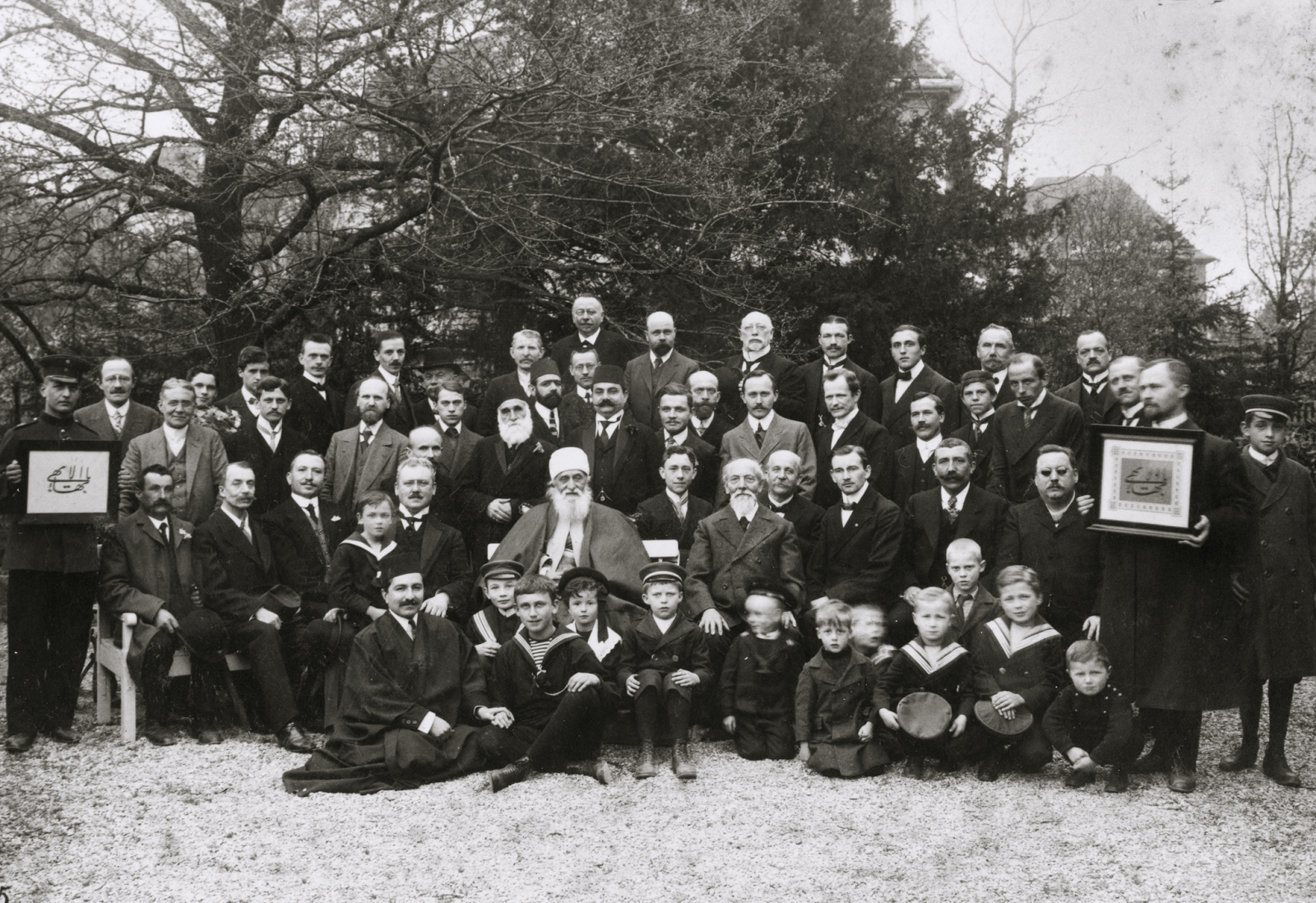

This is the day on which ‘Abdu'l-Bahá dictated the very last Tablet of His life to His secretary, Rúhí Effendi. Below is the full text from the Star of the West issue where this Tablet was printed:
His very last Tablet, graciously revealed for His loved ones in Stuttgart, conveys His reflections upon this transient world, and His counsels to His loved ones that dwell therein:
O ye beloved of the Lord! In this mortal world, nothing whatsoever endureth. The peoples of the earth dwell therein and spend a number of days uselessly, ultimately descending be-neath the dust, repairing to the home or eternal silence leaving behind them no achievement, no blessing, no result, no fruit. All the days of their life are thus brought to naught: whereas the children of the Kingdom sow seeds in the fertile soil of Truth that will eventually spring up and bring forth many a harvest and shall forever bestow upon mankind its increase and bountiful grace. They shall obtain eternal life, attain unto the imperishable bounty and shine even as radi-ant stars in the firmament of the Divine Kingdom.
The Glory of Glories rest upon you.
From Star of the West, Volume XIII, Number 9, pages 236-237
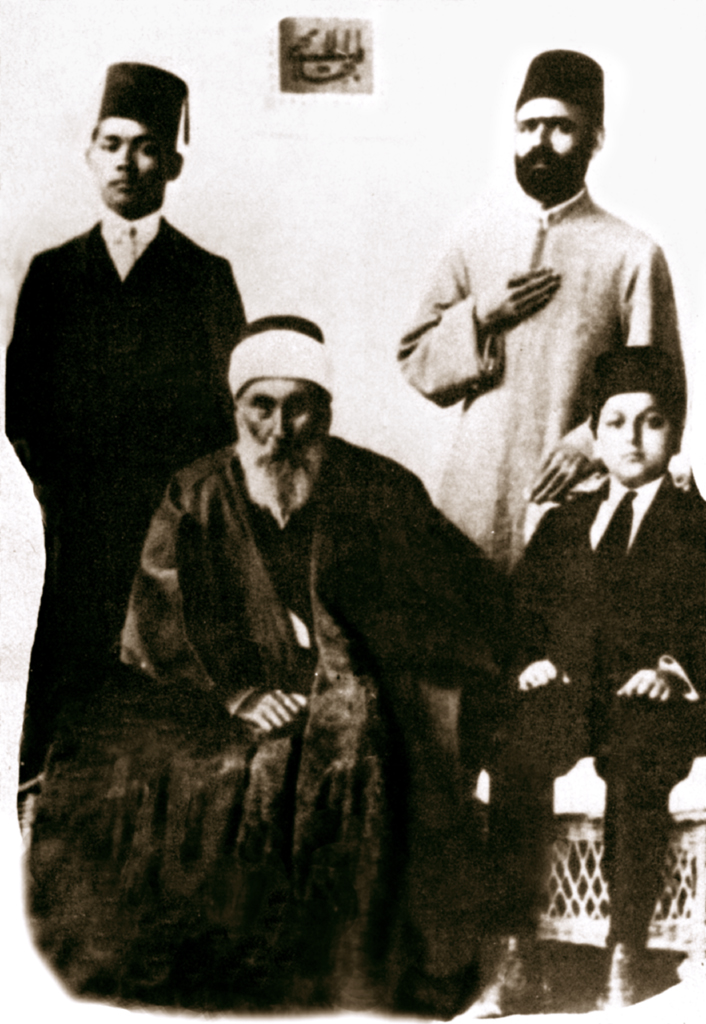
This photograph shows many important people in ‘Abdu'l-Bahá's life: first, Shoghi Effendi, around five or six years old, seated on the right. Second, Ḥájí Mírzá Ḥaydar-‘Alí, one of the outstanding Bahá'ís of his era titled "the Delight of Hearts." Third, standing on the right, Mírzá Maḥmúd-i-Zarqání, ‘Abdu'l-Bahá's constant assistant, secretary and diarist during His travels to the west, and last, Áqá Khusraw, an extraordinary character we have had the pleasure of encountering often in the chronology, he was a devoted servant to ‘Abdu'l-Bahá, of Burmese descent, and dearly beloved by the Master. and the one whose wedding ‘Abdu'l-Bahá officiates as one of His very last earthly acts. Source.

One of the things Shoghi Effendi also mentions in God Passes by is ‘Abdu'l-Bahá's insistence on officiating the wedding of one of His servants. Precious details are provided by eyewitnesses. The servant in question was none other than our beloved Áqá Khusraw. Áqá Khusraw was a constant companion of ‘Abdu'l-Bahá's for decades.
During some portions of ‘Abdu'l-Bahá's travels in the West excluding America, Áqá Khusraw was His cook, and he was known to joke that to him, London, Paris, all looked the same: like the inside of a kitchen! Because he was the Master's cook, he was the one who most often made tea for ‘Abdu'l-Bahá, wherever they were. He was the one who accompanied ‘Abdu'l-Bahá when the Master needed to go away for a few days in Ábu Qír, or 'Ismailia for a few days. In Egypt many stories feature Áqá Khusraw and he was the one turned back at Naples with Shoghi Effendi when they were on their way to America in March 1912.
Áqá Khusraw was Burmese, and his life had started a continent away. One day, a Bahá'í pilgrim making His way from India to the Holy Land passed through a slave market and saw a lost-looking child, about six years old standing on the street block, waiting to be sold. The man was so moved that he BOUGHT the child and took him to Palestine. ‘Abdu'l-Bahá took in the boy, had him brought up in His own family and educated. This boy was Áqá Khusraw, and he was to be married on Friday, November 25, 1921.
It seem as though there might have been talk of postponing the wedding, because it is clear from several eyewitness accounts that ‘Abdu'l-Bahá insisted not only that the marriage take place that day, but that, should His daughters not be able to make the preparations for the wedding, that He would do so Himself! The wedding between Áqá Khusraw and his Persian bride, the daughter of a martyr, also brought up in prison in Palestine, took place that very night, and ensuring the wedding took place was one of ‘Abdu'l-Bahá's last earthly acts on behalf one of His dearest friends. Later in the evening, ‘Abdu'l-Bahá blessed Áqá Khusraw and his bride and told his old friend:
Khusraw, you have spent your childhood and youth in the service of this house; it is my hope that you will grow old under the same roof, ever and always serving God.
It is interesting to keep in mind that because this wedding took place less than 48 hours before ‘Abdu'l-Bahá's passing, the House of the Master was still full of wedding guests when ‘Abdu'l-Bahá passed away. It is also very poignant to see ‘Abdu'l-Bahá's last gesture from Áqá Khusraw's vantage point: having been so attached to ‘Abdu'l-Bahá since his earliest childhood, the comfort or marriage was the Master's last gift to him before His passing. As devastated as Áqá Khusraw undoubtedly was, he was not left alone.
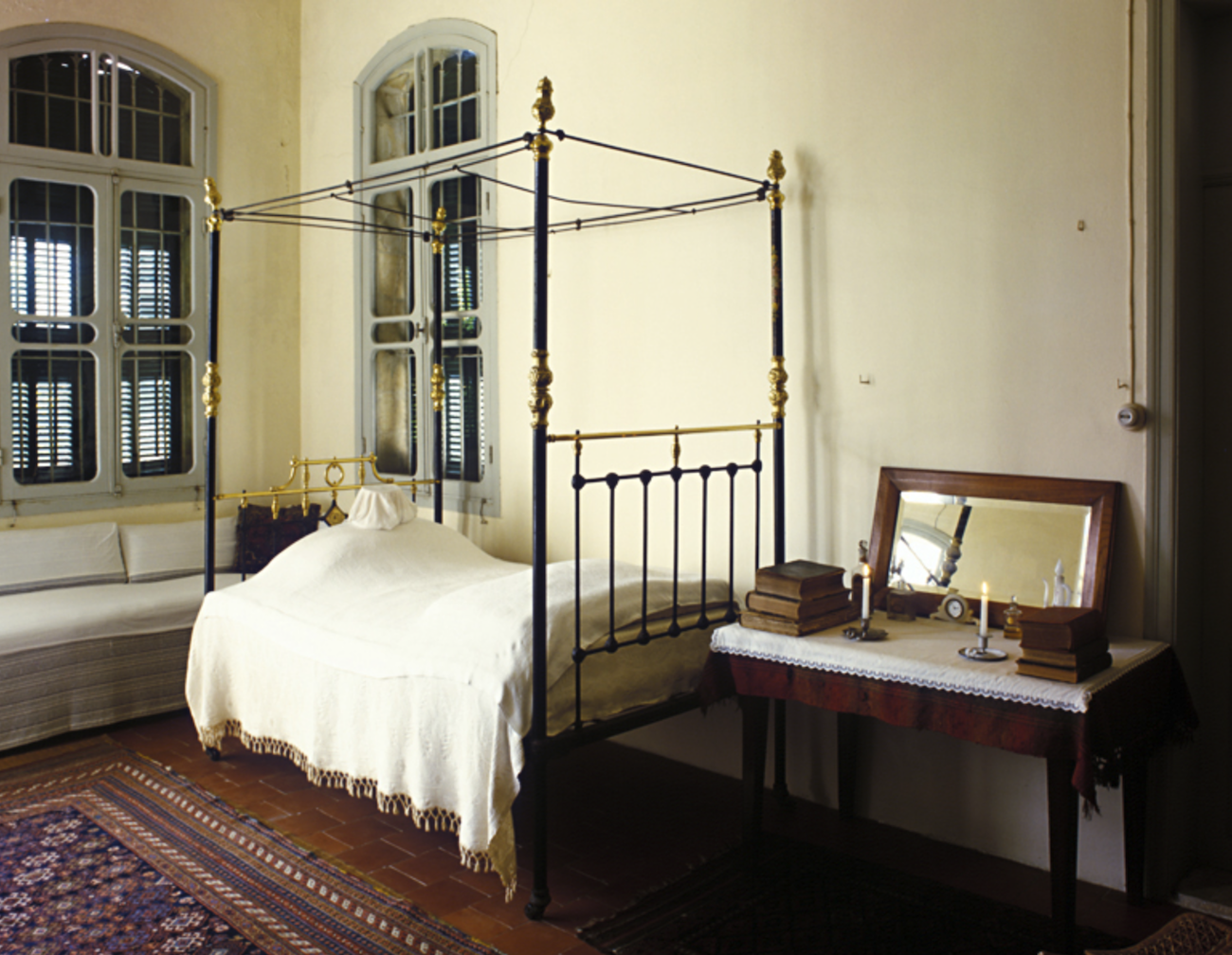
The bedroom of 'Abdu'l-Bahá in His house at 7 Haparsim in Haifa, where He passed away. Source: Baha'i Points of Interest.

In the morning of Saturday, November 26th, 'Abdu'l-Bahá rises early and has tea in the tea room. The Master’s illness which started with a cold over a week ago on November 18, has progressively developed into a fever and 'Abdu'l-Bahá starts feeling very cold. The Master asks for Bahá'u'lláh’s fur-lined coat, a garment He dearly loves and often wears when He is cold or feeling unwell. 'Abdu'l-Bahá then withdraws from the tea-room to His bedroom and lays down on His bed, telling His daughter Munavvar Khánum: "Cover me up. I am very cold. Last night I did not sleep well, I felt cold. This is serious, it is the beginning."
Several blankets are put on the bed and 'Abdu'l-Bahá asks for Bahá'u'lláh’s fur coat, which He had removed, to be placed over Him. 'Abdu'l-Bahá’s temperature will keep rising until it reaches 40° Celsius (104° Fahrenheit), but by evening, the fever lessens, and has disappeared in the night. After midnight, 'Abdu'l-Bahá asked for some tea. The Master’s ebbing and flowing fever is a heartbreaking reminder of the fever that took Bahá'u'lláh's life 29 years ago, which also came, grew in intensity, abated, then returned and took His life.
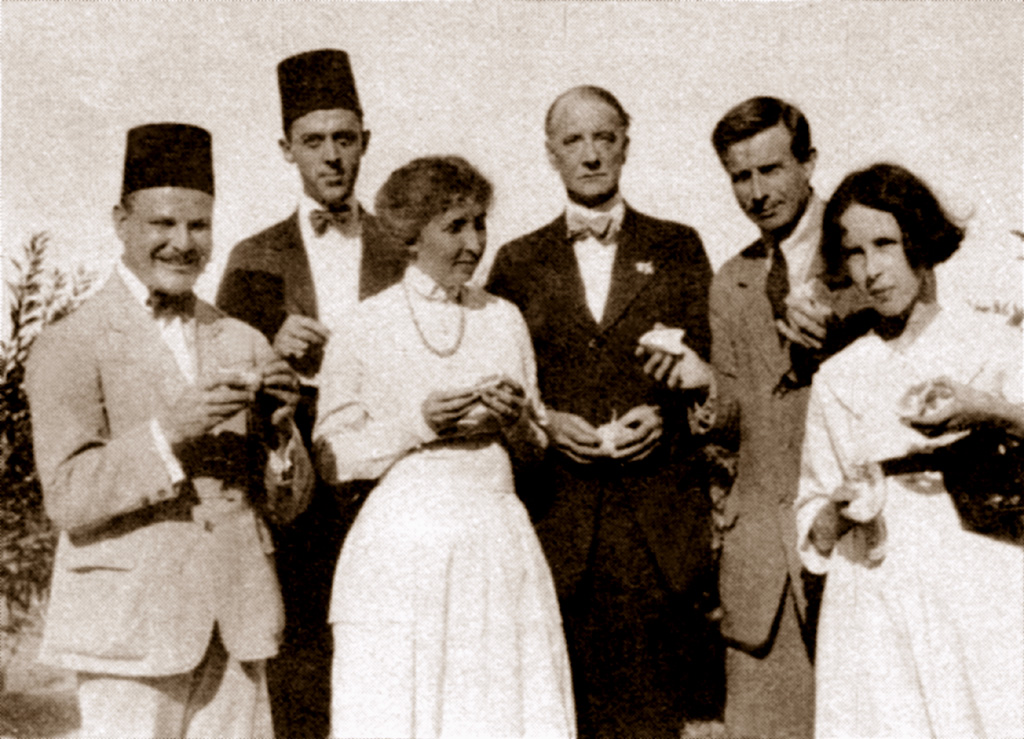
A group of Western pilgrims in Haifa eating fruit from 'Abdu'l-Baha's garden, November 1919. Left to right: George Latimer, Arthur Hathaway, Ruth Randall, Harry Randall, Dr. Esslemont, and Bahiyyih Randall. Source: Worldwide Community of Bahá'u'lláh.

When 'Abdu'l-Bahá awakes on Sunday, November 27, the fever is gone and He seems much better. He says: "I am quite well and will get up as usual and have tea with you in the tea room." After the Master dresses, He is persuaded to remain on the sofa, in His room.
After lunch, 'Abdu'l-Bahá sends words to the pilgrims, requesting they celebrate the Day of the Covenant by visiting the Shrine of the Báb and attending a Feast in honor of the Holy Day, hosted by a Parsi pilgrim, recently arrived from India.
At four in the afternoon, 'Abdu'l-Bahá, still on the sofa of His room calls for the Greatest Holy Leaf and His family, saying: "Ask my sister and all the family to come and have tea with me."
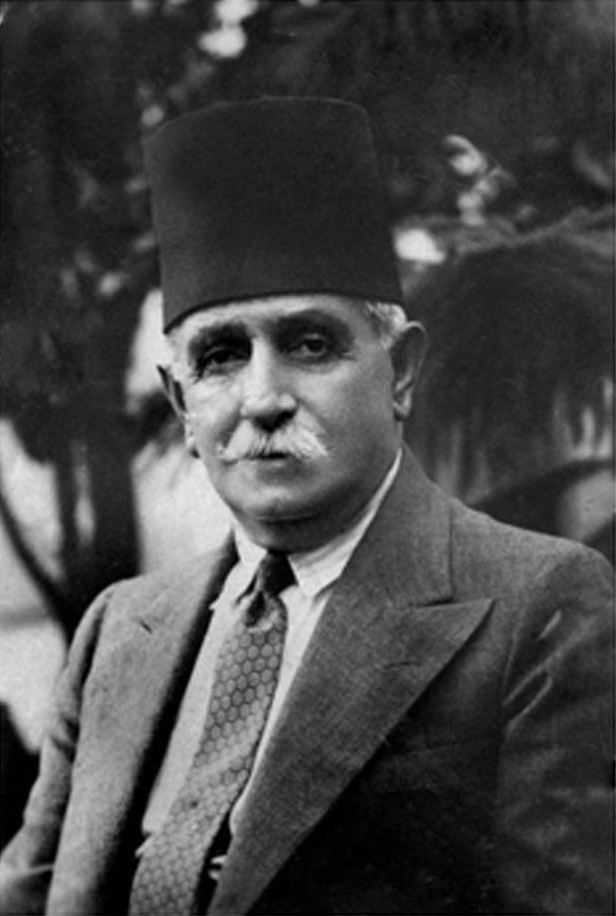
The Mayor of Haifa in 1921, Hassan Bey Shukri. Source: Wikimedia Commons.

After tea with His family, 'Abdu'l-Bahá receives, with His unfailing courtesy, the Mufti of Haifa, the Mayor of Haifa, Hassan Bey Shukri, and a Muslim judge, who, no doubt concerned about His heath, suggest a change of dwelling. The Annafir newspaper of December 6, 1921, recounts the visit of the two notables. In the article we read that when the visitors suggest he change his stone house for a wood-paneled house, out of concern for His health, ‘Abdu'l-Bahá recounts to them His recent premonitory dream and says:
I saw in a dream that I should occupy this room and not choose another one. I have now stopped building on the surface of the earth and I will build within the earth.
Then, with perfect courtesy and ignoring His guests’ pleadings that He should remain in His room and rest on His sofa, He walks them all the way to the door to bid them farewell.
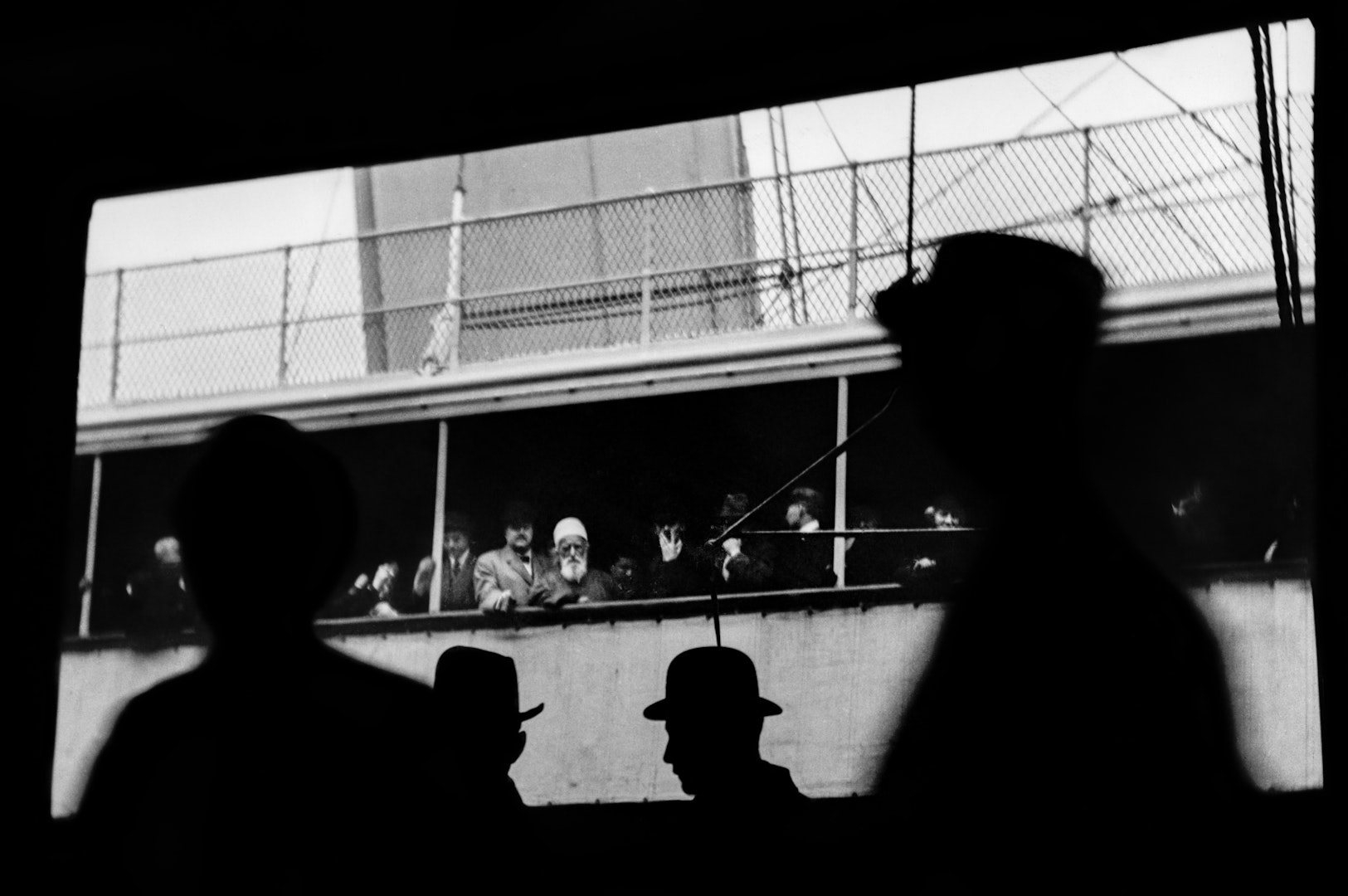
‘Abdu’l-Bahá on board the S.S. Celtic as He sailed from New York City to Liverpool, England, 5 December 1912. Source: Bahá'í Media Bank, © 2023 Bahá'í International Community.

Following the Day of the Covenant celebration, 'Abdu'l-Bahá’s four sons-in-laws and Rúhí Effendi visit 'Abdu'l-Bahá telling Him: “The giver of the feast was unhappy because you were not there.”
'Abdu'l-Bahá’s response is fraught with meaning:
But I was there, though my body was absent, my spirit was there in your midst. I was present with the friends at the Tomb. The friends must not attach any importance to the absence of my body. In spirit I am, and shall always be, with the friends, even though I be far away.
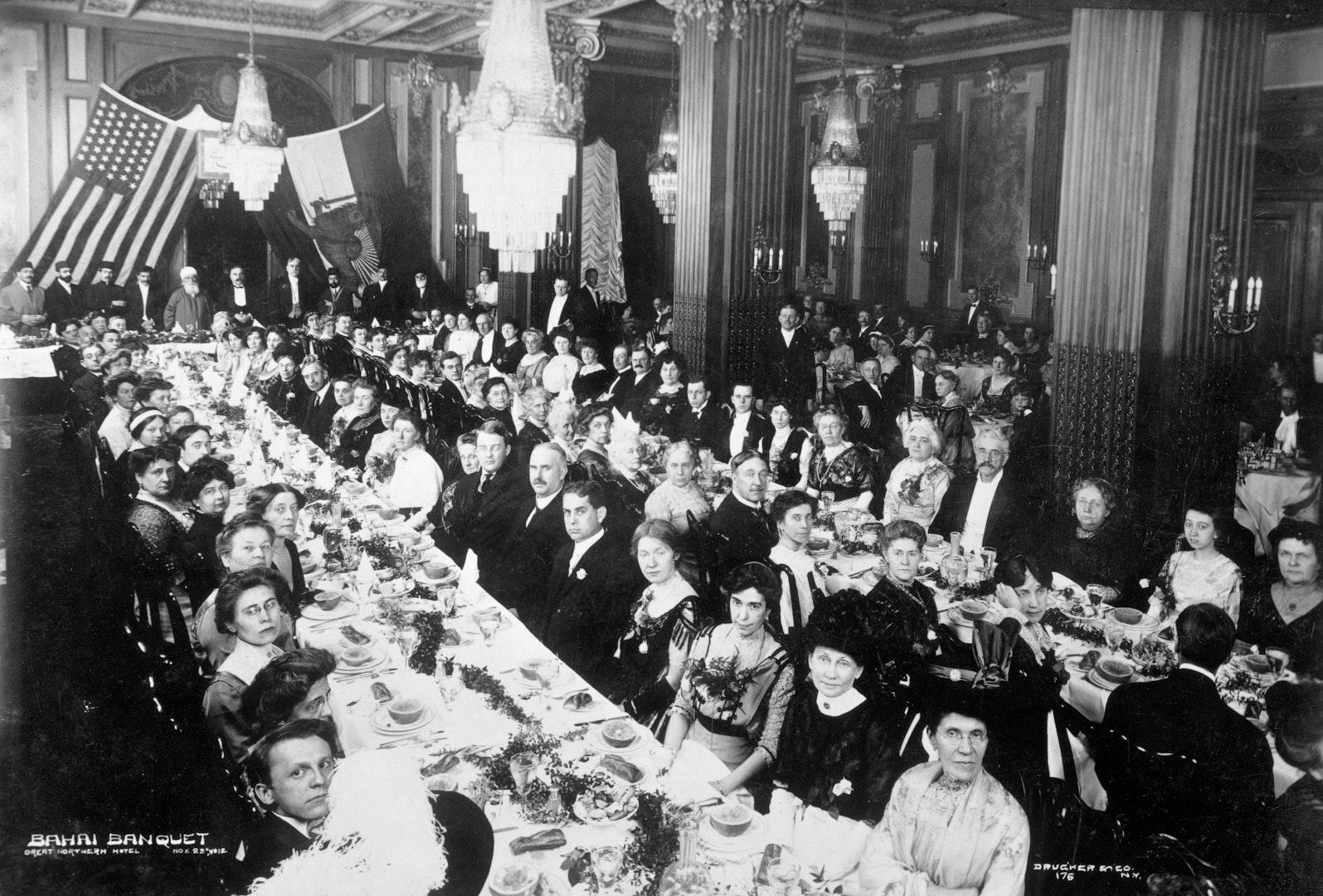
‘Abdu’l-Bahá at a banquet given in His honor at the Great Northern Hotel, New York, New York, 23 November 1912. Source: Bahá'í Media Bank, © 2023 Bahá'í International Community.

The last visitor of the day is the head of the police, an Englishman, and offers Him silk hand-woken handkerchiefs, and after His last visitor, 'Abdu'l-Bahá retires to rest at about 8:30 in the evening.
The very last question 'Abdu'l-Bahá asks in His earthly life, merely five hours before His passing, is a thought for the well-being of everyone but Himself. Before He finally retires, He asks about the health of every member of the Holy Family, all the pilgrims and the Bahá’í friends in Haifa.
When informed that none of them are ill, 'Abdu'l-Bahá says “Very good, very good.” This is to be 'Abdu'l-Bahá’s last utterance concerning His beloved friends, and He goes to bed after eating a little, saying “I am quite well” and telling His family to go to bed and rest.
Two of His daughters, Rúḥá and Munavvar Khánum, stay with Him as 'Abdu'l-Bahá goes to sleep very calmly, free of fever.
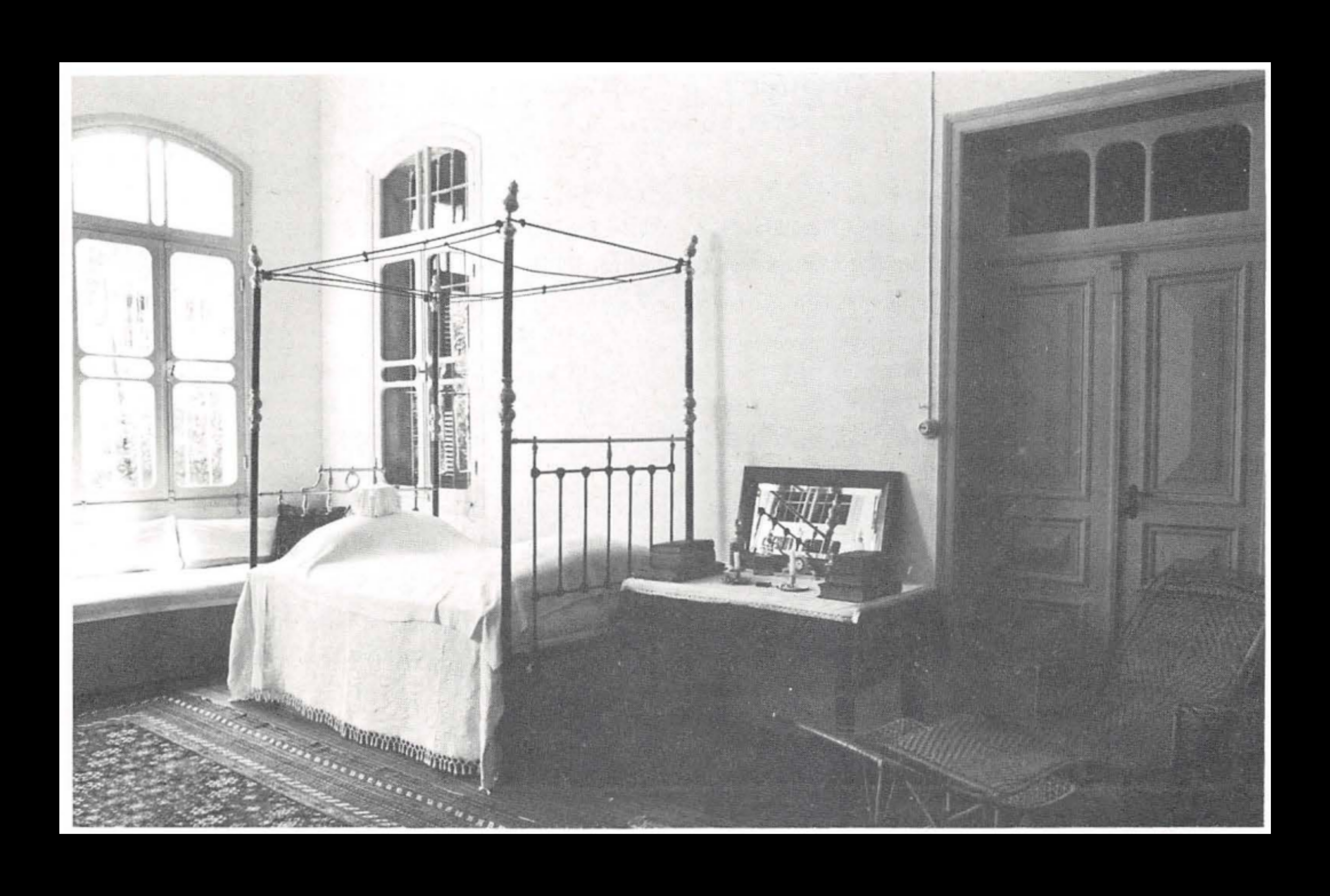
‘Abdu'l-Bahá's bedroom and bed where He passed away on November 29, 1921, now a place of pilgrimage for Bahá'ís in the Holy Land. Star of the West.

'Abdu'l-Bahá awakes at 1.15 in the morning on Monday, November 28. He rises from His bed, and walks across His room to a table where He drinks some water. 'Abdu'l-Bahá removes an outer layer, saying “I am too warm,” and returns to bed. When Rúḥá Khánum approaches her Father, He is lying peacefully. 'Abdu'l-Bahá looks into her face and asks her to lift up the mosquito net, telling her: “I have difficulty in breathing, give me more air.”
'Abdu'l-Bahá is brought some rose water, by either Rúḥá or Munavvar, as they are the only two present, and after drinking some, He lays down again and is offered food. In a clear voice, and giving them a beautiful look, 'Abdu'l-Bahá asks: “You wish me to take some food, and I am going?”
Less than a minute later, 'Abdu'l-Bahá’s spirit had winged its flight to the ‘Abhá Kingdom, reunited at long last with His beloved Father for all eternity, but the expression on His face was so calm and serene that for a moment His daughters thought He had fallen asleep.
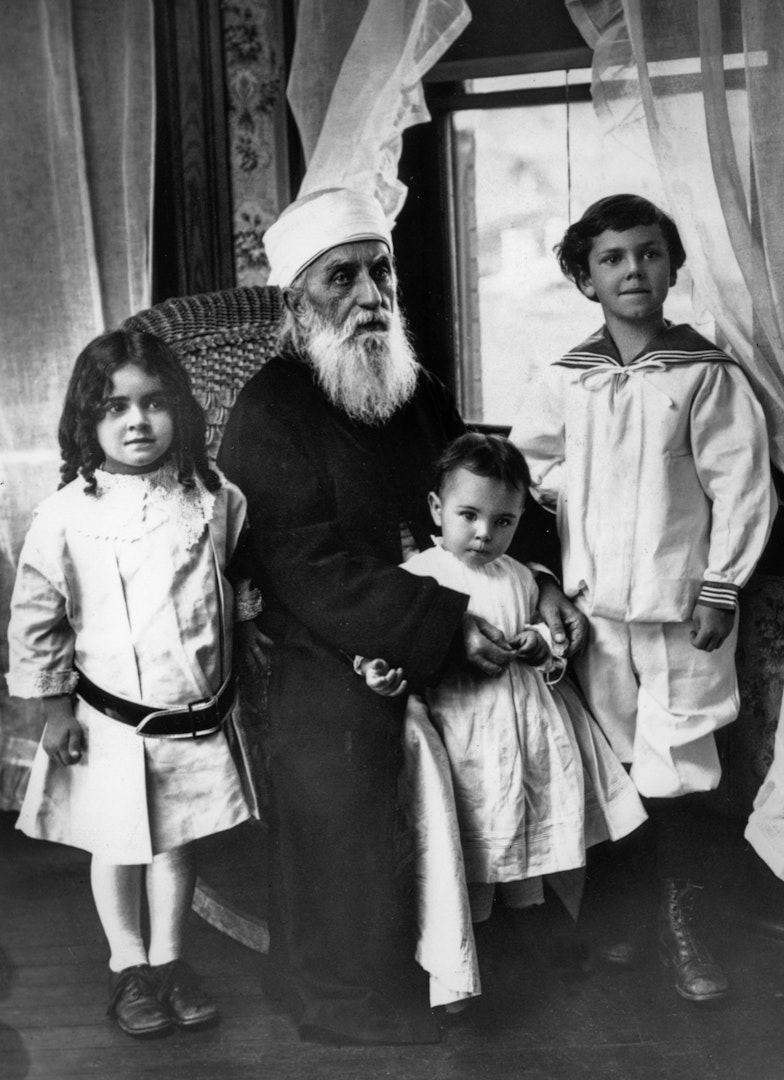
‘Abdu’l-Bahá with three children, 1912. Source: Bahá'í Media Bank, © 2023 Bahá'í International Community.

This paragraph is from Shoghi Effendi and Lady Blomfield: "An Account of the Passing of ‘Abdu'l-Bahá" about the end of ‘Abdu'l-Bahá's earthly life:
He had gone from the gaze of His loved ones! The eyes that had always looked out with loving-kindness upon humanity, whether friends or foes, were now closed. The hands that had ever been stretched forth to give alms to the poor and the needy, the halt and the maimed, the blind, the orphan and the widow, had now finished their labour. The feet that, with untiring zeal, had gone upon the ceaseless errands of the Lord of Compassion were now at rest. The lips that had so eloquently championed the cause of the suffering sons of men, were now hushed in silence. The heart that had so powerfully throbbed with wondrous love for the children of God was now stilled. His glorious spirit had passed from the life of earth, from the persecutions of the enemies of righteousness, from the storm and stress of well-nigh eighty years of indefatigable toil for the good of others. His long martyrdom was ended!
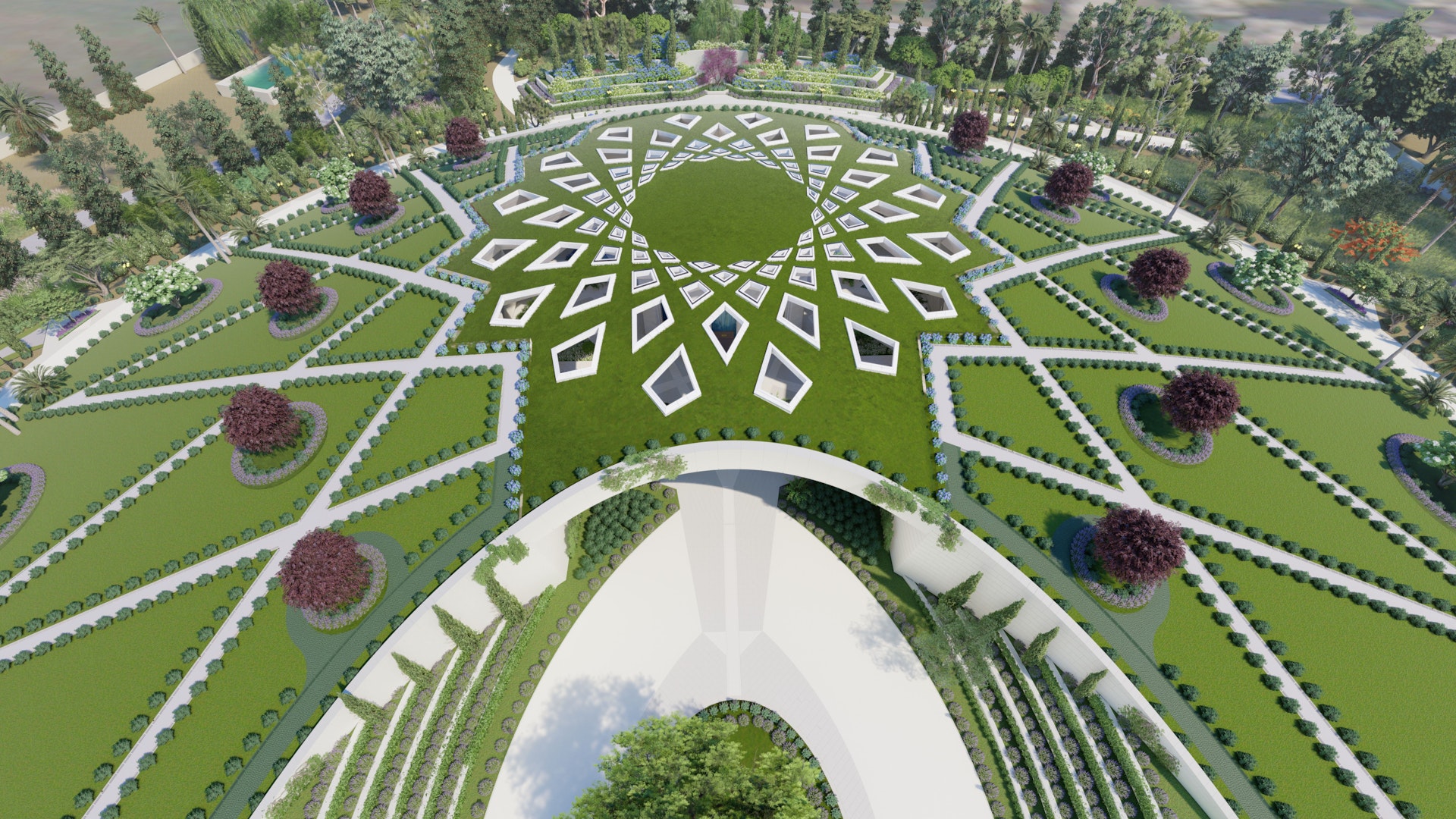
Graphic rendering of the Shrine of ‘Abdu’l-Bahá. Source: Bahá'í Media Bank, © 2023 Bahá'í International Community.

‘Abdu'l-Bahá passed away at the age of 77, at 1:30 in the morning, on Monday, November 28, 1921. On November 27, 2021, at 1:30 in the morning, Bahá'ís the world over will be commemorating the centenary of the Ascension of ‘Abdu'l-Bahá, and it was in honor of this unique once-in-a-lifetime event that this chronology was created.
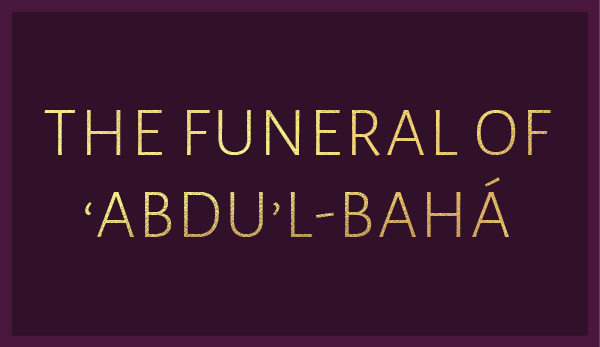
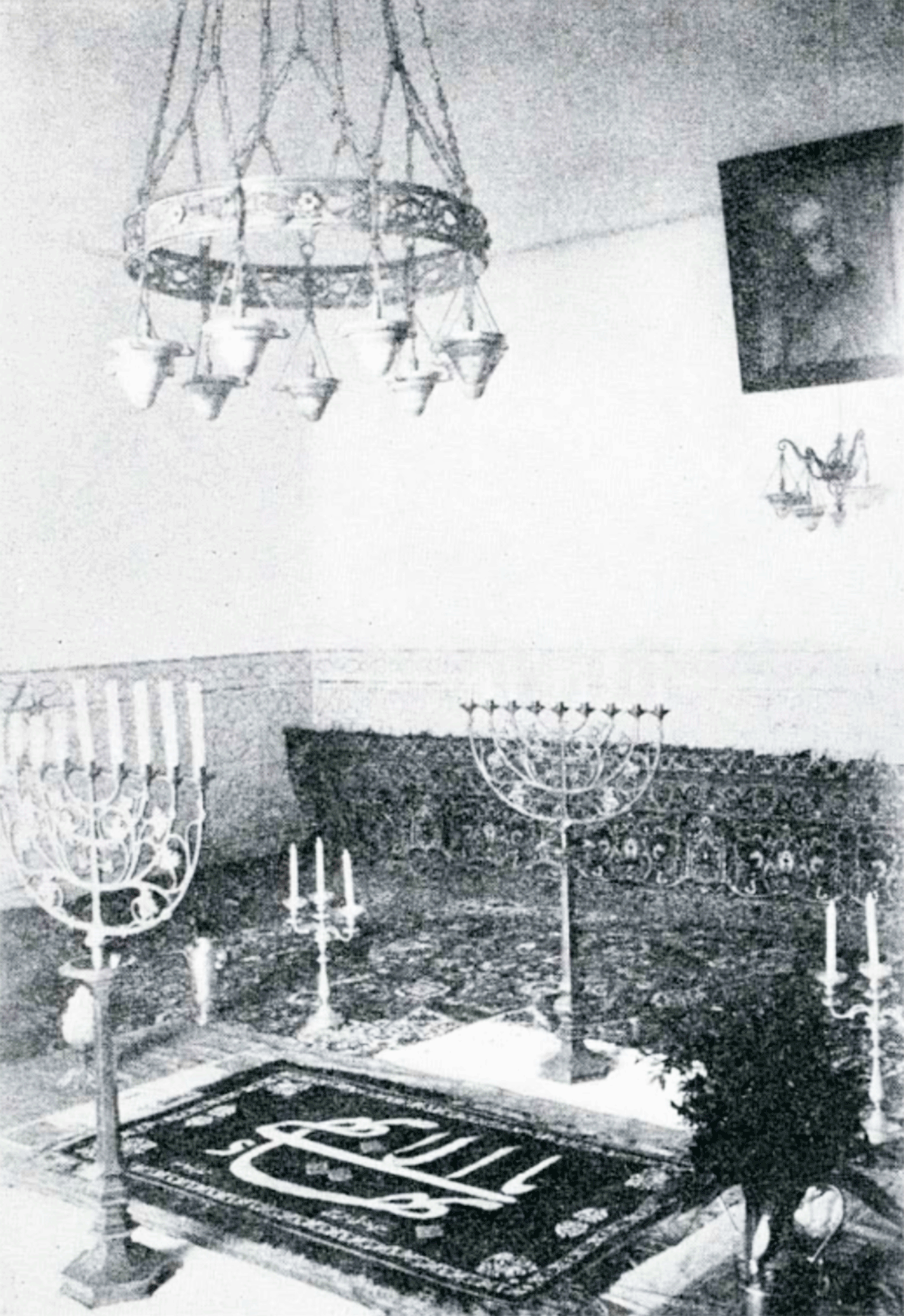
The interior of the Shrine of ‘Abdu’l-Bahá on Mount Carmel. Source: The Bahá’í World. Vol 3, page 22.

In the midst of the devastating shockwave that hits 'Abdu'l-Bahá's family and friends and the pilgrims in the aftermath of His death, the funeral must nonetheless happen shortly, as is the widespread custom in the Middle East. But ‘Abdu'l-Bahá is the Center of the Covenant, and must be buried in a befitting place. After searching through ‘Abdu'l-Bahá's papers, His Will and Testament is soon found, but there is still no indication as to where the Master should be buried. Bahíyyih Khánum, is the person on whose shoulders this heavy responsibility falls. This is when ‘Abbás-Qulí, the custodian of the Shrine of the Báb approaches the Greatest Holy Leaf with a twelve-year old story, dating back to March 21, 1909, the day ‘Abdu'l-Bahá finally laid the remains of the Báb to rest. This is ‘Abbás-Qulí speaking to the Greatest Holy Leaf:
On the day you came up to the shrine for the interment of the remains of the Báb, ‘Abdu’l-Bahá indicated a place for Himself. After He interred the holy remains in their eternal place, He stepped from the vault into a passageway and ordered the opening to be closed and, pointing to the passageway, said, ‘And this should be a place for Us.’ The Greatest Holy Leaf said, ‘Very well.’ She blessed him for what he said and stated: ‘This is where it will be.’
Layla Ábádih'i quoted by Michael V. Day in Journey to a Mountain
The Greatest Holy Leaf selects the vault, according to ‘Abbás-Qulí's indication, under the central northern room of the Shrine of the Báb as the place for ‘Abdu'l-Bahá's resting place. This most important of all decisions, at the time of the passing of the Center of the Covenant, is a testament to the Greatest Holy Leaf's uncommon strength of character and leadership.
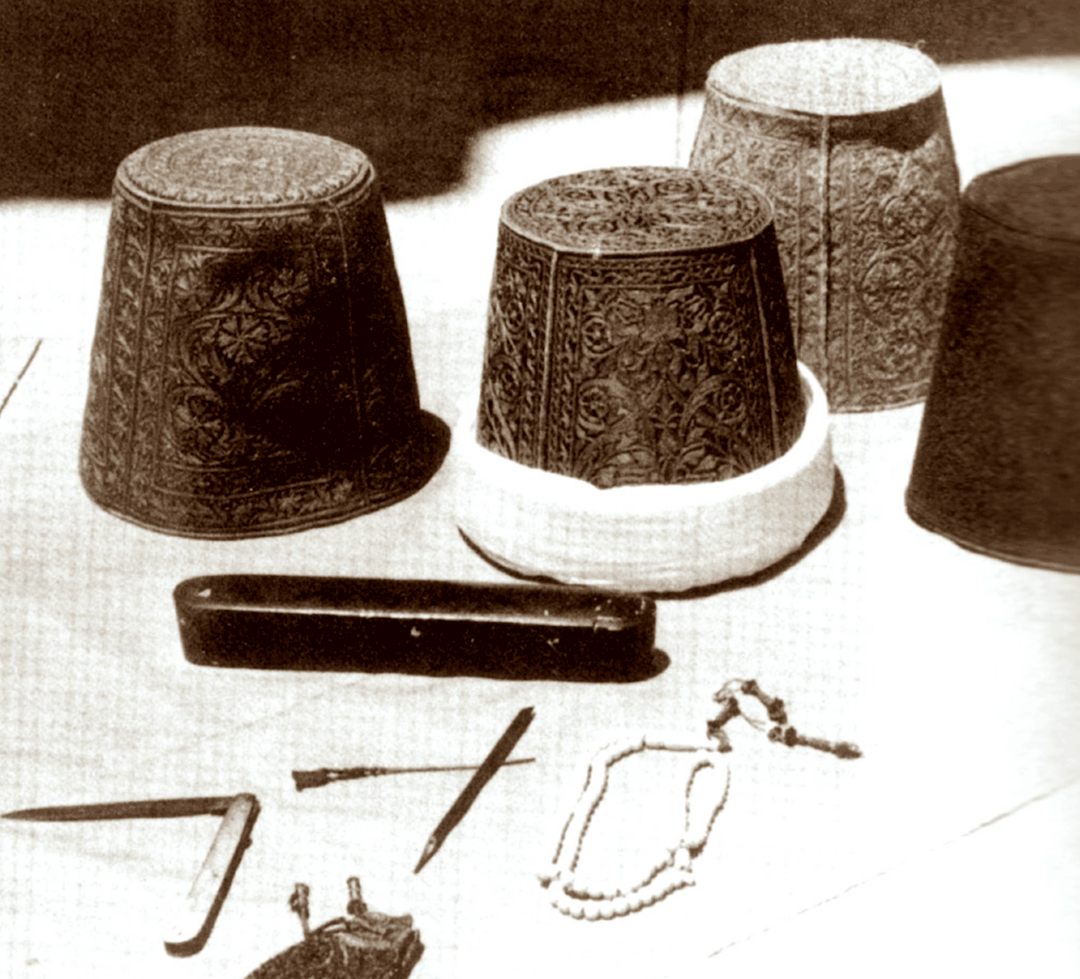
Some relics of Bahá'u'lláh which include some of Bahá'u'lláh's headgear. Source: Bahá'í Sacred Relics.

According to Bahá'í law, ‘Abdu'l-Bahá's body was washed and wrapped in five separate folds of white silk. A black mitre, a particular type of headgear often worn by religious leaders and a gift from Bahá'u'lláh to His eldest son, is placed on His head, and the Master's body left undisturbed until the funeral, the following morning. The Western pilgrims, the only people outside of ‘Abdu'l-Bahá's immediate family, are permitted to see ‘Abdu'l-Bahá's body one last time.
The news of 'Abdu'l-Bahá's Ascension shocks the world, Bahá'í and non-Bahá'í alike:
The news of 'Abdu'l-Bahá's passing, so sudden, so unexpected, spreads like wildfire throughout Haifa, and is flashed instantly over the wires to distant parts of the globe, stunning with grief the community of the followers of Bahá’u’lláh in East and West. Messages from far and near, from high and low alike, through cablegrams and letters, pour in conveying expressions of praise, devotion, anguish, and of sympathy to the members of 'Abdu'l-Bahá's unconsolable family.
Shoghi Effendi's words in God Passes By
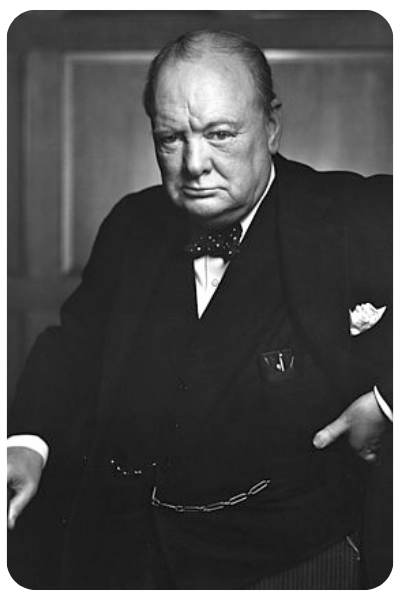
Sir Winston Churchill. Wikimedia Commons.

Sir Winston Churchill - British Secretary of State for the Colonies
Sir Winston Churchill immediately telegraphed Sir Herbert Samuel, the High Commissioner for Palestine, Sir Herbert Samuel, and instructed him to
convey to the Bahá’í Community, on behalf of His Majesty’s Government, their sympathy and condolence.
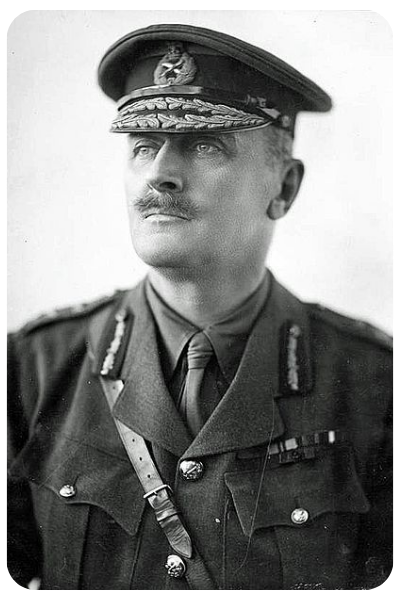
Viscount Edmund Allenby. Wikimedia Commons.

Viscount Allenby - High Commissioner for Egypt
Viscount Edmund Allenby wired Sir Herbert Samuel, the High Commissioner for Palestine and asked him to
convey to the relatives of the late Sir ‘Abdu’l‑Bahá ‘Abbás Effendi and to the Bahá’í Community...sincere sympathy in the loss of their revered leader.
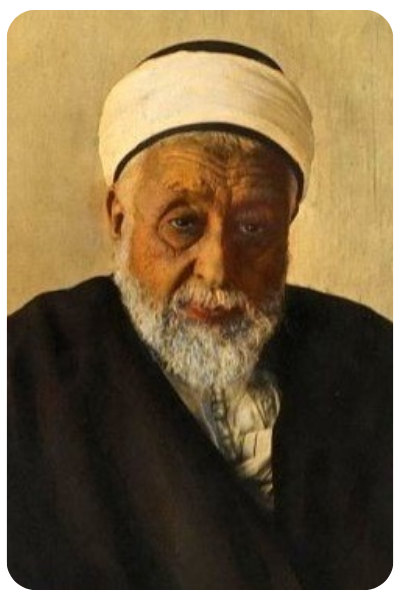
Abd Al-Rahman Al Gailani. Wikimedia Commons.

Council of Ministers in Baghdád
The Council of Ministers in Baghdád instructed Siyyid ‘Abdu’r-Raḥmán (more commonly known as Abd Al-Rahman Al-Gillani), the first Prime Minister of Iráq, to extend their
sympathy to the family of His Holiness ‘Abdu’l‑Bahá in their bereavement.
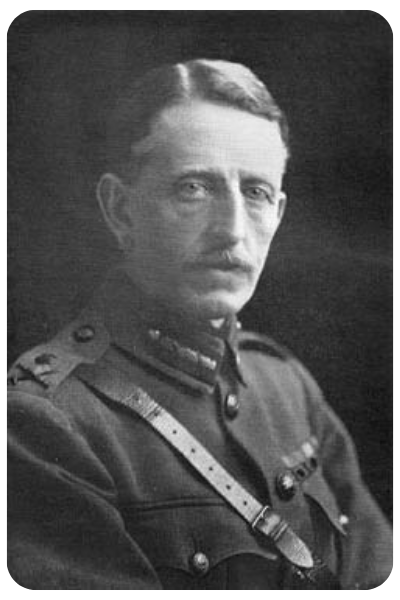
General Sir Walter Norris Congreve. Royal Green Jackets Museum.

General Congreve - Commander-in-Chief of the Egyptian Expeditionary Force
General Sir Walter Norris Congreve addressed a message to Sir Herbert Samuel, the High Commissioner for Palestine requesting him to
convey his deepest sympathy to the family of the late Sir ‘Abbás Bahá’í.
Sir Arthur Money. Source: The Imperial War Museums.

General Sir Arthur Money, former Chief Administrator of Palestine
General Sir Arthur Money wrote expressing his sadness, his profound respect and his admiration for Him as well as his sympathy in the loss which His family had sustained.

Unnamed famous University of Oxford Professor and scholar
One of the distinguished figures in the academic life of the University of Oxford, a famous professor and scholar, wrote on behalf of himself and his wife:
The passing beyond the veil into fuller life must be specially wonderful and blessed for One Who has always fixed His thoughts on high, and striven to lead an exalted life here below.
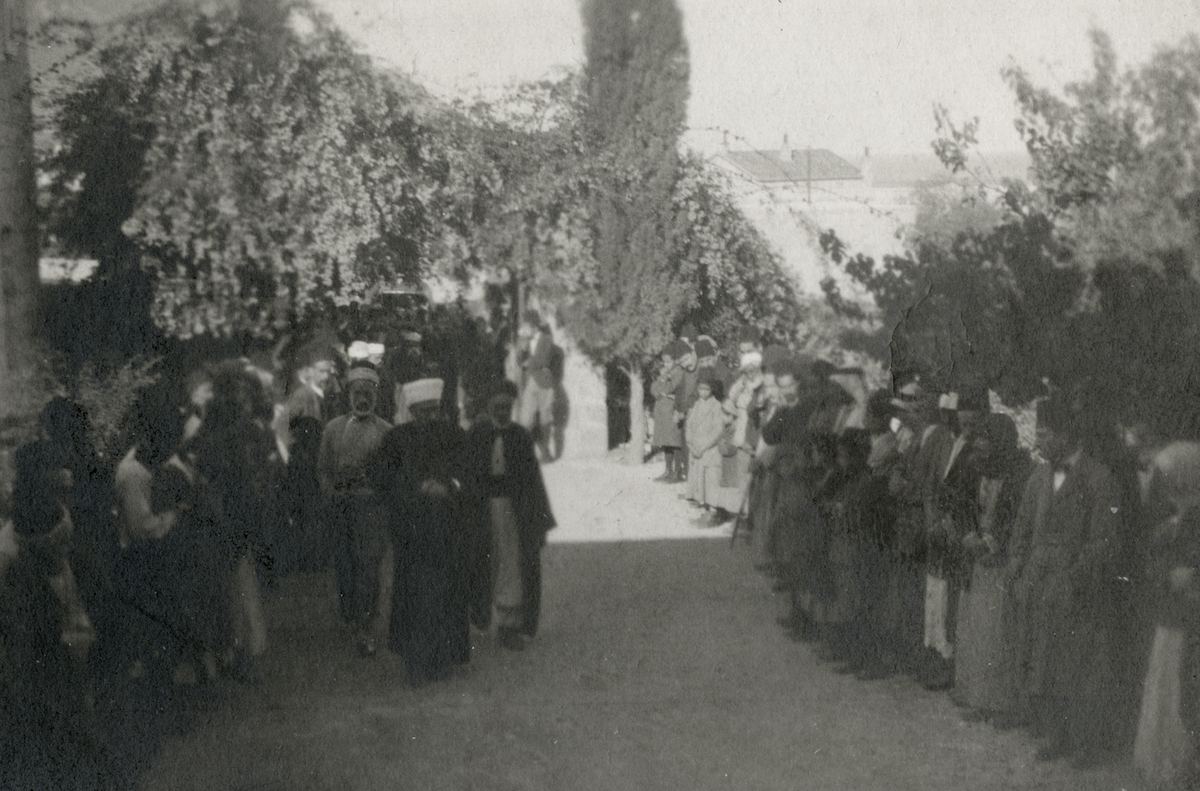
The British Commissioner for Palestine and the Mufti of Haifa, along with other notables arrive for the funeral procession.

By 7 in the morning, on Tuesday, November 29, 1921, Haifa is at a virtual standstill. The news of 'Abdu'l-Bahá's passing has shocked the city and its people, and soldiers line both sides of Haparsim Street, some even stationed in the courtyard of the Master's house, standing guard.
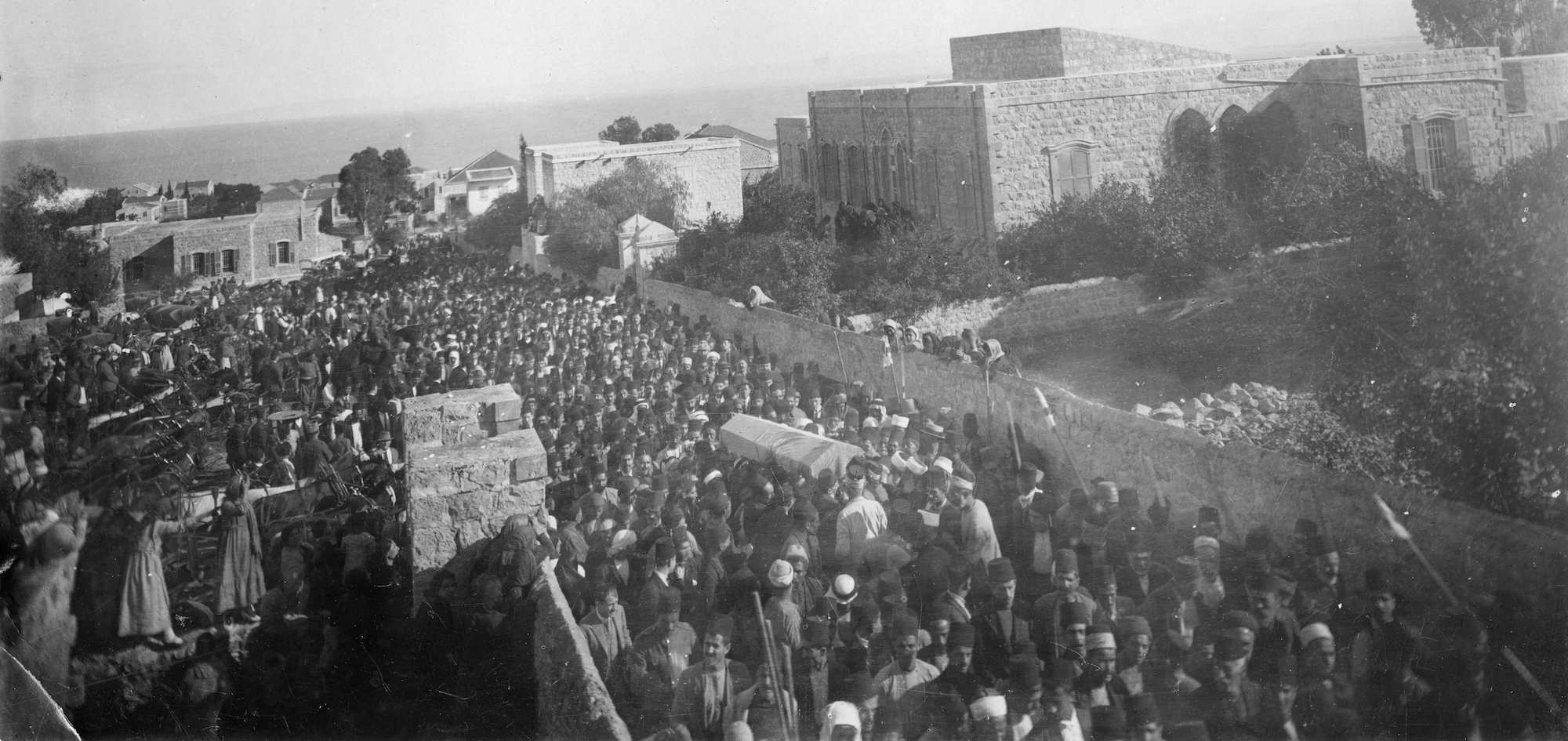
The casket has left the Masters House (in the background) and is heading uphill on Persian Street towards Weinstrasse, or Vine Street (now Hagefen Street).

'Abdu'l-Bahá's body is placed in a plain, white wood casket by the Bahá'ís, and the coffin, covered in a simple paisley shawl, is brought out into the main hall where Muslim, Christian and Jewish religious leaders gather while the Muslims offer a short prayer. At 9 in the morning, the funeral procession towards the Shrine of the Báb begins, and eight Bahá'ís lift the casket onto their shoulders, the pallbearers changing frequently because of the long distance to cover. The funeral cortège is led by a guard of honor, courtesy of the City Constabulary Force, followed by Muslim and Christian Boy Scout troops, and behind them Muslim choristers chanting verses from the Qur'án, along with the Mufti of Haifa, Muslim leaders and Christian clergymen of at least three denominations: Roman Catholic, Greek Orthodox and Anglican. Behind the coffin, are the members of the Holy Family, Sir Herbert Samuel, the British High Commissioner for Palestine, Sir Ronald Storrs, Civil Governor of Jerusalem and Judea, and Lieutenant Colonel Stewart Symes, the Governor of Phoenicia. They are followed by the Haifa consuls of several countries along with Palestinian, Muslim, Jewish, Christian, Druze, Egyptian, Greek, Turk, Arab, Kurd, European, and American notables, themselves followed by ten thousand people walking behind the funeral cortège to honour ‘Abdu'l-Bahá. It takes two hours for the funeral cortège to make its way through Haifa streets mid-way up Mount Carmel to the Shrine of the Báb, a distance of about 1.5 kilometers. A public demonstration of respect of this magnitude, from all strata of Haifa and Palestine, is nothing short of astounding, and at the same time, the most befitting tribute for ‘Abdu'l-Bahá.
British officials will later testify to the crowds and the spirit of the funeral cortège:
A great throng had gathered together, sorrowing for His death, but rejoicing also for His life.
Sir Herbert Samuel, the British High Commissioner
I have never known a more united expression of regret and respect than was called forth by the utter simplicity of the ceremony.
Sir Ronald Storrs, Governor of Jerusalem
From Shoghi Effendi, "God Passes By"
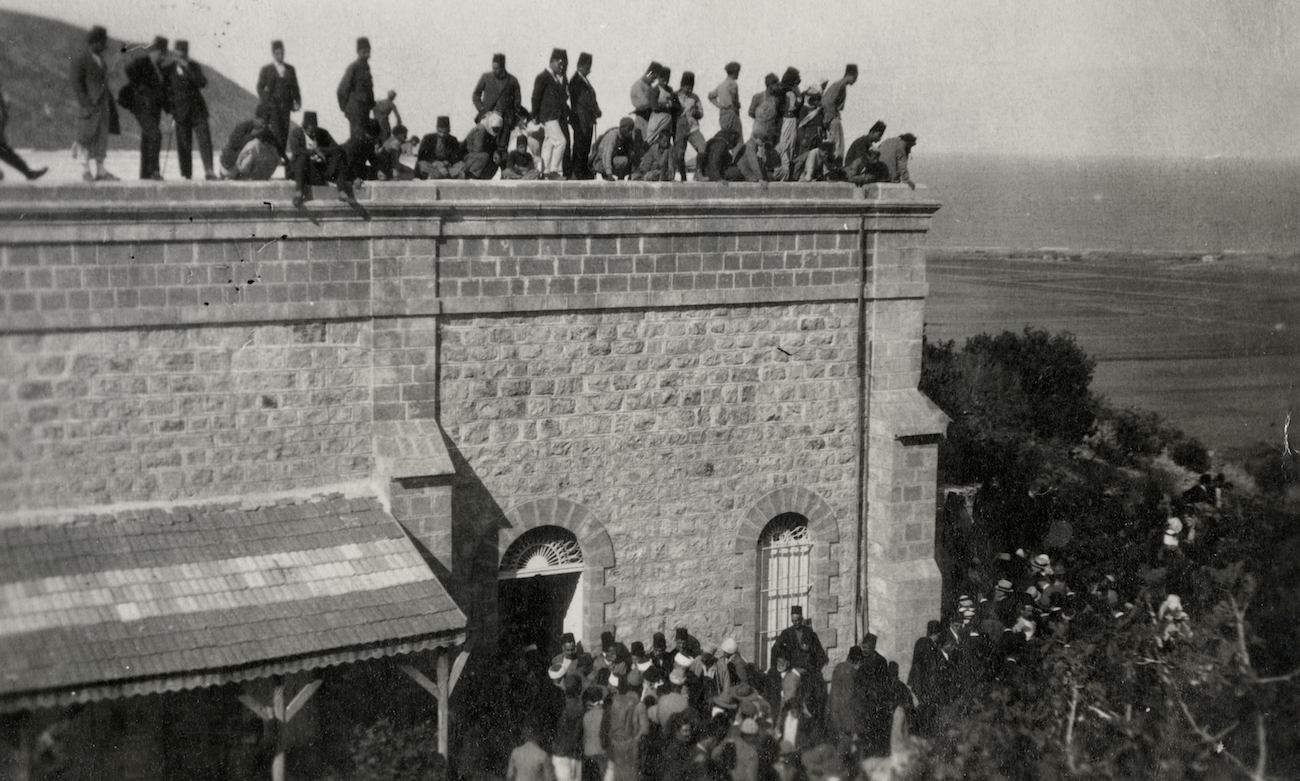
The funeral procession has arrived in front of the Shrine of the Báb. This photograph shows a group of men and boys who have climbed on the roof of the Shrine.

The procession stops a few meters away from the Shrine, and ‘Abdu'l-Bahá's coffin is placed on a cloth-covered table while the mourners surround it, while nine eloquent funeral orations are spoken by Muslim, Christian, and Jewish notables of Haifa, as well as Colonel Symes (see next section). After the funeral orations, Sir Herbert Samuel, the British High Commissioner for Palestine, approaches the casket, and, head bowed and facing the Shrine of the Báb, pays his last homage of farewell to 'Abdu'l-Bahá. The other British Government officials follow Sir Herbert Samuel's examples, and the coffin is then taken into the Shrine.
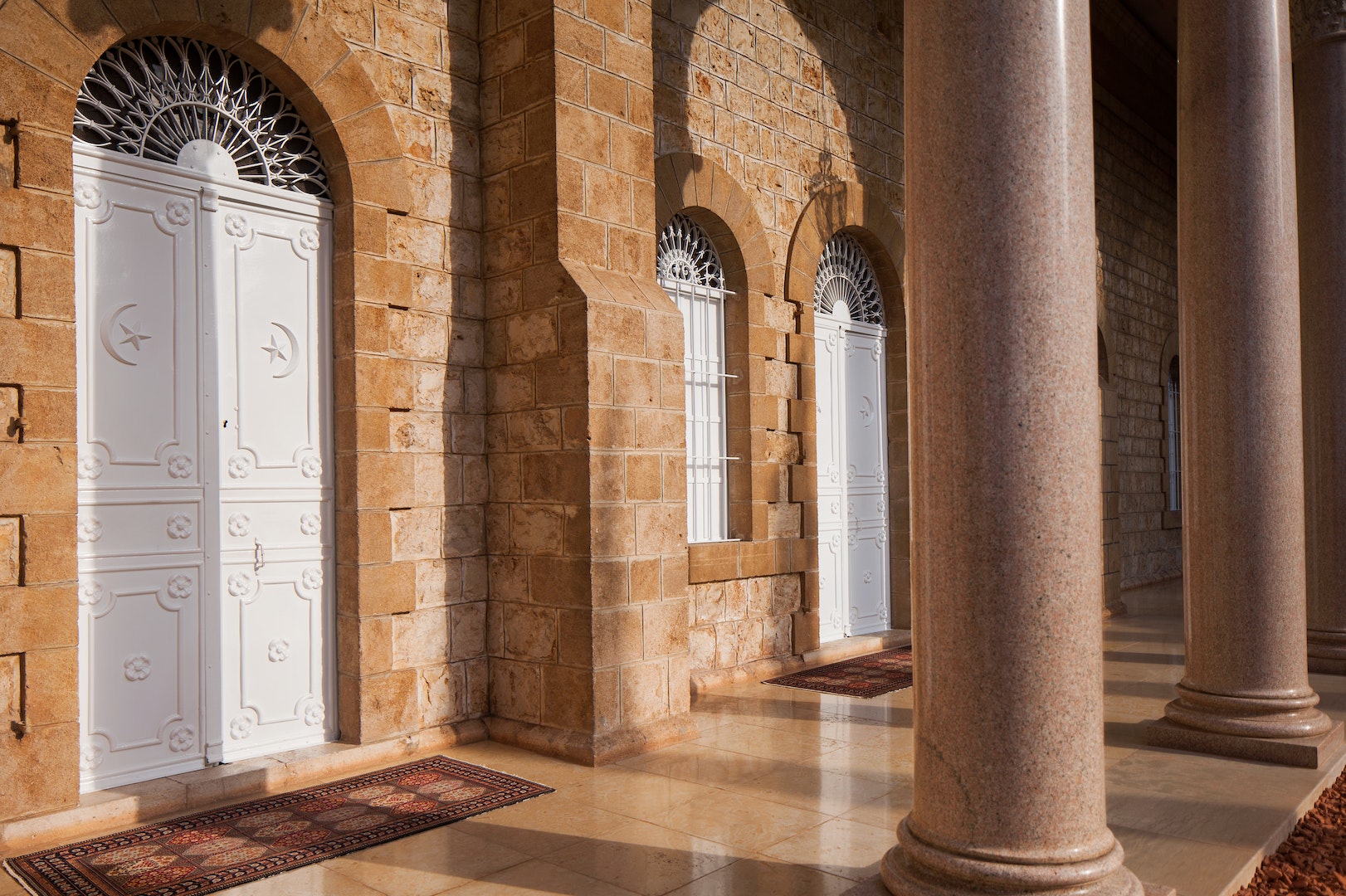
Entrance to the Shrine of the Báb, showing the door to the Shrine of 'Abdu'l-Bahá on the foreground and the door to the Shrine of the Báb in the background. Source: Bahá'í Media Bank, © 2023 Bahá'í International Community.

Later that evening, ‘Abdu'l-Bahá's casket is brought to the underground vault of the Shrine. The Master's casket is oriented so as to face Bahjí, where the Shrine of Bahá'u'lláh is located, and placed in such a way that is not in front of the sarcophagus containing the remains of the Báb. Raḥmatu’lláh Najaf-Ábádí, the caretaker of the Shrine of the Báb, is so physically strong that he is able to lower ‘Abdu'l-Bahá's casket single-handedly, without any trouble: he easily lifts the casket, and carries it down to the crypt by himself. After the funeral, he will remember ‘Abdu'l-Bahá asking him a puzzling question before the Master passed away:
You are a strong man. Could you not carry me away to a pace where I could rest? I'm tired of this world.
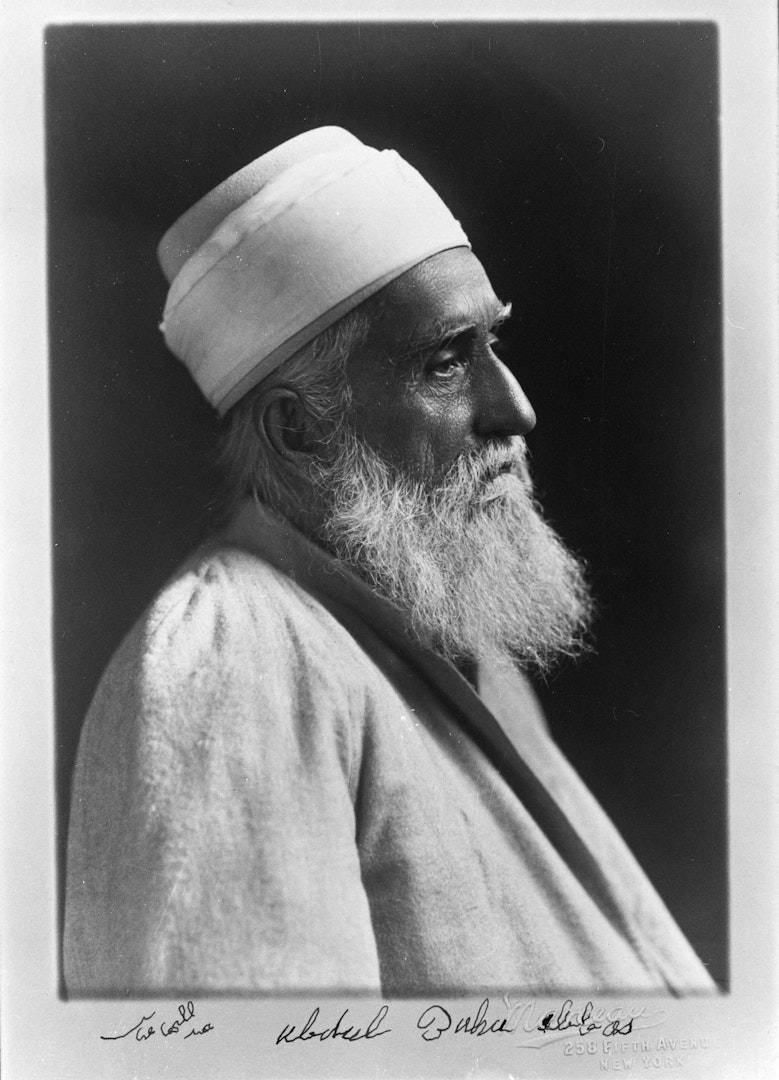
Portrait of ‘Abdu’l-Bahá taken in New York, c. 1912. Source: Bahá'í Media Bank, © 2023 Bahá'í International Community.
'Abdu'l-Bahá composed a Tablet for Bahá'ís to say in His honor. We know this Tablet as "The Tablet of Visitation for 'Abdu'l-Bahá." While it is often read at His Shrine, it is also used in private prayer.
This Tablet of Visitation, written sometime no later than 1910, begins with this prefatory note, written by ‘Abdu’l-Bahá Himself:
“Whoso reciteth this prayer with lowliness and fervor will bring gladness and joy to the heart of this Servant; it will be even as meeting Him face to face.”
An especially fascinating feature of this prayer is lost in the translation of this passage: “Give me to drink from the chalice of selflessness; with its robe clothe me, and in its ocean immerse me.”
In the original Arabic, the word faná’ (“selflessness”) is actually repeated three times in each of the three supplications in this sentence, but presumably to avoid redundancy in English, Shoghi Effendi translated the second and third instances of this word as simply “its.”
Please click on the graphic below to listen to the Tablet of Visitation of 'Abdu'l-Bahá, recited in Arabic with English subtitles:
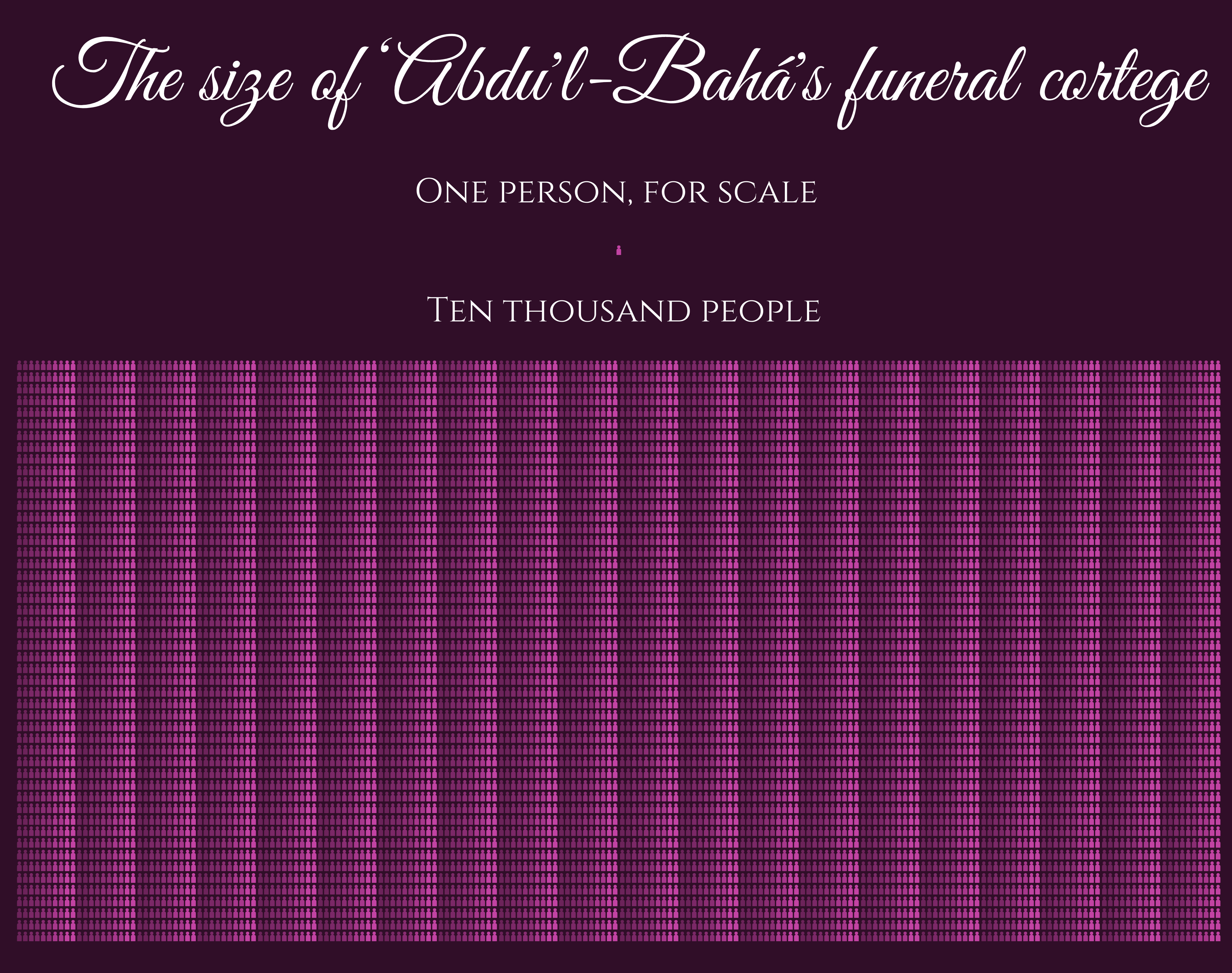

Above is a graphic representation of what ‘Abdu'l-Bahá's funeral cortège of 10,000 people looks like with a single person for scale.
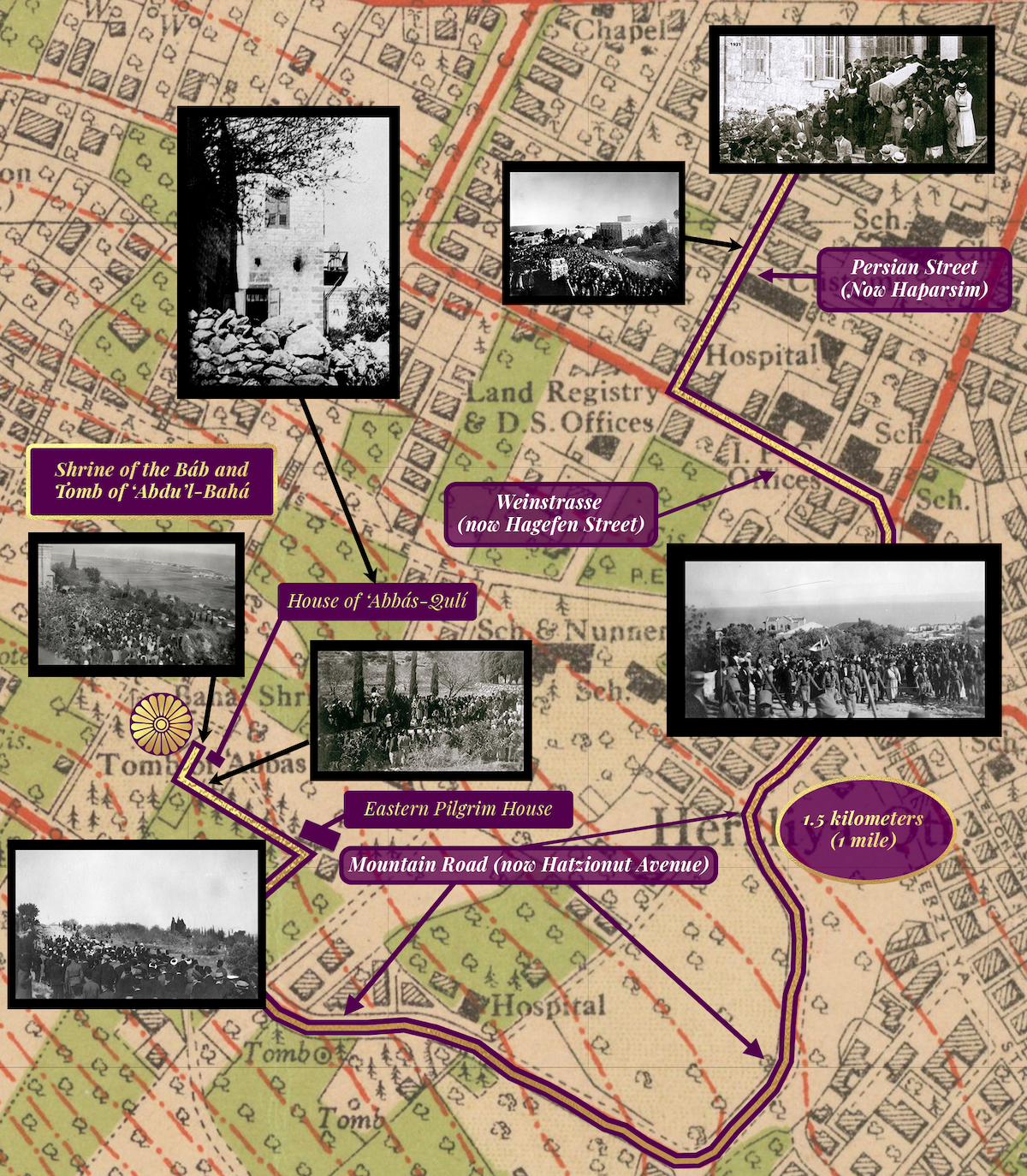
Information about this map: This map was created by Violetta Zein for The Extraordinary Life of ‘Abdu’l-Bahá based on the map in the plates between pages 80-81 in Michael V. Day’s book « Journey to a Mountain » Chapter 21: The Shrine Becomes the Tomb of ‘Abdu’l-Bahá. And was created in collaboration with Bahá’í historian Michael V. Day, who reconstructed the exact route of the funeral cortège from historical sources, personal accounts, and an aerial photograph. Former member of the Universal House of Justice, the late Mr. ‘Alí Nakhjavání, confirmed with Michael an aspect of the route taken before it reached Mountain Road. Many thanks to Andrew Blake who consulted on various aspects of this section and provided several clarifications. The original map in « Journey to a Mountain » was designed by William McGuire from the information given to him by Michael.
Base map: 1940s Map of Haifa from the project Palestine Open Maps. Notice that the area of the Shrine of the Báb is already labeled within the map itself as "Bahai Shrine & Tomb of Abbas Effendi." The original map clearly shows not only ‘Abbás-Qulí’s house but also the Eastern Pilgrim House.
Note: the two “Tomb” inscriptions at the bottom left of the map, within the green area, were not present in 1921. These are map representations of the twin resting places built by Shoghi Effendi for Navváb and Mírzá Mihdí, you can see a photograph of them here in the 1930s.

‘Abdu'l-Bahá's funeral cortège heads north up Persian Street (now Haparsim), for roughly 20o meters, then turns left on Weinstrasse ("Vine Street", now called Hagefen Street for another 200 meters, before reaching the intersection with Mountain Road (now called Hatzionut Avenue). Here, the funeral procession turns right, and starts its slightly more than one kilometer ascension midway up Mount Carmel on the steep road ‘Abdu'l-Bahá helped fund, before it turns right down the path leading to the Eastern Pilgrim House. The funeral cortège pauses along the way, then passes in front of the house of ‘Abbás-Qulí, which faces Mountain Road. ‘Abbás-Qulí of Qom had purchased land less than 50 meters from the Shrine of the Báb in 1908 and built a two-storey home there. After His release in 1908, ‘Abdu'l-Bahá had not only frequently visited his home, but also stayed here many times, as He enjoyed the view of the Shrine of the Báb from ‘Abbás-Qulí's balcony. ‘Abbás-Qulí even built a little room for the Master on the roof of his house. ‘Abdu'l-Bahá loved this room and would often sleep there. The funeral cortège goes down the path on the western side of ‘Abbás-Qulí's house, and comes to its final halt a few meters north-east of the Shrine of the Báb. The route taken by the funeral cortège from the house of the Master winding up Mount Carmel to the Shrine of the Báb covered a distance of 1.5 kilometers and took two hours. Here, now, is where we will hear the tributes to ‘Abdu'l-Bahá in the next section.
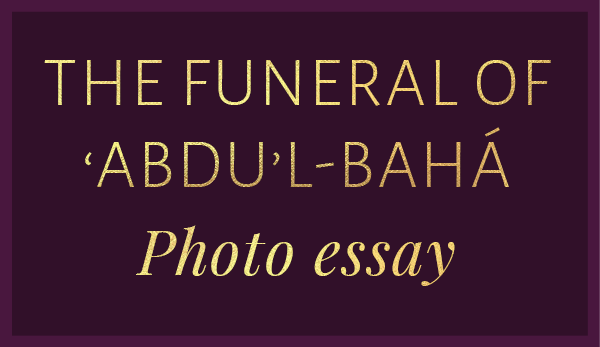
All photographs courtesy of the United States National Bahá’í Archives except for the closeup of the casket on the steps, from ‘Abdu’l-Bahá in the Holy Land.
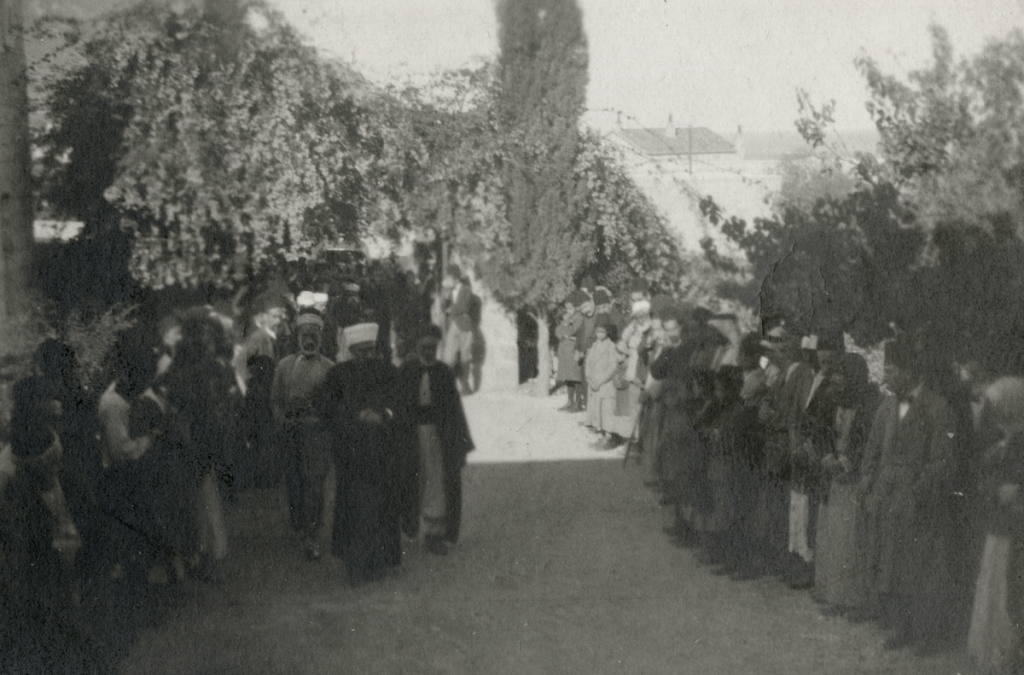 The British Commissioner for Palestine and the Mufti of Haifa, along with other notables arrive for the funeral procession.
The British Commissioner for Palestine and the Mufti of Haifa, along with other notables arrive for the funeral procession.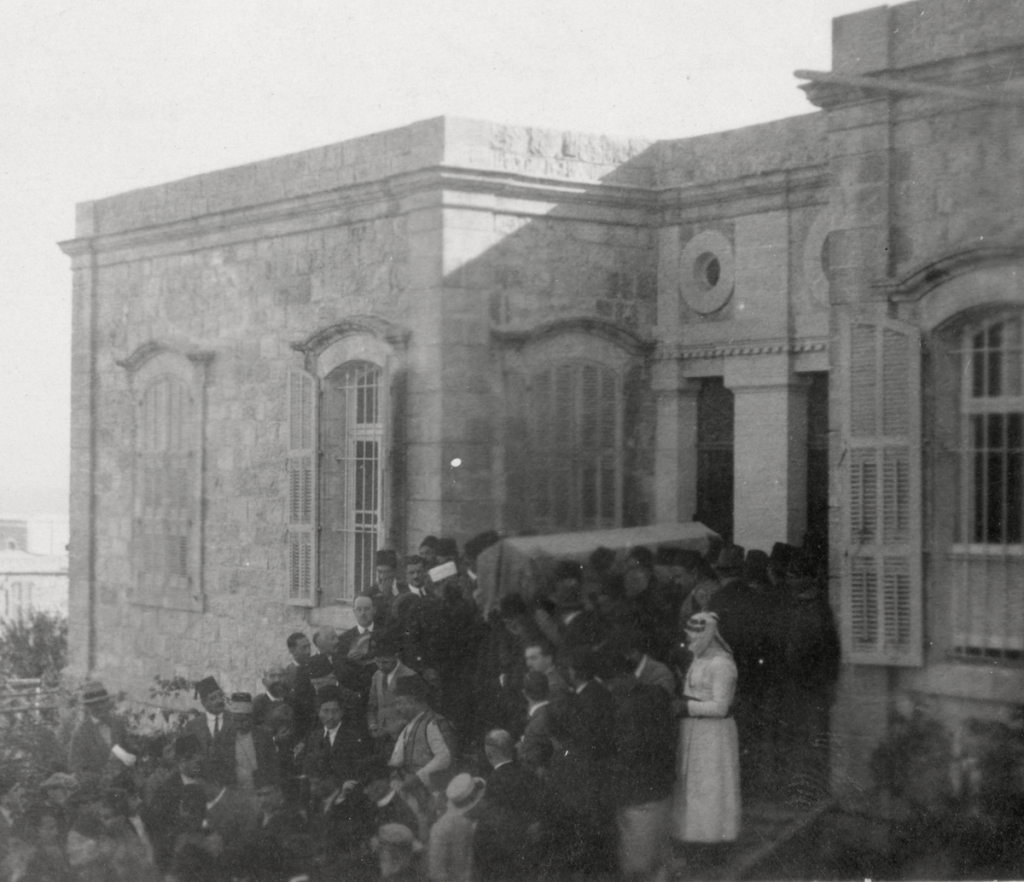 The casket containing the sacred remains of ‘Abdu’l-Bahá is carried out of the Master’s house on the shoulder of pallbearers
The casket containing the sacred remains of ‘Abdu’l-Bahá is carried out of the Master’s house on the shoulder of pallbearers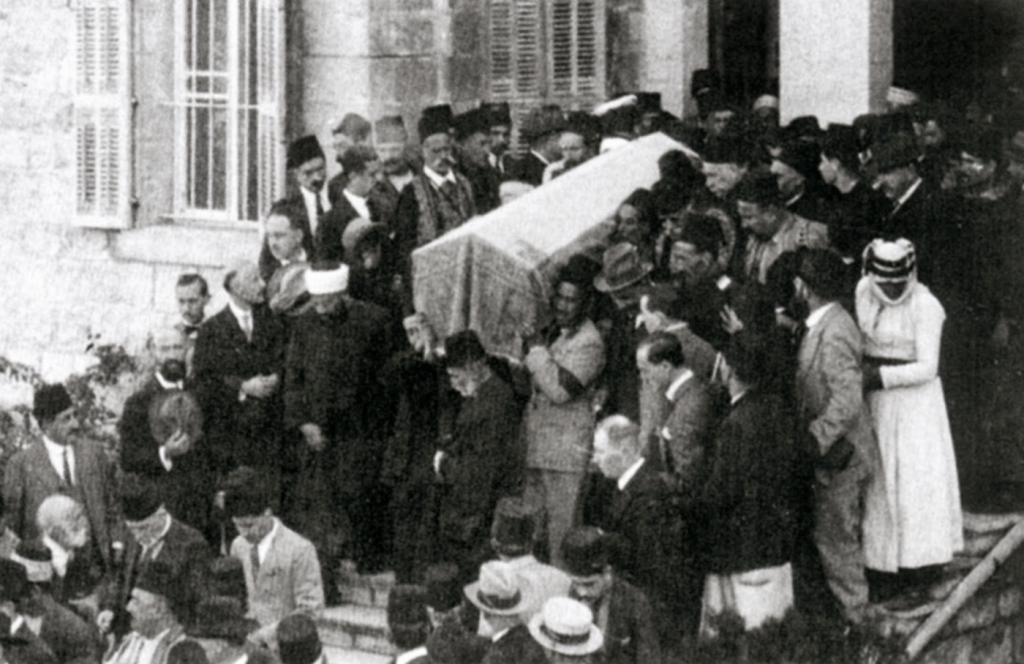 The pallbearers descend the first steps leading out of the House of ‘Abdu’l-Bahá.
The pallbearers descend the first steps leading out of the House of ‘Abdu’l-Bahá.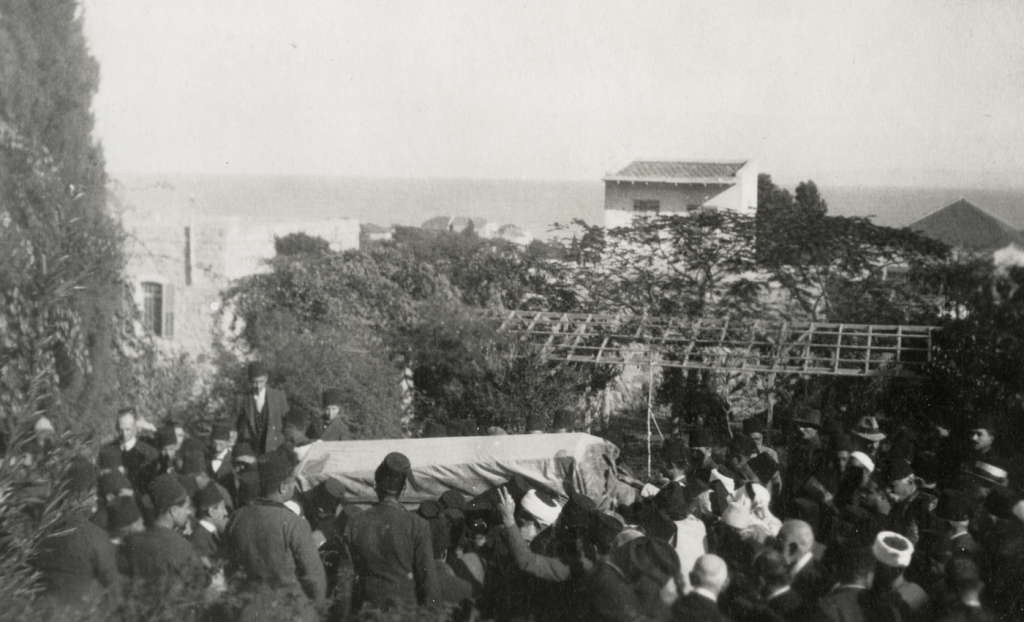 The funeral cortège leaves the garden of the House of ‘Abdu’l-Bahá.
The funeral cortège leaves the garden of the House of ‘Abdu’l-Bahá.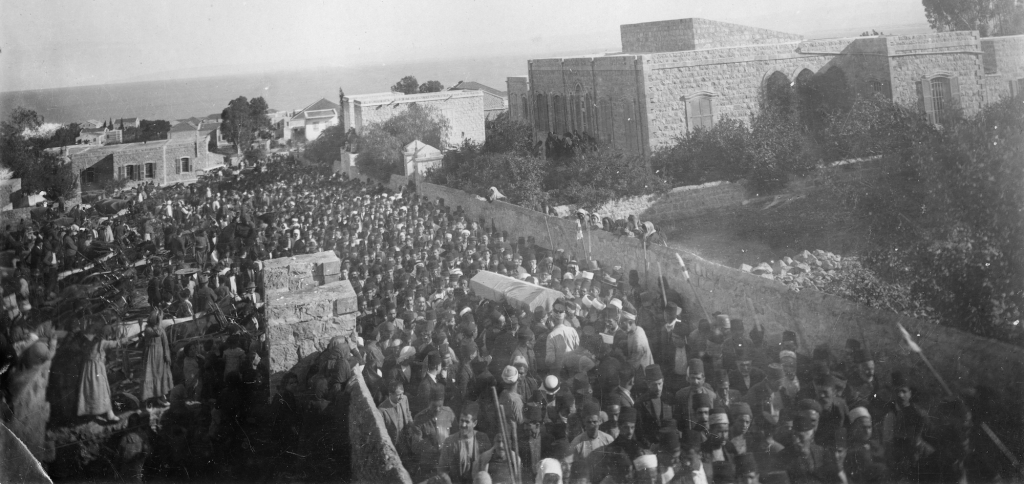 The casket has left the Masters House (in the background) and is heading uphill on Persian Street towards Weinstrasse, or Vine Street (now Hagefen Street).
The casket has left the Masters House (in the background) and is heading uphill on Persian Street towards Weinstrasse, or Vine Street (now Hagefen Street).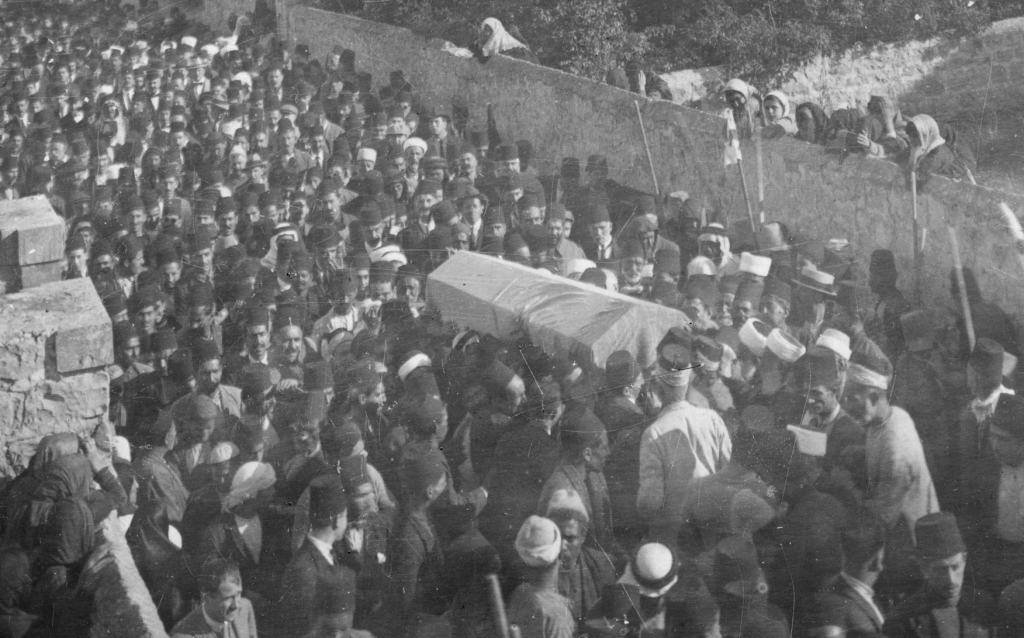 Closeup of the procession on Persian Street.
Closeup of the procession on Persian Street.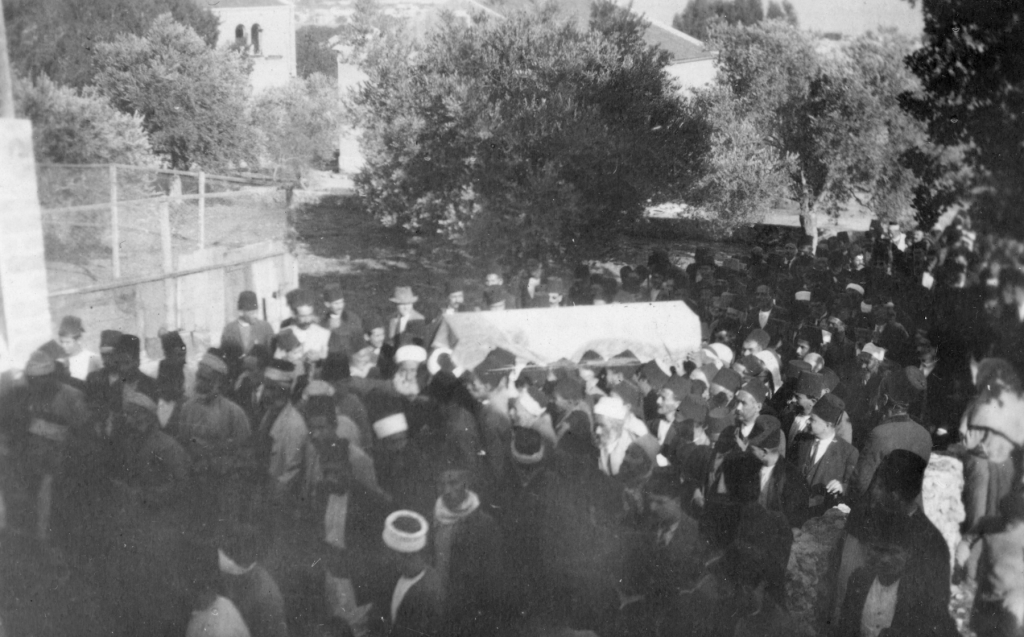 The procession is about to turn left on Weinstrasse, or Vine Street (now Hagefen Street).
The procession is about to turn left on Weinstrasse, or Vine Street (now Hagefen Street).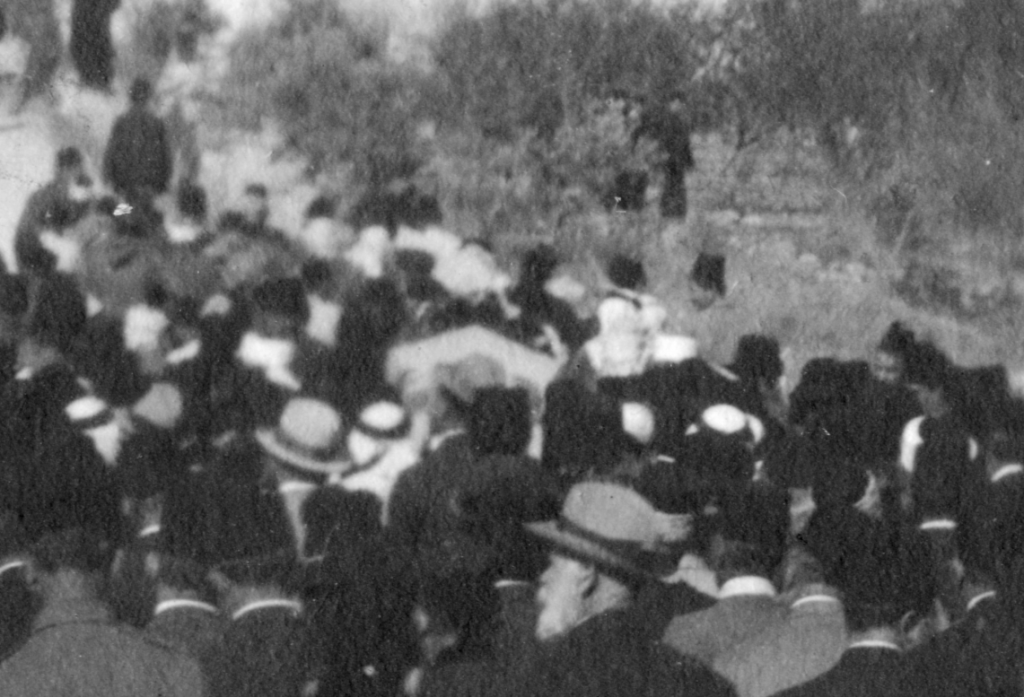 Closeup of the previous photograph showing ‘Abdu’l-Bahá’s coffin in the center of the image.
Closeup of the previous photograph showing ‘Abdu’l-Bahá’s coffin in the center of the image.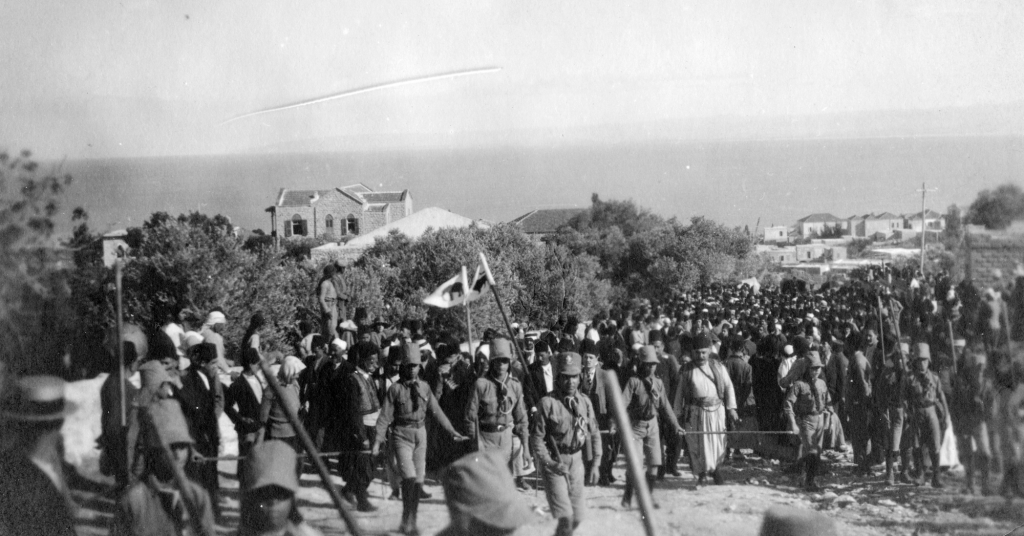 The funeral procession higher up Mountain Road. The Boy Scouts in the front hold wooden bars to keep the procession from overflowing.
The funeral procession higher up Mountain Road. The Boy Scouts in the front hold wooden bars to keep the procession from overflowing.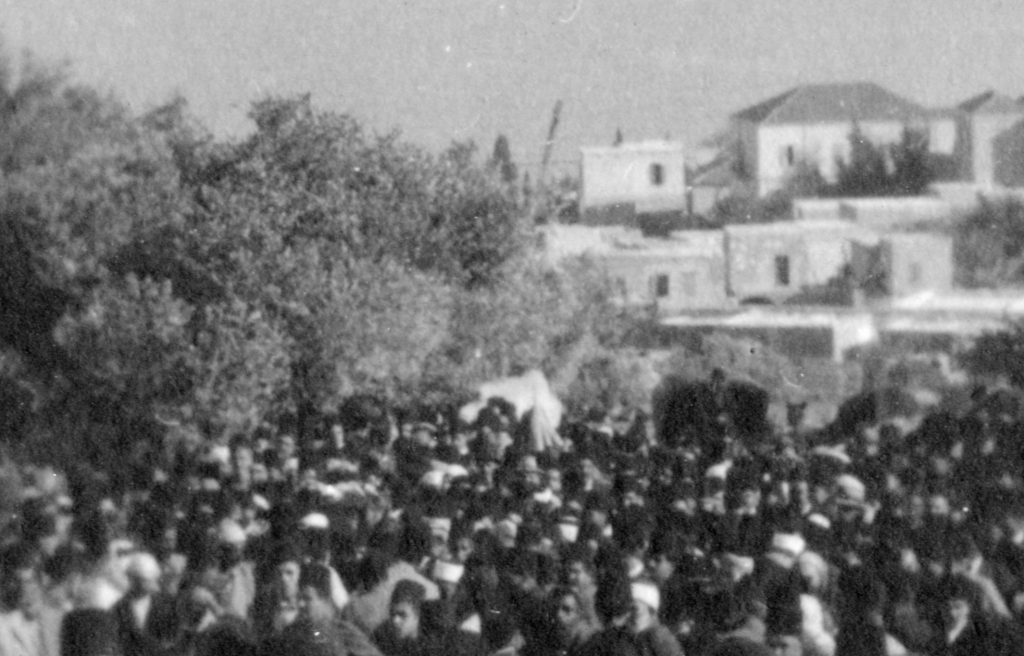 Closeup of the previous photograph centered around the casket of ‘Abdu’l-Bahá.
Closeup of the previous photograph centered around the casket of ‘Abdu’l-Bahá.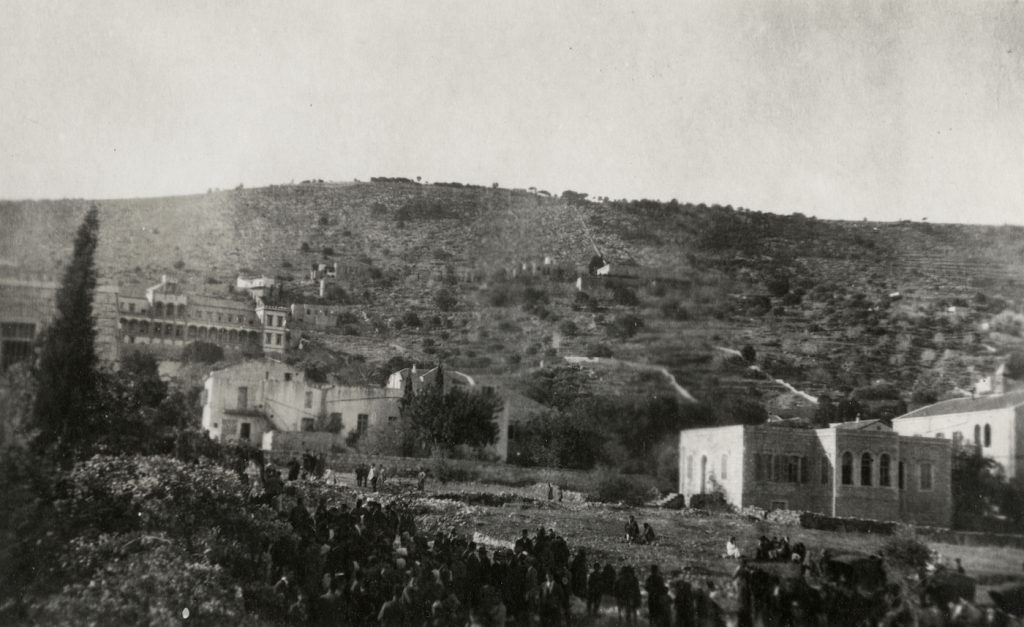 The funeral cortège on Mount Carmel, photo 1.
The funeral cortège on Mount Carmel, photo 1.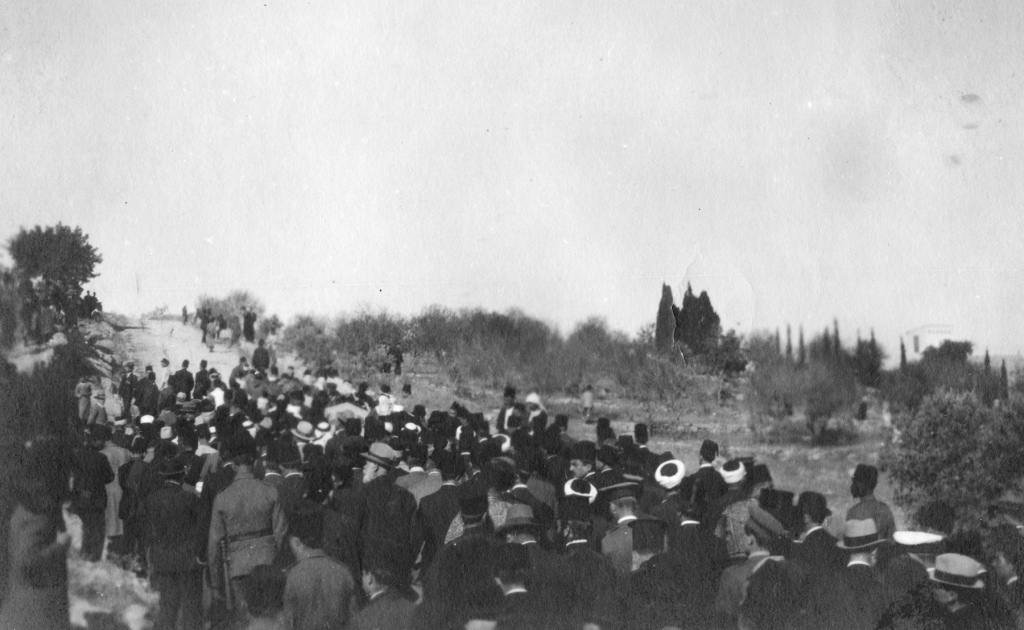 The funeral cortège turns right from Mountain Road onto the path heading leading towards the Eastern Pilgrim House.
The funeral cortège turns right from Mountain Road onto the path heading leading towards the Eastern Pilgrim House.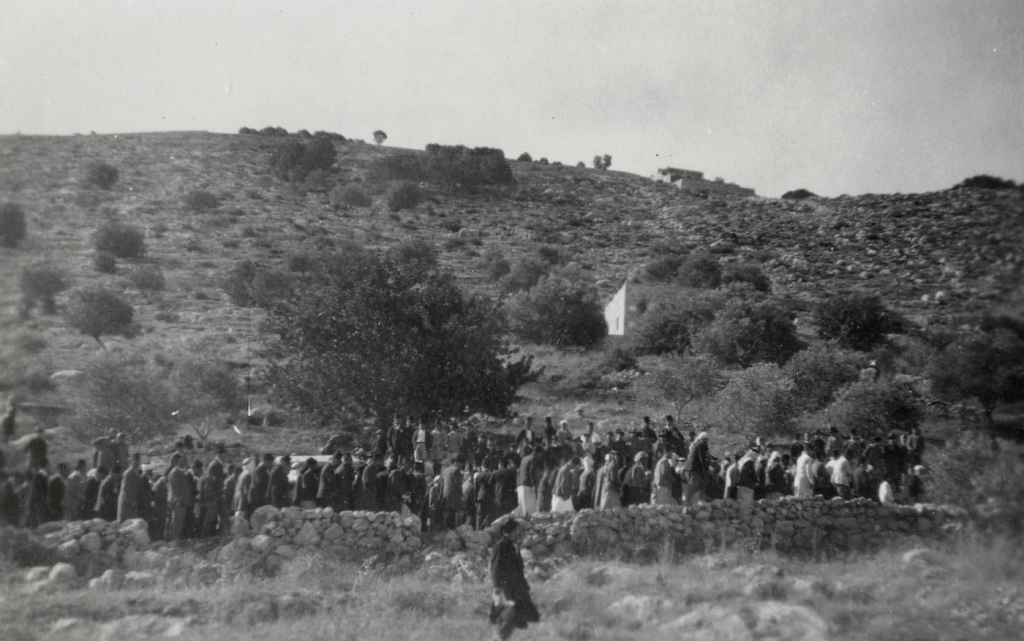 The funeral cortège on Mount Carmel, photo 2.
The funeral cortège on Mount Carmel, photo 2.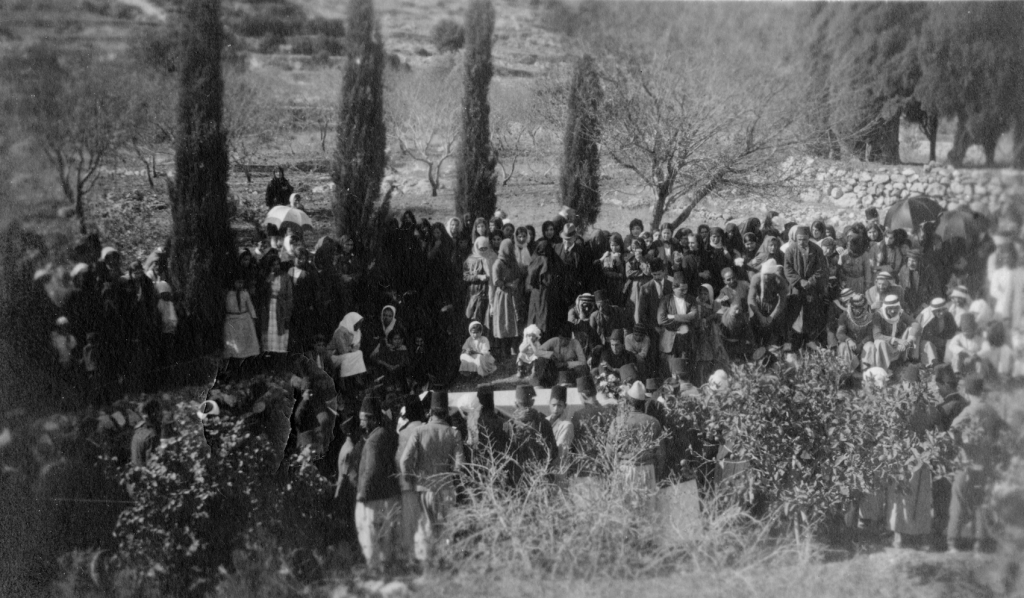 The funeral cortège pauses briefly in front of ‘Abbás-Qulí’s home, fifty meters from the Shrine of the Báb. ‘Abdu’l-Bahá often visited and stayed in this home, and had the owner had a special room built on the roof for the Master.
The funeral cortège pauses briefly in front of ‘Abbás-Qulí’s home, fifty meters from the Shrine of the Báb. ‘Abdu’l-Bahá often visited and stayed in this home, and had the owner had a special room built on the roof for the Master.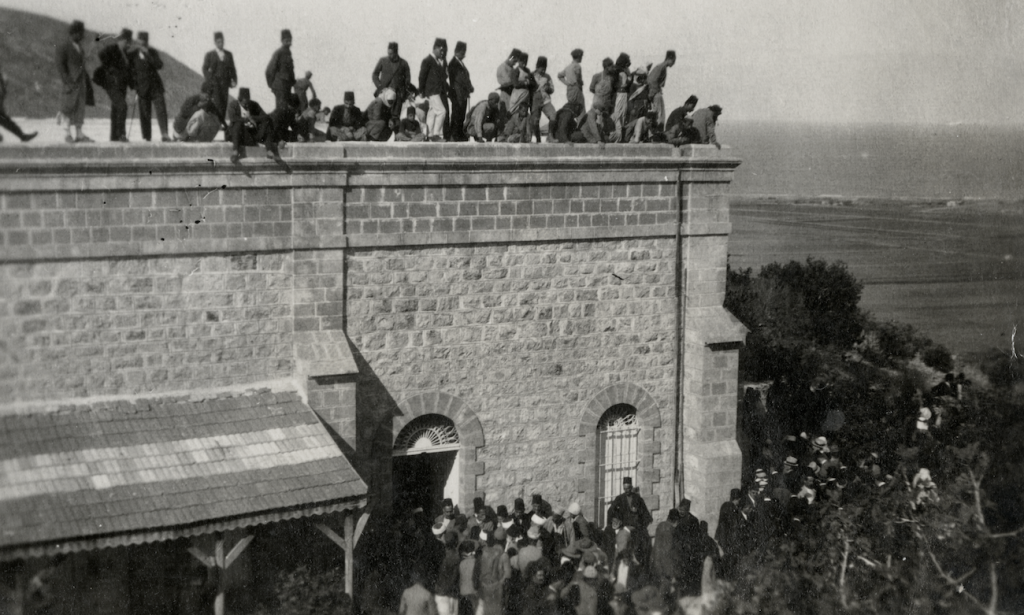 The funeral procession has arrived in front of the Shrine of the Báb. This photograph shows a group of men and boys who have climbed on the roof of the Shrine.
The funeral procession has arrived in front of the Shrine of the Báb. This photograph shows a group of men and boys who have climbed on the roof of the Shrine.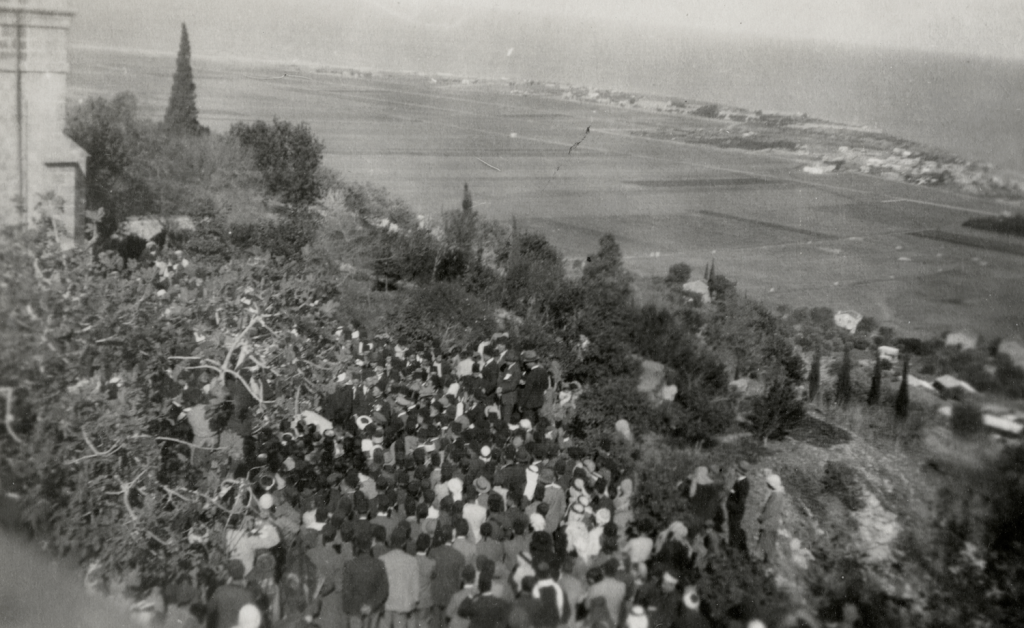 This photo is taken at the time that the tributes to ‘Abdu’l-Bahá are being delivered. ‘Abdu’l-Bahá’s casket is out of sight, but placed on a simple table for the duration of the speeches, and will then be brought into the Shrine to be interred in the vault below later in the day.
This photo is taken at the time that the tributes to ‘Abdu’l-Bahá are being delivered. ‘Abdu’l-Bahá’s casket is out of sight, but placed on a simple table for the duration of the speeches, and will then be brought into the Shrine to be interred in the vault below later in the day.
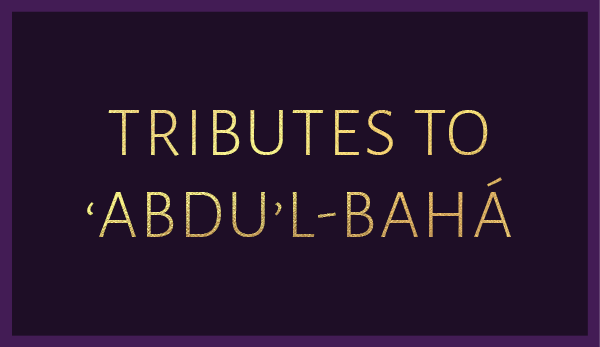
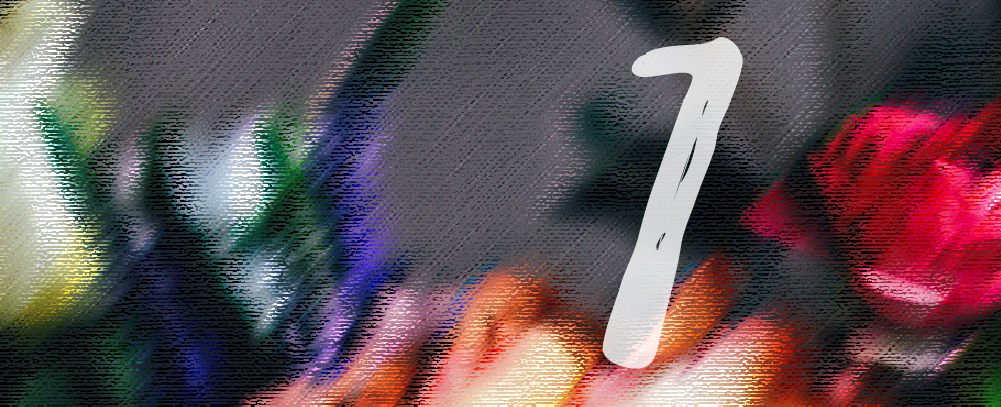

O concourse of Arabians and Persians! Whom are ye bewailing? Is it he who but yesterday was great in his life and is today in his death greater still? Shed no tears for the one that hath departed to the world of Eternity, but weep over the passing of Virtue and Wisdom, of Knowledge and Generosity.
Lament for yourselves, for yours is the loss, whilst he, your lost one, is but a revered Wayfarer, stepping from your mortal world into the everlasting Home. Weep one hour for the sake of him who, for well nigh eighty years, hath wept for you! Look to your right, look to your left, look East and look West and behold, what glory and greatness have vanished! What a pillar of peace hath crumbled! What eloquent lips are hushed!
Alas! In this tribulation there is no heart but aches with anguish, no eye but is filled with tears. Woe unto the poor, for lo! goodness hath departed from them, woe unto the orphans, for their loving father is no more with them! Could the life of Sir ‘Abdu’l-Bahá ’Abbas have been redeemed by the sacrifices of many a precious soul, they of a certainty would gladly have offered up their lives for his life. But Fate hath otherwise ordained.
Every destiny is predetermined and none can change the Divine Decree. What am I to set forth the achievements of this leader of mankind? They are too glorious to be praised, too many to recount. Suffice it to say, that he has left in every heart the most profound impression, on every tongue most wondrous praise. And he that leaveth a memory so lovely, so imperishable, he, indeed, is not dead. Be solaced then, O ye people of Baha! Endure and be patient; for no man, be he of the East or of the West, can ever comfort you, nay he himself is even in greater need of consolation.
Quoted in Shoghi Effendi and Lady Blomfield, The Passing of 'Abdu'l-Bahá
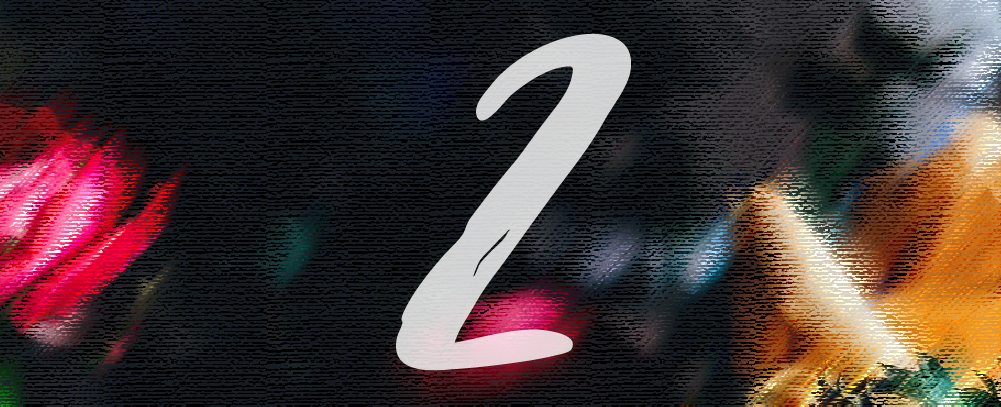

I weep for the world, in that my Lord hath died; others there are who, like unto me, weep the death of their Lord…O bitter is the anguish caused by this heartrending calamity! It is not only our country’s loss but a world affliction…He hath lived for well-nigh eighty years the life of the Messengers and Apostles of God. He hath educated the souls of men, hath been benevolent unto them, hath led them to the Way of Truth. Thus he raised his people to the pinnacle of glory, and great shall be his reward from God, the reward of the righteous!
Hear me O people! ‘Abbas is not dead, neither hath the light of Baha been extinguished! Nay, nay! this light shall shine with everlasting splendor. The Lamp of Baha, ‘Abbas, hath lived a goodly life, hath manifested in himself the true life of the Spirit. And now he is gathered to glory, a pure angel, richly robed in benevolent deeds, noble in his precious virtues.
Fellow Christians! Truly ye are bearing the mortal remains of this ever lamented one to his last resting place, yet know of a certainty that your ‘Abbas will live forever in spirit amongst you, through his deeds, his words, his virtues and all the essence of his life. We say farewell to the material body of our ‘Abbas, and his material body vanisheth from our gaze, but his reality, our spiritual ‘Abbas, will never leave our minds, our thoughts, our hearts, our tongues.
O great revered Sleeper! Thou hast been good to us, thou hast guided us, thou hast taught us, thou hast lived amongst us greatly, with the full meaning of greatness, thou hast made us proud of thy deeds and of thy words. Thou hast raised the Orient to the summit of glory, hast shown loving kindness to the people, trained them in righteousness, and hast striven to the end, till thou hast won the crown of glory. Rest thou happily under the shadow of the mercy of the Lord thy God, and He verily, shall well reward thee.
Quoted in Shoghi Effendi and Lady Blomfield, The Passing of 'Abdu'l-Bahá
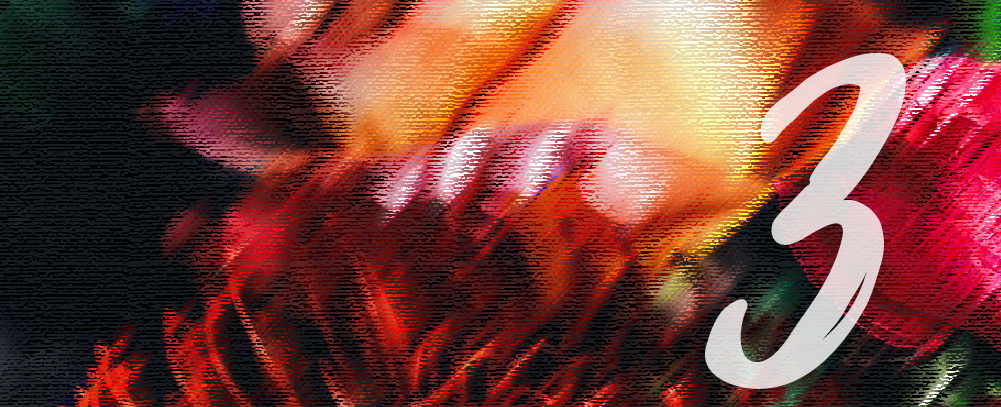

I do not wish to exaggerate in my eulogy of this great one, for his ready and helping hand in the service of mankind and the beautiful and wondrous story of his life, spent in doing that which is right and good, none can deny, save him whose heart is blinded…
O thou revered voyager! Thou hast lived greatly and hast died greatly! This great funeral procession is but a glorious proof of thy greatness in thy life and in thy death. But O, thou whom we have lost! Thou leader of men, generous and benevolent! To whom shall the poor now look? Who shall care for the hungry? and the desolate, the widow and the orphan?
May the Lord inspire all thy household and thy kindred with patience in this grievous calamity, and immerse thee in the ocean of His grace and mercy! He verily, is the prayer-hearing, prayer-answering God.
Quoted in Shoghi Effendi and Lady Blomfield, The Passing of 'Abdu'l-Bahá
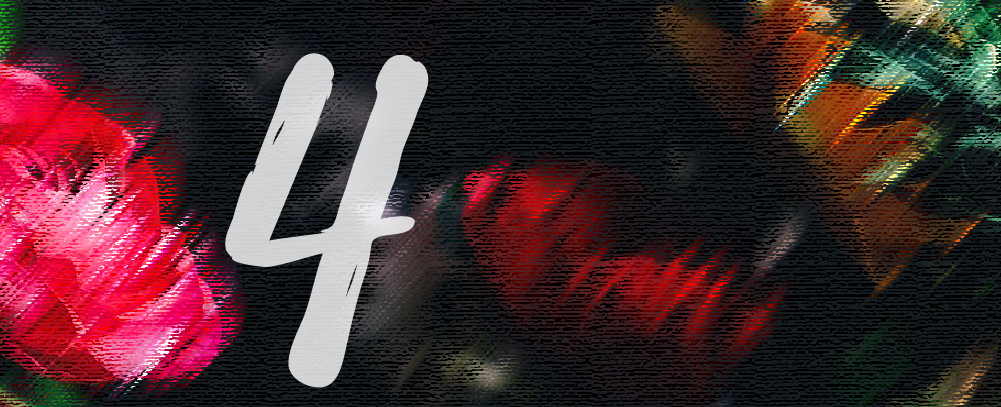

Have you seen the sun set, the disappearance of the moon and the falling of the stars? Have you heard of the crumbling of the thrones, the leveling of the mountains? Have you felt the thrilling and dreadful tragedies that are caused by the accidents that occur in experimental innovations that make the souls and the hearts and the bodies tremble? All such tragedies cannot be mentioned in comparison with our most great calamity for which it behooves us to rend our hearts...
Yea, the sun of knowledge has set; the moon of virtues has disappeared; the throne of glory has crumbled, and the mountain of kindness is leveled by the departure of this benevolent one from the mortal world to the immortal realm. I do not need to explain the sublimity of the great one whom we have lost or to enumerate his great qualities, for all of you who are just are witnesses and can testify to what has been given him of personal beauty, beauty of his character, greatness of his heart, vastness of the sea of his knowledge and generosity.
Alas! who after him will feed the hungry, clothe the naked, rescue the distressed, guide those astray, help the widows, assist the orphans and satisfy those who thirst for knowledge from his pure fountain and beautiful rose-gardens? Nay, rather, who will after him address the meetings, stand in the pulpits, use the pen and paper? All are left without their only banner, their incomparable hero and their shining moon. I beg your pardon if I fail in doing my duty as far as faithfulness is concerned or if I am unable to pay the generous one who has departed what he deserves of the best and highest praise, because what my tongue utters has emanated from a tender memory and broken heart. Indeed, they are wounds and not words; they are tears and not phrases...
And you, O Bahai gentlemen! This is not your calamity alone. Nay, rather, it is a blow to Islam, and a calamity for the whole world, of the past and the present. The teachings of Bahá'u'lláh and ‘Abdu'l-Bahá are spread in the East of the earth and in the West and the Bahá'ís, who are very numerous, join with us in this commemoration. O, I can well imagine what the Bahá'ís are going through today when they receive the shocking news by cablegrams. O how they are seeking patience, but are not finding it; asking for consolation, but cannot gain it, and looking for comfort, but cannot find the way.
Therefore the sacred countries of Hijaz, Egypt, Damascus and Persia that have produced this precious jewel and priceless pearl, is sharing with the Holy Land its grief and sorrow for the generous one who has departed and now is resting in the heart of Mount Carmel, the dwelling-place of Elijah and Joshua and the rest of their prophet brethren. May God send upon us and unto you reward and recompense, bestow upon us and unto you patience for this calamity.
"This calamity has made all previous calamities to be forgotten. But this calamity will never be forgotten."
Quoted in Shoghi Effendi and Lady Blomfield, The Passing of 'Abdu'l-Bahá (1922)
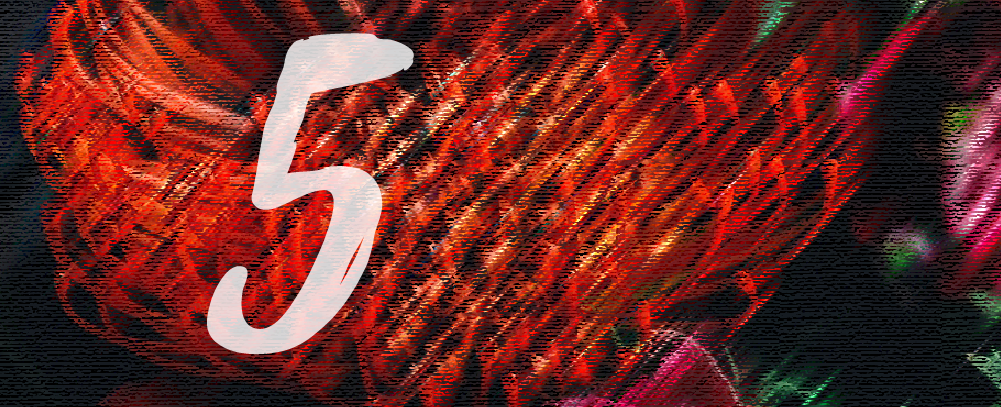

God has ordained the departure of ‘Abdu'l-Bahá, who is the Lord of virtues, perfections and wisdom.
The people are weeping and mourning because of the separation from the one who was the eye of all time.
He planted favors in his sublime rose-garden. They grew and bore sweet fruits.
The creatures are the collective witnesses of his perfections and deeds that surpassed everything...
Quoted in Shoghi Effendi and Lady Blomfield, The Passing of 'Abdu'l-Bahá
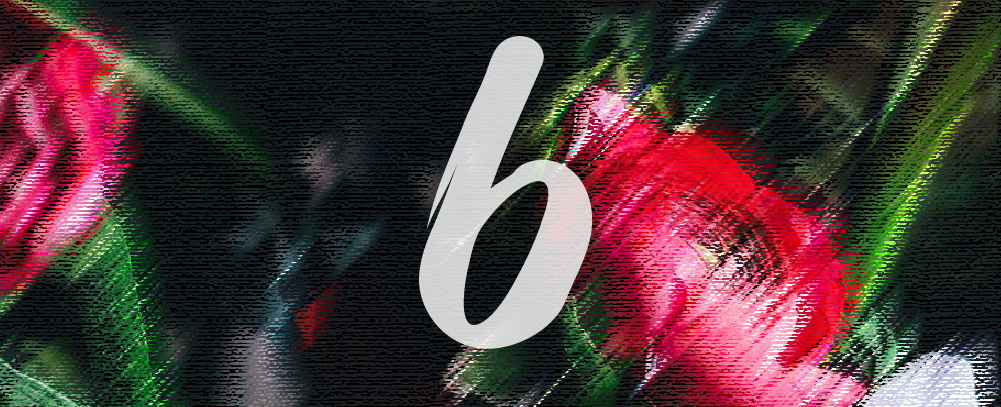

The Bishop speaks in praise of ‘Abdu'l-Bahá and mentions His remarkable, majestic personality and his matchless philanthropic deeds toward the poor.
Quoted in Shoghi Effendi and Lady Blomfield, The Passing of 'Abdu'l-Bahá (1922)
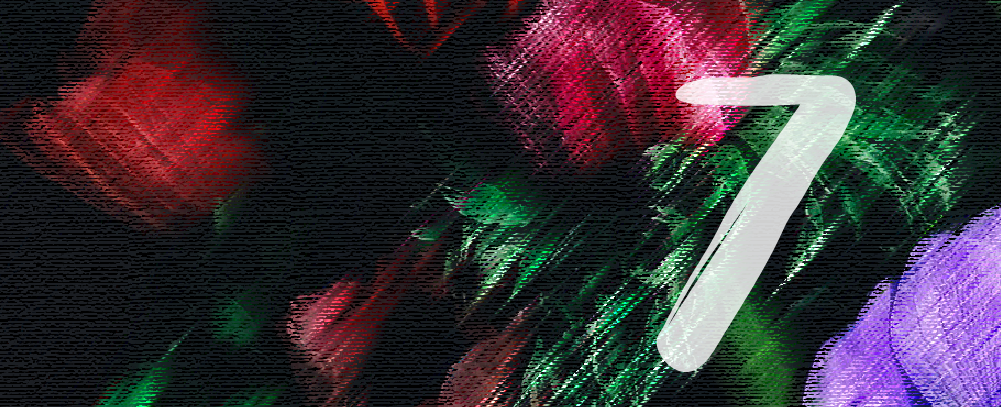

In the souls and in the minds thou art immortal.
One like thee, who has all perfections, virtues and honors, is eternal…
For thy departure they are weeping in grief.
In their hearts thou art, and thou art their hope.
In their eyes thou art ever present, and so is thy father, Bahá'u'lláh.
'Akká has embraced him in its delightful place, Bahjí;
and Haifa has opened its bosom for thy tomb, ‘Abdu'l-Bahá.
O ‘Abdu'l-Bahá, son of Bahá'u'lláh!
Men die, but their names live.
O ‘Abdu’l-Bahá, O son of Bahá’u’lláh!
May my life be a sacrifice to one like thee.
Thou art the all-wise, and all else beside thee are only learned.
What can the poets say in thy day?
Thou hast dawned in the West—then its morning appeared.
They have seen thy light from afar and we are flooded with thy effulgence.
O ’Abdu’l-Bahá, O son of Bahá’u’lláh!
Thou wert just as God wanted thee to be and not as others wished.
Thou hast departed in the Holy Land wherein Christ and the Virgin Mary lived.
The land that received Mohammed;
the land the dust of which is blessing and wealth…
We shall be sustained by this Tomb and the One it contains.
The covenant of love and devotion will remain forever between us.
Quoted in Shoghi Effendi and Lady Blomfield, The Passing of 'Abdu'l-Bahá
quoted in full in David Merrick's "Passing of ‘Abdu'l-Bahá"
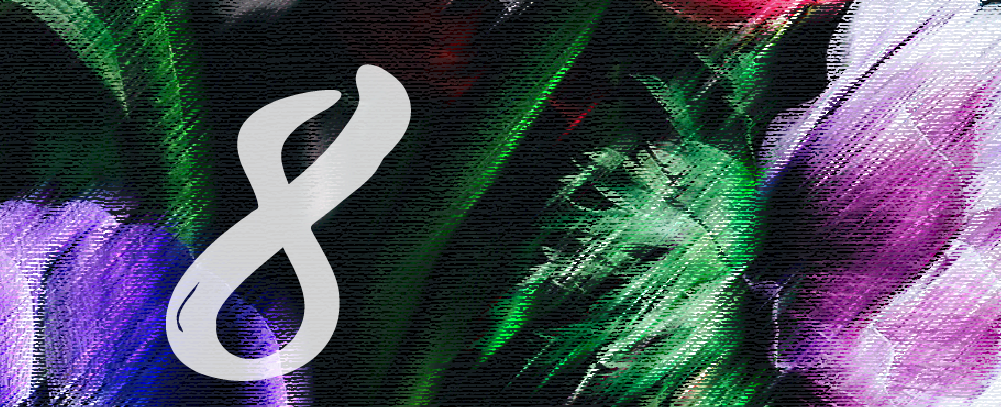

In a century of exaggerated positivism and unbridled materialism, it is astonishing and rare to find a philosopher of great scope, such as the lamented 'Abdu'l-Bahá Abbás, speak to our hearts, to our feelings, and especially seek to educate our soul by inculcating in us the most beautiful principles, which are recognized as being the basis of all religion and of all pure morality.
By His Writings, by His spoken Word, by His intimate conversations as well as by His famous dialogues with the most cultivated and the most fervent adepts of sectarian theories, He knew how to persuade; He was always able to win our minds. Living examples have a special power. His private and public life was an example of devotion and of forgetfulness of self for the happiness of others....
His philosophy is simple, you will say, but it is great by that very simplicity, since it is in conformity with human character, which loses some of its beauty when it allows itself to be distorted by prejudices and superstitions....
'Abbás died in Haifa, Palestine, the Holy Land which produced the prophets. Sterile and abandoned for so many centuries, it is coming back to life and is beginning to recover its rank and its original renown.
We are not the only ones to grieve for this prophet; we are not the only ones to testify to His glory. In Europe, in America, yea, in every land inhabited by men conscious of their own mission in this base world, athirst for social justice, for brotherhood, He will be mourned as well. He is dead after suffering from despotism, fanaticism and intolerance. '
Akká, the Turkish Bastille, was His prison for decades. Baghdád, the Abbasid capital, has also been His prison, and that of His Father. Persia, the ancient cradle of gentle and divine philosophy, has driven out her children, who brought forth their ideas within her. May one not see herein a divine will and a marked preference for the Promised Land which was and will be the cradle of all generous and noble ideas?
He who leaves after Him so glorious a past is not dead. He who has written such beautiful principles has increased His family among all His readers and has passed to posterity, crowned with immortality.
Quoted in Shoghi Effendi and Lady Blomfield, The Passing of 'Abdu'l-Bahá
quoted in full in David Merrick's "Passing of ‘Abdu'l-Bahá"
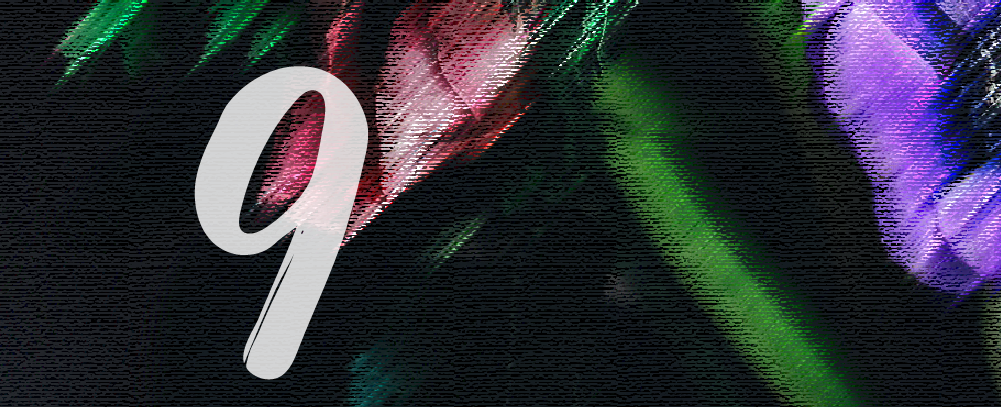

The ancient and modern Mohammedan Arabs have been accustomed to hold ceremonies to eulogize their departed ones for certain purposes: (1) To teach some good lessons to those who are present and can hear; (2) To awaken the heedless and the negligent; as the prophet Mohammed once said to Omar, 'Death is a sufficient teacher;' (3) To encourage the hearers to follow in the steps of the departed one and to characterize themselves with his excellent morals and good deeds; (4) To comfort his family and his people by mentioning of his sublime qualities; then the hearts will sympathize with them and this will lighten some of the heavy burden of the painful calamity; (5) That every thoughtful soul may gain according to his capacity and insight; it should be evident that every creature voluntarily lives and goes about; thinks, assists, teaches and administers; often, with the assistance of his Creator, he investigates the Manifestations of his perfection. Then the end comes. I am grieved over such eulogies.
The Master, ‘Abdu'l-Bahá, is considered one of the inhabitants of 'Akká because these inhabitants lived with him for more than forty years. His meetings were meetings of learning wherein he explained all the heavenly books and traditions. His philosophy includes all philosophy, ancient and modern. His philanthropies to the widows and orphans were never interrupted. Whenever a friend of his passed away he never forgot the survivors with his charity and generosity. He had so great a station; yet he never failed to help the distressed!
In the winter season he met with the learned and notables of 'Akká at the home of Sheikh Ali Miri, and in the summer the meetings were held in a court in the Fakhoreh [Note: near the House of 'Abbud]. In both of those meetings the attendants found him a book of history, a commentary on all the heavenly Scriptures, a philosophy of the pages of contemporary events that pertain to scientific or artistic topics.
Then he moved to Haifa, and then went to Europe and America where he gave comprehensive and eloquent addresses and exhortations. His intention was to bring about unity among religions and sects and to remove the severe strife from their hearts and from their tongues, to urge them to take hold of the essence and let go the nonessential. He did that by presenting his message in a scientific manner.
A group of Persians and others criticized him and found fault with his ideals in pamphlets they published and spread. Nevertheless, without paying any attention to their criticism and oppositions, nor being hurt by their hatred and enmity, he went forward and proclaimed his teachings.
It is the law of God among His creatures—a law which will not be changed—that the originator and declarer of principles must inevitably have those who agree and praise and those who disagree and reject.
Quoted in Shoghi Effendi and Lady Blomfield, The Passing of 'Abdu'l-Bahá
quoted in full in David Merrick's "Passing of ‘Abdu'l-Bahá"
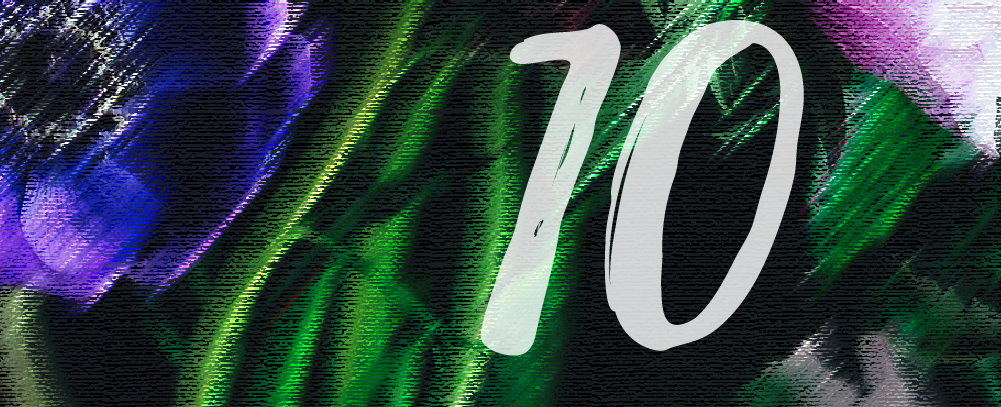

On Sunday night heaven was opened and the spirit of ‘Abdu'l-Bahá flew with its glory.
It was received and entertained by the prophets.
He was washed by the Water of Paradise.
All the people reverently walked for him, even the Kings and their Governors.
O Mount Carmel, thou art now more proud than the heaven, for thou hast become the holiest mountain.
‘Abdu'l-Bahá, thou art now missed by those thou didst care for;
thou didst cure their ailments and thou wert their remedy.
I shall weep with tears for thee as long as I am living; how often thou didst wipe them with thy hands;
It is befitting that the creatures should weep for thee, because in thy departure they have lost their moon and intelligence.
God is great: Adam, Moses, Christ and Mohammed have sung praises to thy soul, yearning for its meeting.
If I could, I would have composed a poem of the jewels of the stars for the praise of the people of ‘Abdu'l-Bahá. »Quoted in Shoghi Effendi and Lady Blomfield, The Passing of 'Abdu'l-Bahá
quoted in full in David Merrick's "Passing of ‘Abdu'l-Bahá"
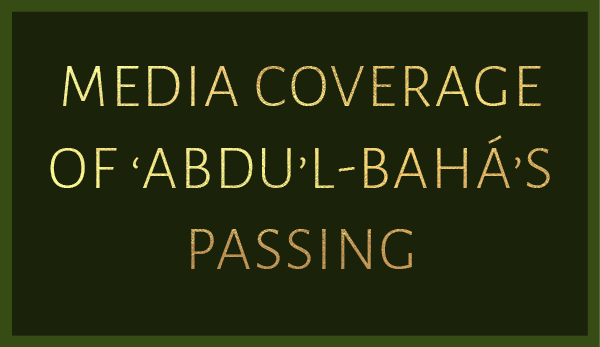


Below are clippings of all six newspapers mentioned by Shoghi Effendi in God Passes By when he provides a list of publications announcing the passing of ‘Abdu'l-Bahá. This is a collaboration with Amín Egea, who provided all of the newspaper clippings (except for "Le Temps) from his own personal research collection for Apostle of Peace, Volume 2 - References to Abdu’l-Baha in the Western Press 1912-1921. The newspaper clippings are displayed in the order they are mentioned by Shoghi Effendi.
« Many and divers newspapers, such as the London “Times,” the “Morning Post,” the “Daily Mail,” the “New York World,” “Le Temps,” the “Times of India” and others, in different languages and countries, paid their tribute to One Who had rendered the Cause of human brotherhood and peace such signal and imperishable services. »
Shoghi Effendi in God Passes By

The Times
LONDON, GREAT BRITAIN
30 November 1921
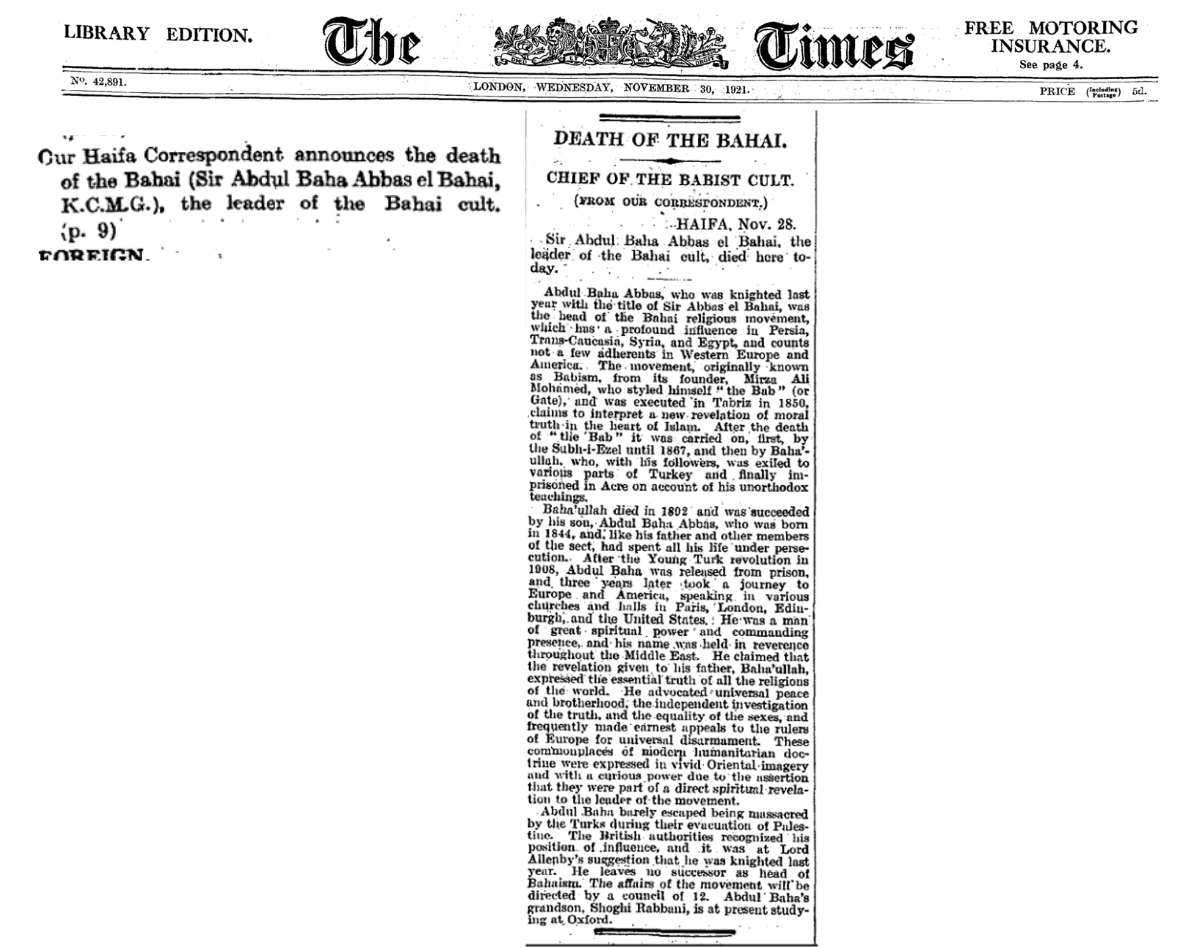

The Morning Post
1 December 1921
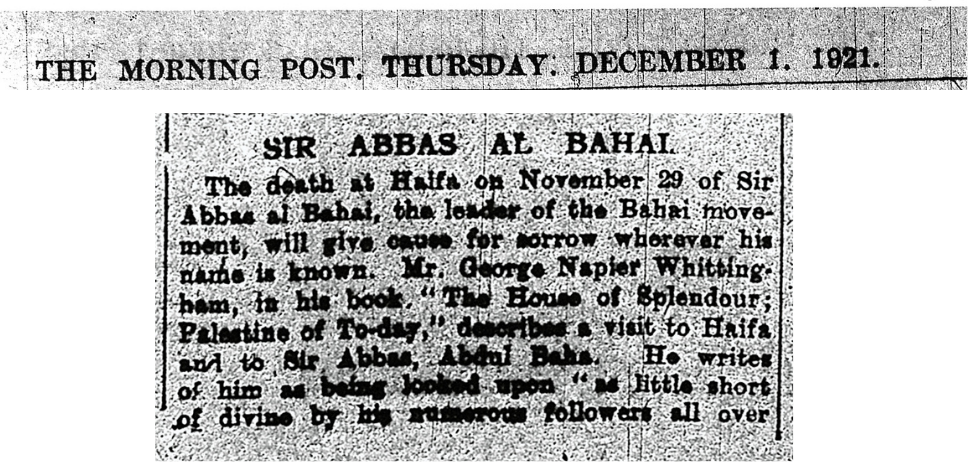

The Daily Mail
1 December 1921
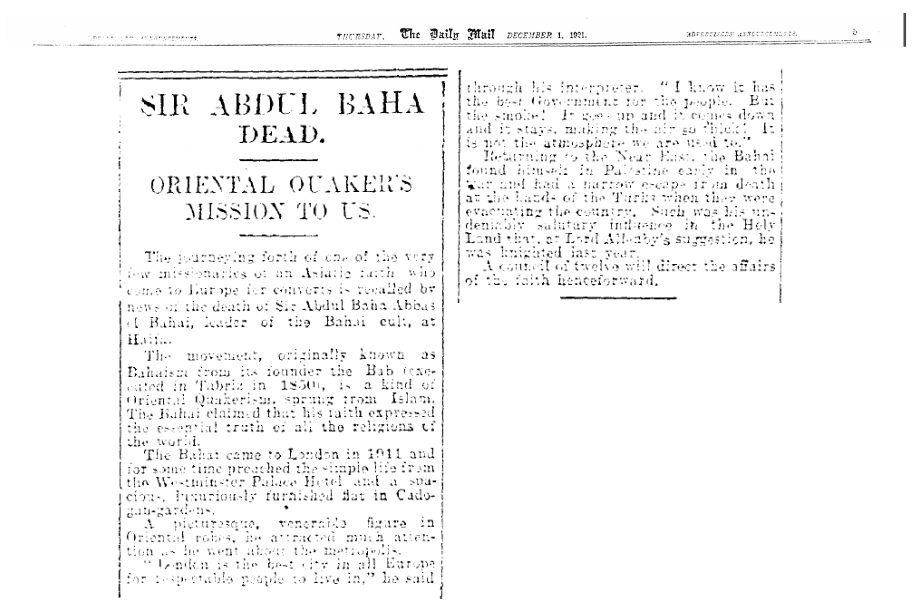

The New York World
NEW YORK CITY, THE UNITED STATES
1 December 1921
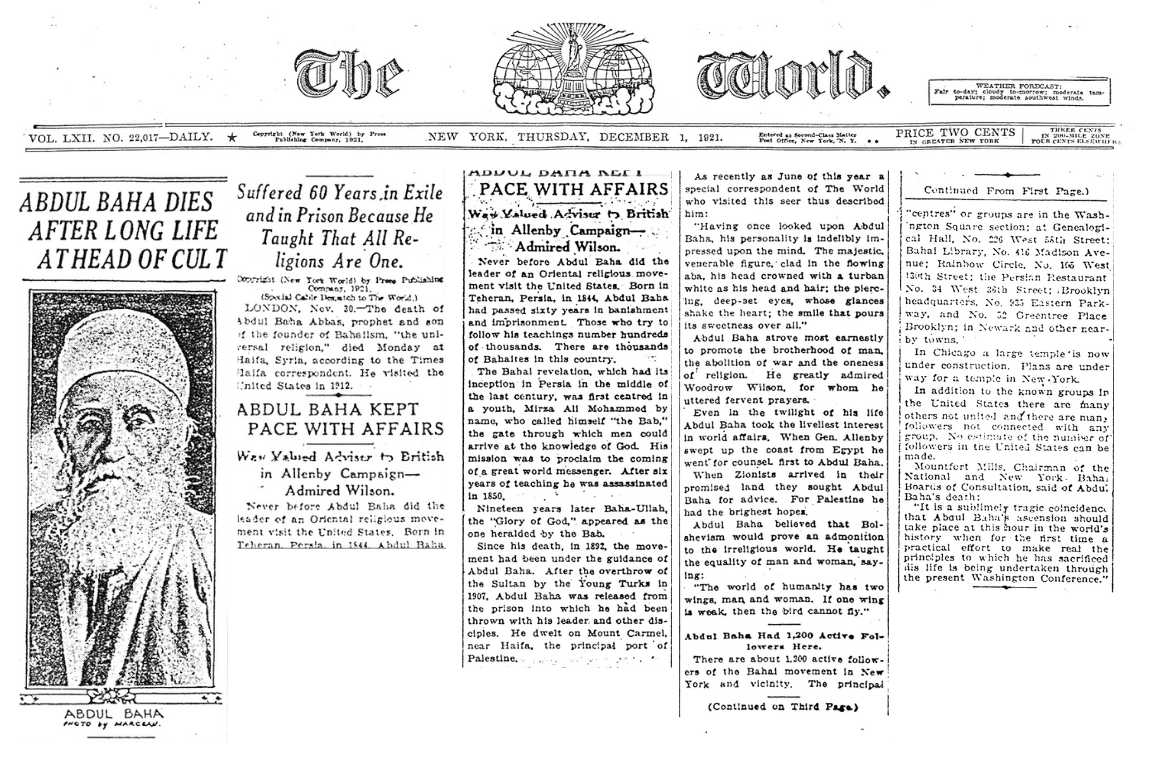

Le Temps ("The Times")
PARIS, FRANCE
10 December 1921
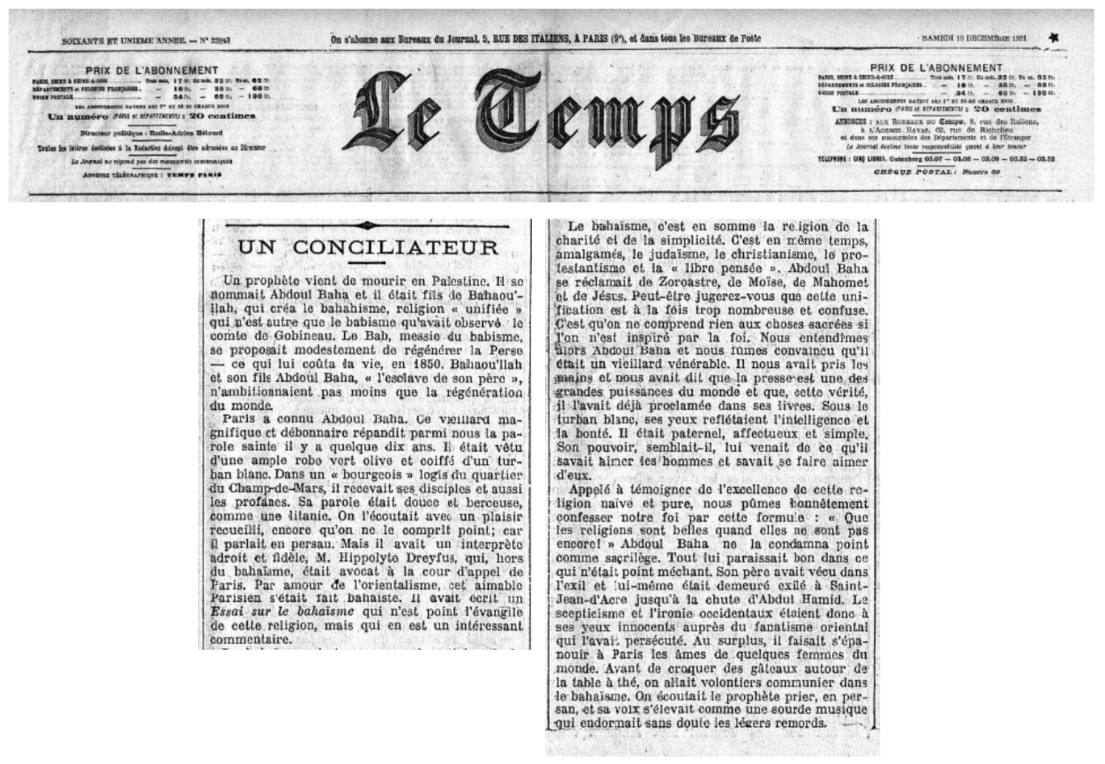
"Un conciliateur" ("A Reconciler") - 10 December 1921 article published on page 1 of "Le Temps." From BNF - Gallica.

The Times of India
2 January 1922
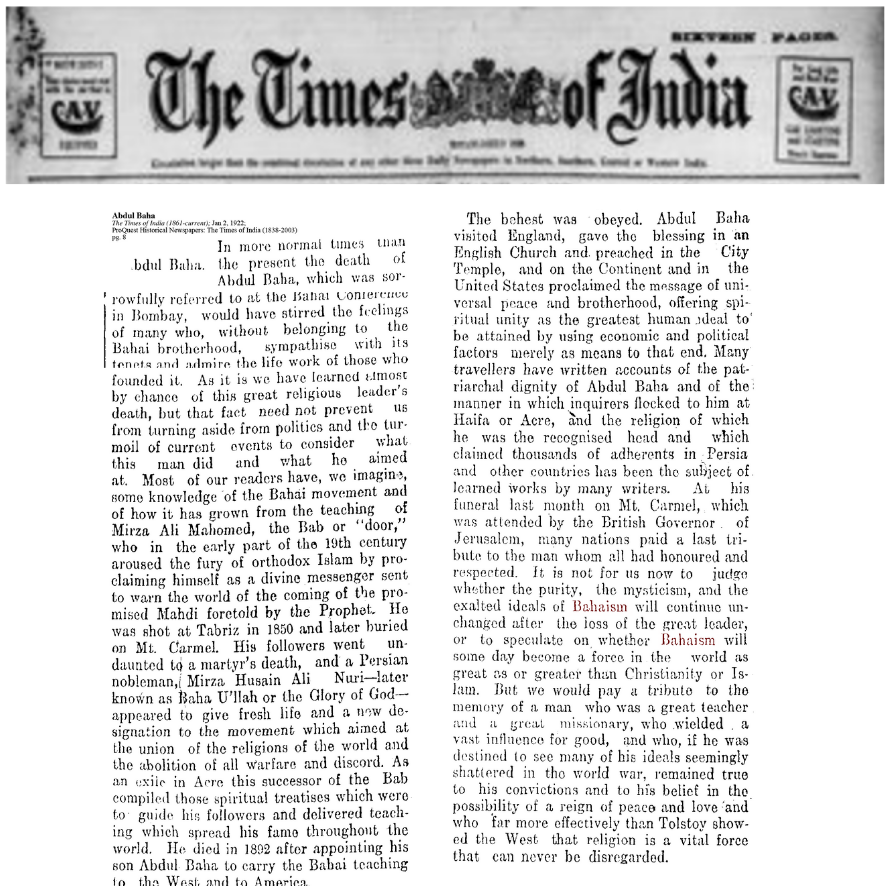
This section is a collaboration with Bahá'í historian Necati Alkan, who provided all six clippings in Arabic and Turkish (in Arabic script) from his personal research collection. This is a crucial section because it vividly demonstrates how two former Ottoman territories, Turkey and Palestine, who had been responsible for decades of 'Abdu'l-Bahá's oppression and imprisonment, came to see 'Abdu'l-Bahá by the end of His earthly life, and mourned Him as Western newspapers mourned Him. There is no greater measure of the feelings of a country than its media. The newspaper articles are displayed here by chronological order of publication.

Annafir ("The Bugle")
HAIFA, PALESTINE
29 November 1921
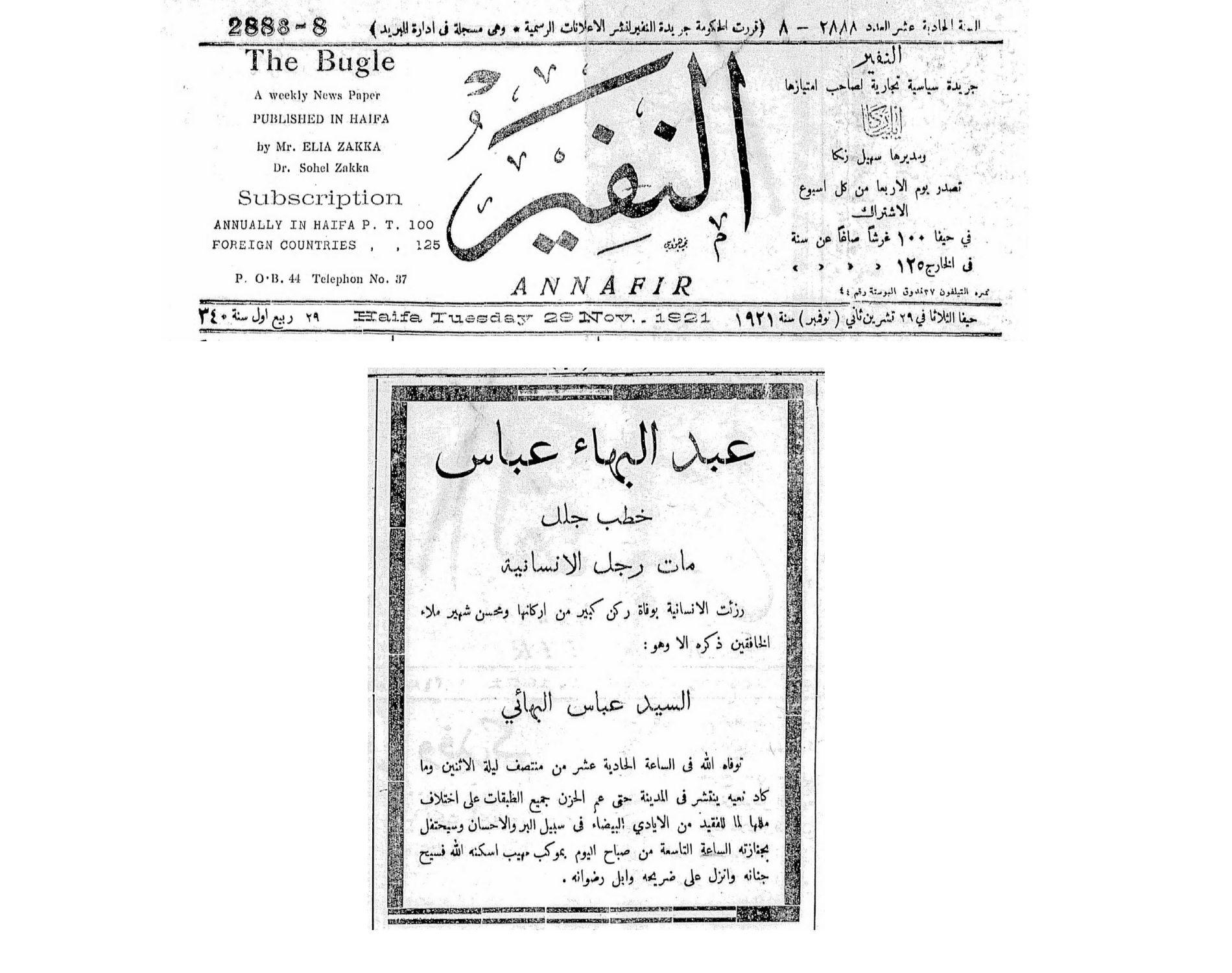

Lisan al-Arab ("The Language of the Arab")
JERUSALEM, PALESTINE
29 November 1921
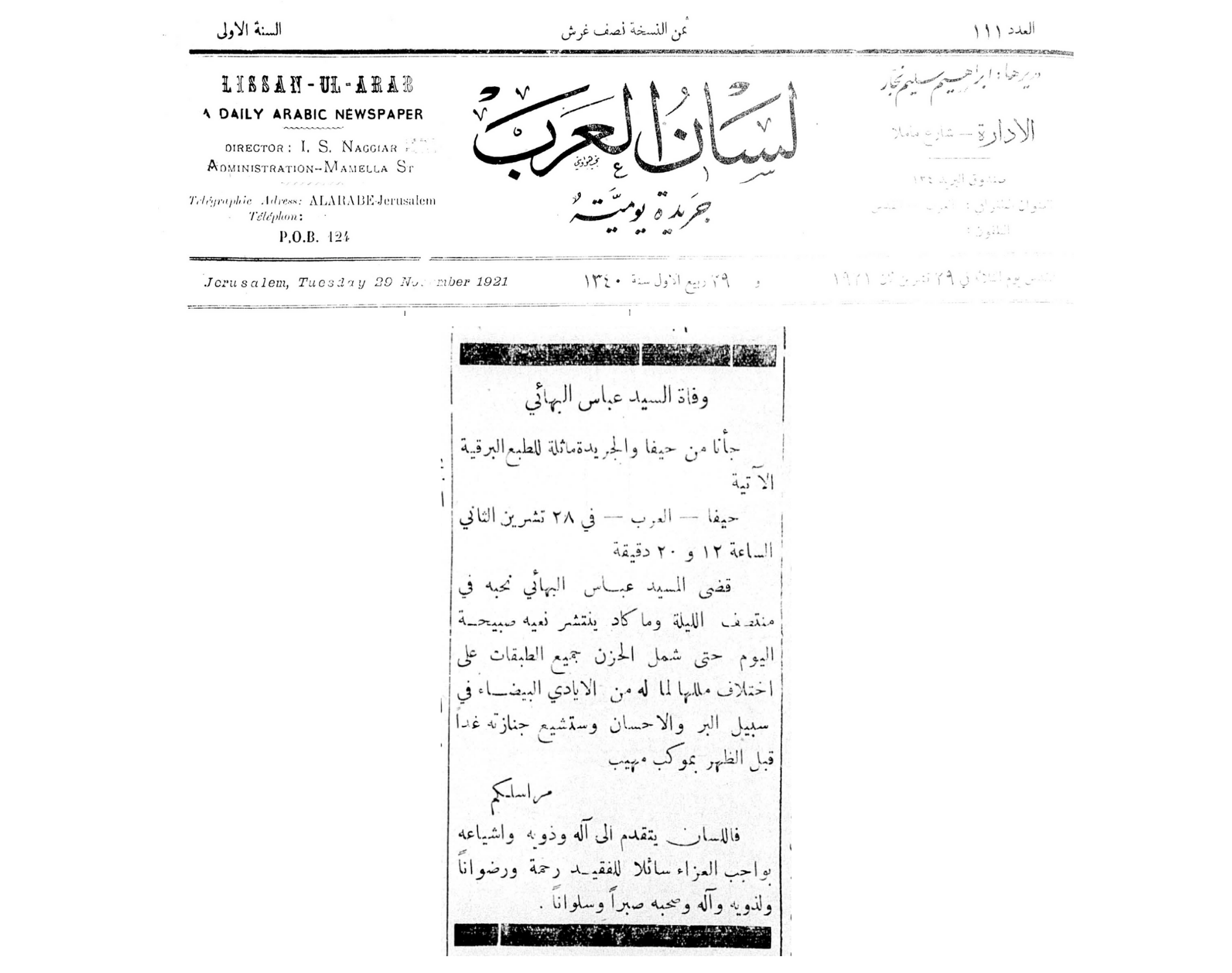

El-Carmel ("The Carmel")
HAIFA, PALESTINE
30 November 1921
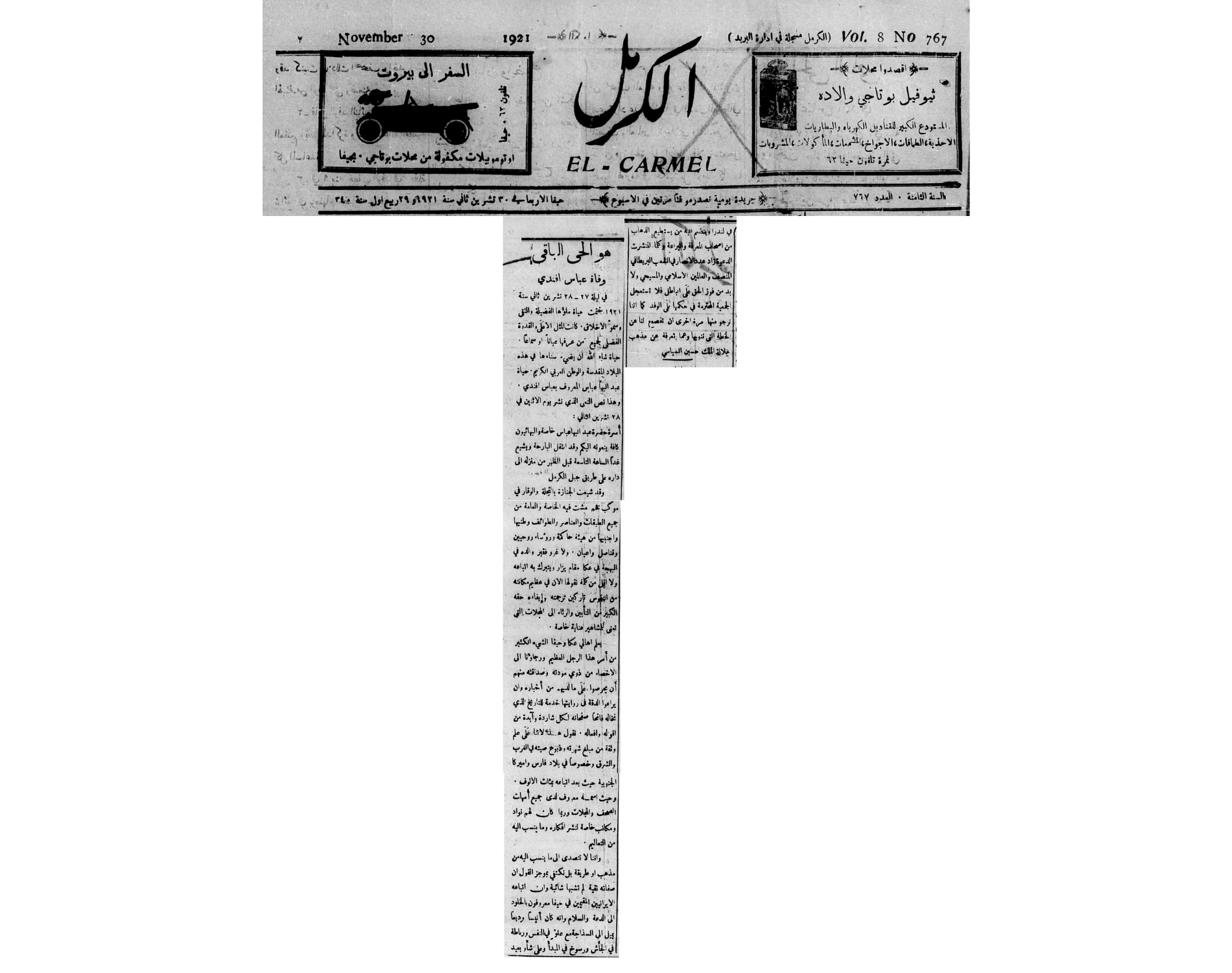

Falastin ("Palestine")
YAFFA, PALESTINE
30 November 1921
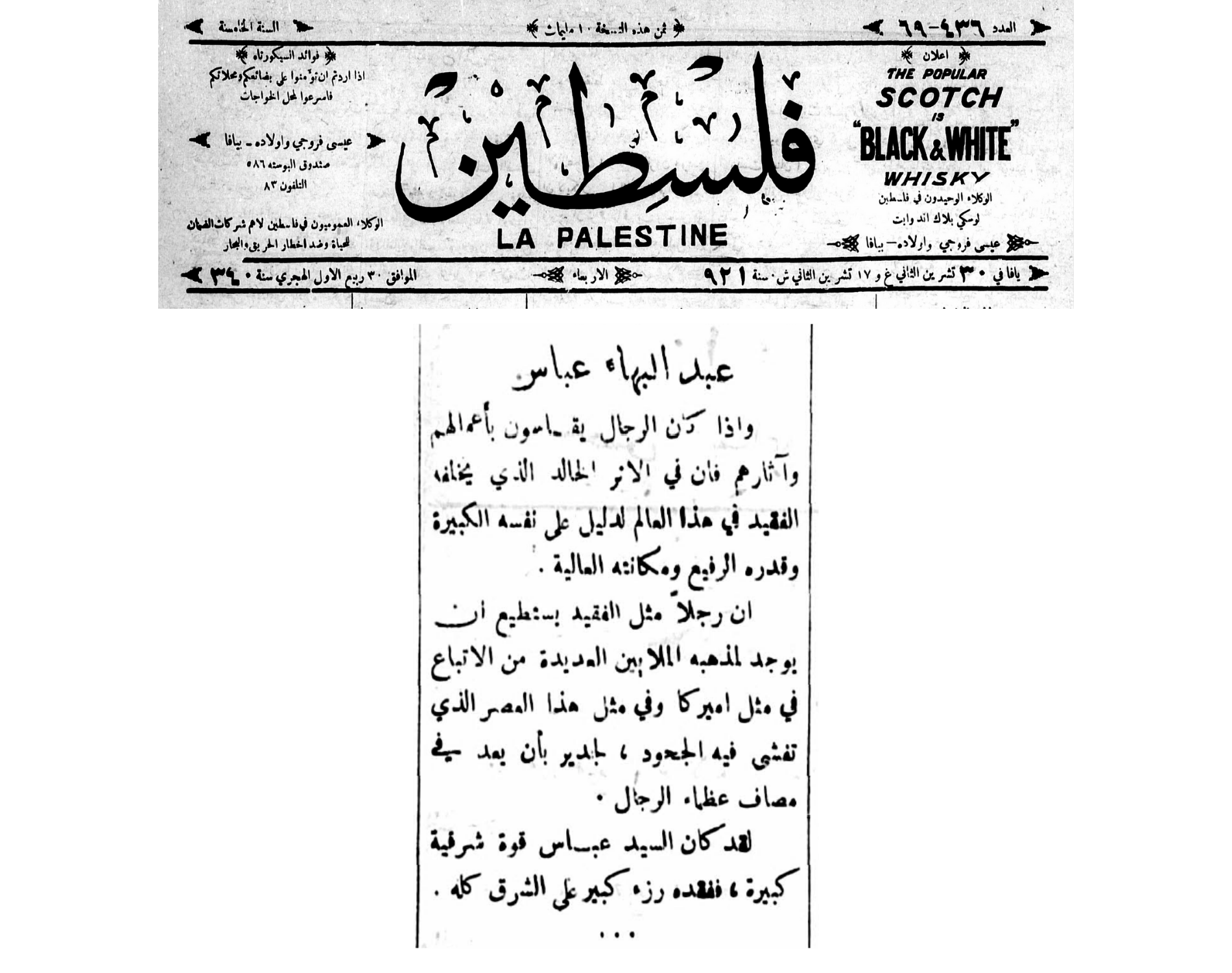

Ikdam ("Endeavor")
ISTANBUL, TURKEY
9 December 1921
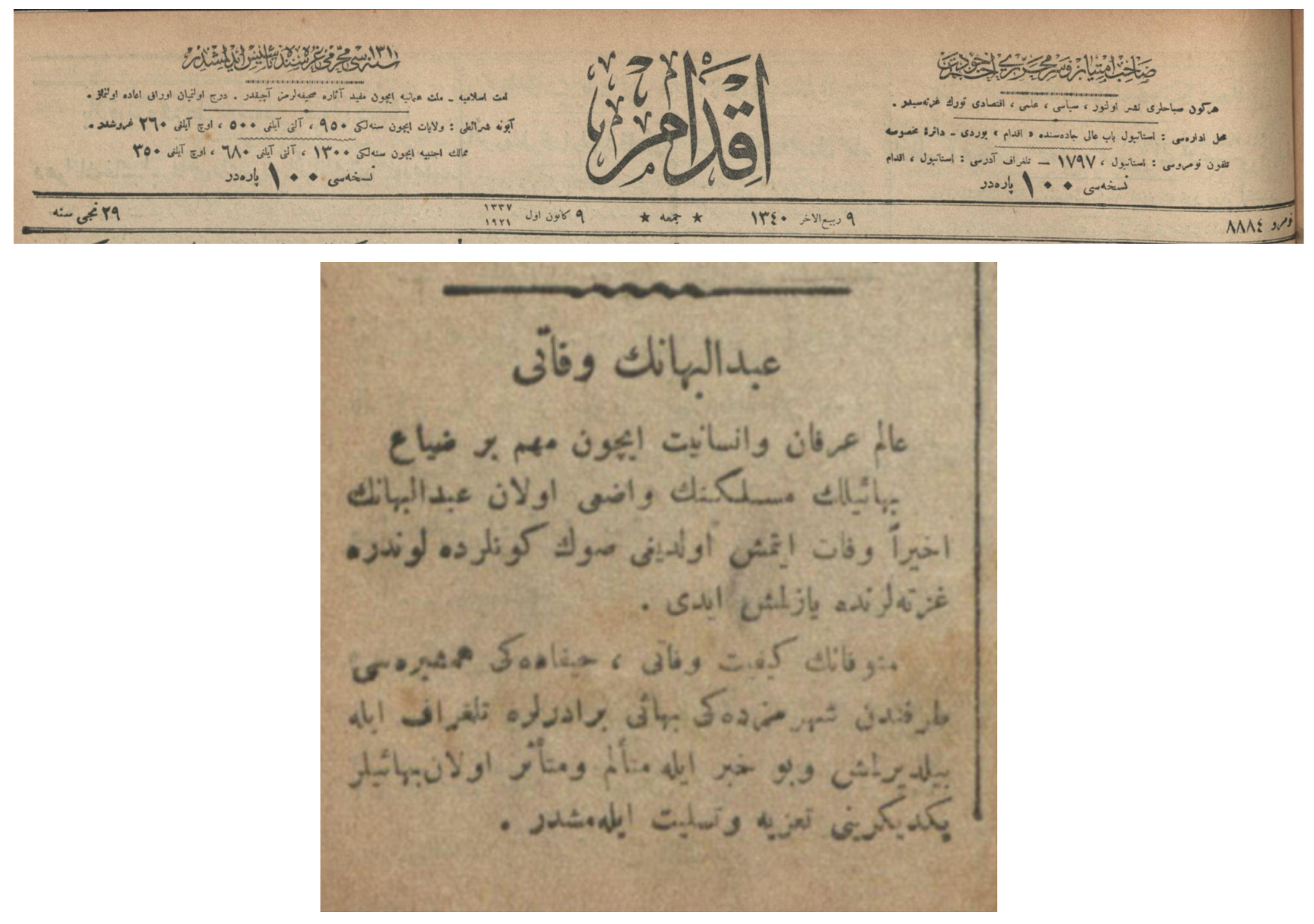

As-Salam ("Peace")
JAFFA, JERUSALEM, HAIFA, PALESTINE
16 December 1921
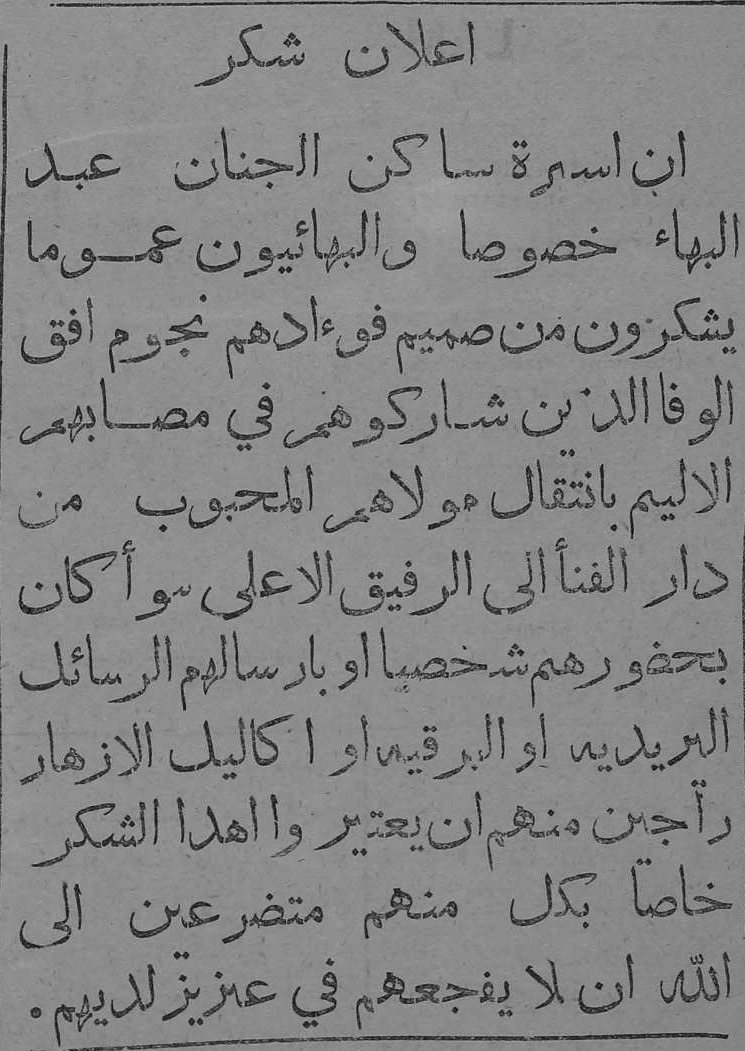
This is currently the only article which has been translated, thanks to the kind efforts of Nadim Golmohamad:
A Declaration (Announcement) of Gratitude
The family of the dweller of Paradise 'Abdu'l-Baha in particular and the Baha'is in general give their heartfelt thanks to the stars of the horizon of faithfulness that partook in their agonizing griefs for the transition of their beloved Master from this perishing realm to the concourse on high, whether it was by their physical attendance to pay their respects or by mail or telegrams or the sending of wreaths of flowers. We hope that this presentation of gratitude concerns every one of them. Supplicating God that they should not be struck by the sad loss of any of their dear ones.

Ijtihad ("Independent Reasoning")
ISTANBUL, TURKEY
15 February 1922
The caption under ‘Abdu'l-Bahá's photograph reads in Turkish:
"The late 'Abdu'l-Bahá 'Abbas"
(Abdulbaha Abbas merhum)
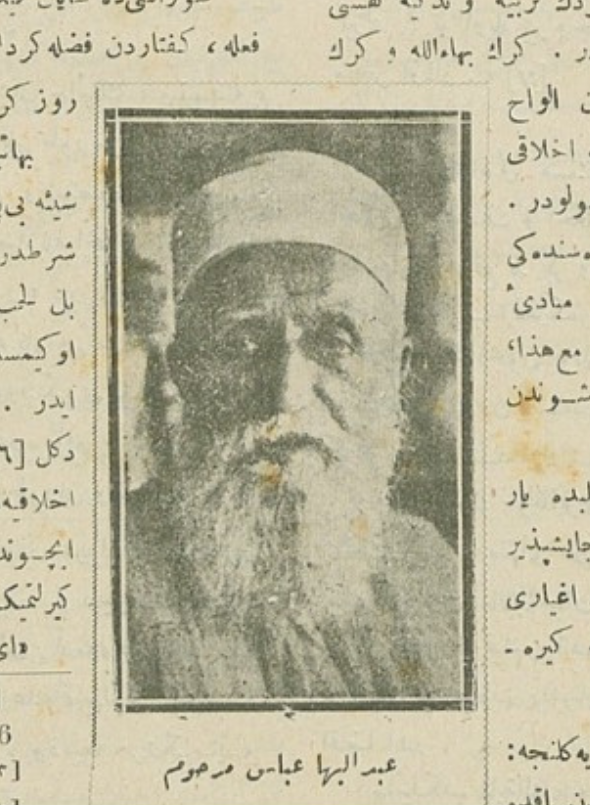
Below is a photo-montage of 69 newspaper clippings from Newspaper.com dated December 1, 1912 announcing the Passing of ‘Abdu'l-Bahá. Most of the articles used the Associated Press news release out of London, dated November 30, 1921. All of of the ones which did so, are represented by their headlines alone. The few articles that went beyond the press release are in the lightbox in the top center. Obituaries which used the Associated Press release but included a photograph of ‘Abdu'l-Bahá are in the lightbox on the left. The full text of the press release is in the lightbox in the top right. Bordered in gold in the center of the graphic is the abbreviated Associated Press release which was reprinted by all the newspapers whose headlines are around it. For design reasons, it would have been impossible to attribute each clipping, even the ones in the top of the graphic. The full, printable, PDF list of newspaper articles is listed in this document which you can download.
Many articles got details wrong (‘Abdu'l-Bahá's age and place of death, the number of years since His visit to America, Bahá'u'lláh's date of death, calling the Bahá'í Faith a cult), but the thing to remember is that the coverage was almost universal, very often in the first five pages of the newspaper, and they frequently mention ‘Abdu'l-Bahá visit to the United States, nine years prior.

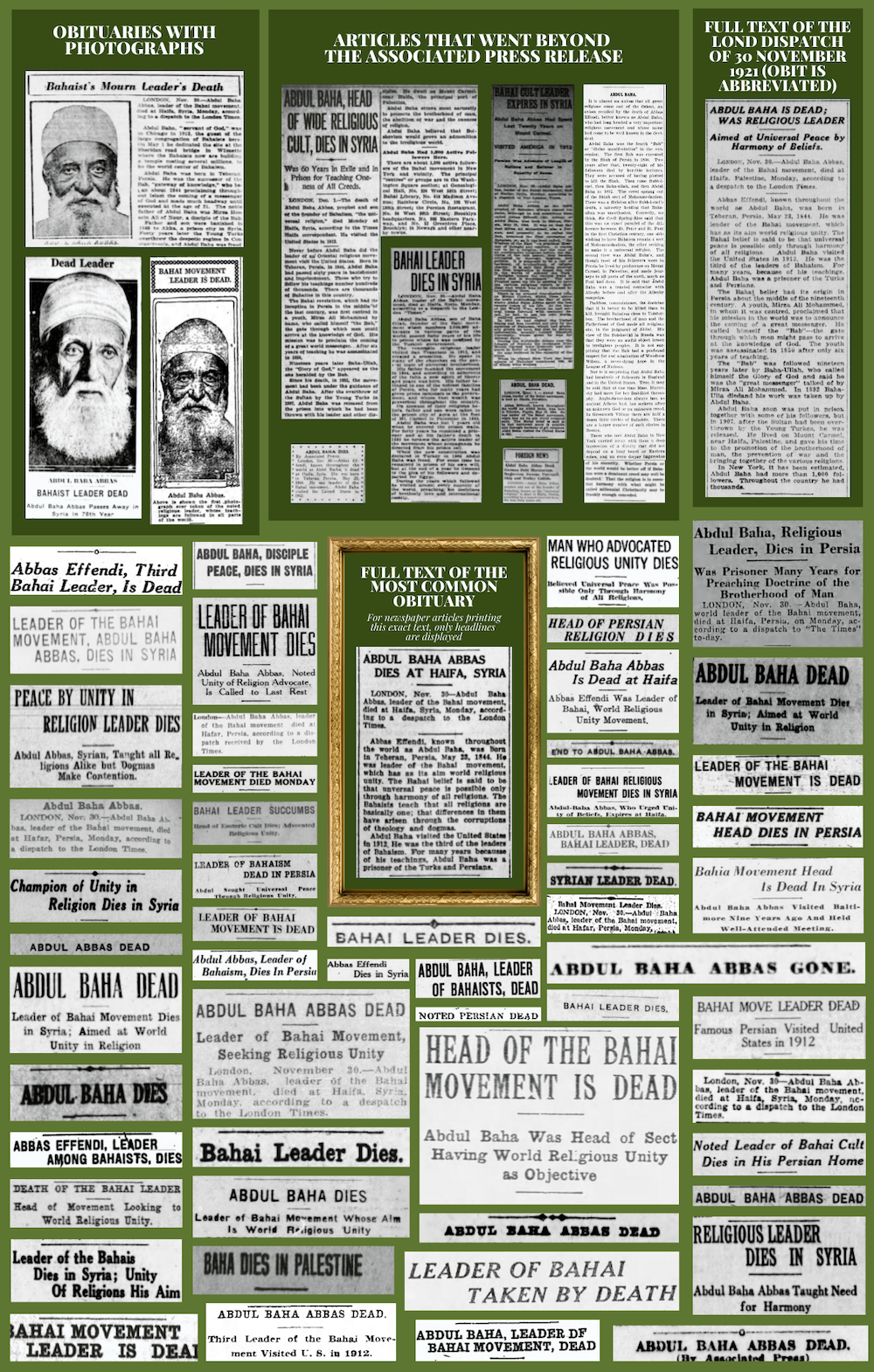

For the Star of the West issue immediately following the Ascension of 'Abdu'l-Bahá, Volume 12, Number 15, the editors inverted the colors on the cover to make it white on black, rather than the usual black on white. They produced a very dignified, pared-down issue, publishing two photographs of 'Abdu'l-Bahá, including one sent in by Fujita, His longtime friend and assistant, which is one of the last photographs taken of 'Abdu'l-Bahá before His passing. They also included a facsimile of the cablegram sent by Bahíyyih Khánum to the Bahá'ís around the world announcing the passing of the Master. Fujita later sent more photographs of ‘Abdu'l-Bahá shortly before His passing, which appeared in subsequent editions of Star of the West.
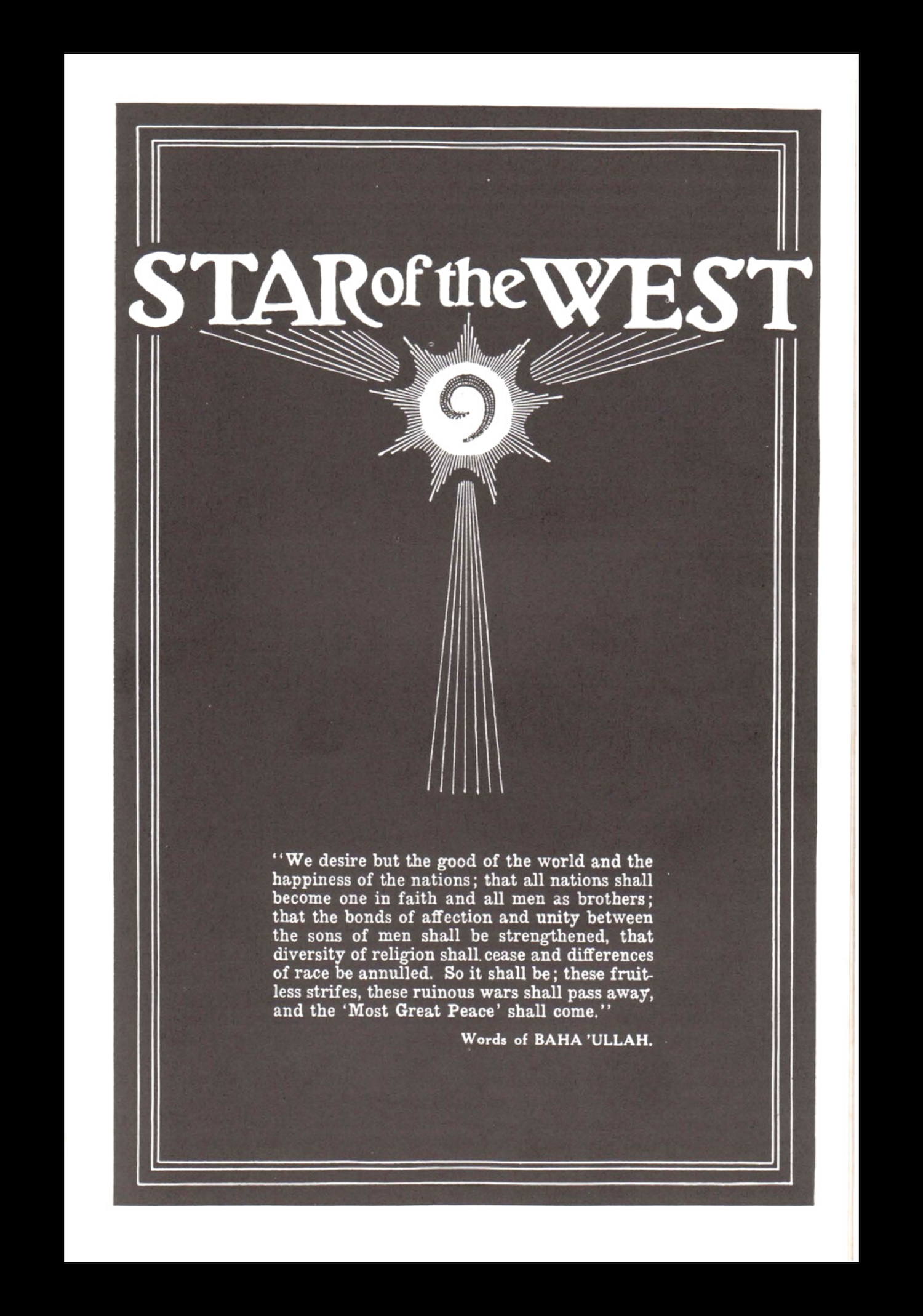
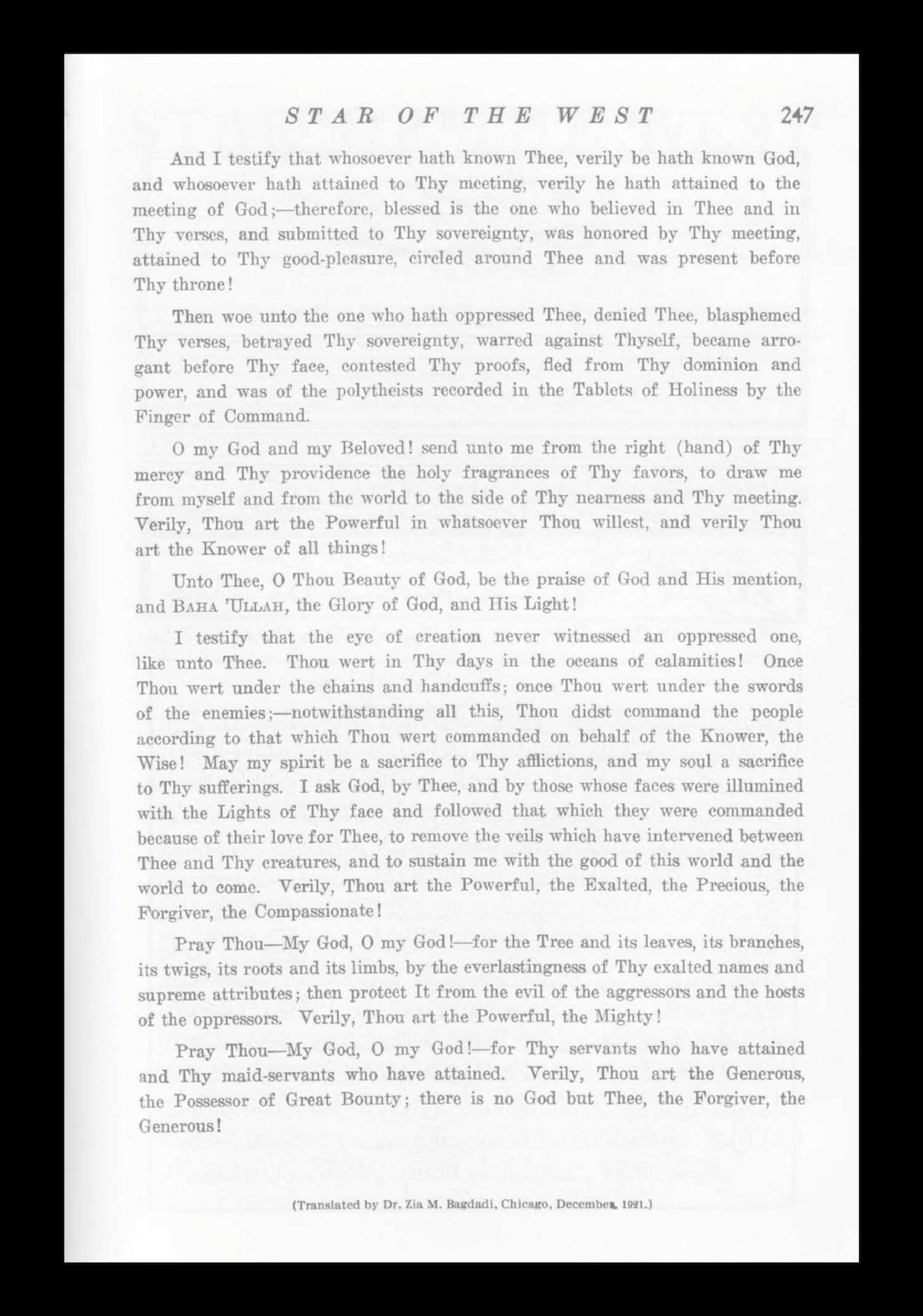
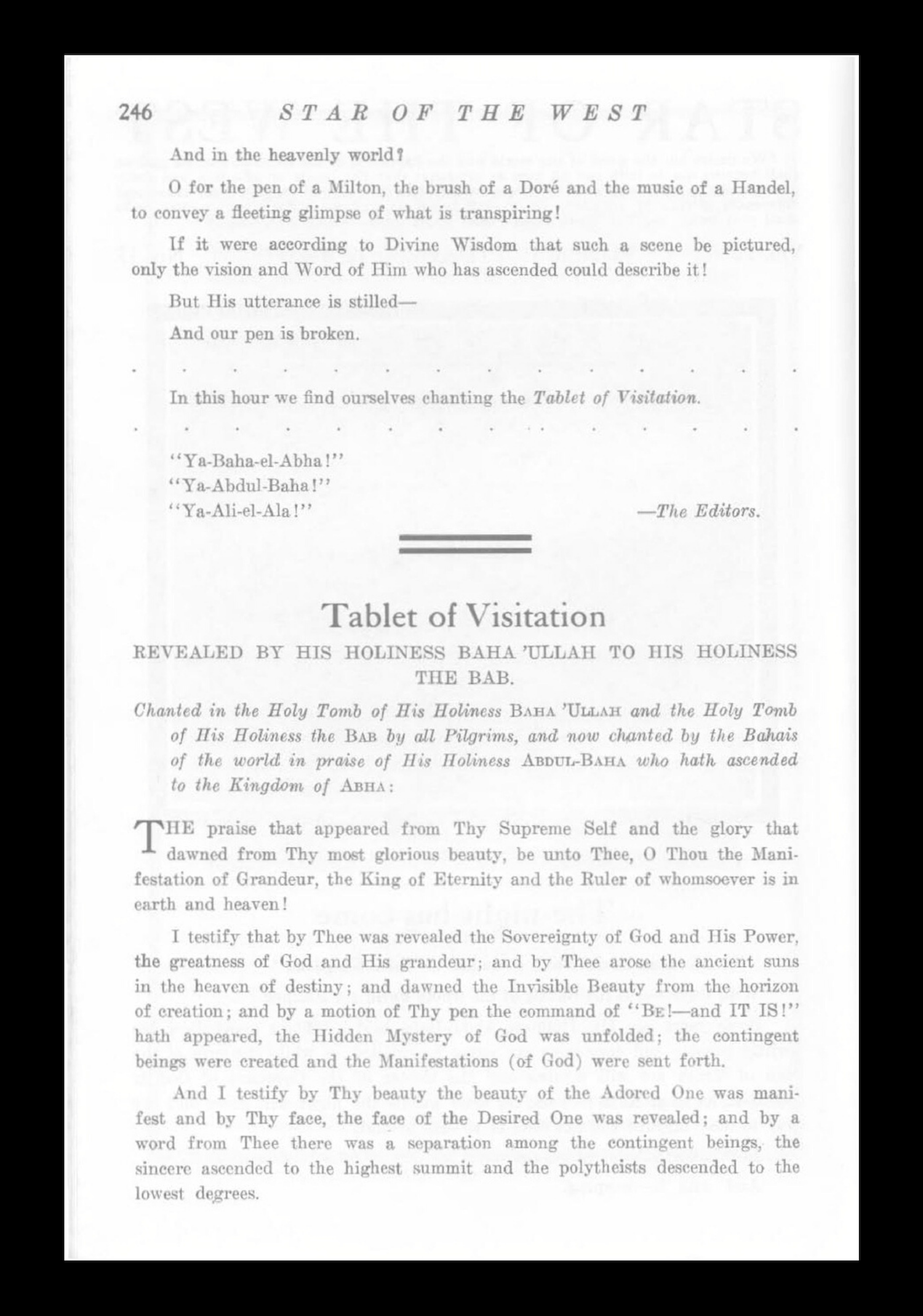
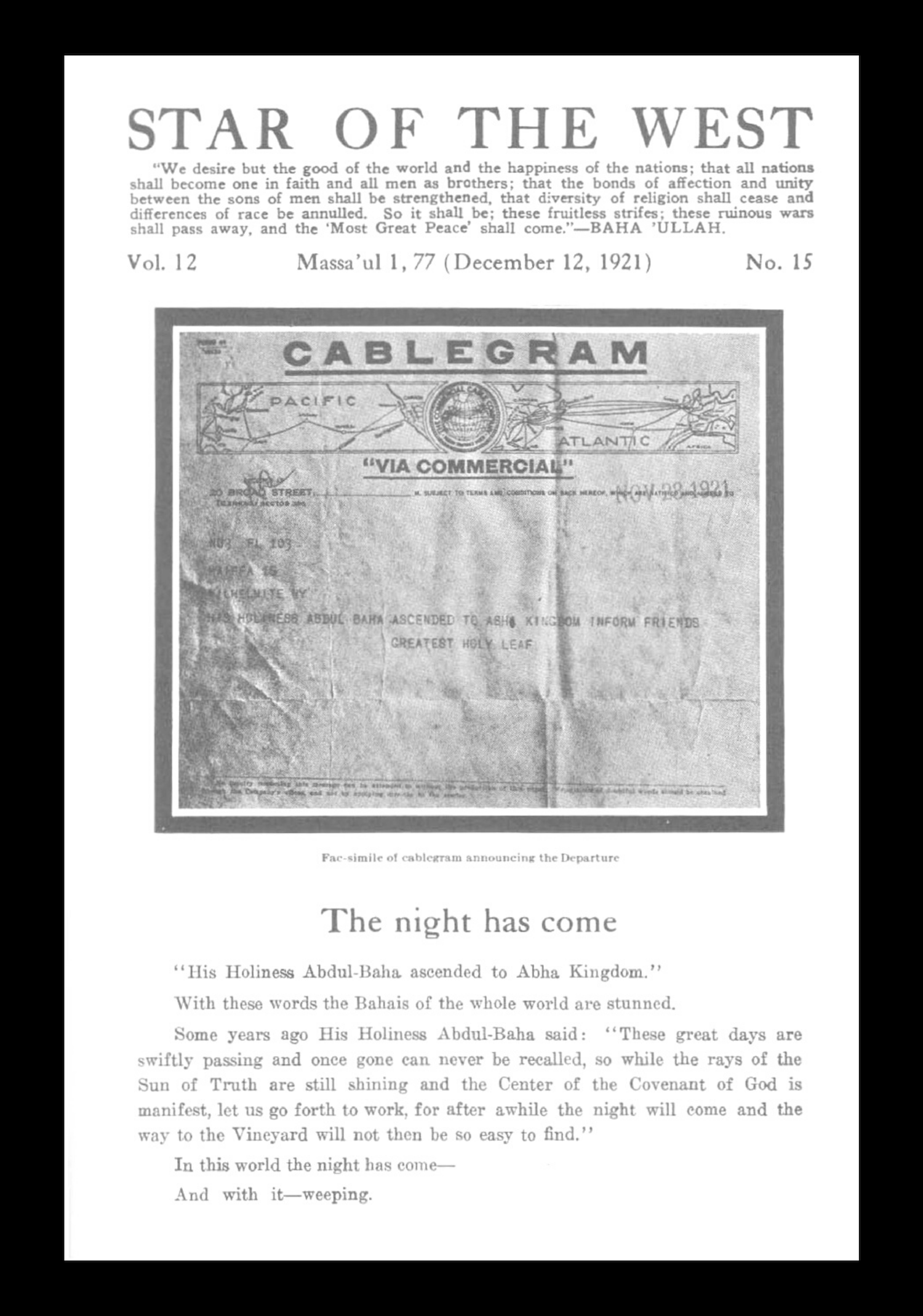
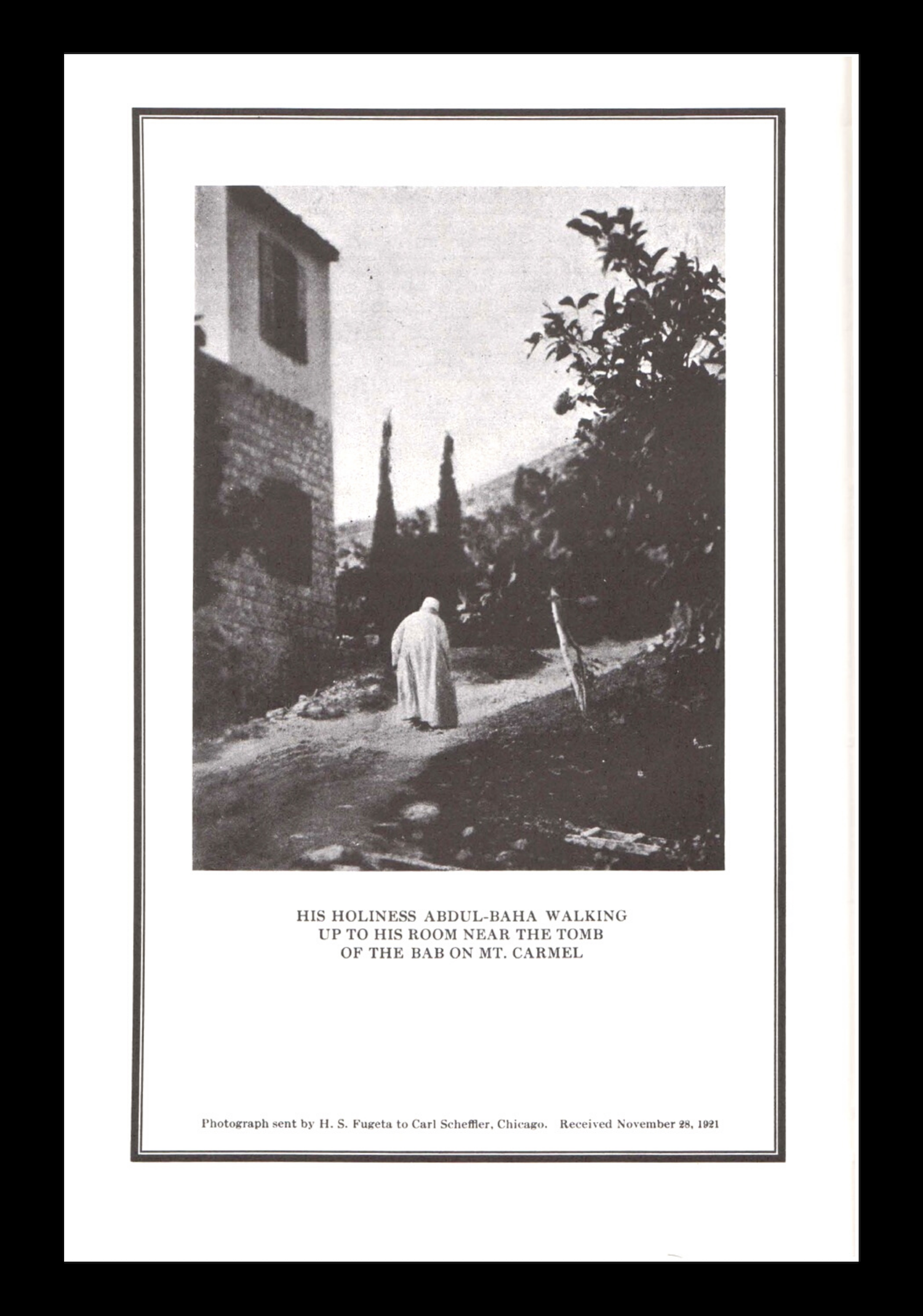
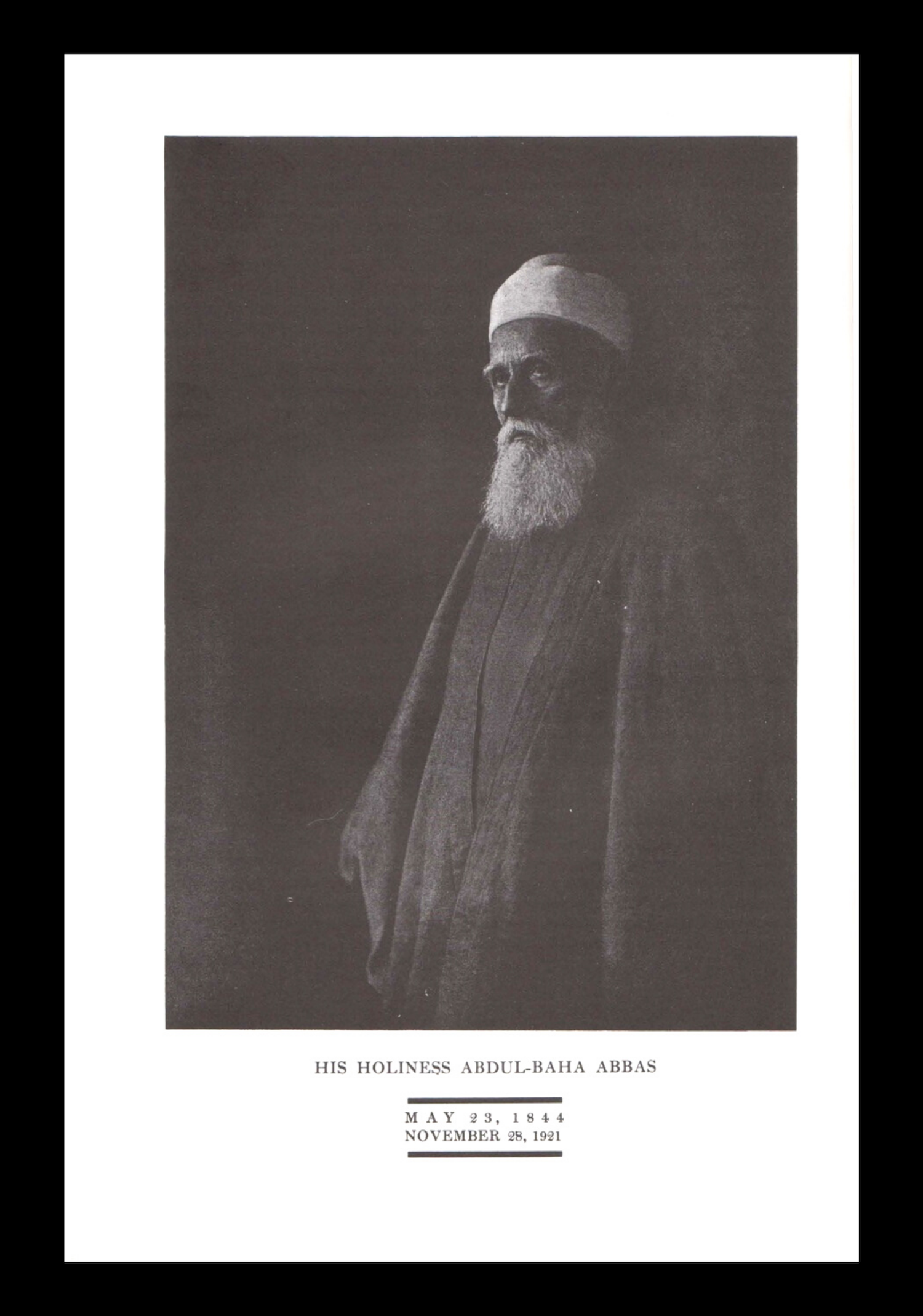
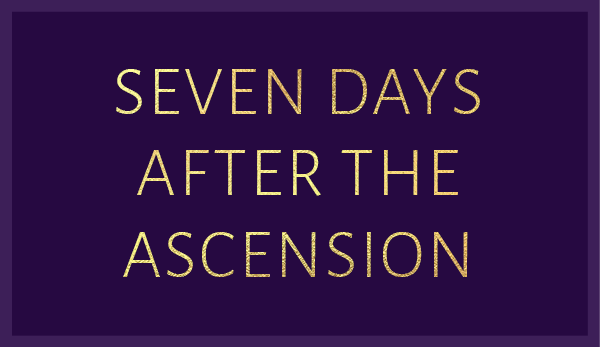
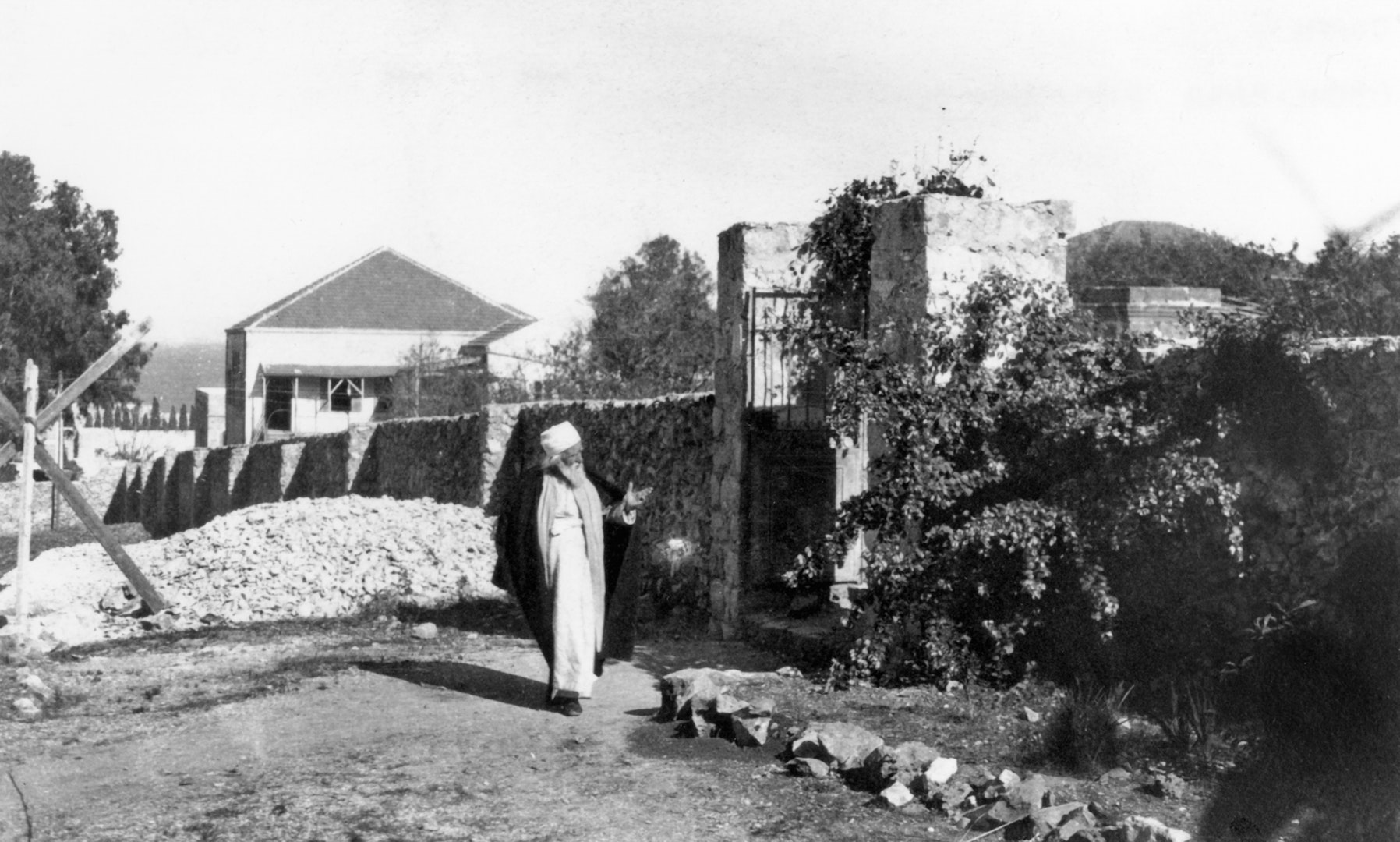
‘Abdu’l-Bahá walking outside 7 Haparsim Street in Haifa, c. 1919, where the mourners come and pay their respect during this week of mourning. Source: Bahá'í Media Bank, © 2023 Bahá'í International Community.

In 1892, the week following the passing of Bahá'u'lláh had been an intense period of mourning for the people of 'Akká.
Now, 29 years later, the week following ‘Abdu'l-Bahá's funeral is also a period of deep mourning. In the seven days following the passing of ‘Abdu'l-Bahá, between 50 and 100 of the poor of Haifa come to His home to pay their respects, many staying overnight, and are welcomed, received, and fed by the Holy Family.
This takes place in the very same spot where it had been the custom of ‘Abdu'l-Bahá, the "Father of the Poor," to give alms to the needy and the destitute. The grief of Haifa's poor at losing their beloved ‘Abdu'l-Bahá is heart-wrenching to eyewitnesses of the time. Louise Bosch, an American pilgrim remembers that they all "wept bitterly."
She describes the grieving pain of the Greatest Holy Leaf, Munírih Khánum, ‘Abdu'l-Bahá's widow, and her four daughters, Ḍíyá‘íyyih Khánum, Ṭúbá Khánum, Rúḥá Khánum and Munavvar Khánum, not only receiving these throngs of brokenhearted friends of ‘Abdu'l-Bahá, but also speaking with them, being embraced, kissed, and especially being bewailed by the visitors, in a custom where the more honored the deceased, the longer and louder the weeping and wailing of the mourners. Throughout the day, Tablets were chanted to the mourners.
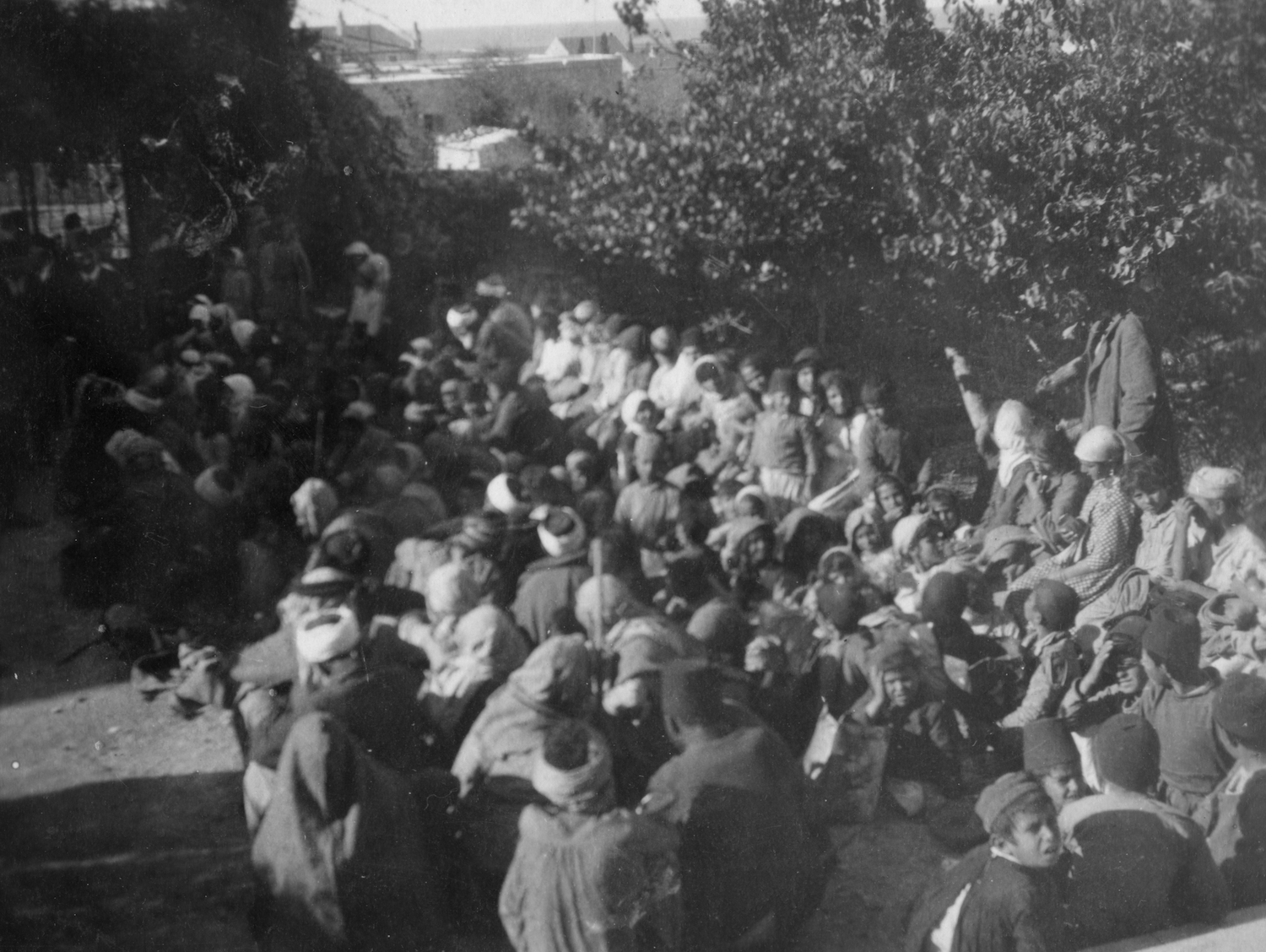
Bahá'í friends getting ready to give corn and wheat to the multitudes of the poor on the seventh day after the Ascension, after the week of mourning, December 5, 1921. Photograph taken by Lotfullah Hakim, courtesy of the National Bahá'í Archives of the United States.
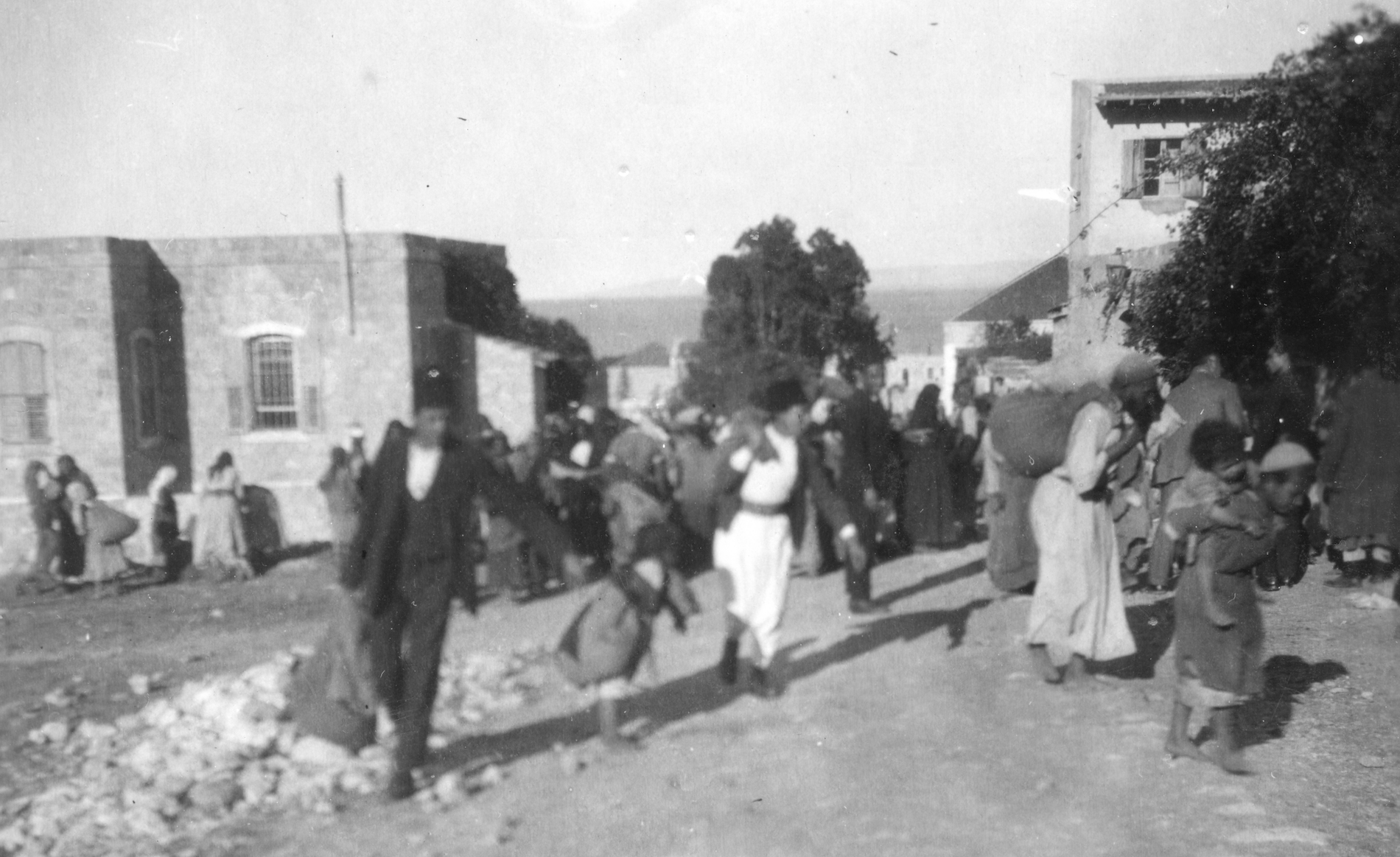
The poor, leaving ‘Abdu'l-Bahá's house, loaded with bags of wheat, on the seventh day after the Ascension, after the week of mourning, December 5, 1921. Photograph taken by Lotfullah Hakim, courtesy of the National Bahá'í Archives of the United States.

On the seventh day after ‘Abdu'l-Bahá's passing, corn and wheat are distributed in His memory to about a thousand of the poor of Haifa, "irrespective of creed or race."
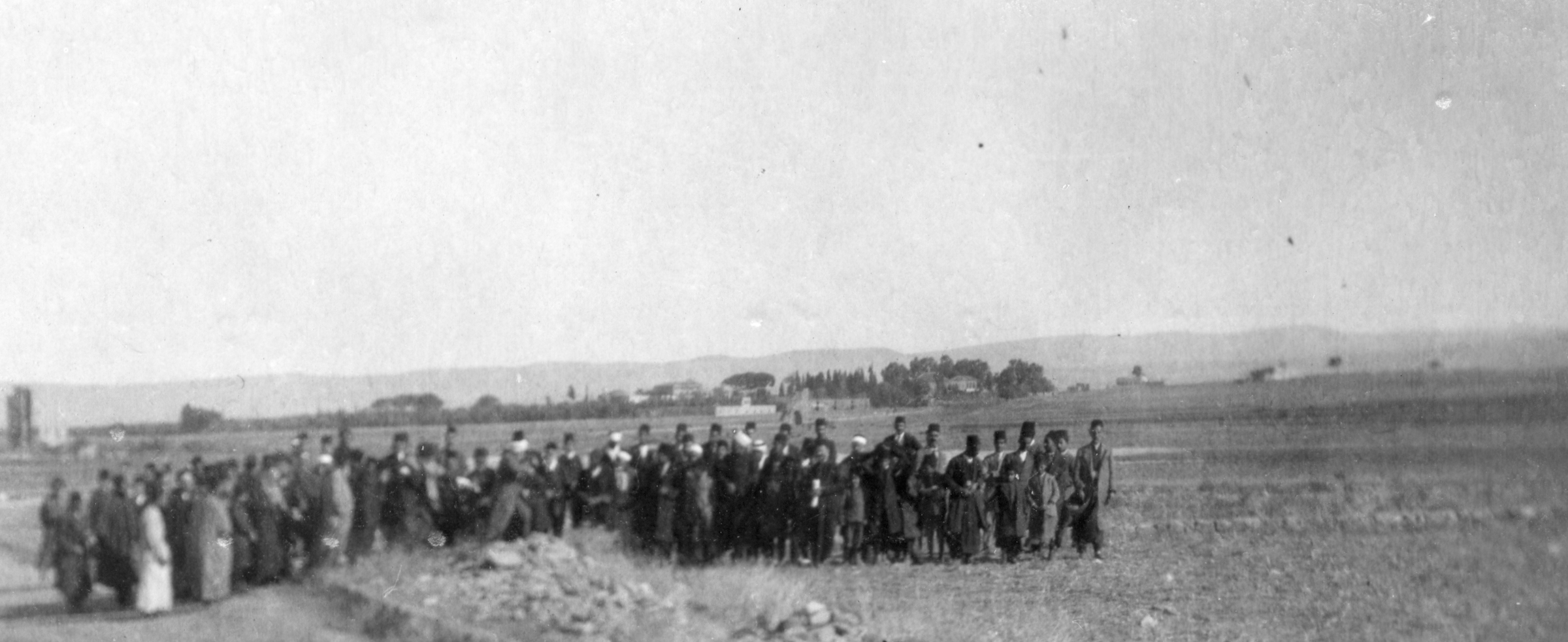
The Bahá'i pilgrims and residents, on their way from 'Akká to Bahjí on the ninth day after the Ascension, December 7, 1921. This photograph was taken halfway between Akká (which is behind the photographer) and Bahjí (which can be seen in the distance behind the right hand side of the group) along the route of the old aqueduct (which is underground at this site). Detailed caption provided by Andrew Blake. Photograph taken by Lotfullah Hakim, courtesy of the National Bahá'í Archives of the United States.
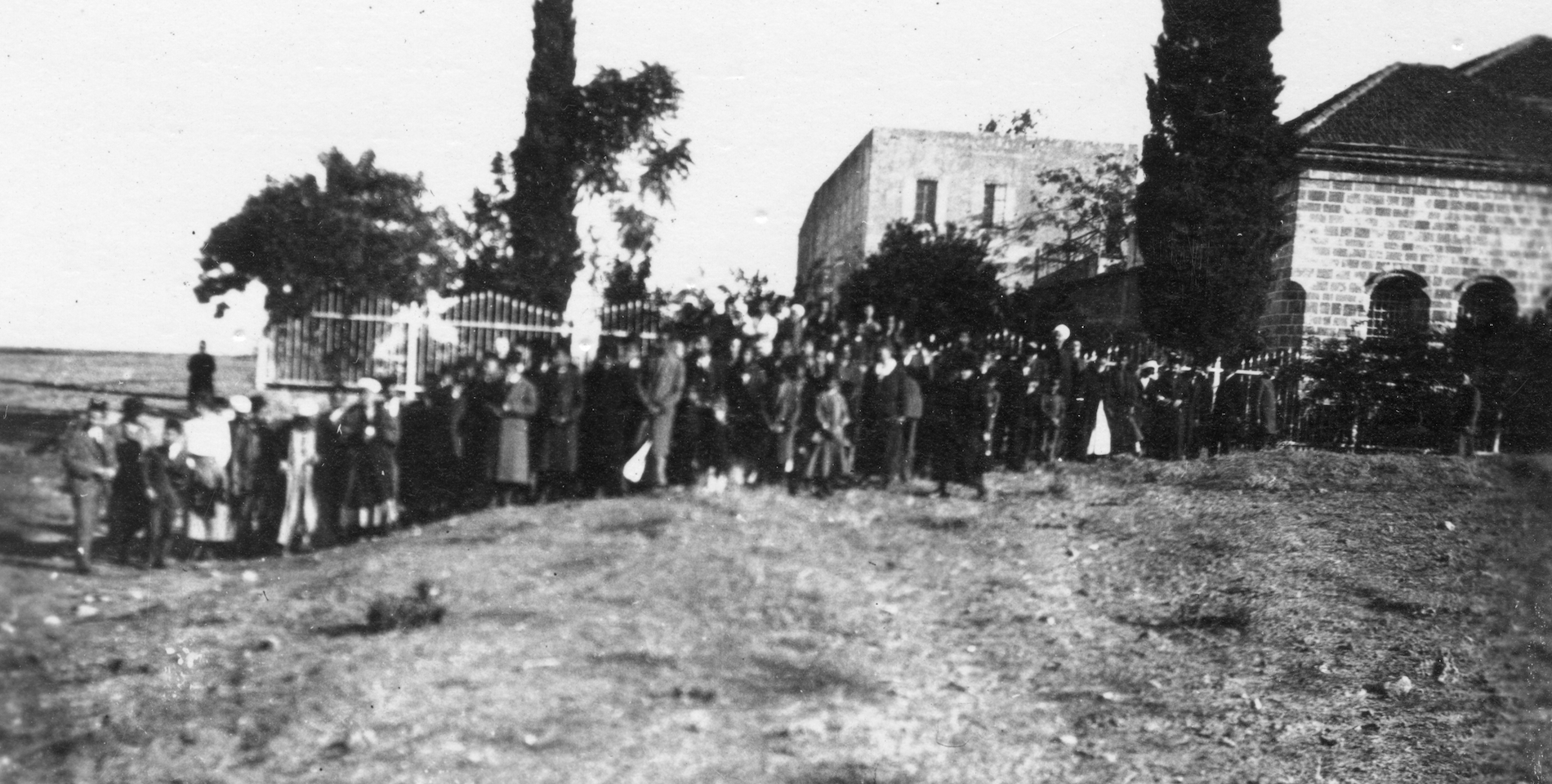
The Bahá'i pilgrims and residents, outside the Shrine of Bahá'u'lláh at Bahjí, after they have paid their respects, on the ninth day after the Ascension, December 7, 1921. Photograph taken by Lotfullah Hakim, courtesy of the National Bahá'í Archives of the United States.

The ninth day following ‘Abdu'l-Bahá marks the final official day of mourning. On this day, 138 pilgrims take the train from Haifa to 'Akká for a visit to the Shrine of Bahá'u'lláh at Bahjí. The ladies of the Holy Family go after the general crowd, accompanied by women Western pilgrims.
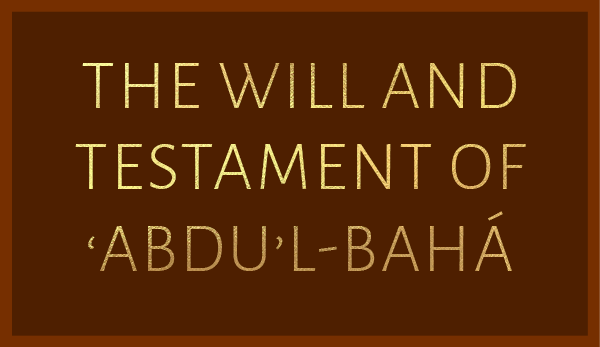
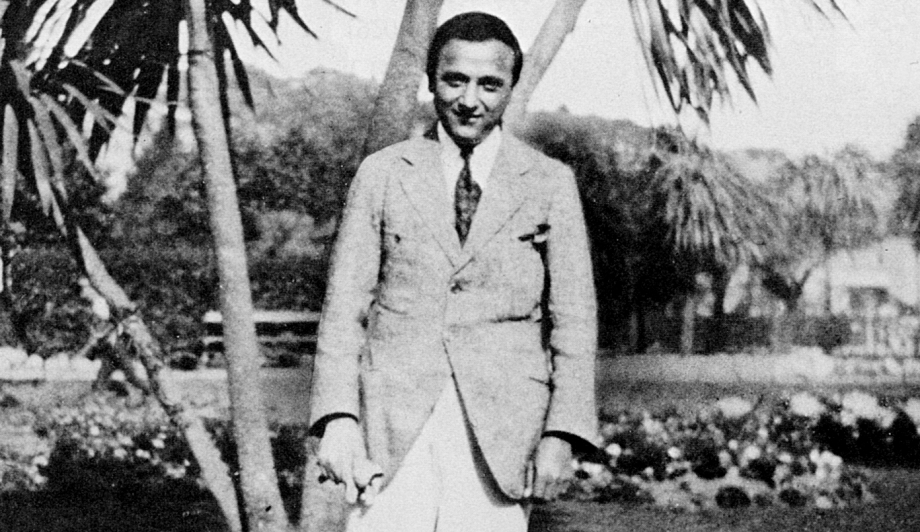
Shoghi Effendi at the time he attended Oxford University. Source: Brilliant Star Magazine.

The failure of ‘Abdu'l-Bahá's family to instantly obey the Master's request and cable Shoghi Effendi to return home weeks before His passing had a catastrophic effect on 24-year old Shoghi Effendi, deeply attached to His beloved grandfather. He finds out the most devastating news of his life in the worst possible way, on November 29, 1921, when his eyes happen to fall on an opened cable from the Greatest Holy Leaf, in Wellesley Tudor Pole's office where he had been summoned. Shoghi Effendi collapses from the shock. The cable reads:
His Holiness ‘Abdu'l-Bahá ascended Abhá Kingdom. Inform friends.
Shoghi Effendi, ‘Abdu'l-Bahá's very own grandson, finds out about the Master's passing the same way every Bahá'í in the world at the time does. The tremendous shock is so overwhelming to Shoghi Effendi's body, mind and soul, that he is unable to move for days.
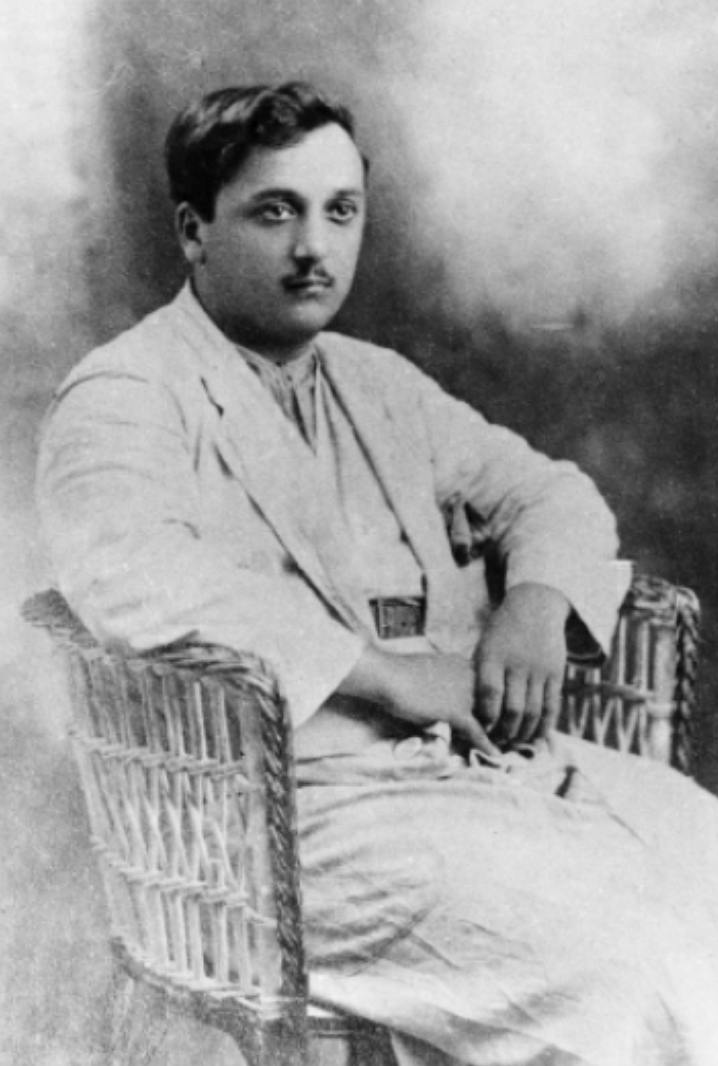
Shoghi Effendi around 1918, three years prior to his becoming the Guardian of the Bahá'í Faith.

Beyond the emotional shock he has endured, Shoghi Effendi is unable to travel immediately to the Holy Land because of passport problems. He is finally able to leave England and sails on December 16, 1921, arriving in Haifa on December 29, 1921, accompanied by Lady Blomfield and his sister Rúhangiz, who had been studying in Scotland. He arrives exactly one month after the passing of ‘Abdu'l-Bahá. The agony of bereavement has taken its toll on Shoghi Effendi and he is broken by grief, so frail that he has to be helped up the stairs of the Master's house upon his arrival. Shoghi Effendi is so devastated by ‘Abdu'l-Bahá's absence from the home that he is confined to bed for several days.
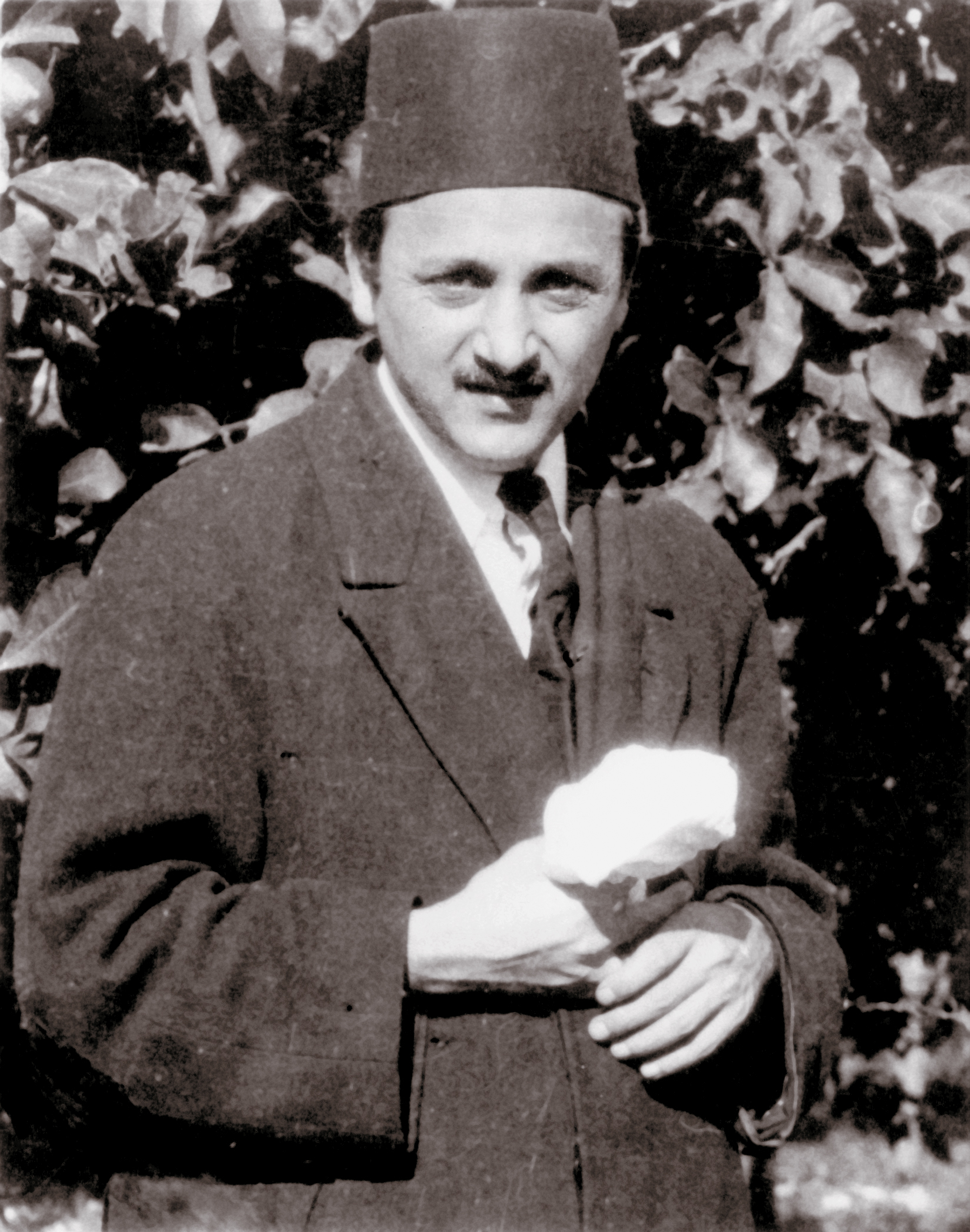
Shoghi Effendi, Guardian of the Bahá'í Faith, in 1921. Wikimedia Commons.

‘Abdu'l-Bahá's Will and Testament is first read to Shoghi Effendi in the days following his arrival in the Holy Land. Shoghi Effendi had known upon leaving England that ‘Abdu'l-Bahá had left a letter for him in Haifa, but he had no inkling of the contents of that letter, and therefore had absolutely no knowledge of the contents of ‘Abdu'l-Bahá's Will, naming him as His successor. The appointment came to Shoghi Effendi as a great shock. ‘Abdu'l-Bahá had known about Shoghi Effendi's destiny since his birth, and had written His Will in Testament in three parts during the perilous years of 1901 to 1908, when Shoghi Effendi was between four and nine years old. But to Shoghi Effendi, learning of this tremendous responsibility instantly changes him, for he knows, more than anyone, what the burden entails which has rested on the shoulders of the Báb, Bahá'u'lláh, ‘Abdu'l-Bahá and now his own. In perhaps one of the most poignant sentences of "The Priceless Pearl," Ruhíyyih Khánum recalls Shoghi Effendi telling her:
The day they read me the will and Testament, I ceased to be a normal human being.
Shoghi Effendi is now the Guardian of the Bahá'í Faith, and ‘Abdu'l-Bahá's Will and Testament must now be read publicly.
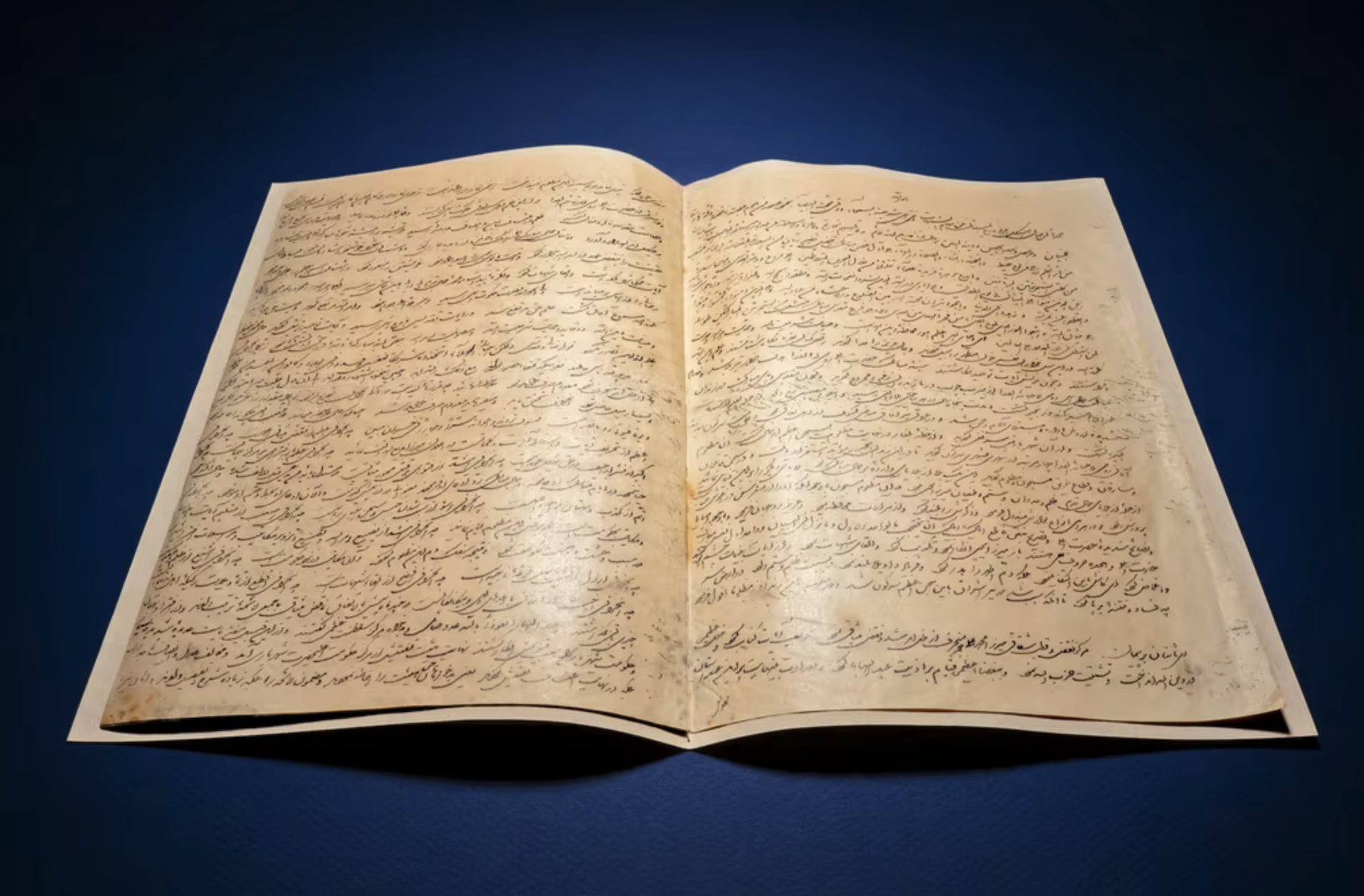
Photo of opening pages of ‘Abdu’l-Bahá’s Will and Testament. Source: Bahá'í World News Service, 24 December 2021.

Shoghi Effendi, the Guardian of the Bahá'í Faith, characterized the Will and Testament of ‘Abdu’l-Bahá as “His greatest legacy to posterity” and “the brightest emanation of His mind.” ‘Abdu’l-Bahá's Will and Testament is called "The Charter of a New World Order" by Shoghi Effendi because in this document, ‘Abdu'l-Bahá not only unveils the character of the Administrative Order of the Faith, but He also ‘reaffirmed its basis, supplemented its principles, asserted its indispensability, and enumerated its chief institutions.’
Shoghi Effendi also refers to ‘Abdu’l-Bahá's Will and Testament as ‘this supreme, this infallible Organ for the accomplishment of a Divine Purpose’, and as ‘an Instrument which may be viewed as the Charter of the New World Order which is at once the glory and the promise of this most great Dispensation.’
The Will and Testament of ‘Abdu’l-Bahá also contains provisions for the protection of the Bahá'í Faith after the passing of the Center of the Covenant, ‘Abdu'l-Bahá, three of which are the following: First, ‘Abdu'l-Bahá appoints His eldest grandson, Shoghi Effendi as His successor. Second, He protects Shoghi Effendi from any possible challenge by not only clearly naming him but unquestionably elevating his authority above anyone else's. Lastly, in this momentous document, ‘Abdu'l-Bahá clearly defines the means by which the Universal House of Justice, the supreme governing body of the Bahá'í Faith instituted by Bahá'u'lláh, should come into being.
The Will and Testament of ‘Abdu’l-Bahá is more than a Will or a Testament, it is a Charter, it is an Instrument, it is an Organ. Shoghi Effendi's words to describe the Will and Testament of ‘Abdu'l-Bahá are filled with the energy of life itself, and that is because this Will and Testament safeguards the Covenant of Bahá'u'lláh, sheltering all mankind under its protective shadow. The Will and Testament of ‘Abdu'l-Bahá is the indissoluble link” between the Revelation of Bahá’u’lláh and its ultimate purpose: the promotion of a New World Order.
Quotes in bold are from Shoghi Effendi. The section above was written based on Hasan M. Balyuzi's masterful commentary on the Will and Testament of ‘Abdu'l-Bahá available by clicking on the link below:
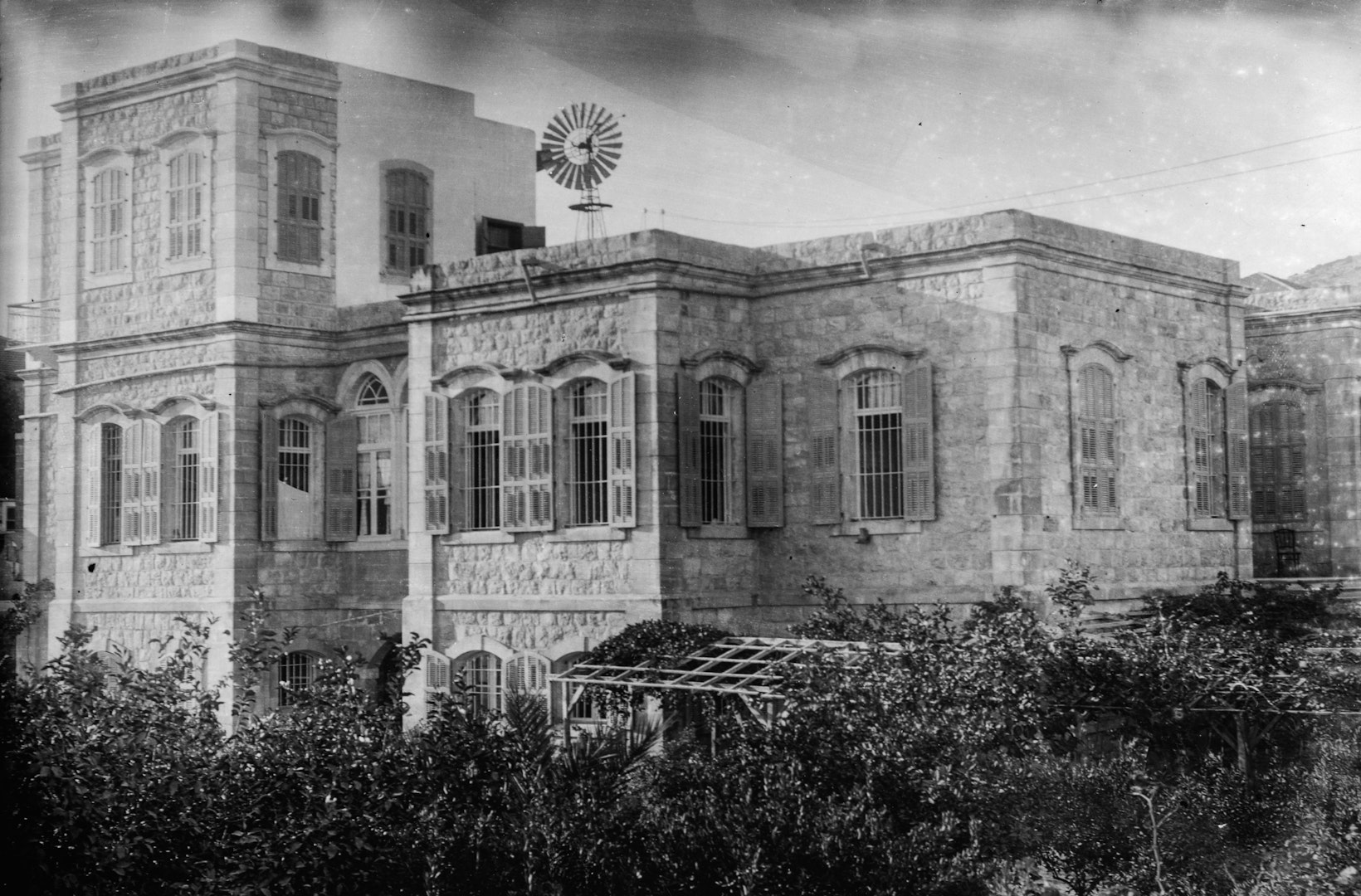
House of the Master, 7 Haparsim (1986), where the Will and Testament of 'Abdu'l-Bahá was read for the first time on 3 January 1922. Source: Bahá'í Media Bank, © 2023 Bahá'í International Community.

On the morning of January 3, 1922, Shoghi Effendi visits the Shrine of the Báb and the Tomb of 'Abdu'l-Bahá. Later the same day, at the House of the Master, ‘Abdu'l-Bahá's Will and Testament is read aloud to nine men, most of whom are members of the family of ‘Abdu'l-Bahá. These men witness ‘Abdu'l-Bahá's own handwriting, His seals and His signatures throughout the three documents that compose His Will and Testament. At Shoghi Effendi's request, a true copy of ‘Abdu'l-Bahá's Will and Testament is made by one of the men present, a Persian Bahá'í.
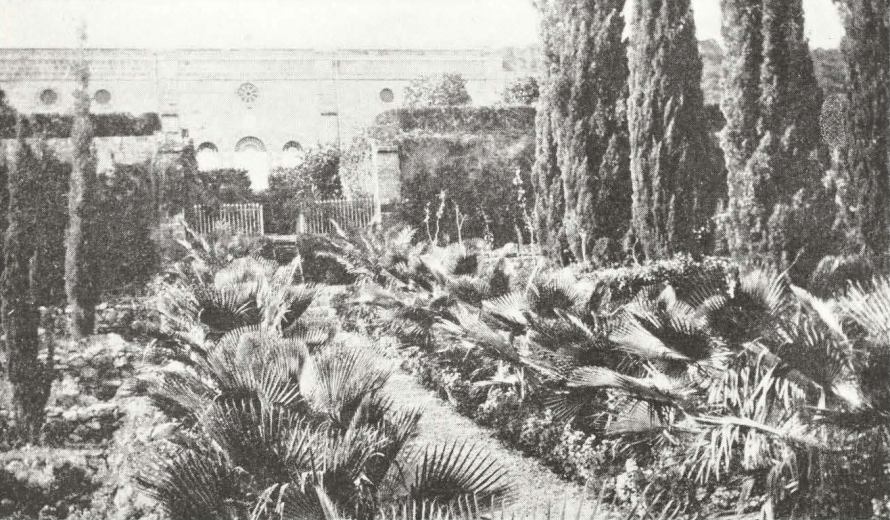
The Sacred Tomb of the Báb and ‘Abdu’l-Bahá on Mount Carmel: Source: The Bahá’í World. Vol 2, page 12.

The Will and Testament of ‘Abdu'l-Bahá is read a second time publicly, after the speeches and tributes in honor of ‘Abdu'l-Bahá at the fortieth-day Memorial Feast. The guests of the memorial feast are eager to hear from Shoghi Effendi himself, and one of the Bahá'í friends carries a message to the Guardian to this effect. Shoghi Effendi is with the Greatest Holy Leaf, in her room, and when he receives the message, says he is too distressed and overcome to address the guests. Instead, Shoghi Effendi pens a message to be read on his behalf, which begins with the following words:
"The shock has been too sudden and grievous for my youthful age to enable me to be present at this gathering of the loved ones of beloved 'Abdu'l-Bahá."
Shoghi Effendi then expresses the heartfelt gratitude of himself and ‘Abdu'l-Bahá's family's for the presence of the Governor and the speakers who, by their sincere words "have revived his sacred memory in our hearts... I venture to hope that we his kindred and his family may by our deeds and words, prove worthy of the glorious example he has set before us and thereby earn your esteem and your affection. May His everlasting spirit be with us all and knit us together for evermore!"
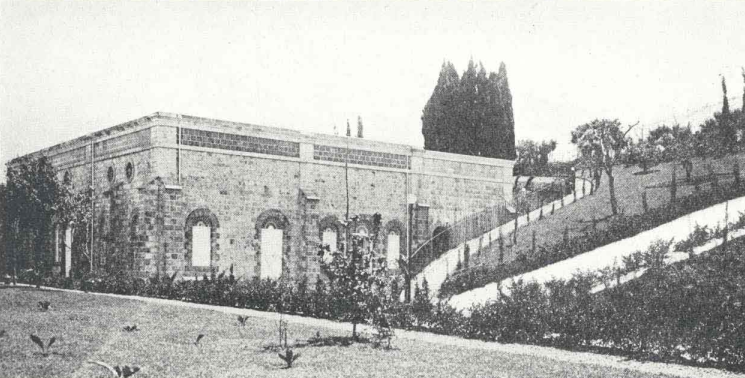
Views of the Shrine of the Báb and of ‘Abdu’l-Bahá on Mount Carmel in the 1920s. Source: The Bahá’í World. Vol 3, page 283.

On January 7, 1922 in the Master's house, the day after the Memorial Feast, ‘Abdu'l-Bahá's Will and Testament is read once again, in its entirety, but this time, to an audience composed entirely of Bahá'ís, the intended recipients of the weighty injunctions and provisions. The assembled Bahá'ís hail from Persia, India, Egypt, England, Italy, Germany, America and Japan. Shoghi Effendi is not present during this reading, as is his custom, but everyone in the audience rises every time his name is mentioned in the Will, as a show of respect. To those assembled, it is clear that the responsibility of leading the Faith and its affairs have now fallen on the shoulders of Shoghi Effendi, Guardian of the Bahá'í Faith.
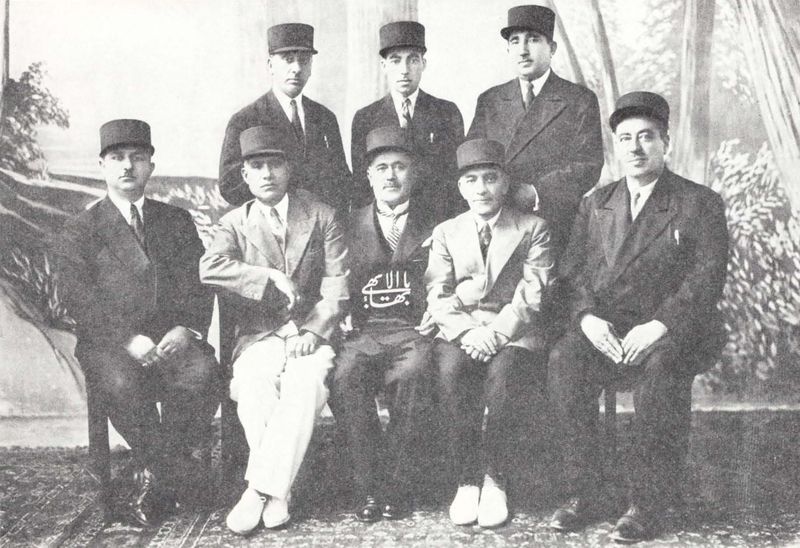
First National Spiritual Assembly of Iran, 1934. from left to right, standing: Mr. Aḥmadpúr, Mr. Furútan, Mr. Badí‘í; from left to right, seated: General ‘Alá’í, Mr. Varqá, Dr. Afrúkhtih, Mr. Fáḍil-i-Mázandarání, Mr. Amín-Amín. Source: Bahaipedia.

Befittingly, it is the Greatest Holy Leaf, and not Shoghi Effendi, who announces to the Bahá'í world the provisions of the ‘Abdu'l-Bahá's Will and Testament.
The Greatest Holy Leaf sends two cables to Persia on January 7, 1922. The first one reads:
Memorial meetings all over the world have been held. The Lord of all the worlds in His Will and Testament has revealed His instructions. Copy will be sent. Inform believers.
and the second reads:
Will and Testament forwarded Shoghi Effendi Centre Cause.
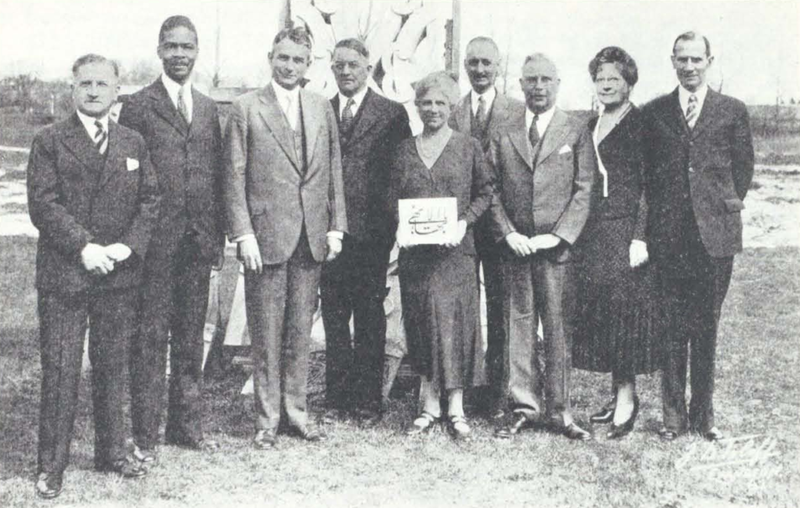
National Spiritual Assembly of the Baha'is of the United States and Canada, 1931-1932. From left to right: Siegfried Schopflocher, Louis Gregory, Allen McDaniel, Alfred E. Lunt, Amelia Collins, Horace Holley, Carl Scheffler, Nellie French, Roy Wilhelm. Source: Bahaipedia.

On January 16, 1922, The Greatest Holy Leaf sends the following cable to the United States:
In Will Shoghi Effendi appointed Guardian of Cause and Head of House of Justice. Inform American friends.
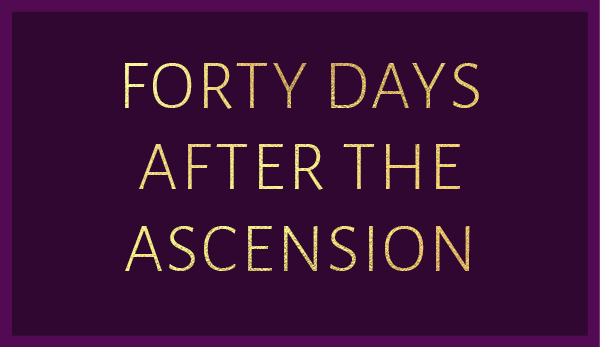
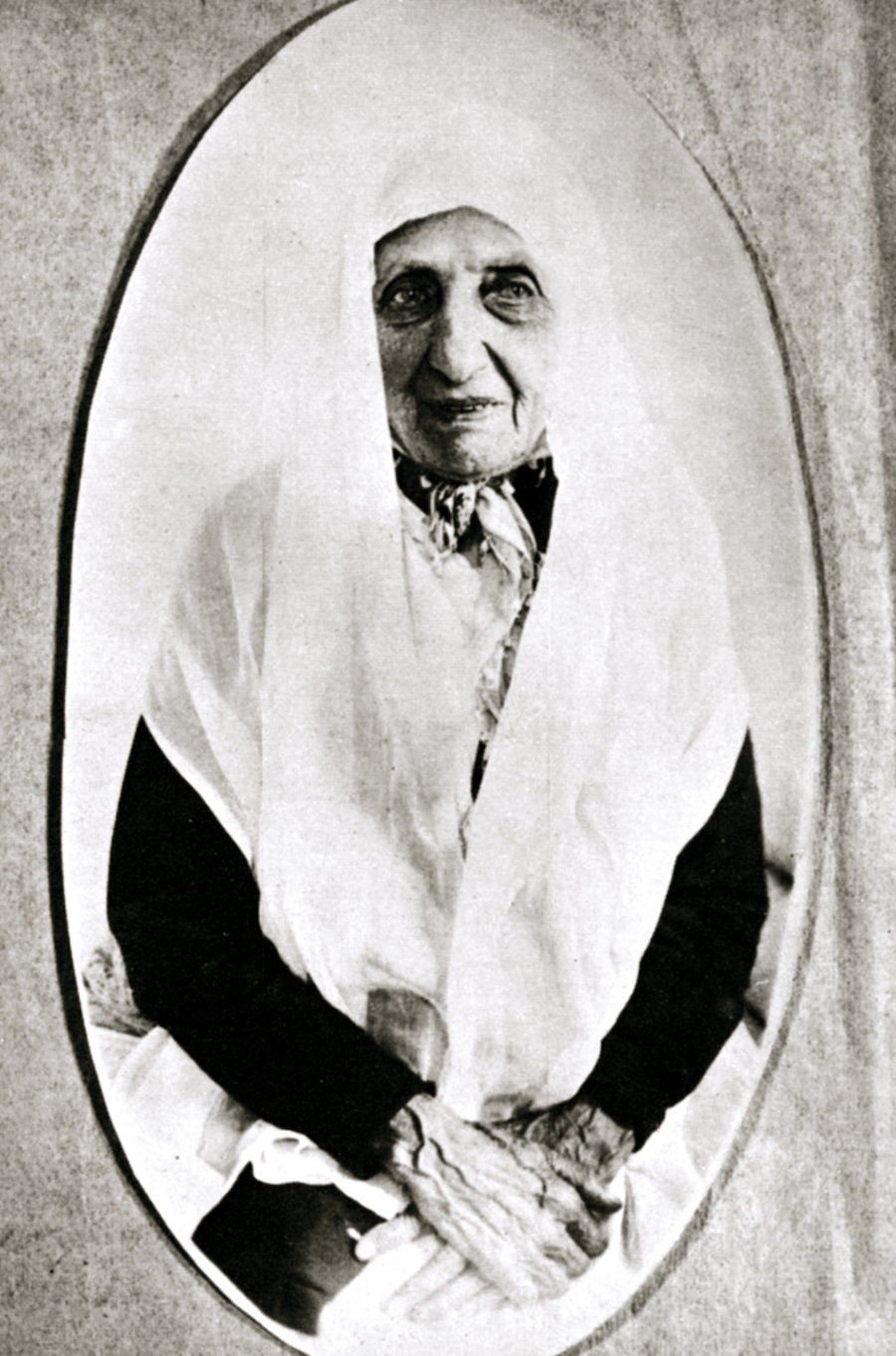
The Greatest Holy Leaf, sister of 'Abdu'l-Bahá. Source: Bahá'í Talks.

On December 21, 1921, the Greatest Holy Leaf sends cables to both the Persian and the American (below) Bahá'í communities with a message for the Bahá'ís of the world:
Memorial meeting world over January seven. Procure prayers for unity and steadfastness. Master left full instructions in His Will and Testament. Translation will be sent. Inform friends.
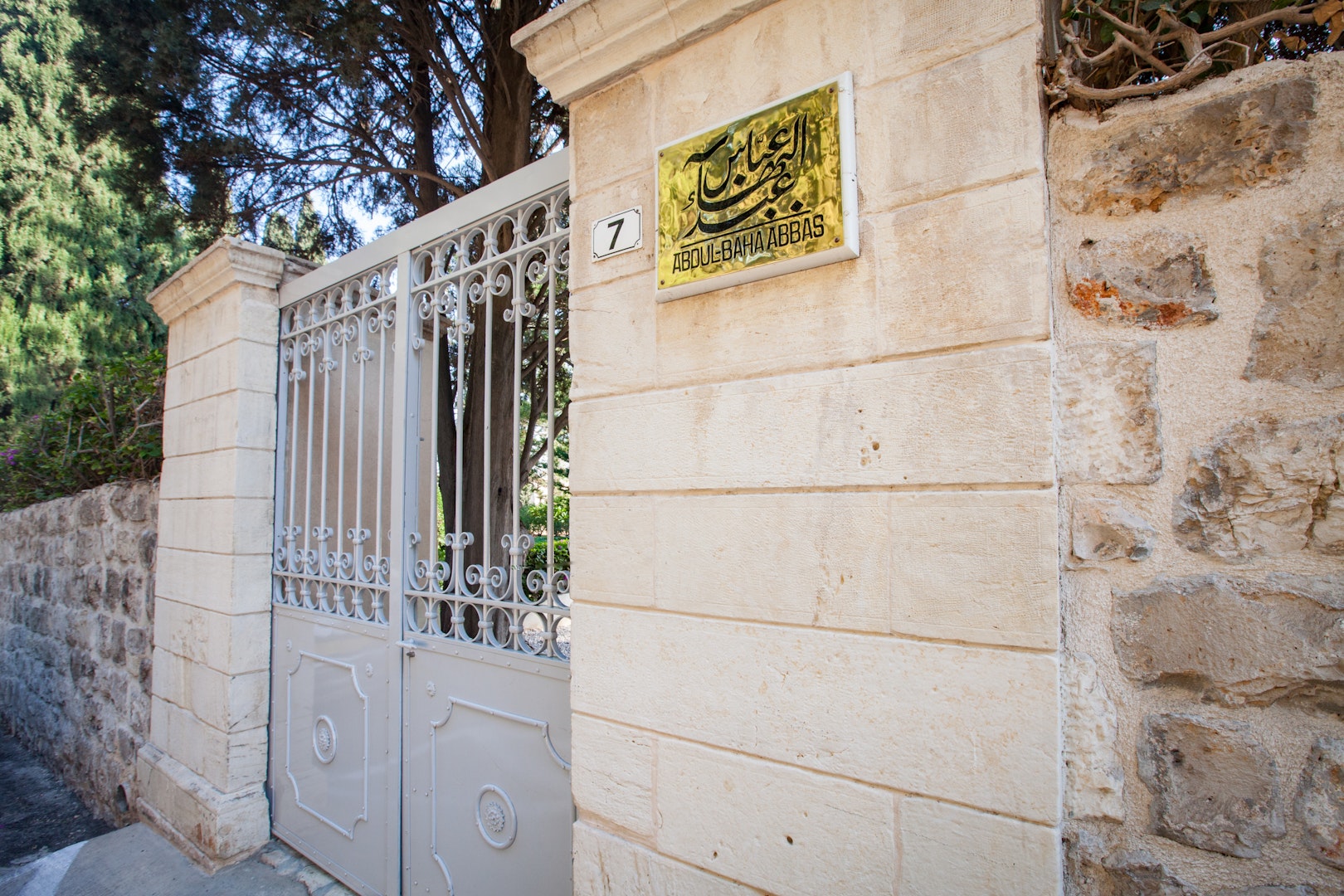
Gate to House of the Master, 7 Haparsim. Source: Bahá'í Media Bank, © Bahá'í International Community.

In accordance with Eastern tradition, an impressive memorial feast is held in ‘Abdu'l-Bahá's memory on the fortieth day after His passing, Friday, January 6, 1922 at one in the afternoon. Six hundred and fifty people from Haifa, 'Akká, neighboring towns, and as far away as Syria, Lebanon and Egypt, headed by the Governor of Phoenicia, the Governor of Haifa, government officials, foreign consuls, prominent poets and scholars, Muslims, Christians, Jews and Bahá'ís of various nationalities, gather at the home of ‘Abdu'l-Bahá at 7, Persian street (now Haparsim). Annafir ("The Bugle"), a Haifa newspaper enthusiastically reports "Neither in Haifa nor in any other Oriental city has there ever been such an impressive service."
The members of the Master's household have arranged a perfectly prepared dinner for the more than 600 guests at the banquet, but also 150 of the poor of Haifa, gathered in a special banquet of their own. The long banquet tables are decorated with trailing branches of bougainvilliers, the vibrant purple blooms, mingling with white narcissus and large dishes filled with golden oranges from the Master's own garden. Each every guests receives the very same, warm welcome into the Master's house.
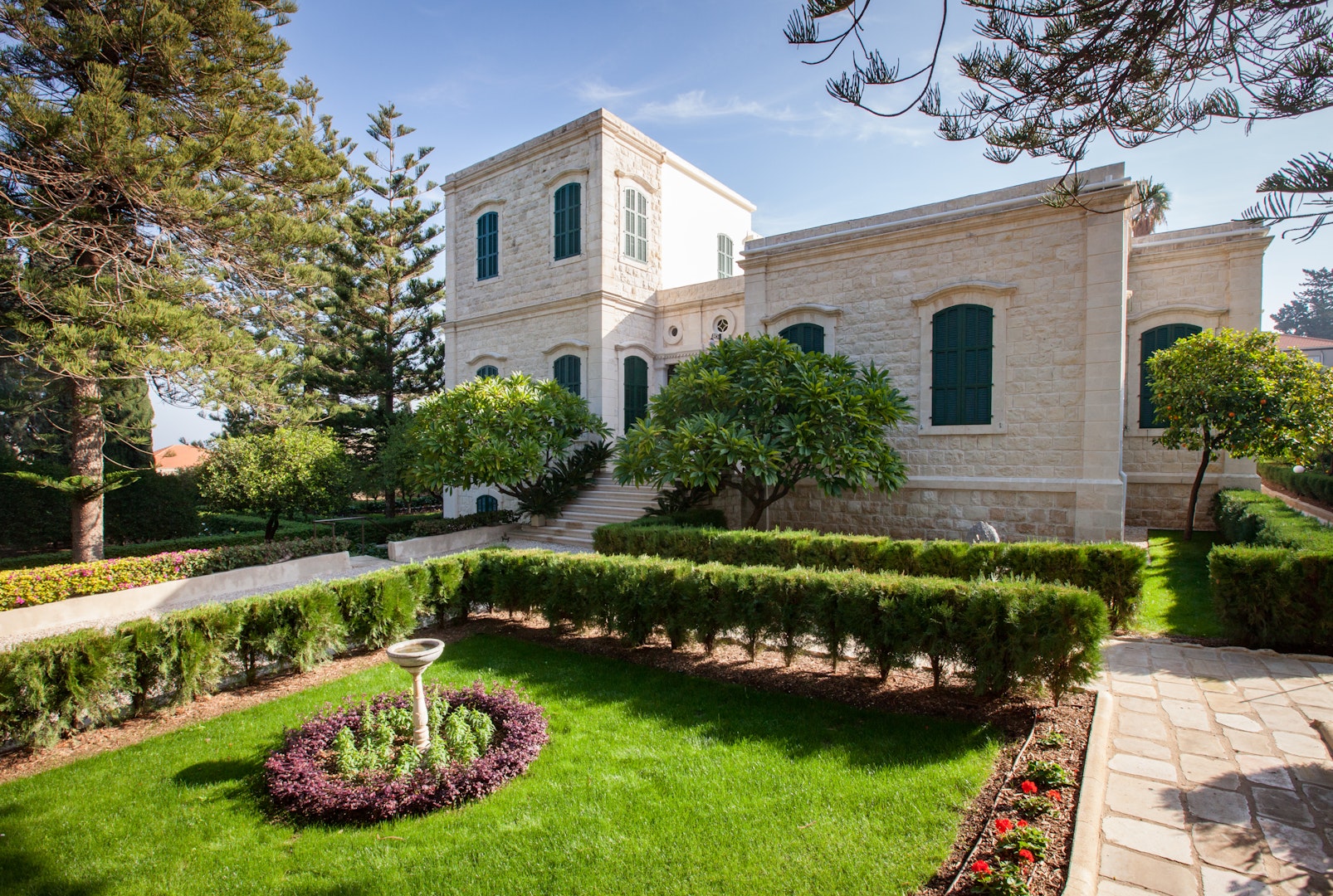
The House of the Master, 7 Haparsim. Source: Bahá'í Media Bank, © Bahá'í International Community.

After the luncheon the guests enter the large central hall of the Master's house, where both end rooms have been thrown open to accommodate the large number of guests. Chairs have been brought in from Haifa to ensure everyone can be seated, and the main hall has been decorated with beautiful rugs and draperies. There is also a portrait of ‘Abdu'l-Bahá, and a raised platform has been bought in for the speakers. A brief summary of the speeches, with the most relevant excerpts about ‘Abdu'l-Bahá are provided below. These were all published in the Annafir ("The Bugle") newspaper of Haifa dated 6 December 1921.
![]()
Abdu'lláh Effendi Mukhlis, Secretary of the National Muslim Society
Many a time have we assembled in this home, which was the place of pilgrimage for scholars and the fountainhead of virtues...This roof has covered us at many scientific and educational meetings - gatherings that were full of happiness and joy, wherein voices sounded, and argument and discussion continued...That happiness has changed to sorrow, that joy into grief and those discussions to quietness and silence...because the Lord of this home, its departed mystery, its spirit and its joy, 'Abdu'l-Bahá 'Abbas, has ascended from this mortal world. Therefore, it has become lifeless and its appearance changed. We have lived in his time, and we have associated with him for tens of years without any fatigue or weariness. Nay, rather, we could hardly pass a moment without receiving a portion of his guidance. We know not how the years have passed!
![]()
Lieutenant Colonel Stewart Symes, Governor of Phoenicia
Most of us here have a clear picture of Sir 'Abdu'l-Bahá 'Abbás, of his dignified figure walking thoughtfully in our streets, of his courtesy and gracious manner, of his kindness, of his love for the little children and for the flowers, and of his generosity and care for the poor and suffering. So gentle was he, and so simple that in his presence one almost forgot that he was also a great teacher, and that his writings and his conversations have been a solace and an inspiration to hundreds and thousands of people in the East and West...the name of 'Abdu'l-Bahá, who lived among us here in Haifa, will be remembered with gratitude and affectionate esteem. »
![]()
Poem by Wadie Effendi Bastani, a young Christian poet
Death has not beclouded the light of Abdu'l-Bahá! He is smiling in the Most Glorious (Abhá) horizon. They called him a Bahá'í - Christians and Muslims fall in love with him. You may ask the Occident about him, For though he is the Master in the Orient, Supreme and great is he in the great West...Oh, ye who are commemorating 'Abdu'l-Bahá, Comprehend ye His ideals!
Yúsuf al-Khatib, a well-known Muslim orator
If there is anyone who might doubt, deny or forget the grace and station of 'Abdu'l-Bahá, let him recall that 'Abdu'l-Baha was a lover of mankind, strongly attached to all and the greatest worker to vivify the world of humanity. This is the foundation of all national, racial, and religious unity. He was the one who endured until he changed the prison places into scientific and art institutions, and the battle fields into rooms of industries and righteousness.
![]()
Poem in Arabic recited by Dr. Kaiser Khoury
'Abdu'l-Bahá, the glory of the Orient, Appeared in an age wherein science flourished and superstitions vanished. Through him, nobility reached the loftiest place; Towards him, the scholars raced; His new moon appeared in the horizon of Persia, And thereby the minds became illumined.
![]()
Ahmad Effendi Al-Imam
A voice was raised by Persia [Tihrán], repeated by Mesopotamia [Baghdád], and roared in Edirne [Adrianople]. Palestine sympathized with it and opened her breast for it. Its echo grew and expanded to Egypt, and crossed the seas to the New World [America]. A voice arose to call the world to love, unity, and peace. The voice would never have been spread among the people as electric currents, if its source were not purity of purpose.... We have assembled here in order to enumerate his qualities and to recall his adorable attributes. When we mention 'Abdu'l-Bahá, we recall sublimity of character and firmness of determination; we recall purity of the heart and nobility of personality; we recall unexcelled intelligence and Oriental genius. Yea, when we mention 'Abdu'l-Bahá, we recall excellence of morals, exalted principles, and noble susceptibilities. We mention him, because he loved the poor equally with the prince; we mention him because he used to entertain both adults and children; we mention him because he was merciful to the orphans and gave freely to the helpless and the stranger.
![]()
After the speeches in honor of ‘Abdu'l-Bahá (you can read in David Merrick's "Passing of ‘Abdu'l-Bahá compilation), the provisions of His Will and Testament are announced.
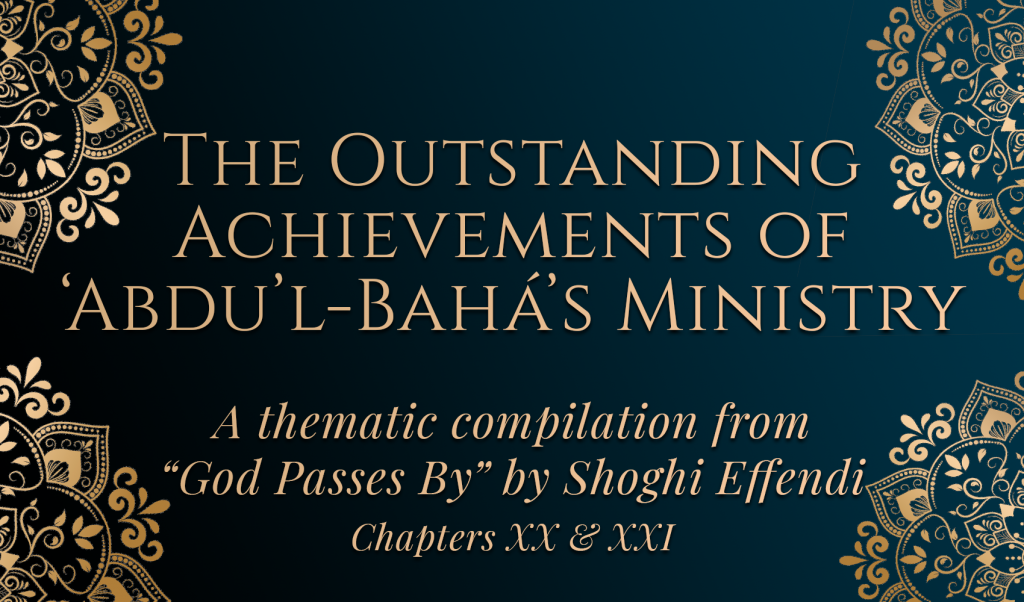
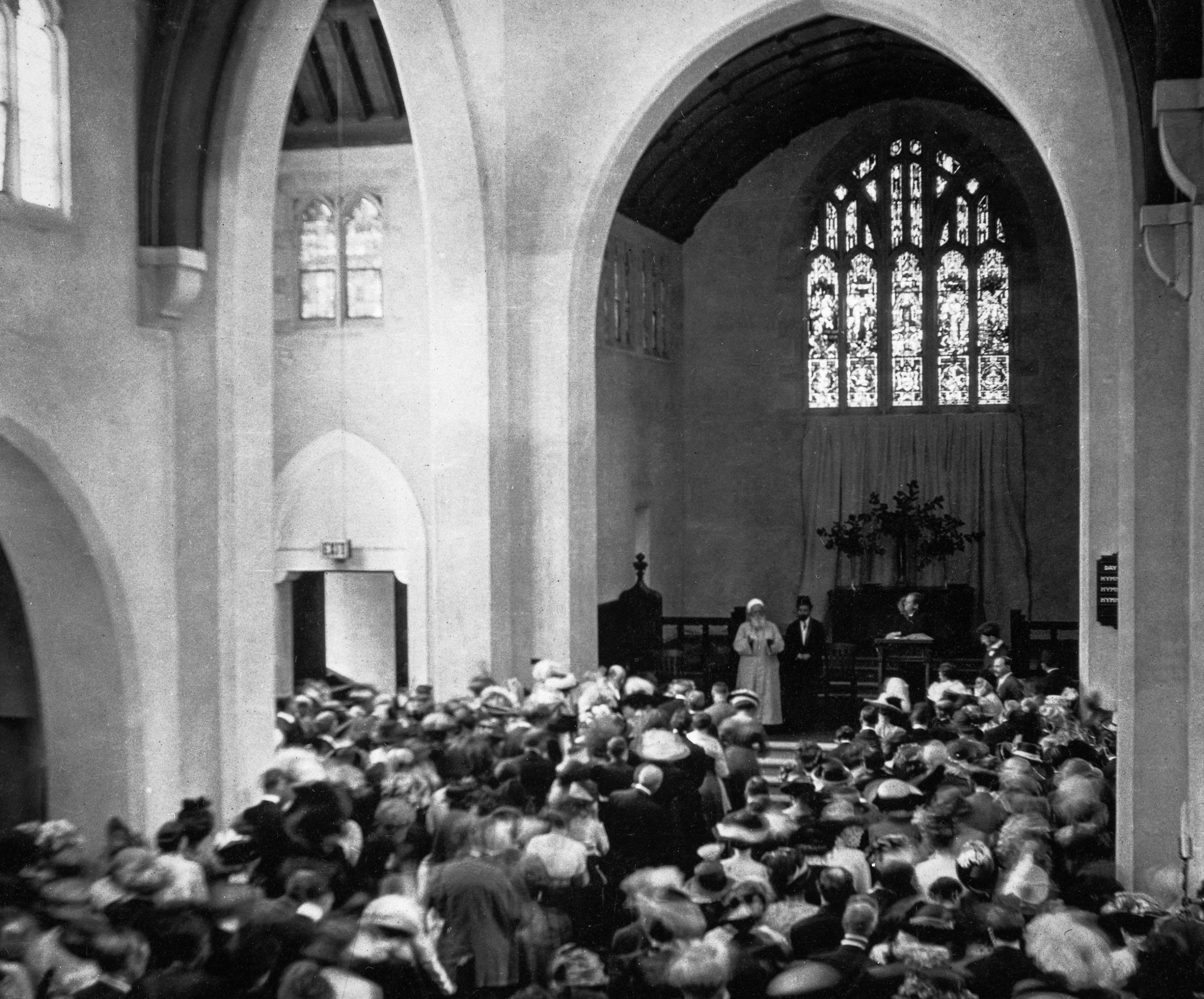
‘Abdu’l‑Bahá’s historic journeys to the West, and in particular His eight-month tour of the United States of America, may be said to have marked the culmination of His ministry, a ministry whose untold blessings and stupendous achievements only future generations can adequately estimate. As the day-star of Bahá’u’lláh’s Revelation had shone forth in its meridian splendor at the hour of the proclamation of His Message to the rulers of the earth in the city of Adrianople, so did the Orb of His Covenant mount its zenith and shed its brightest rays when He Who was its appointed Center arose to blazon the glory and greatness of His Father’s Faith among the peoples of the West.
[That divinely instituted Covenant] had manifested also before all mankind, with a force and in a measure hitherto unapproached, its vast potentialities when it empowered Him in Whom its spirit and its purpose were enshrined to embark on a three-year-long mission to the Western world—a mission so momentous that it deserves to rank as the greatest exploit ever to be associated with His ministry.
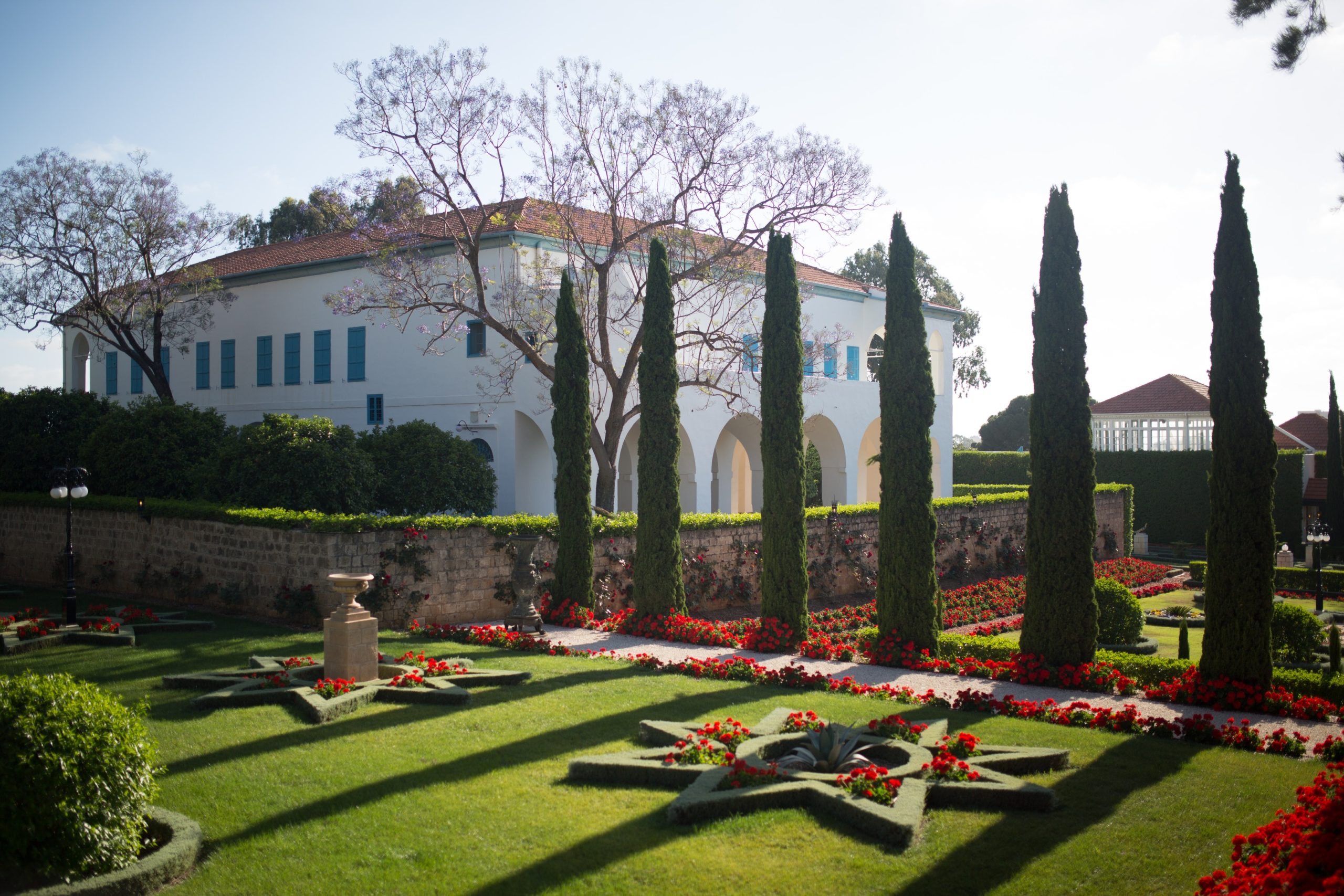
That divinely instituted Covenant had, shortly after its inception, demonstrated beyond the shadow of a doubt its invincible strength through its decisive triumph over the dark forces which its Arch-Breaker had with such determination arrayed against it.
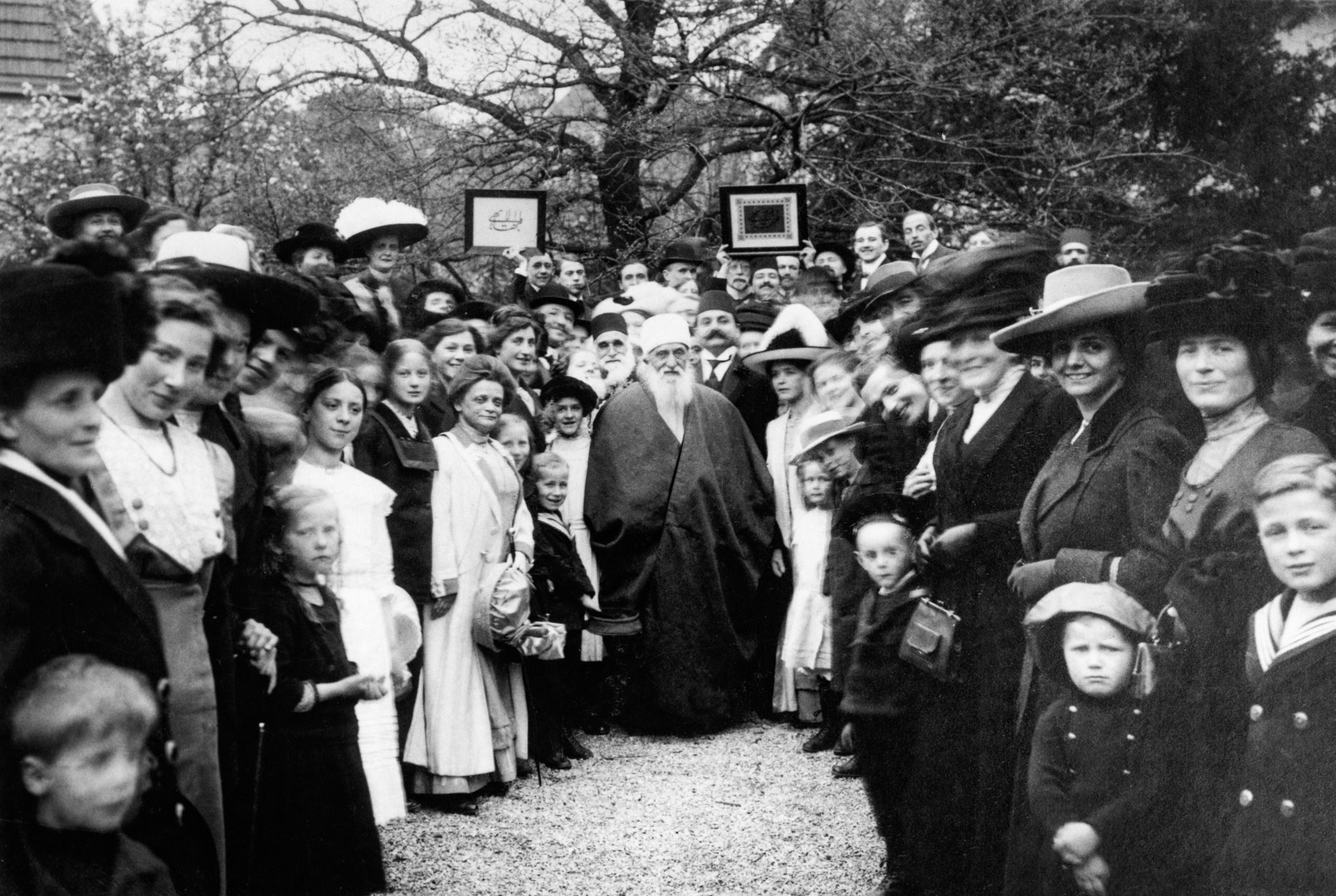
Its energizing power had soon after been proclaimed through the signal victories which its torch-bearers had so rapidly and courageously won in the far-off cities of Western Europe and the United States of America.
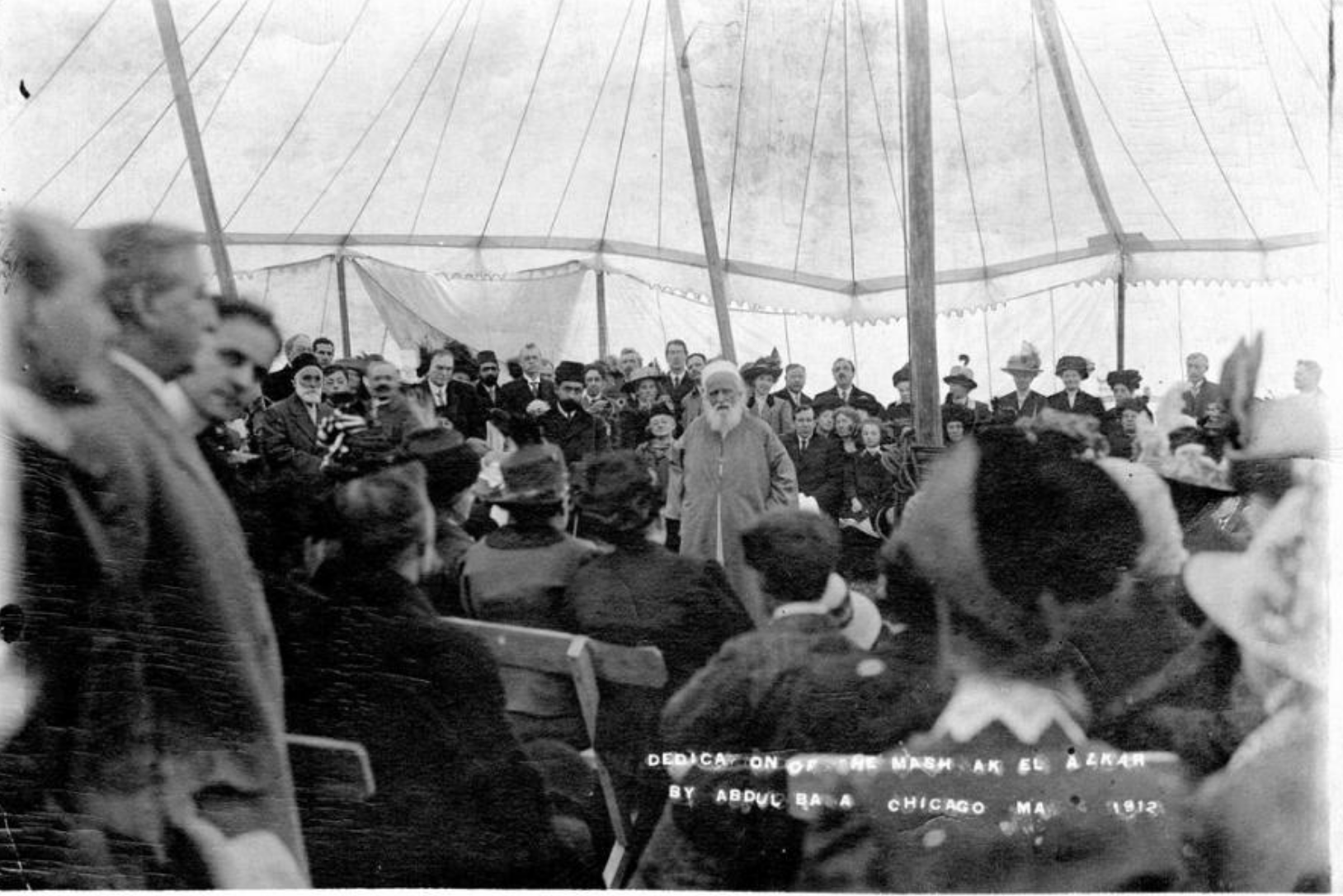
Its high claims had, moreover, been fully vindicated through its ability to safeguard the unity and integrity of the Faith in both the East and the West.
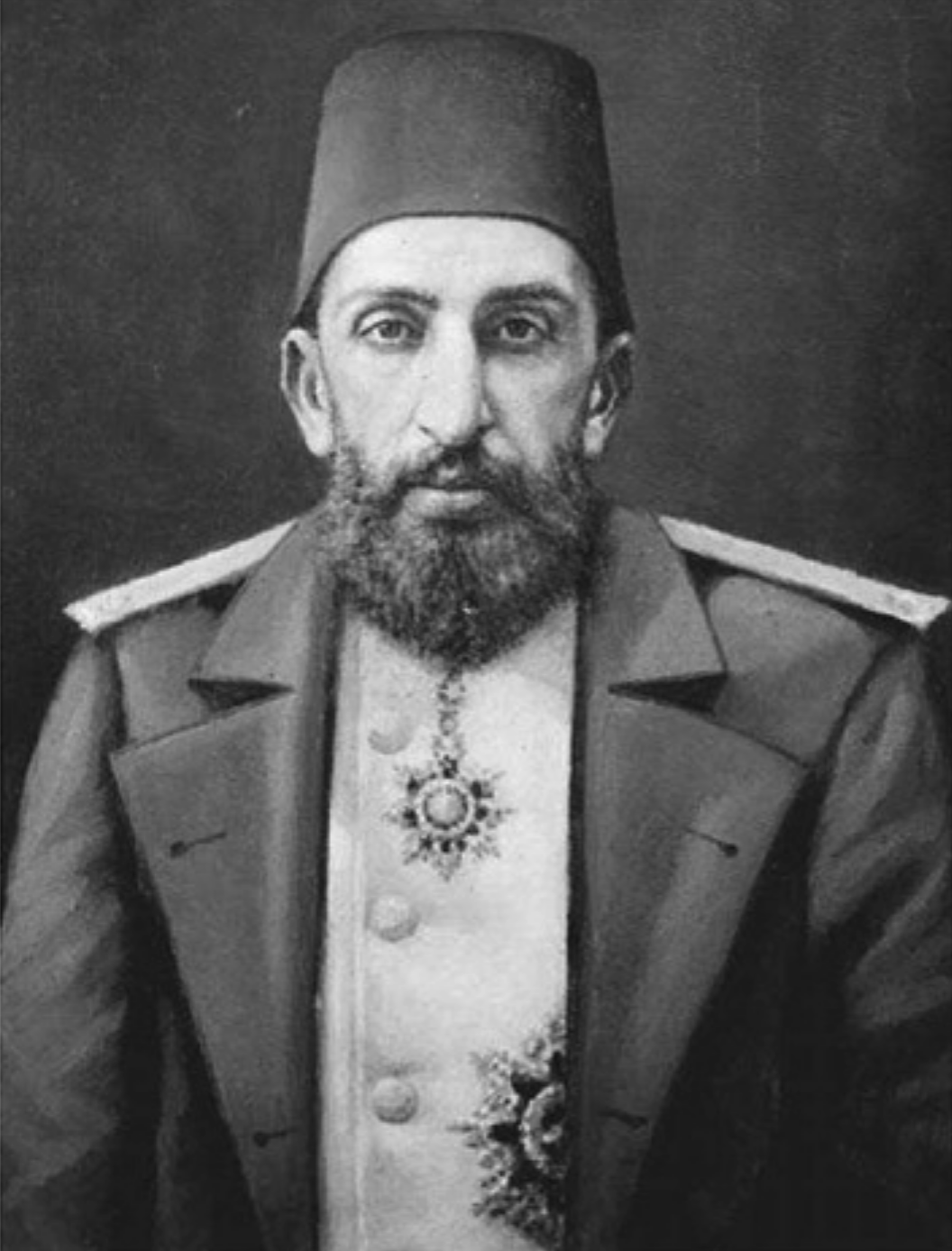
It had subsequently given further proof of its indomitable strength by the memorable victory it registered through the downfall of Sulṭán ‘Abdu’l-Ḥamíd, and the consequent release of its appointed Center from a forty-year captivity.
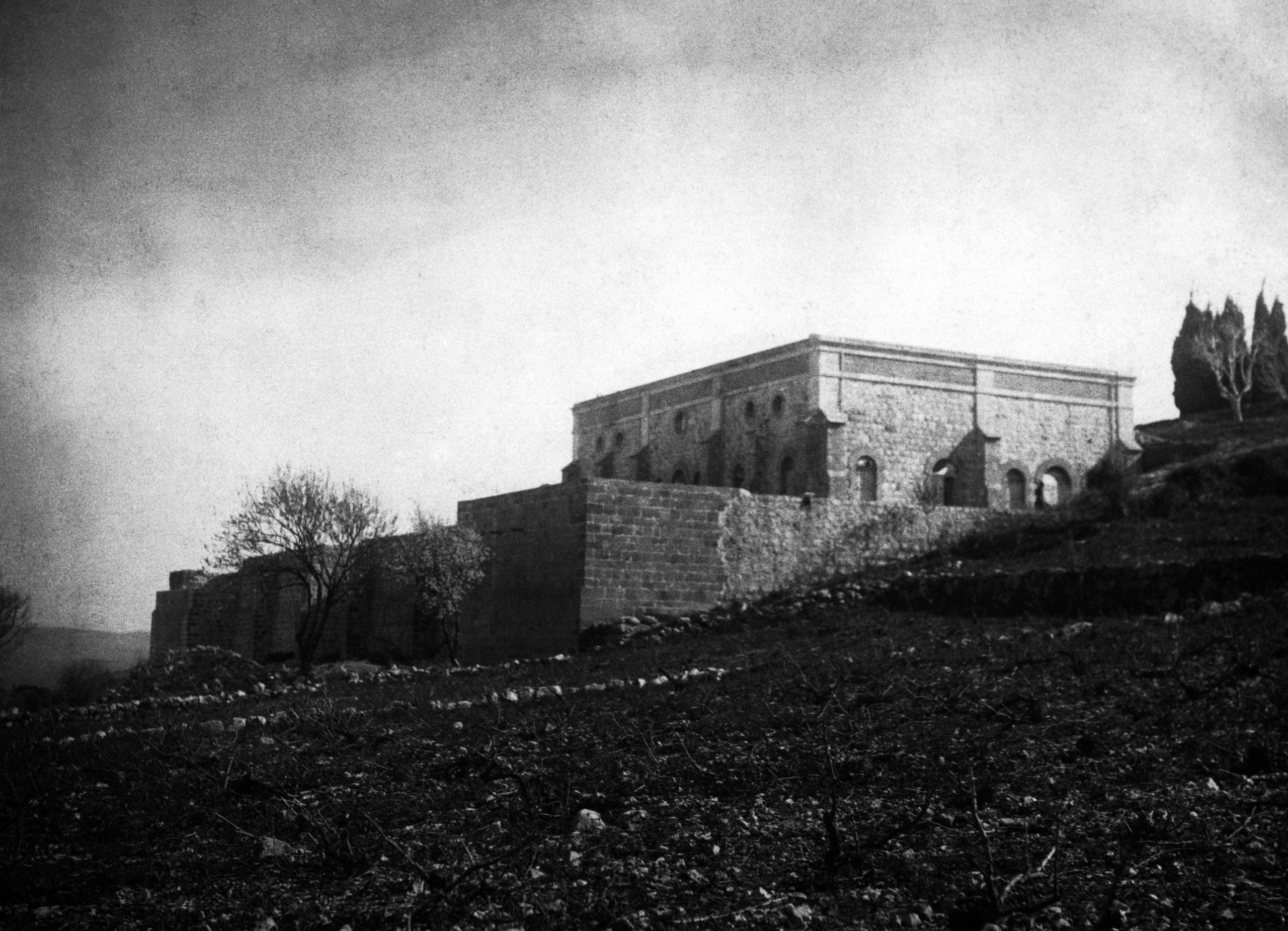
It had provided for those still inclined to doubt its Divine origin yet another indisputable testimony to its solidity by enabling ‘Abdu’l‑Bahá, in the face of formidable obstacles, to effect the transfer and the final entombment of the Báb’s remains in a mausoleum on Mt. Carmel.
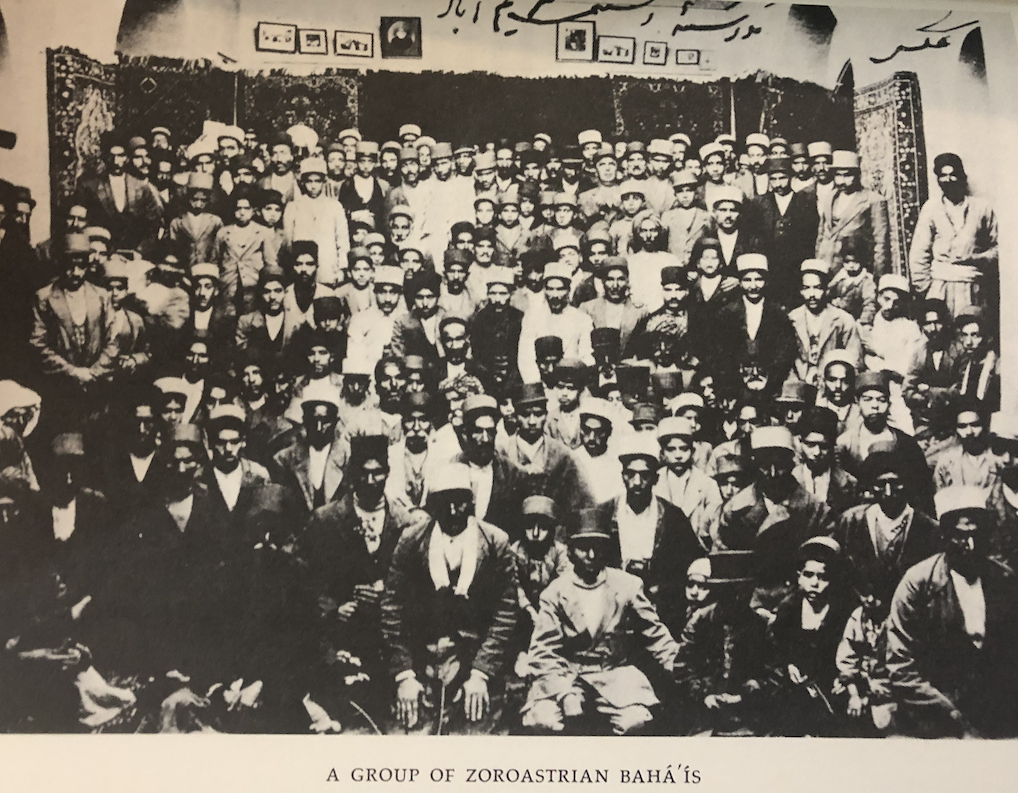
Nor were these, preeminent though they were, the sole fruits garnered through the indefatigable efforts exerted so heroically by the Center of that Covenant. The progress and extension of His Father’s Faith in the East;
Despite these intermittent severe persecutions [in Persia] the Faith that had evoked in its heroes so rare a spirit of self-sacrifice was steadily and silently growing. Engulfed for a time and almost extinguished in the sombre days following the martyrdom of the Báb, driven underground throughout the period of Bahá’u’lláh’s ministry, it began, after His ascension, under the unerring guidance, and as a result of the unfailing solicitude, of a wise, a vigilant and loving Master, to gather its forces, and gradually to erect the embryonic institutions which were to pave the way for the establishment, at a later period, of its Administrative Order. It was during this period that the number of its adherents rapidly multiplied, that its range, now embracing every province of that kingdom, steadily widened, and the rudimentary forms of its future Assemblies were inaugurated. It was during this period, at a time when state schools and colleges were practically non-existent in that country, and when the education given in existing religious institutions was lamentably defective, that its earliest schools were established, beginning with the Tarbíyat, schools in Ṭihrán for both boys and girls, and followed by the Ta’yíd and Mawhibat schools in Hamadán, the Vaḥdat-i-Bashar school in Káshán and other similar educational institutions in Bárfurúsh and Qazvín. It was during these years that concrete and effectual assistance, both spiritual and material, in the form of visiting teachers from both Europe and America, of nurses, instructors, and physicians, was first extended to the Bahá’í community in that land, these workers constituting the vanguard of that host of helpers which ‘Abdu’l‑Bahá promised would arise in time to further the interests of the Faith as well as those of the country in which it was born. It was in the course of these years that the term Bábí, as an appellation, designating the followers of Bahá’u’lláh in that country, was universally discarded by the masses in favor of the word Bahá’í, the former henceforth being exclusively applied to the fast dwindling number of the followers of Mírzá Yaḥyá. During this period, moreover, the first systematic attempts were made to organize and stimulate the teaching work undertaken by the Persian believers, attempts which, apart from reinforcing the foundations of the community, were instrumental in attracting to its cause several outstanding figures in the public life of that country, not excluding certain prominent members of the Shí‘ah sacerdotal order, and even descendants of some of the worst persecutors of the Faith.
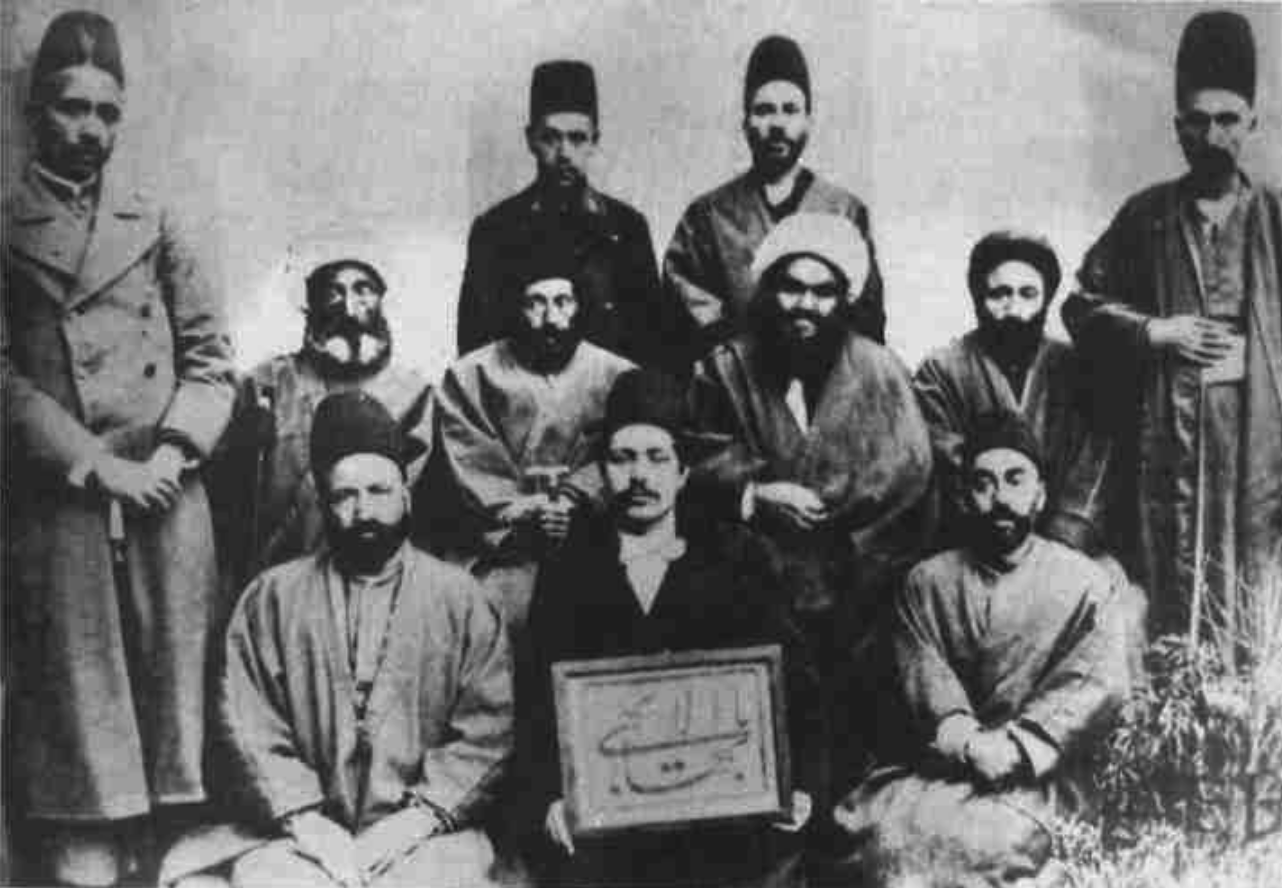
the initiation of activities and enterprises which may be said to signalize the beginnings of a future Administrative Order;
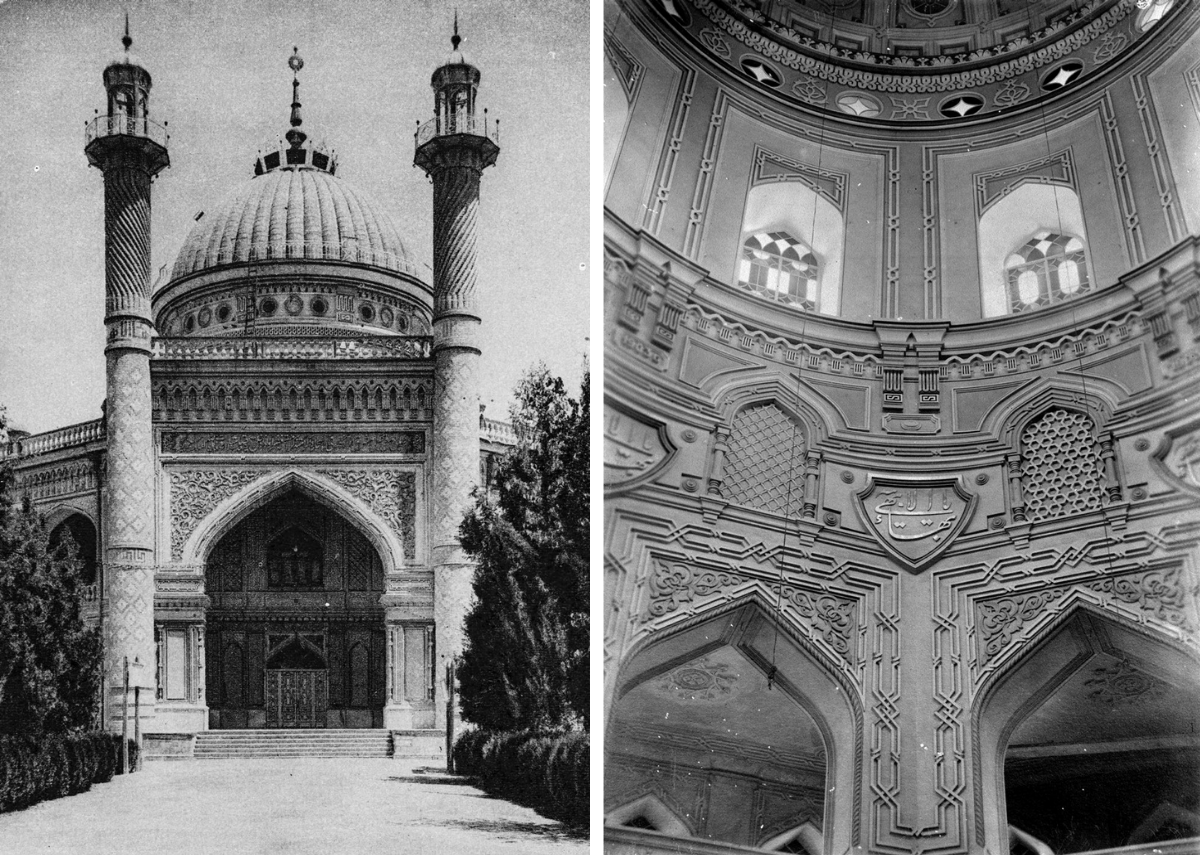
Interior of the House of Worship in 'Ishqábád in the 1900s. A Báhá'i Glossary.
the erection of the first Mashriqu’l-Adhkár of the Bahá’í world in the city of ‘Ishqábád in Russian Turkistán;
More conspicuous than any of these undertakings, however, was the erection of the first Mashriqu’l-Adhkár of the Bahá’í world in the city of ‘Ishqábád, a center founded in the days of Bahá’u’lláh, where the initial steps preparatory to its construction, had been already undertaken during His lifetime. Initiated at about the close of the first decade of ‘Abdu’l‑Bahá’s ministry (1902); fostered by Him at every stage in its development; personally supervised by the venerable Ḥájí Mírzá Muḥammad-Taqí, the Vakílu’d-Dawlih, a cousin of the Báb, who dedicated his entire resources to its establishment, and whose dust now reposes at the foot of Mt. Carmel under the shadow of the Tomb of his beloved Kinsman; carried out according to the directions laid down by the Center of the Covenant Himself; a lasting witness to the fervor and the self-sacrifice of the Oriental believers who were resolved to execute the bidding of Bahá’u’lláh as revealed in the Kitáb-i-Aqdas, this enterprise must rank not only as the first major undertaking launched through the concerted efforts of His followers in the Heroic Age of His Faith, but as one of the most brilliant and enduring achievements in the history of the first Bahá’í century.
The edifice itself, the foundation stone of which was laid in the presence of General Krupatkin, the governor-general of Turkistán, who had been delegated by the Czar to represent him at the ceremony, has thus been minutely described by a Bahá’í visitor from the West: “The Mashriqu’l-Adhkár stands in the heart of the city; its high dome standing out above the trees and house tops being visible for miles to the travelers as they approach the town. It is in the center of a garden bounded by four streets. In the four corners of this enclosure are four buildings: one is the Bahá’í school; one is the traveler’s house, where pilgrims and wayfarers are lodged; one is for the keepers, while the fourth one is to be used as a hospital. Nine radial avenues approach the Temple from the several parts of the grounds, one of which, the principal approach to the building, leads from the main gateway of the grounds to the principal portal of the Temple.” “In plan,” he further adds, “the building is composed of three sections; namely, the central rotunda, the aisle or ambulatory which surrounds it, and the loggia which surrounds the entire building. It is built on the plan of a regular polygon of nine sides. One side is occupied by the monumental main entrance, flanked by minarets—a high arched portico extending two stories in height recalling in arrangement the architecture of the world famous Taj Mahal at Agra in India, the delight of the world to travelers, many of whom pronounce it to be the most beautiful temple in the world. Thus the principal doorway opens toward the direction of the Holy land. The entire building is surrounded by two series of loggias—one upper and one lower—which opens out upon the garden giving a very beautiful architectural effect in harmony with the luxuriant semi-tropical vegetation which fills the garden … The interior walls of the rotunda are treated in five distinct stories. First, a series of nine arches and piers which separate the rotunda from the ambulatory. Second, a similar treatment with balustrades which separate the triforium gallery (which is above the ambulatory and is reached by two staircases in the loggias placed one on either side of the main entrance) from the well of the rotunda. Third, a series of nine blank arches filled with fretwork, between which are escutcheons bearing the Greatest Name. Fourth, a series of nine large arched windows. Fifth, a series of eighteen bull’s eye windows. Above and resting on a cornice surmounting this last story rises the inner hemispherical shell of the dome. The interior is elaborately decorated in plaster relief work … The whole structure impresses one by its mass and strength.
Nor should mention be omitted of the two schools for boys and girls which were established in that city, of the pilgrim house instituted in the close vicinity of the Temple, of the Spiritual Assembly and its auxiliary bodies formed to administer the affairs of a growing community, and of the new centers of activity inaugurated in various towns and cities in the province of Turkistán—all testifying to the vitality which the Faith had displayed ever since its inception in that land.
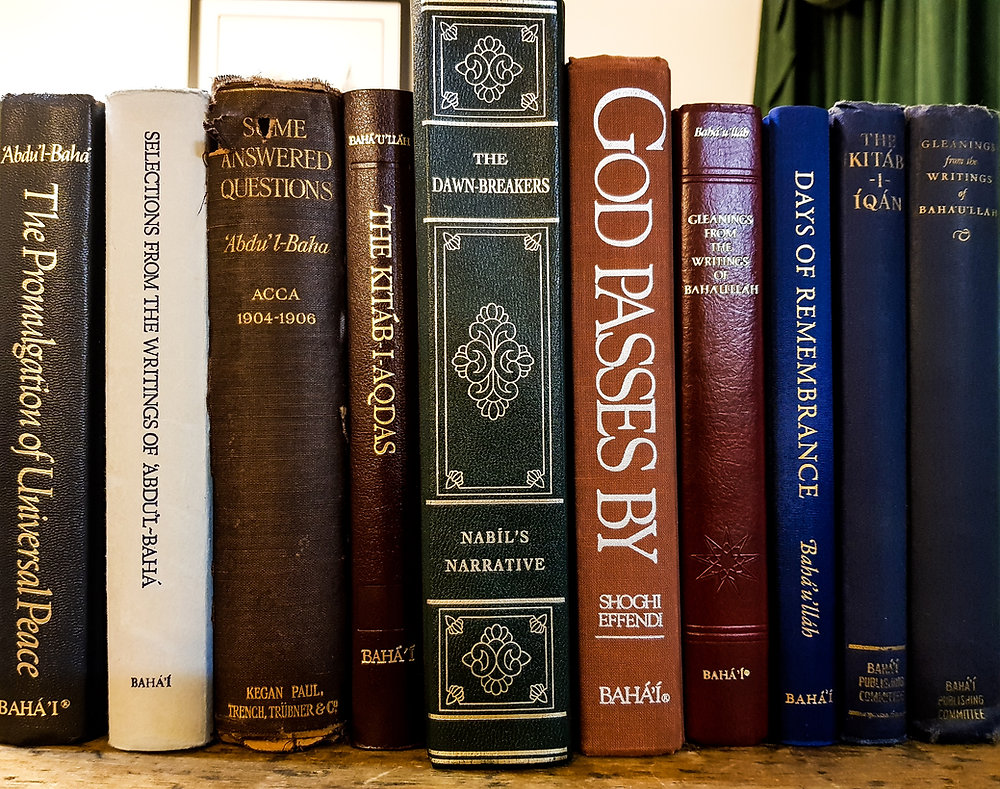
the expansion of Bahá’í literature;
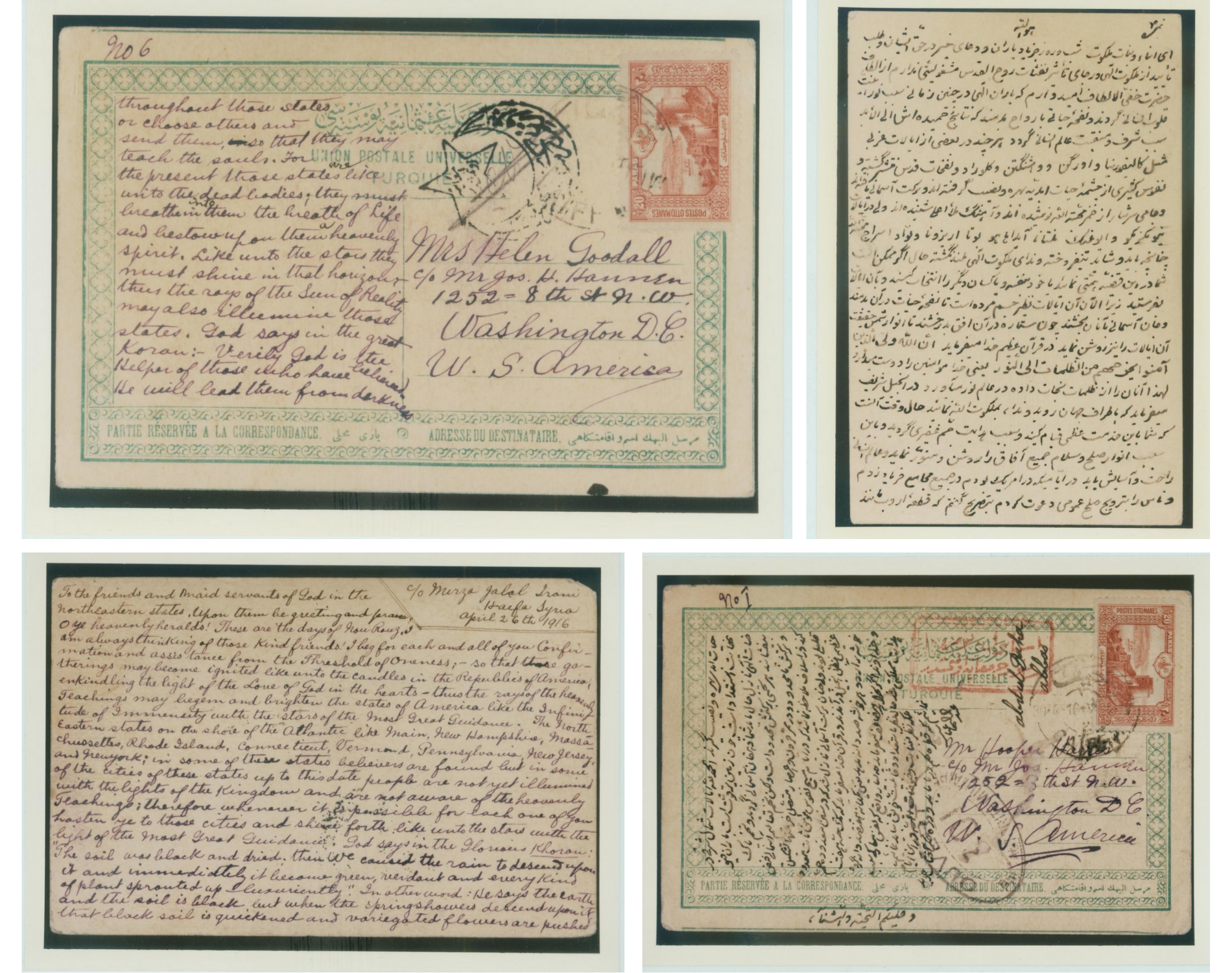
the revelation of the Tablets of the Divine Plan;
And yet during these somber days [of the war of 1914-1918], the darkness of which was reminiscent of the tribulations endured during the most dangerous period of His incarceration in the prison-fortress of ‘Akká; ‘Abdu’l‑Bahá, whilst in the precincts of His Father’s Shrine, or when dwelling in the House He occupied in ‘Akká, or under the shadow of the Báb’s sepulcher on Mt. Carmel, was moved to confer once again, and for the last time in His life, on the community of His American followers a signal mark of His special favor by investing them, on the eve of the termination of His earthly ministry, through the revelation of the Tablets of the Divine Plan, with a world mission, whose full implications even now, after the lapse of a quarter of a century, still remain undisclosed, and whose unfoldment thus far, though as yet in its initial stages, has so greatly enriched the spiritual as well as the administrative annals of the first Bahá’í century.
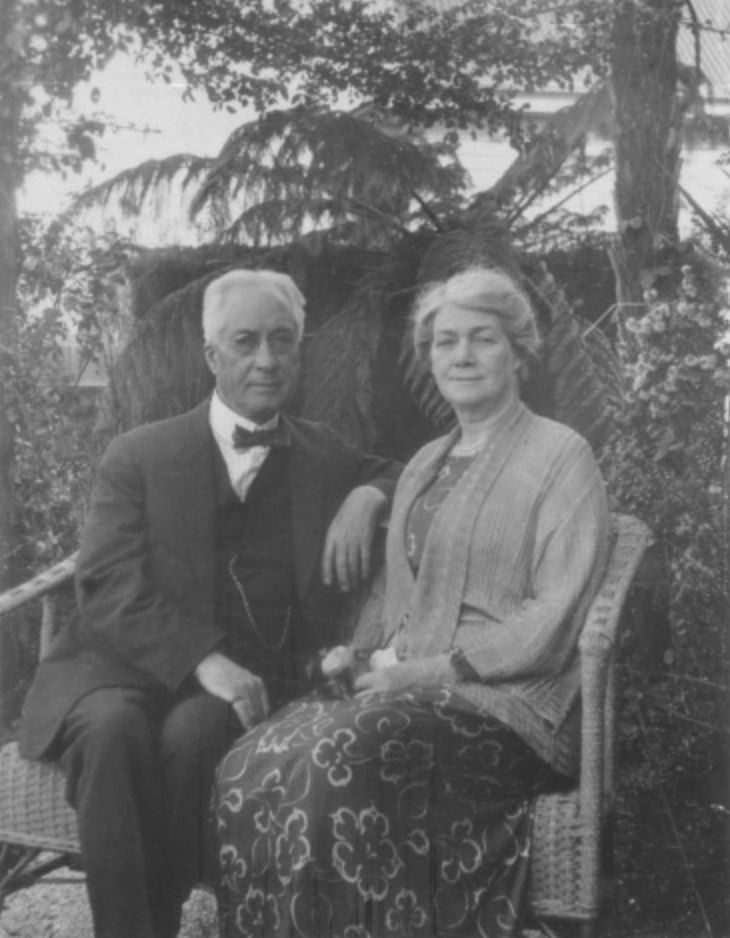
...and the introduction of the Faith in the Australian continent these may be regarded as the outstanding achievements that have embellished the brilliant record of ‘Abdu’l‑Bahá’s unique ministry.
A new continent was opened to the Cause when, in response to the Tablets of the Divine Plan unveiled at the first Convention after the war, the great-hearted and heroic Hyde Dunn, at the advanced age of sixty-two, promptly forsook his home in California, and, seconded and accompanied by his wife, settled as a pioneer in Australia, where he was able to carry the Message to no less than seven hundred towns throughout that Commonwealth.
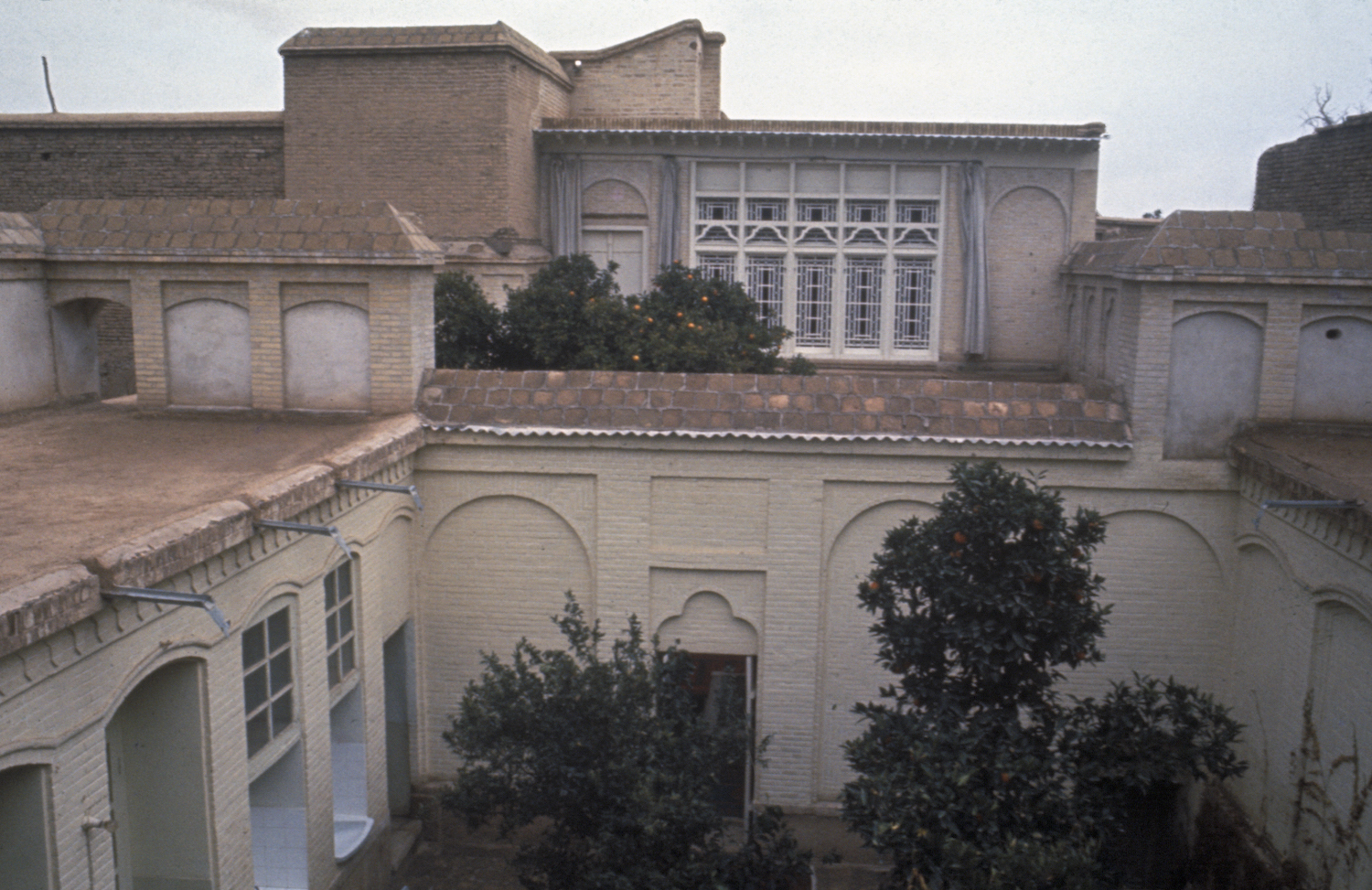
It was during the years of that ministry that the House of the Báb in Shíráz, ordained by Bahá’u’lláh as a center of pilgrimage for His followers, and now so recognized, was by order of ‘Abdu’l‑Bahá and through His assistance, restored, and that it became increasingly a focus of Bahá’í life and activity for those who were deprived by circumstances of visiting either the Most Great House in Baghdád or the Most Holy Tomb in ‘Akká.
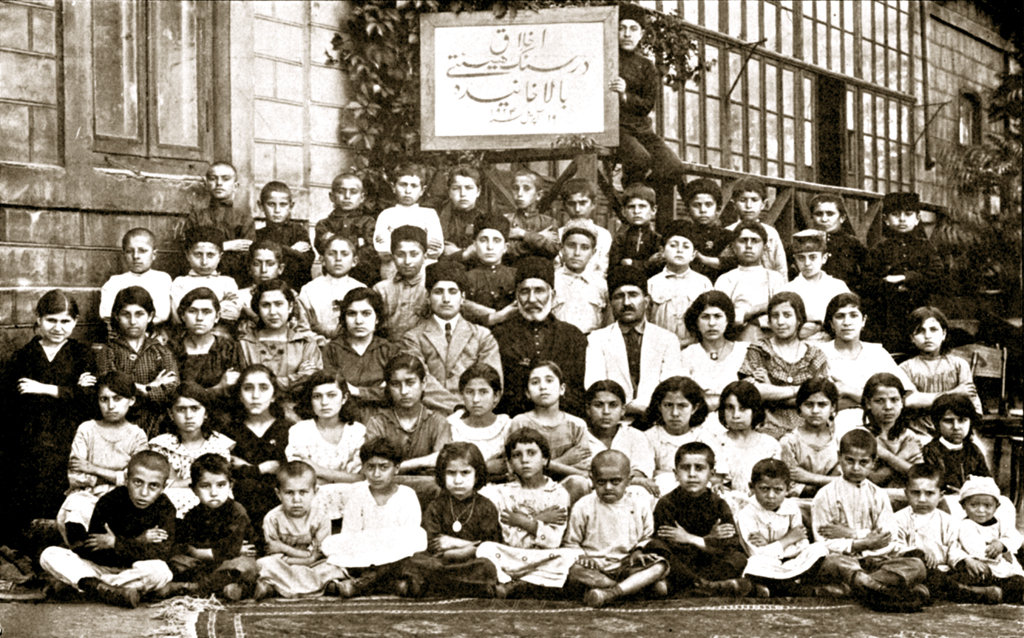
A parallel if less spectacular development could be observed in the Caucasus. After the establishment of the first center and the formation of an Assembly in Bákú, a city which Bahá’í pilgrims, traveling in increasing numbers from Persia to the Holy Land via Turkey, invariably visited, new groups began to be organized, and, evolving later into well-established communities, cooperated in increasing measure with their brethren both in Turkistán and Persia.
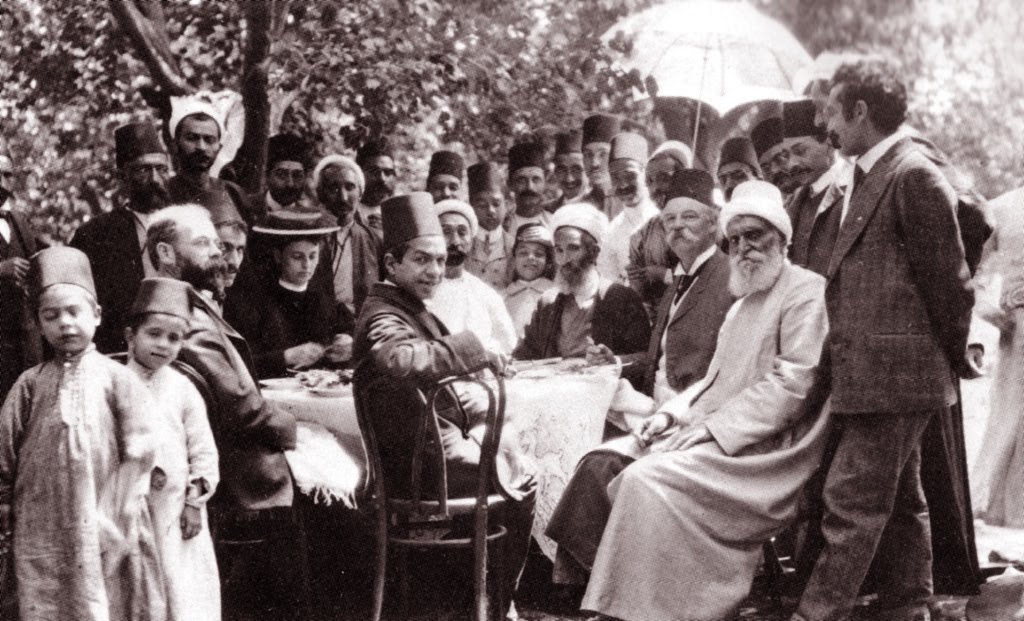
In Egypt a steady increase in the number of the adherents of the Faith was accompanied by a general expansion in its activities. The establishments of new centers; the consolidation of the chief center established in Cairo; the conversion, largely through the indefatigable efforts of the learned Mírzá Abu’l-Faḍl, of several prominent students and teachers of the Azhar University—premonitory symptoms foreshadowing the advent of the promised day on which, according to ‘Abdu’l‑Bahá, the standard and emblem of the Faith would be implanted in the heart of that time-honored Islamic seat of learning; the translation into Arabic and the dissemination of some of the most important writings of Bahá’u’lláh revealed in Persian, together with other Bahá’í literature; the printing of books, treatises and pamphlets by Bahá’í authors and scholars; the publication of articles in the Press written in defense of the Faith and for the purpose of broadcasting its message; the formation of rudimentary administrative institutions in the capital as well as in nearby centers; the enrichment of the life of the community through the addition of converts of Kurdish, Coptic, and Armenian origin—these may be regarded as the first fruits garnered in a country which, blessed by the footsteps of ‘Abdu’l‑Bahá, was, in later years, to play a historic part in the emancipation of the Faith, and which, by virtue of its unique position as the intellectual center of both the Arab and Islamic worlds, must inevitably assume a notable and decisive share of responsibility in the final establishment of that Faith throughout the East.
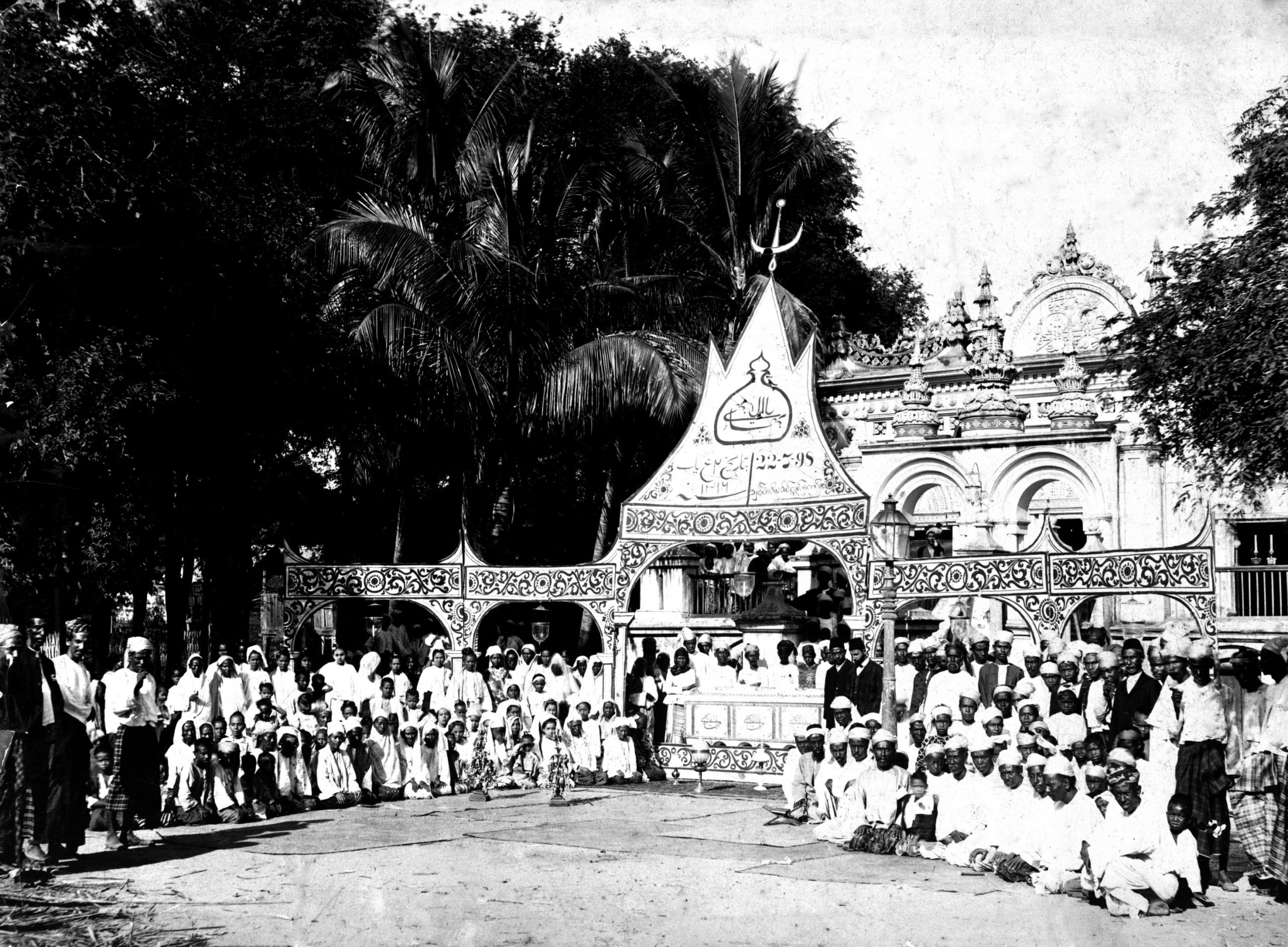
Even more remarkable was the expansion of Bahá’í activity in India and Burma, where a steadily growing community, now including among its members representatives of the Zoroastrian, the Islamic, the Hindu and the Buddhist Faiths, as well as members of the Sikh community, succeeded in establishing its outposts, as far as Mandalay and the village of Daidanaw Kalazoo, in the Hanthawaddy district of Burma, at which latter place no less than eight hundred Bahá’ís resided, possessing a school, a court, and a hospital of their own, as well as land for community cultivation, the proceeds of which they devoted to the furtherance of the interests of their Faith.
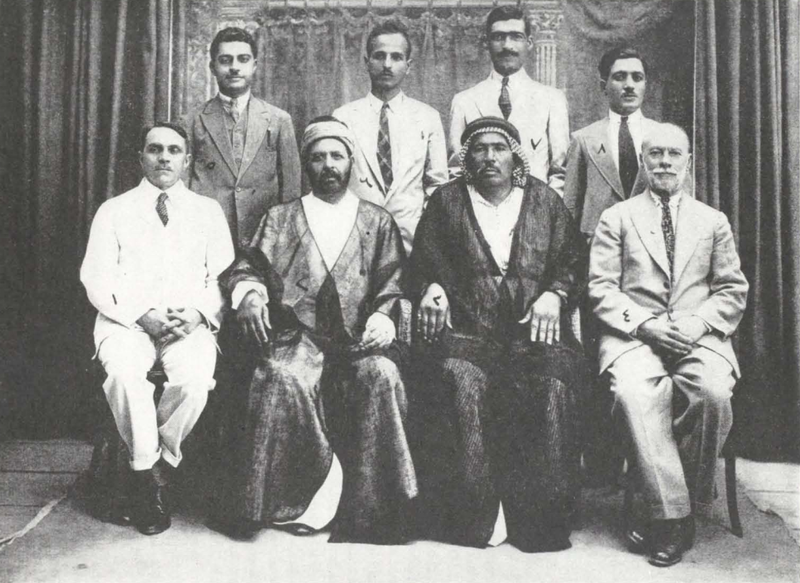
In ‘Iráq, where the House occupied by Bahá’u’lláh was entirely restored and renovated, and where a small yet intrepid community struggled in the face of constant opposition to regulate and administer its affairs; in Constantinople, where a Bahá’í center was established; in Tunis where the foundations of a local community were firmly laid; in Japan, in China, and in Honolulu to which Bahá’í teachers traveled, and where they settled and taught—in all of these places the manifold evidences of the guiding hand of ‘Abdu’l‑Bahá and the tangible effects of His sleepless vigilance and unfailing care could be clearly perceived.
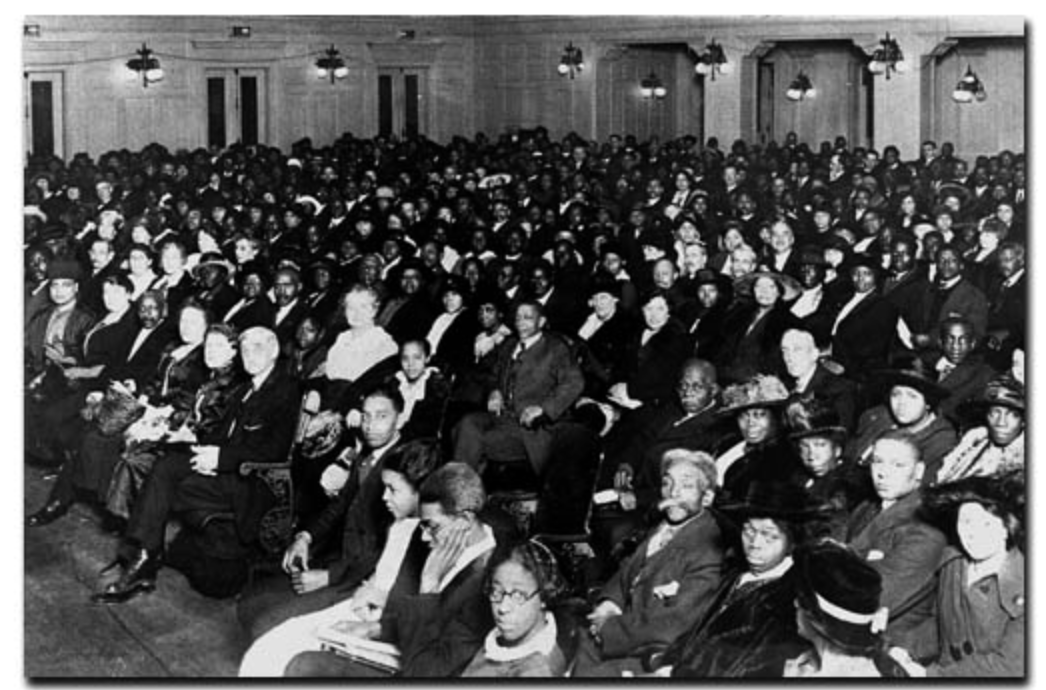
Nor did the nascent communities established in France, England, Germany and the United States cease to receive, after His memorable visits to those countries, further tokens of His special interest in, and solicitude for, their welfare and spiritual advancement. It was in consequence of His directions and the unceasing flow of His Tablets, addressed to the members of these communities, as well as His constant encouragement of the efforts they were exerting, that Bahá’í centers steadily multiplied, that public meetings were organized, that new periodicals were published, that translations of some of the best known works of Bahá’u’lláh and of the Tablets of ‘Abdu’l‑Bahá were printed and circulated in the English, the French, and German languages, and that the initial attempts to organize the affairs, and consolidate the foundations, of these newly established communities were undertaken.
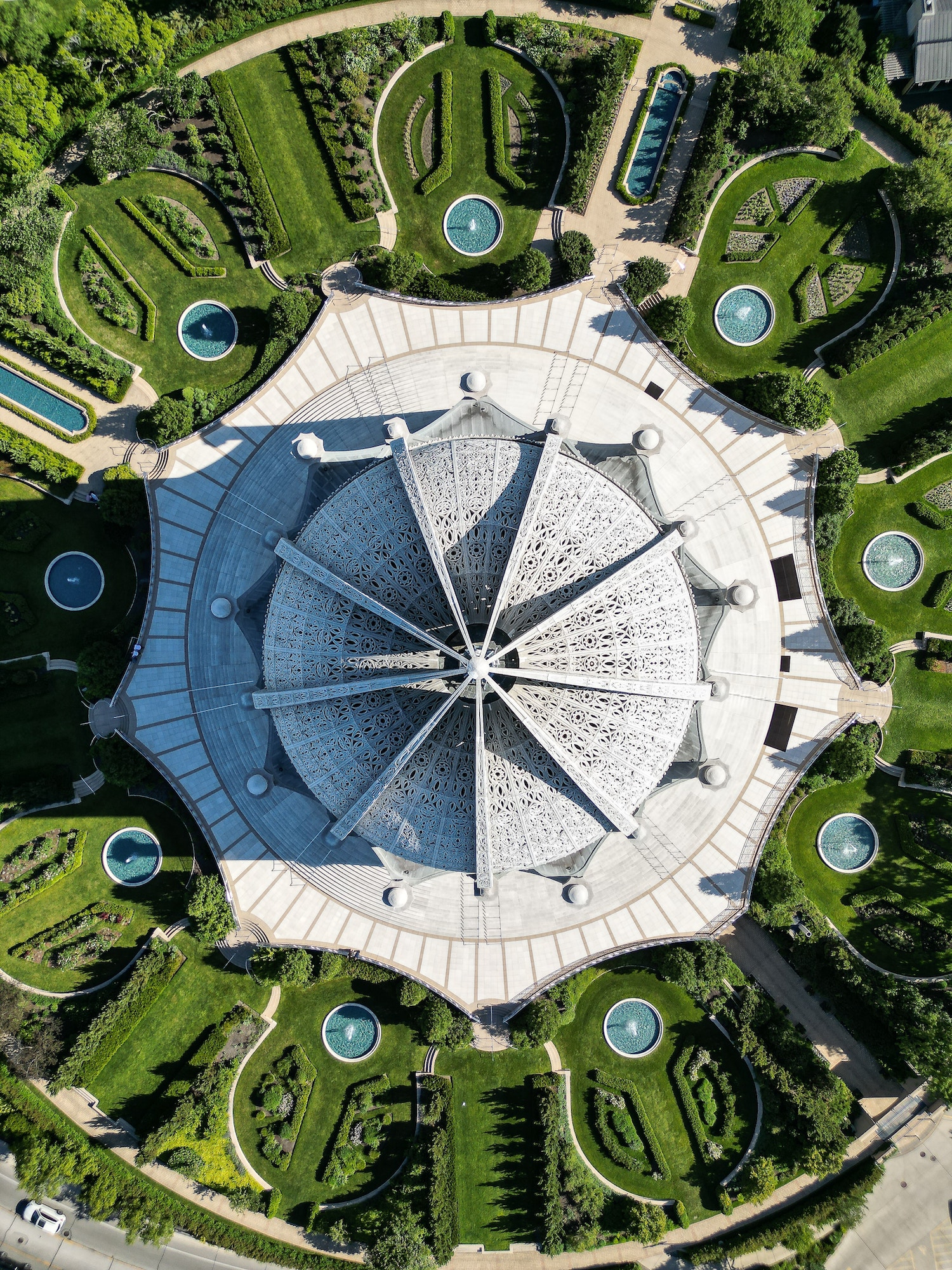
In the North American continent, more particularly, the members of a flourishing community, inspired by the blessings bestowed by ‘Abdu’l‑Bahá, as well as by His example and the acts He performed in the course of His prolonged visit to their country, gave an earnest of the magnificent enterprise they were to carry through in later years. They purchased the twelve remaining lots forming part of the site of their projected Temple, selected, during the sessions of their 1920 Convention, the design of the French Canadian Bahá’í architect, Louis Bourgeois, placed the contract for the excavation and the laying of its foundations, and succeeded soon after in completing the necessary arrangements for the construction of its basement: measures which heralded the stupendous efforts which, after ‘Abdu’l‑Bahá’s ascension, culminated in the erection of its superstructure and the completion of its exterior ornamentation.
In Wilmette the excavations for the Mother Temple of the West were carried out and the contract placed for the construction of the basement of the building.
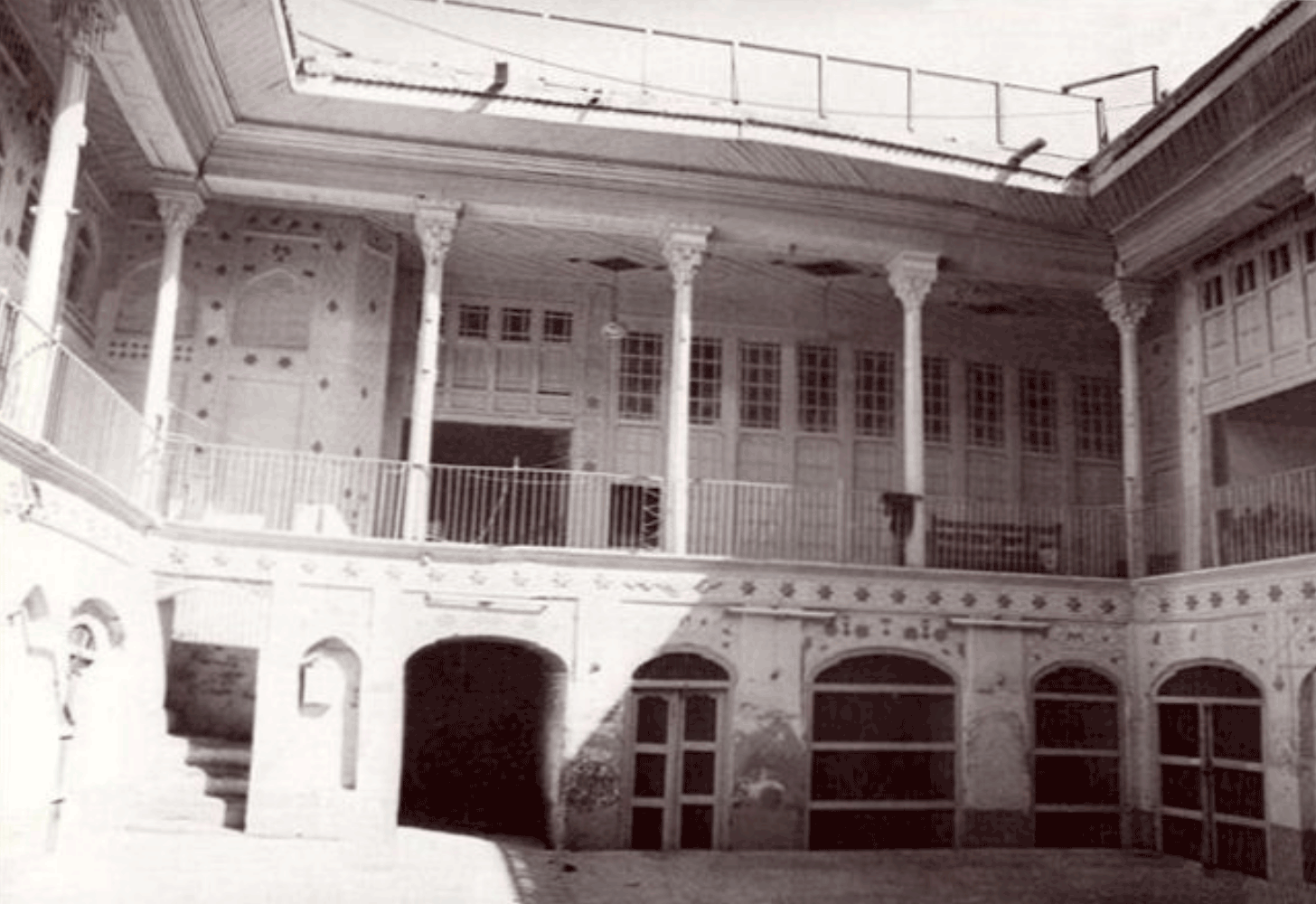
In Baghdád the initial steps were taken, according to His special instructions, to reinforce the foundations and restore the Most Great House associated with the memory of His Father.
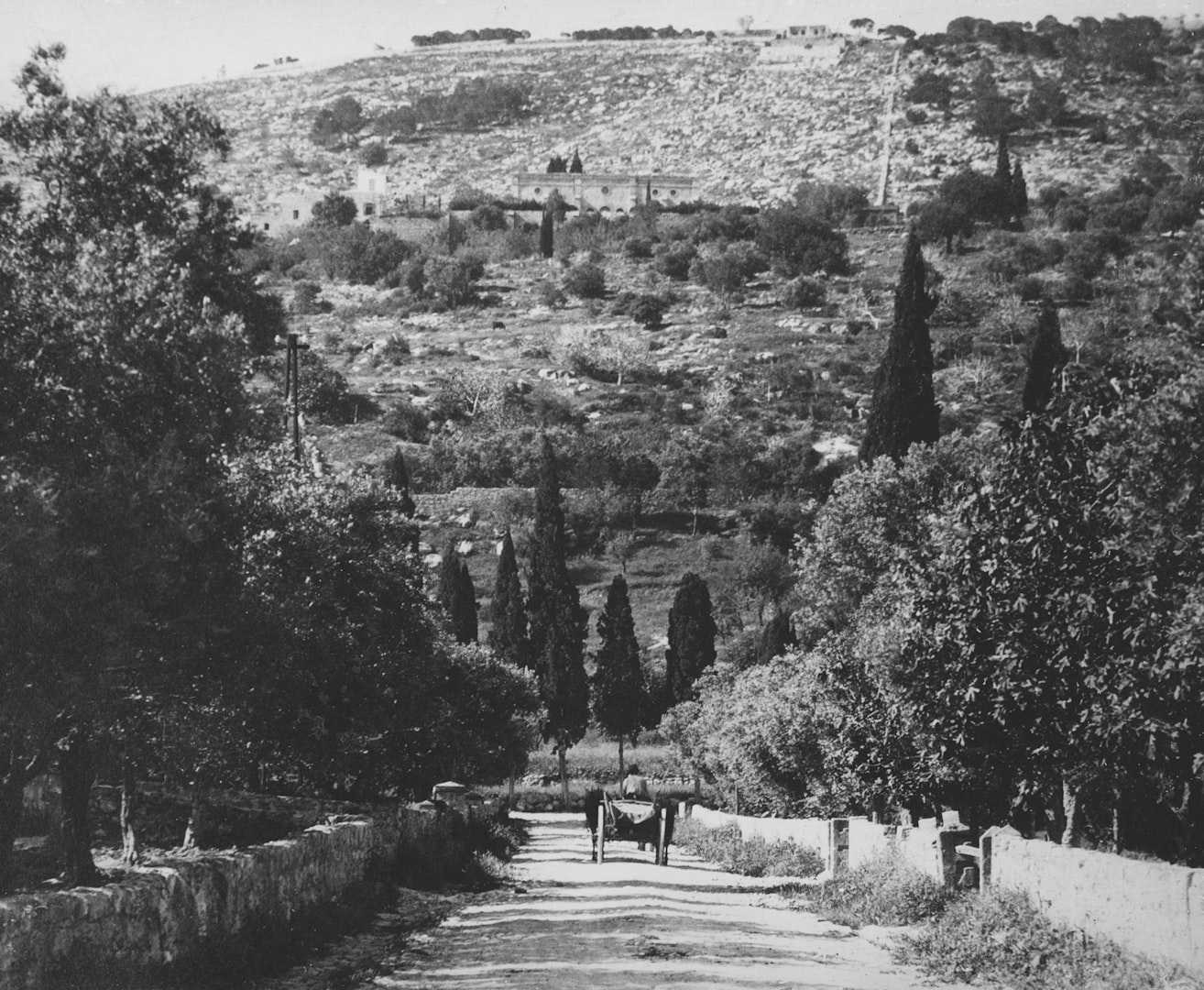
In the Holy Land an extensive property east of the Báb’s Sepulcher was purchased through the initiative of the Holy Mother with the support of contributions from Bahá’ís in both the East and the West to serve as a site for the future erection of the first Bahá’í school at the world Administrative Center of the Faith.
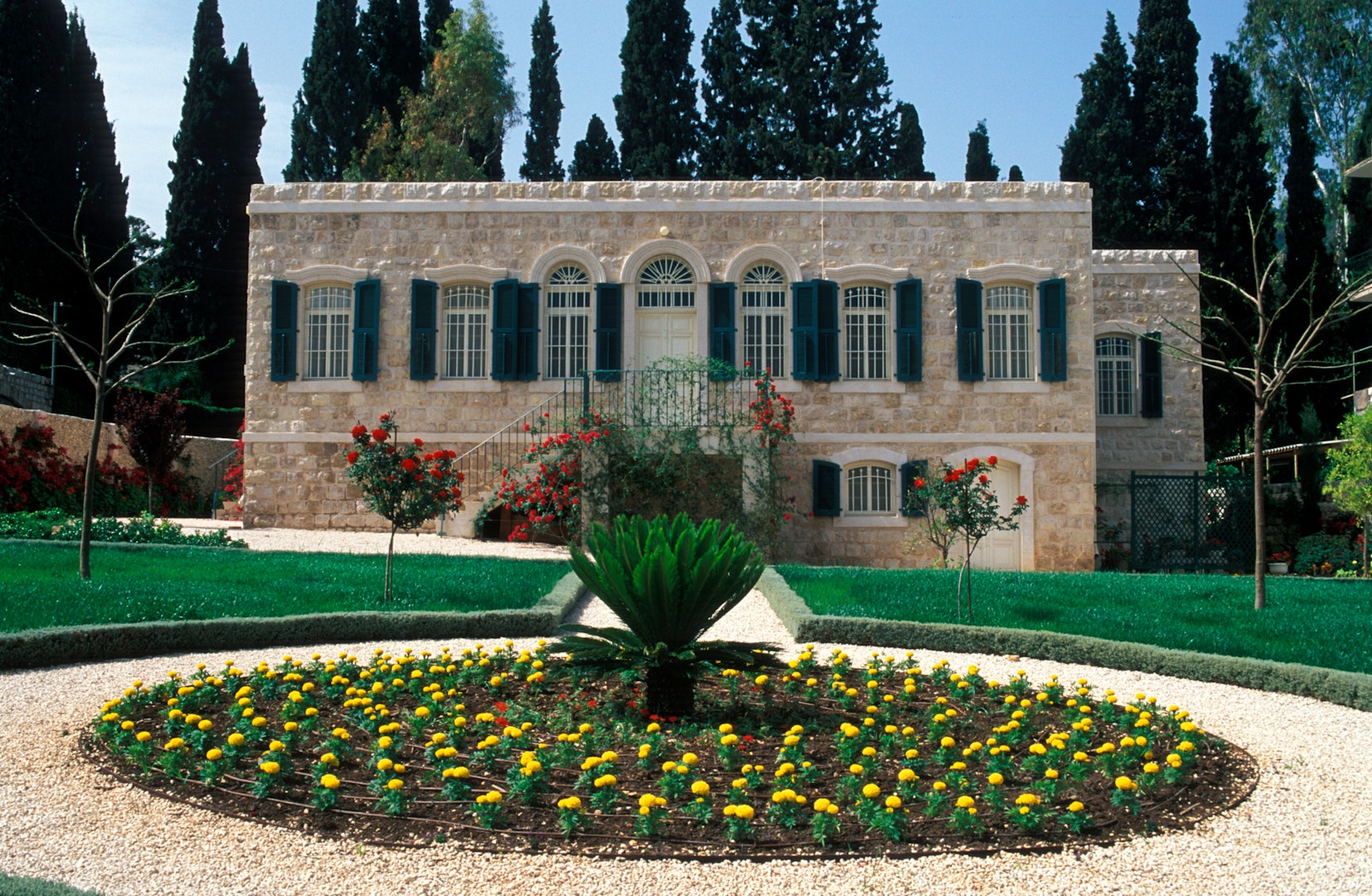
The site for a Western Pilgrim House was acquired in the neighborhood of ‘Abdu’l‑Bahá’s residence, and the building was erected soon after His passing by American believers.
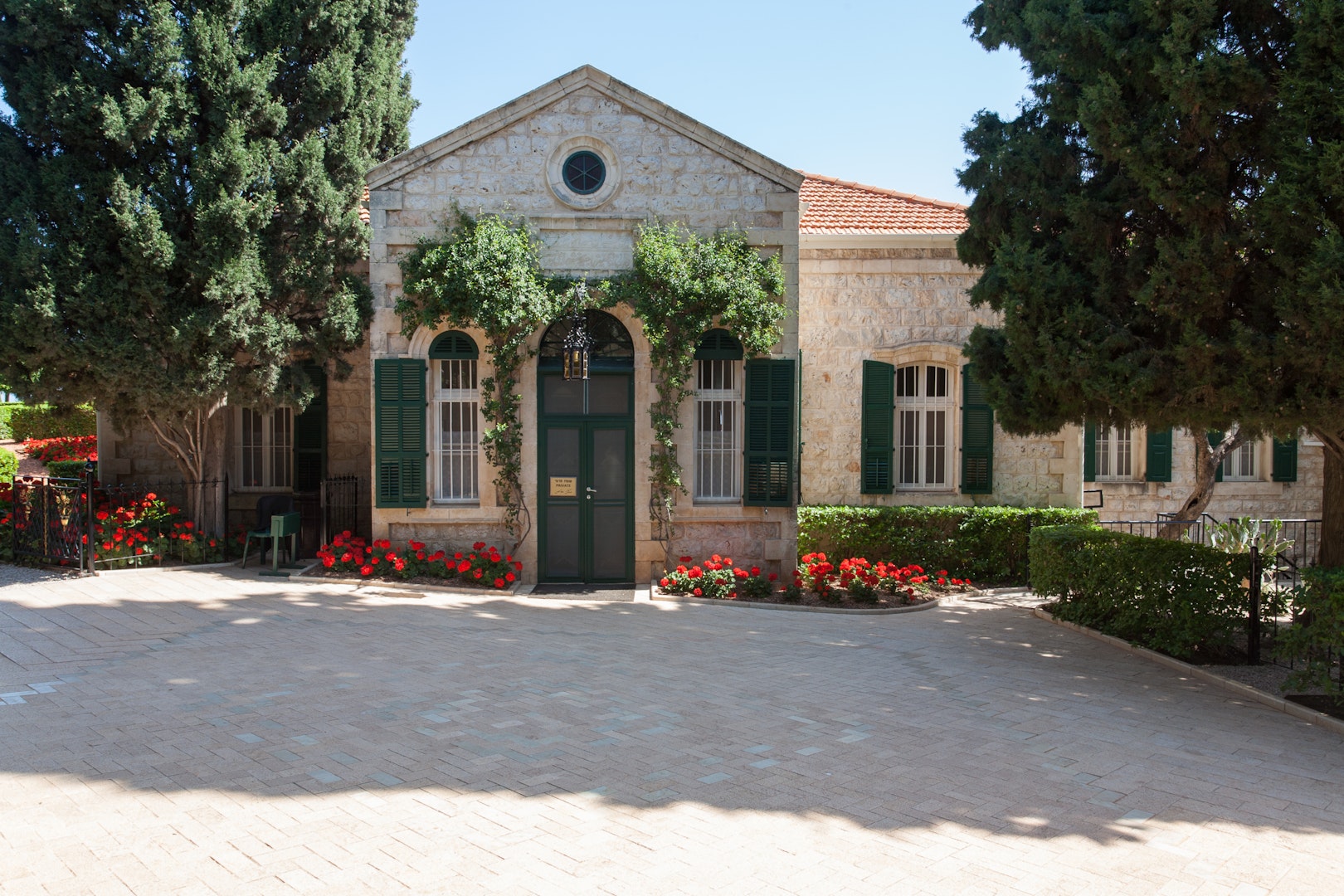
The Oriental Pilgrim House, erected on Mt. Carmel by a believer from ‘Ishqábád, soon after the entombment of the Báb’s remains, for the convenience of visiting pilgrims, was granted tax exemption by the civil authorities (the first time such a privilege had been conceded since the establishment of the Faith in the Holy Land).
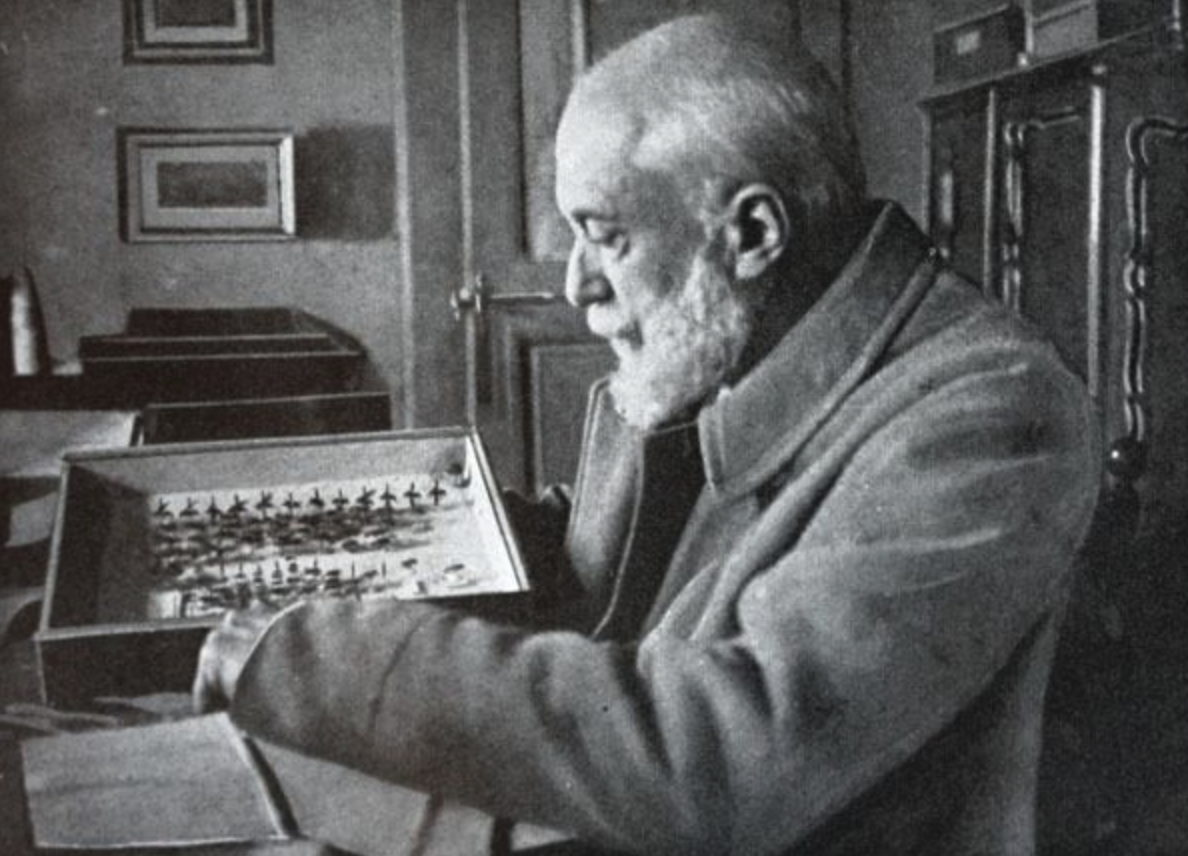
The famous scientist and entomologist, Dr. Auguste Forel, was converted to the Faith through the influence of a Tablet sent him by ‘Abdu’l‑Bahá—one of the most weighty the Master ever wrote.
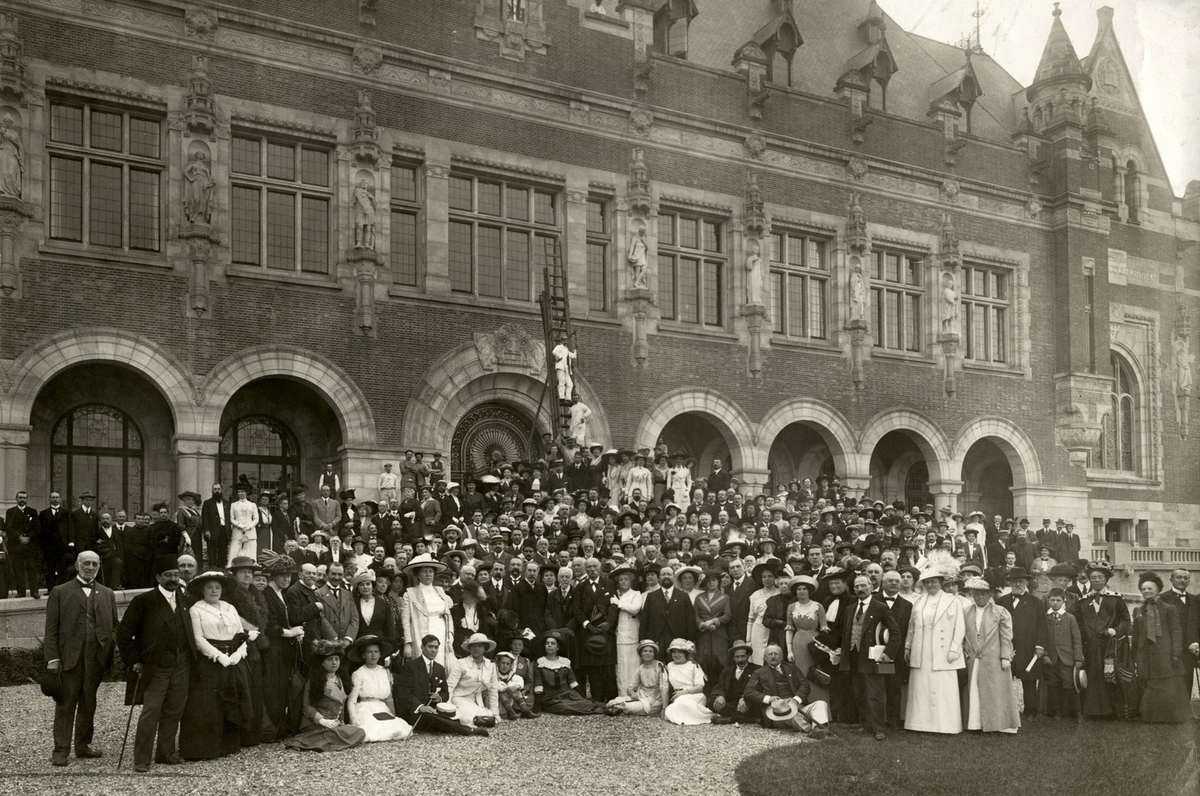
Another Tablet of far-reaching importance was His reply to a communication addressed to Him by the Executive Committee of the “Central Organization for a Durable Peace,” which He dispatched to them at The Hague by the hands of a special delegation.
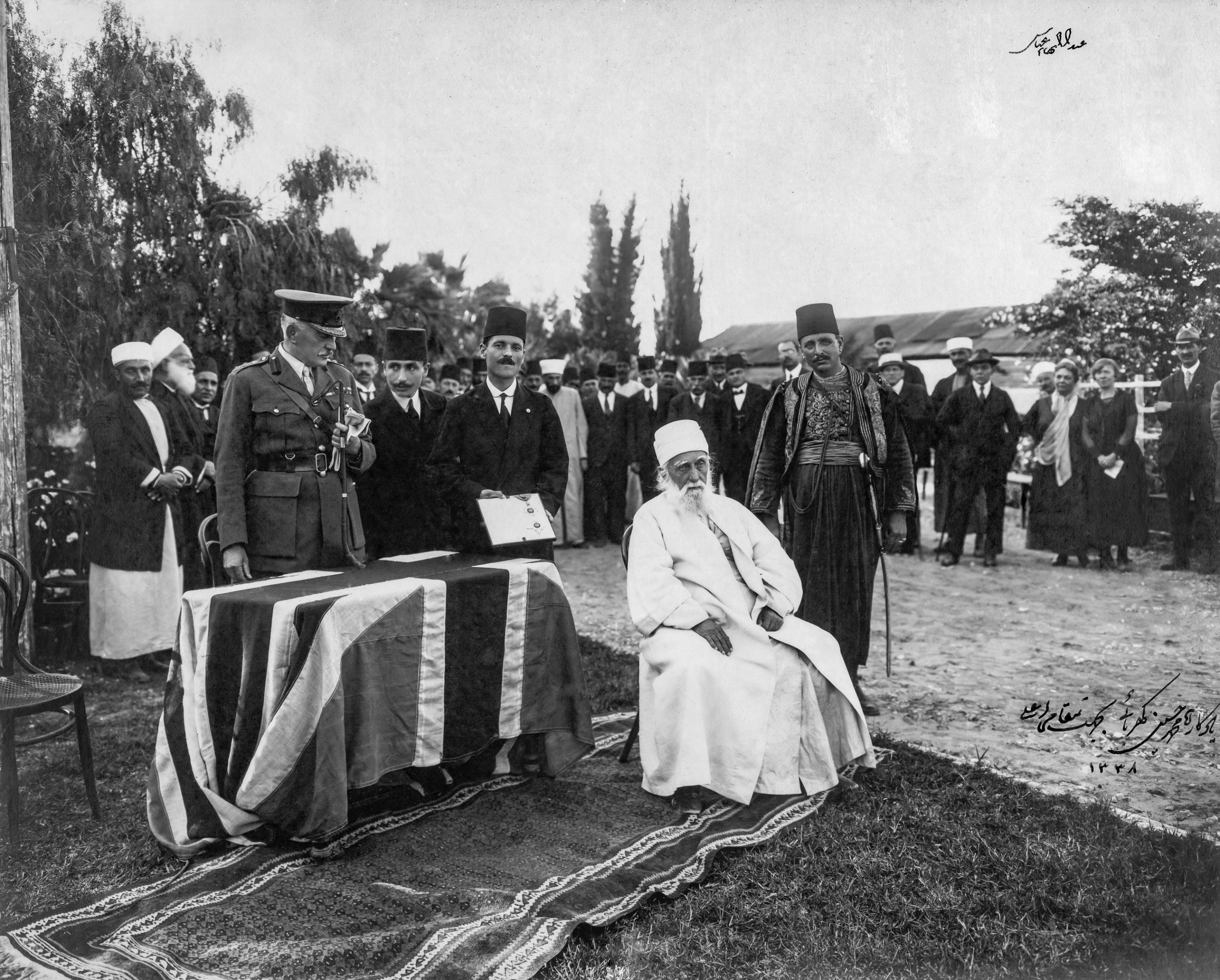
The three years which elapsed between the liberation of Palestine by the British forces and the passing of ‘Abdu’l‑Bahá were marked by a further enhancement of the prestige which the Faith, despite the persecutions to which it had been subjected, had acquired at its world center, and by a still greater extension in the range of its teaching activities in various parts of the world. The danger which, for no less than three score years and five, had threatened the lives of the Founders of the Faith and of the Center of His Covenant, was now at long last through the instrumentality of that war completely and definitely lifted. The Head of the Faith, and its twin holy Shrines, in the plain of ‘Akká and on the slopes of Mt. Carmel, were henceforth to enjoy for the first time, through the substitution of a new and liberal régime for the corrupt administration of the past, a freedom from restrictions which was later expanded into a clearer recognition of the institutions of the Cause. Nor were the British authorities slow to express their appreciation of the rôle which ‘Abdu’l‑Bahá had played in allaying the burden of suffering that had oppressed the inhabitants of the Holy Land during the dark days of that distressing conflict. The conferment of a knighthood upon Him at a ceremony specially held for His sake in Haifa, at the residence of the British Governor, at which notables of various communities had assembled; the visit paid Him by General and Lady Allenby, who were His guests at luncheon in Bahjí, and whom He conducted to the Tomb of Bahá’u’lláh; the interview at His Haifa residence between Him and King Feisal who shortly after became the ruler of ‘Iráq; the several calls paid Him by Sir Herbert Samuel (later Viscount Samuel of Carmel) both before and after his appointment as High Commissioner for Palestine; His meeting with Lord Lamington who, likewise, called upon Him in Haifa, as well as with the then Governor of Jerusalem, Sir Ronald Storrs; the multiplying evidences of the recognition of His high and unique position by all religious communities, whether Muslim, Christian or Jewish; the influx of pilgrims who, from East and West, flocked to the Holy Land in comparative ease and safety to visit the Holy Tombs in ‘Akká and Haifa, to pay their share of homage to Him, to celebrate the signal protection vouchsafed by Providence to the Faith and its followers, and to give thanks for the final emancipation of its Head and world Center from Turkish yoke—these contributed, each in its own way, to heighten the prestige which the Faith of Bahá’u’lláh had been steadily and gradually acquiring through the inspired leadership of ‘Abdu’l‑Bahá.
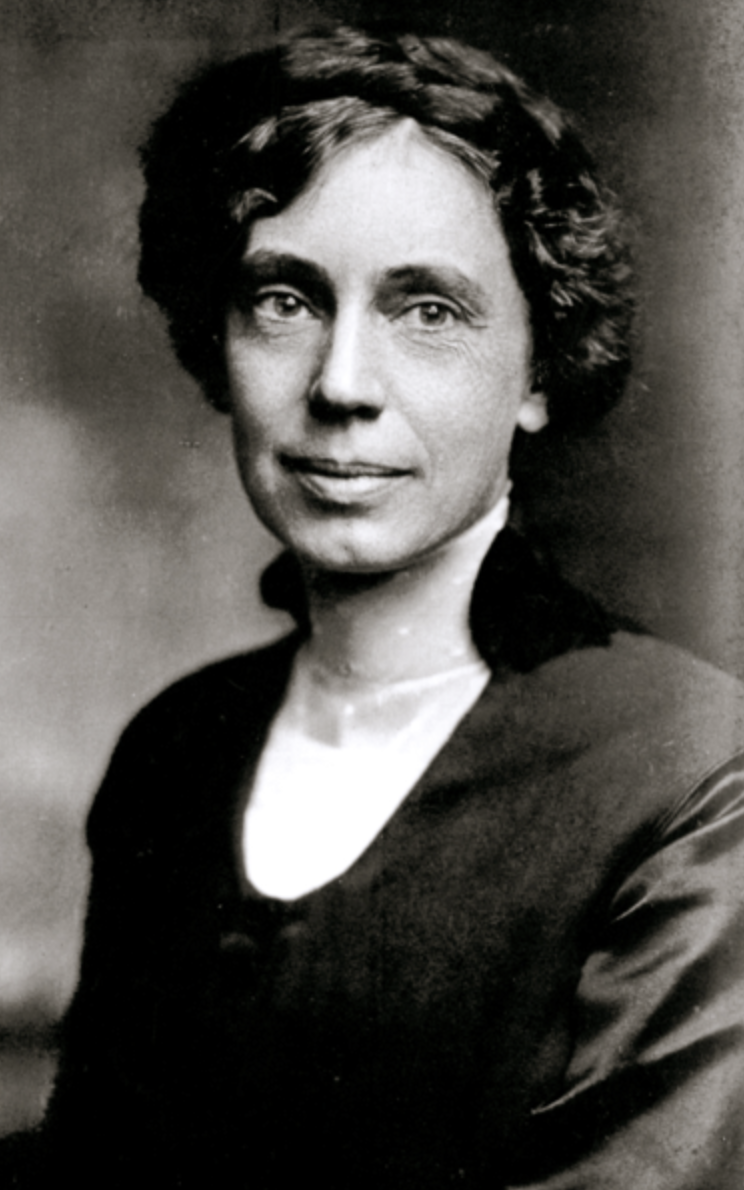
A new episode began when, in quick response to those same Tablets and their summons, that star-servant of Bahá’u’lláh, the indomitable and immortal Martha Root, designated by her Master “herald of the Kingdom” and “harbinger of the Covenant,” embarked on the first of her historic journeys which were to extend over a period of twenty years, and to carry her several times around the globe, and which ended only with her death far from home and in the active service of the Cause she loved so greatly.
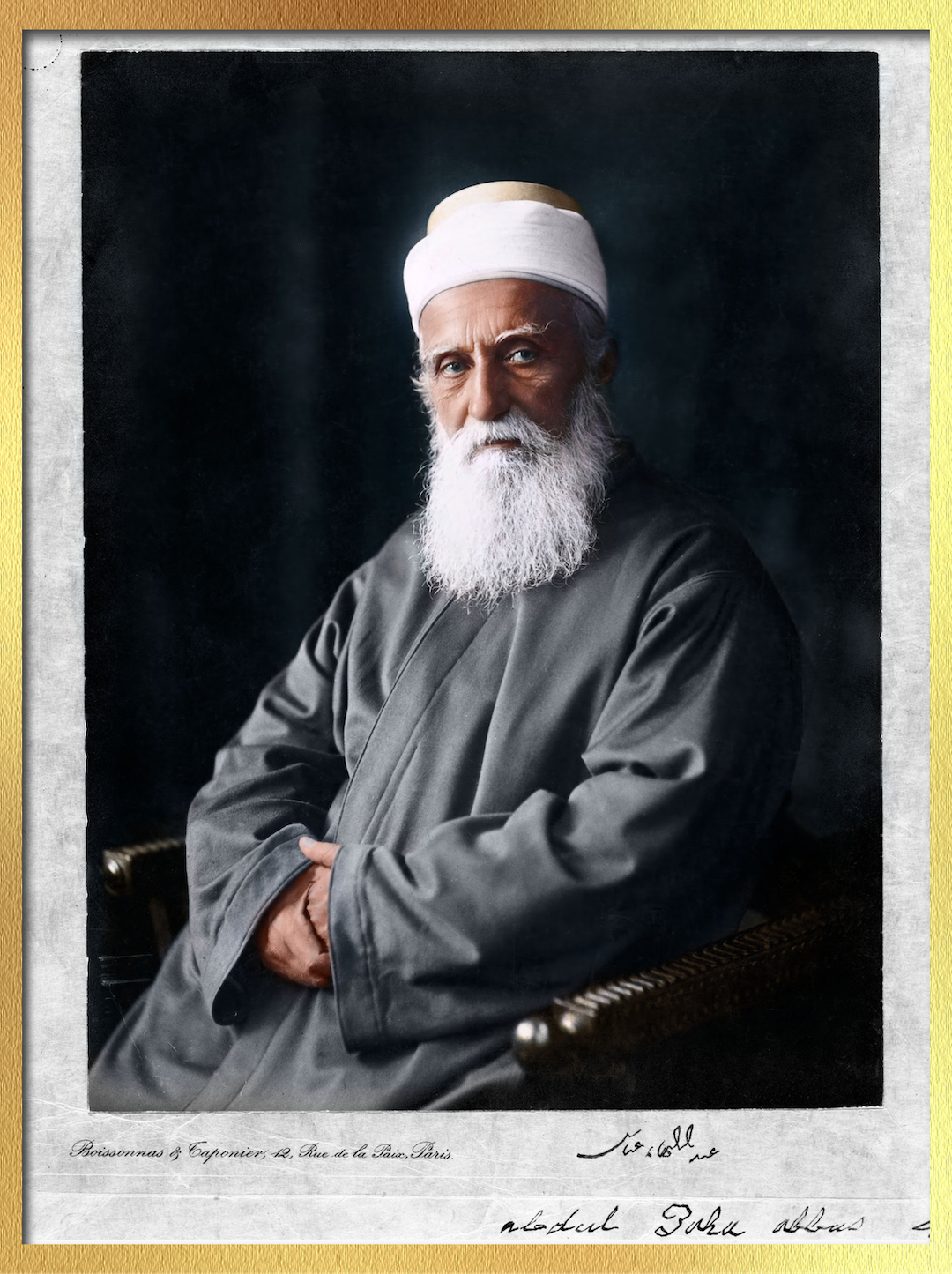
These events mark the closing stage of a ministry which sealed the triumph of the Heroic Age of the Bahá’í Dispensation, and which will go down in history as one of the most glorious and fruitful periods of the first Bahá’í century.
‘Abdu’l‑Bahá’s great work was now ended. The historic Mission with which His Father had, twenty-nine years previously, invested Him had been gloriously consummated. A memorable chapter in the history of the first Bahá’í century had been written. The Heroic Age of the Bahá’í Dispensation, in which He had participated since its inception, and played so unique a rôle, had drawn to a close. He had suffered as no disciple of the Faith, who had drained the cup of martyrdom, had suffered, He had labored as none of its greatest heroes had labored. He had witnessed triumphs such as neither the Herald of the Faith nor its Author had ever witnessed.

Click on the graphic at the top of the section to view the resource
Shoghi Effendi: God Passes By
Chapter XXI: The Passing of ‘Abdu'l-Bahá
Shoghi Effendi's account of the Passing of ‘Abdu'l-Bahá organized around four main themes, within the framework of "God Passes By", chronicling the first 100 years of the Bahá'í Faith:
‘Abdu’l-Bahá’s funeral;
The significance of ‘Abdu’l-Bahá’s ministry (See final section of the chronology, below);
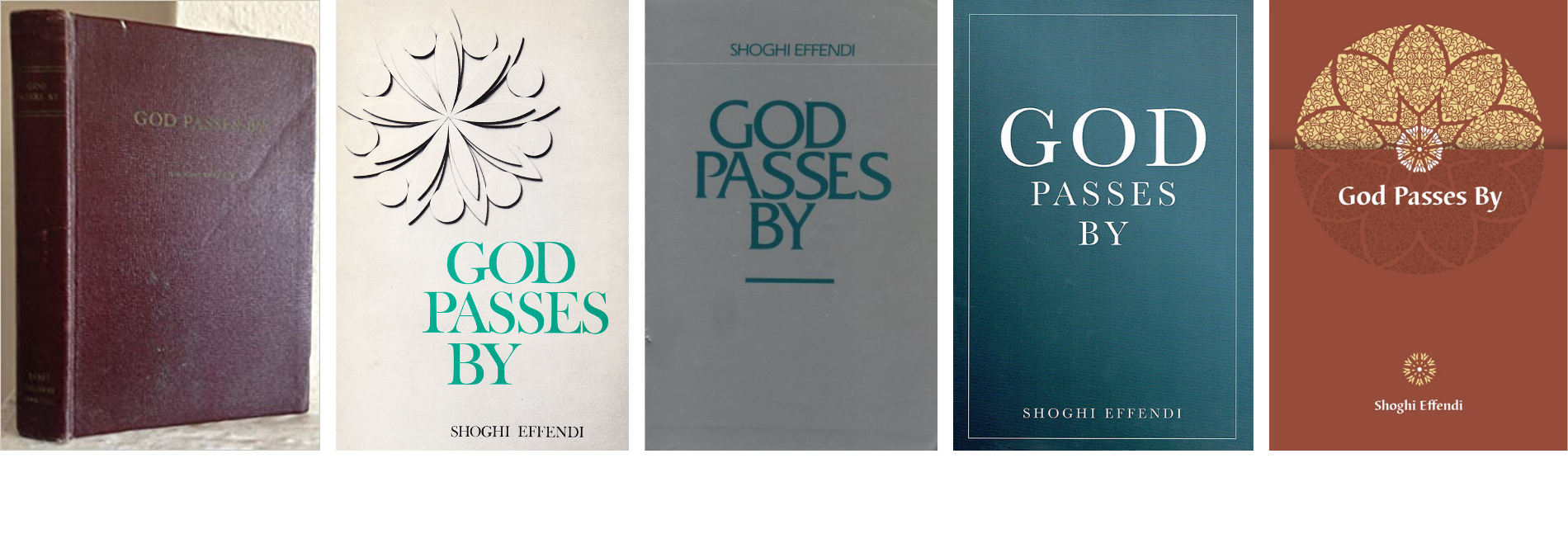
A few of the different editions of God Passes by in the 77 years since it was first published. On the extreme left, the first 1944 edition, and on the extreme right, Bahá'í Publications Australia's 2021 edition. Next to it, United States Bahá'í Publication Trust's 2012 edition.
Shoghi Effendi and Lady Blomfield:
The Passing of 'Abdu'l-Bahá
Shoghi Effendi and Lady Blomfield together wrote this extraordinarily detailed account of the weeks preceding and following the Passing of ‘Abdu'l-Bahá. It was published by Rosenfeld Bros. in Haifa in 1922, and its structure inspired the structure followed in this chronology. Some of the events and subjects covered in this long essay are:
Michael V. Day
Fragrance of Glory: An Illustrated Account of the Ascension of 'Abdu'l-Bahá
This hardcover landscape photo-book describes ‘Abdu'l-Bahá's passing using rare photographs and information from new research, the first modern published book focused specifically on the Ascension of ‘Abdu'l-Bahá since Shoghi Effendi and Lady Blomfield's seminal 1922 book. Fragrance of Glory contains 80 photographs and a map. This illustrated book was both written and published by Michael, under the imprint of Enlightened Publications and is aimed at those who are not in habit of reading, as well as for the general readership.
Fragrance of Glory is comprised of 10 sections:
Section 3: The Passing
Section 4: Reactions
Section 5: Profiles
Section 6: The Funeral
Section 7: Orations
Section 8: After the Funeral
Section 9: The legacy of ‘Abdu’l-Bahá
Section 10: Further reading
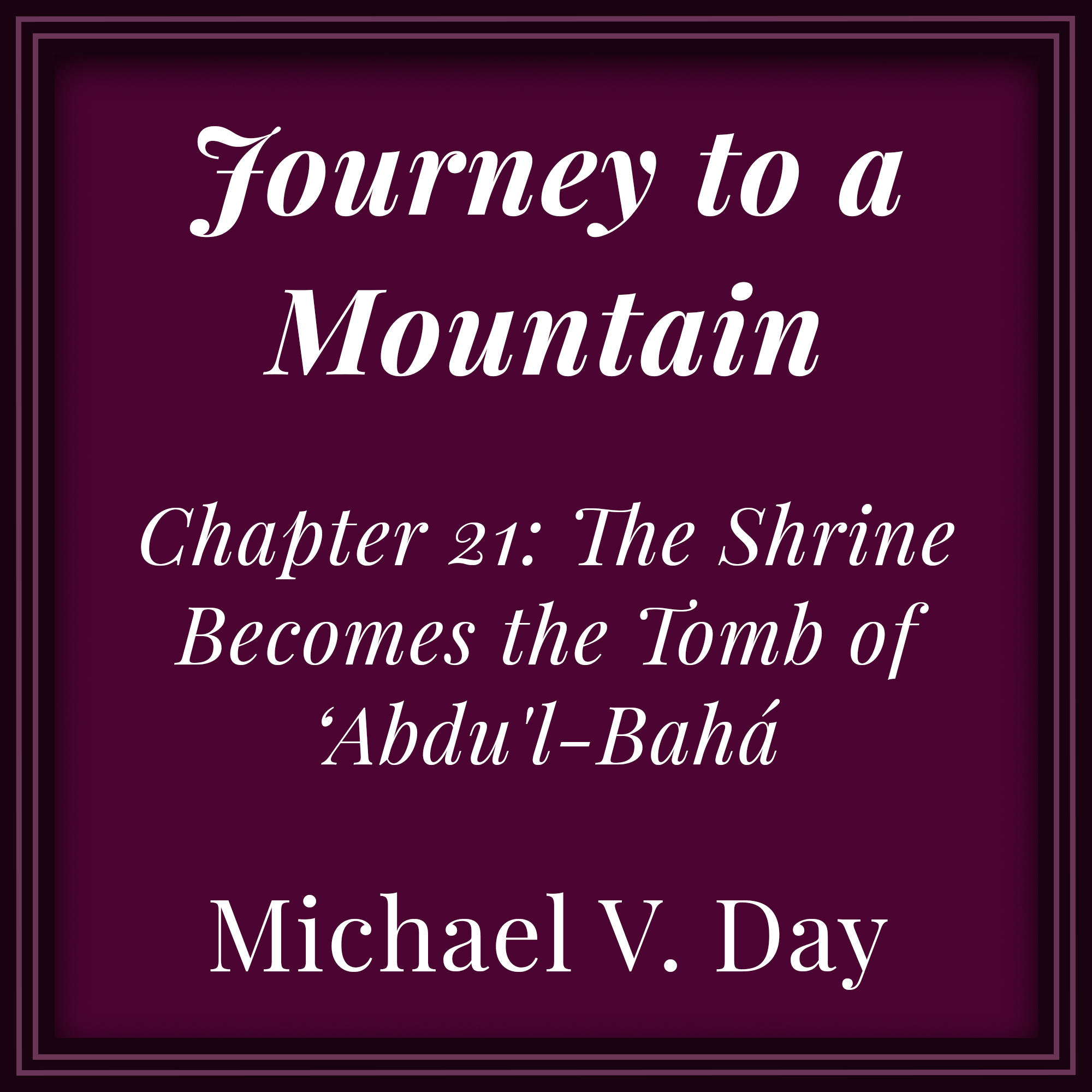
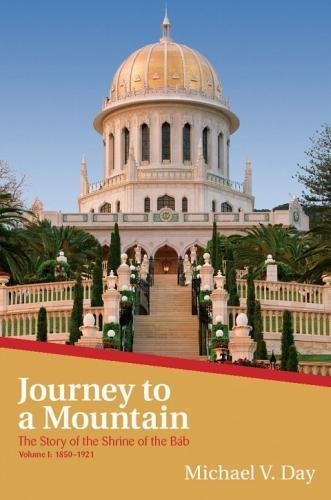
References for Part IX
Before the Ascension
All sources cited in section
The Ascension of ‘Abdu’l-Bahá
SATURDAY & SUNDAY 19-20 NOVEMBER 1913: Shoghi Effendi and Lady Blomfield “An Account of the Passing of ‘Abdu’l-Bahá”, Shoghi Effendi, God Passes By.
FRIDAY 25 NOVEMBER 1921: Star of the West, Volume XIII, Number 9, pages 236-237, John Bosch memories quoted in Earl Redman, Visiting ‘Abdu’l-Bahá Volume 2, and Details about Khursháw’s wedding from Redman, Earl. Visiting ‘Abdu’l-Baha Volume 2: The Final Years, 1913–1921 (p. 212). Kindle Edition.
SATURDAY 26 NOVEMBER 1921: Composite telling of three accounts: 1) “The Passing of ‘Abdu’l-Baha” by Shoghi Effendi and Lady Blomfield, 2) A letter from ‘Abdu’l-Bahá’s daughter Munavvar Khánum to Ruth Wales Randall dated 22 December 1921, (Star of the West Volume 12 Number 18) and 3) A letter from Ethel Rosenberg to the Friends in England dated 8 Dec 1921, (Star of the West Volume 12 Number 19) From sources compiled in David Merrick’s “Passing of ‘Abdu’l-Bahá“
SUNDAY 27 NOVEMBER 1921: Composite telling of three accounts: 1) Shoghi Effendi, God Passes By,
2) “The Passing of ‘Abdu’l-Baha” by Shoghi Effendi and Lady Blomfield, and 3) Annafir Newspaper article published 6 December 1921. From sources compiled in David Merrick’s “Passing of ‘Abdu’l-Bahá“
MONDAY 28 NOVEMBER 1921: Composite telling of two accounts: 1) Shoghi Effendi, God Passes By,
2) “The Passing of ‘Abdu’l-Baha” by Shoghi Effendi and Lady Blomfield
The Funeral of ‘Abdu’l-Bahá
FROM 21 MARCH 1909 TO MONDAY 28 NOVEMBER 1921: Michael V. Day in Journey to a Mountain
MONDAY 28 NOVEMBER 1921: Shoghi Effendi, God Passes By; Michael V. Day Journey To A Mountain (The Story of the Shrine of the Bab).
TUESDAY 29 NOVEMBER 1921: Shoghi Effendi, God Passes By; Michael V. Day Journey To A Mountain (The Story of the Shrine of the Bab).
Tributes to ‘Abdu’l-Bahá
All references provided in section.
Media Coverage of the Funeral of ‘Abdu’l-Bahá
Newspaper Clippings from Necati Alkan’s collection, Newspapers.com, and Gallica. Quote by Shoghi Effendi listing newspapers having published articles on the passing of ‘Abdu’l-Bahá from God Passes By.
Translation for 16 December 1921 Newspaper article in Arabic provided by Nadim Golmohamad and received from Dr. Necati Alkan in an email communication dated 14 January 2025.
Seven Days After the Ascension
28 NOVEMBER – 5 DECEMBER 1921: THE WEEK FOLLOWING THE ASCENSION: Shoghi Effendi, God Passes By, “The Passing of ‘Abdu’l-Baha” by Shoghi Effendi and Lady Blomfield, details from Louis Bosch and Johanna Hauff’s letters published in Star of the West, (sources compiled in David Merrick’s “Passing of ‘Abdu’l-Bahá“)
The Will and Testament of ‘Abdu’l-Bahá
SHOGHI EFFENDI, GUARDIAN OF THE BAHÁ’Í FAITH: Ruhíyyih Rabbáni, The Priceless Pearl; Riaz Khadem, Prelude to the Guardianship; Adib Taherzadeh, The Covenant of Bahá’u’lláh.
THE WILL AND TESTAMENT OF ‘ABDU’L-BAHÁ: Hasan M. Balyuzi, The Will and Testament of ‘Abdu’l-Bahá.
3 JANUARY 1922: Ruhíyyih Rabbáni, The Priceless Pearl.
6 JANUARY 1922: Ruhíyyíh Rabbáni The Priceless Pearl.
7 JANUARY 1922: Michael V. Day Journey To A Mountain (The Story of the Shrine of the Bab).
7 & 16 JANUARY 1922 – WORLDWIDE ANNOUNCEMENT: Ruhíyyíh Khánum The Priceless Pearl.
THE GUARDIANSHIP: FULFILLING ‘ABDU’L-BAHÁ’S LEGACY: The Bahá’í Faith: The Official Website of the Bahá’í Community: The Life and Work of Shoghi Effendi and Shoghi Effendi: Guidance and Translations
Forty Days After the Ascension
21 DECEMBER 1921 – WORLDWIDE MEMORIAL MEETING CABLE ANNOUNCEMENT: Ruhíyyih Rabbáni, The Priceless Pearl.
6 JANUARY 1922 – FORTIETH DAY MEMORIAL FEAST: Shoghi Effendi and Lady Blomfield The Passing of ‘Abdu’l-Bahá (1922) and Shoghi Effendi, God Passes By, Ruhíyyíh Khánum The Priceless Pearl, and the article printed in the Haifa newspaper Annafir (“The Bugle”) with supplementary details gleaned from Emogene Hoagg, Letter to Nelly French dated 2 January 1922, published in World Order Volume 6 Issue 2 and Jináb-i-Azíz’u’lláh Azízí, A Crown of Glory; All sources available in full in David Merrick’s Passing of ‘Abdu’l-Bahá.
ALL SPEECHES: References in section.
Outstanding Achievements of the Ministry of ‘Abdu’l-Bahá
All content in this section is from Shoghi Effendi: God Passes By, Chapter XX: Growth and Expansion of the Faith in East and West and Chapter XXI: The Passing of ‘Abdu’l‑Bahá
The title is from Shoghi Effendi’s last sentence in the third paragraph of Chapter XX:
« Nor were these, preeminent though they were, the sole fruits garnered through the indefatigable efforts exerted so heroically by the Center of that Covenant. The progress and extension of His Father’s Faith in the East; the initiation of activities and enterprises which may be said to signalize the beginnings of a future Administrative Order; the erection of the first Mashriqu’l-Adhkár of the Bahá’í world in the city of ‘Ishqábád in Russian Turkistán; the expansion of Bahá’í literature; the revelation of the Tablets of the Divine Plan; and the introduction of the Faith in the Australian continent these may be regarded as the outstanding achievements that have embellished the brilliant record of ‘Abdu’l‑Bahá’s unique ministry. »
![]()
